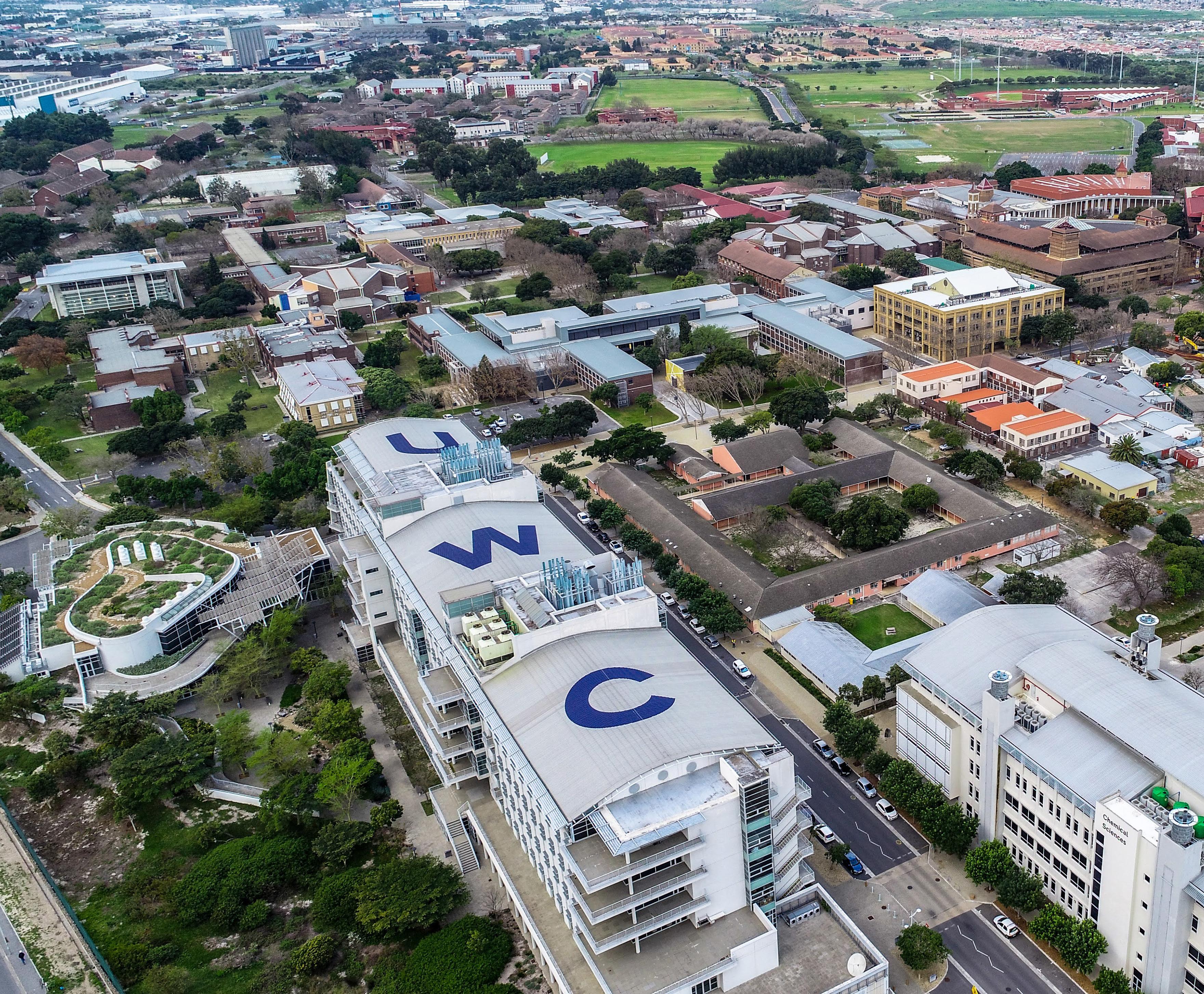









Prof Vivienne Lawack Deputy Vice-Chancellor (Academic)
Since 2017, every Dean and Director within my line compiles a Reflective Report that I then consolidate, including my reflections. The consolidated DVC (Academic) Reflective Report aims to reflect the state of the academic project through the lenses of the seven faculties, together with the academic professional support directorates within this portfolio.
2023 was an extraordinary year, our transitioning year. We had to continue grappling with an unforeseen global COVID-19 pandemic (hereafter ‘the pandemic’) in 2020 and beyond. The pandemic made us rethink a lot of what we thought we knew in the academic project, while coping with the impact of the pandemic on our lives and health and on our families.
Since the cataclysmic effects of the pandemic experience were still with us and we remained online us, it would be remiss not to reflect on its impact on the academic project in the 2022 academic year and the start of the 2023 academic year.
This 2023 Reflective Report contains an overview of our academic approach and decision-making during 2022, as well as a self-evaluation of the most pertinent work done during the course of the completed Institutional Operating Plan (IOP) 2016—2020 and progress made to date in the IOP 2021-2025. To this end, it consists of:
• A radical change to our policy framework following our evidence-based approach to learning and teaching during the pandemic;
• Strategic integrated planning and implementation during IOP 2016—2020 and IOP 2021—2025;
• People planning; and
• Leadership reflections by the Deans of the seven Faculties, as well as Directors of the four Directorates.
The DVC (Academic) Portfolio is the largest DVC portfolio at the University of the Western Cape (UWC). We are leading the academic project, focusing on Learning and Teaching, Academic Planning, the University in the Digital Age, as well as Community Engagement and Performing Arts. Central to the academic project is that our students and academic staff members are respectively co-creators of knowledge and that, at the heart of this endeavour, lies excellence and the success of our students, and a deep commitment to social justice and being change agents. The seven faculties are centrally positioned within the portfolio, supported by the Directorate of Learning, Teaching and Student Success (DLTSS), the Centre for Innovative Educational and Communication Technologies (CIECT), the Academic Planning Unit (APU), and the Community Engagement Unit (CEU, which has included the Centre for Performing Arts since 2019.

The organogram below depicts the structure of the portfolio (until 29 February 2024)
DVC: ACADEMIC
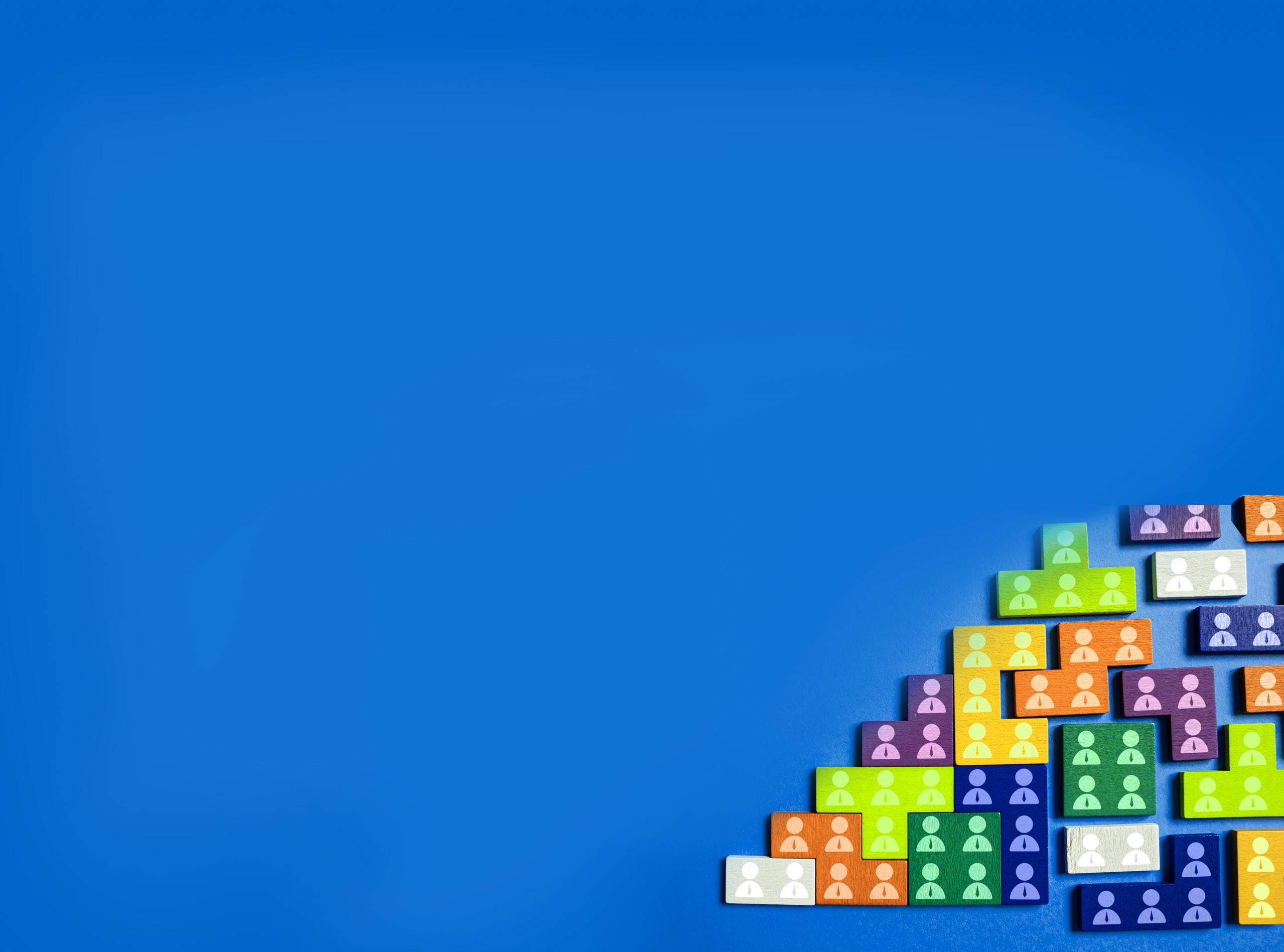
DIRECTORS
ARTS & HUMANITIES
Prof Monwabisi Ralarala
COMMUNITY & HEALTH SCIENCES
Prof Firdouza Waggie (until July 2024)
Prof Anita Padmabhanunni
DENTISTRY
Prof Veerasamy Yengopal
EDUCATION
Prof Rajendran Govender
ECONOMIC & MANAGEMENT SCIENCES
Prof Michelle Esau
LAW
Prof Jacques de Ville
NATURAL SCIENCES
Prof Bertrum Fielding (until March 2024)
Prof David Holgate
Director: Strategic Academic Projects: Dr Anita Maurtin
Prof Subethra Pather
Freda Daniels Learning and Teaching Specialist
Continuing Education Coordinator
Administrator
A radical change to the UWC learning and teaching policy framework followed our evidence-based approach to learning and teaching during the COVID-19 pandemic. The reflection written by Prof Subethra Pather, Dr Vanessa Brown and Prof Vivienne Lawack in the Reflective Report for 2020 explained how following an evidence-based approach to learning and teaching during the pandemic enabled UWC to take decisive action on a principled basis.
An evidence-based approach encouraged the UWC leadership to rely on available evidence, analyses and facts to develop university guidelines for learning, teaching and assessments during a time of crisis. The objective was to ensure that the university leadership did not take for granted the resource disparities that exist among the student population and university academics. Evidence was gathered from students and staff in two stages. As a first step, data was collected related to resource readiness to engage online in ERTL, and later in the semester, data was collected on staff and students’ personal experiences with ERTL during the pandemic. The collection of data at the different stages allowed UWC to provide evidence-based plans and support to staff and students in a staggered manner to ensure relevance as we were dealing with the unknown.
“DVC:
Academic is the largest DVC portfolio at the University of the Western Cape. We lead the academic project, focusing on learning and teaching, academic planning, the university in the digital age, as well as community engagement and performing arts”
Following the evidence-based approach ensured that the policies, guidelines and decisions were informed by an understanding of the vulnerabilities and challenges faced by staff and students during this time. The data also showed that UWC staff and students were strongly committed to completing the academic year successfully, thereby demonstrating incredible resilience in the face of the upheavals and trauma unleashed by COVID-19. Although there were challenges for both students and academics, the experience also provided insight into the future positioning of flexible learning and teaching at UWC.
The evidence-based approach followed at UWC in 2020, 2021 and 2022 enabled us to proceed from a principled basis. All decisions concerning moving the academic programme online in 2020 followed proper protocols through the institutional governance structures of the Senate Executive Committee (‘the SEC’), Senate Academic Planning Committee (‘the SAP’) and Senate.

Although most UWC students engaged in online learning in 2020, many had difficulty doing so. Our data showed that 8% of students did not participate in online learning and about 22% only partially participated in online learning. The development of UWC’s blended approach guidelines allowed a wider and more inclusive approach to student participation, making it possible to learn in digital and online media as well as traditional face-to-face teaching. This approach can also include a range of technologies and the deployment of physical and virtual resources to suit different purposes, learners and contexts.
The proposed blended learning and teaching approach for 2021 considered the continued risk to public health posed by COVID-19. Hence, the developed guidelines for blended learning and teaching proposed a framework for proceeding with the 2021 academic year that considers the public health concerns as well as the evidence-based learnings arising out of UWC’s experience with online learning in 2020. With the advent of the third wave of infections, the university opted to remain online in 2021 and to plan the scenario for hybrid learning and teaching to start in 2022. The realities of infrastructure and resource challenges to the blended/hybrid learning and teaching approach experienced during 2020 and 2021 would be addressed once our smart buildings were reconfigured and provided that the pandemic did not change the situation. About 235 new ‘smart hybrid venues’ were reconfigured, including 18 tutorial rooms and 26 laboratories.
For the 2022 academic year, 1227 new modules were created across faculties and uploaded to the iKamva (Sakai) platform, the institutional Learning Management System. iKamva was invaluable in this setting, with users accessing it three times per day on average. More details can be found in the CIECT section of this report.
Decisively changing the UWC’s assessment plan already distributed to students was an exceptional situation because of the pandemic. UWC’s online assessment criteria considered the three “Is”: integrity, inclusivity and immediacy. Care and compassion were at the core of the assessment guideline principles. The 2021 UWC Guiding Principles for Flexible Learning and Teaching Contingency Plan 2021 and the UWC Guiding Principles are amended via the SAP. The SAP considered our experience in 2020 and the severity of the second wave of the pandemic. The SEC approved the SAP recommendation that we remain online in the first semester of 2021. The SEC also approved the following Guiding Principles for Flexible Learning and Teaching Contingency Plan 2021:
1. Term One would commence online from 8 March 2021, in a phased approach.
2. There would be a concerted endeavour to complete the academic year in 2021 for all students.
3. Disparities among our students’ socio-economic backgrounds are acknowledged and efforts would be as inclusive as possible, with various ways of ensuring that the different categories of students are catered for, including students with disabilities. The use of print media, PowerPoint presentations, flash drives, etc. would be explored.
4. A flexible learning and teaching approach that includes online platforms, among others, would be adopted.
5. A varied and phased approach to assessments would be considered on a discipline-specific basis.
6. Academic rigour would be maintained at all times — a ‘pass one, pass all’ approach would not be acceptable.
7. The university would remain committed to making budgetary adjustments to ensure that plans were realised for learning and teaching to take place.
8. Faculties would provide remedial classes and offer opportunities to students who may have been prejudiced by a lack of resources to catch up on lost work.
9. Every faculty and lecturer would adopt an approach that was sensitive to and aligned with the institution’s values.
In addition, the SEC approved the following amended ‘UWC Guiding Principles on Assessment during the Covid-19 Pandemic — 2021’:
Where practically possible, no student with issues related to Covid-19 will be excluded from any scheduled assessment, including a module’s final assessment, during this crisis.
If students report that they have been prejudiced by lack of access to a learning-conducive environment, lack of access to resources and/or other reasonable circumstance related to Covid-19, then such students will be provided with additional assessment opportunities within a reasonable time.


Modules that have 100% continuous assessment (CA) as their assessment type should include higher-weighted integrated assessments in their assessment schedules, which bring together different module outcomes. This principle should be read with Principle 9.
All modules that have continuous and final assessment (CFA) as their assessment type may propose changes to the current ratio of CA to final assessment (FA), to the SEC via the SAP.
Except where otherwise required by accreditation bodies, no sit-down examination will be held for Semester 1 modules. These exams will be replaced with Summative Assessments (SA) that evaluate the achievement of core outcomes. The SA’s submissions must be deployed and undertaken remotely and online by students.
Practical assessments and clinical evaluations will be conducted in a phased approach, depending on the severity of the pandemic.
Final and summative assessment tasks, in particular, must be designed to ensure the authenticity and credibility of student submissions; ie. the submission must reflect the student’s own work as far as is reasonably possible.
Changes to modules’ assessment schedules must be submitted by lecturers to heads of department with the original schedules and the proposed new assessment schedules. The faculty Academic Planning Committee must approve these changes and students must be notified of such changes by lecturers.
As far as possible, the university will accommodate the need for flexibility regarding the scheduling of assessments, reassessments and catch-up opportunities.
Principle 10:
Assessment must be subject to normal internal and external moderation processes. For exit-level modules, assessments must be externally moderated and all non-exit-level modules must be moderated internally.
SEC decisions were ratified at the first Senate meeting of 2021. Given the severity of the pandemic, a decision on blended learning would be taken later in the first semester. We were guided by the trajectory of the pandemic, which required us to be flexible. The CIECT prepared online orientation for firstyear and senior students and the return-to-campus task team worked on a scenario plan for 2022, given the decision to remain online. Details were communicated separately on this matter.
We were aware that this situation was not ideal — learning does not happen only in the classroom but through interaction with peers and lecturers. Students were also being deprived of university co-curricular programmes. But, under these trying circumstances, our greatest priority was to ensure the safety of students and staff.
In 2023, we continued to build on the foundation laid in 2020, to 2022, but also leveraged the learnings during these years. The performance of our students in 2023 is reflected in the figures/graphs below. The first graph shows the number of students who completed at the end of 2023 for all undergraduate programmes (certificates, diplomas and degrees).

Percentage of students with a weighted average final mark outcome
Years taken to complete degree (general academic first bachelor’s)

The second graph looks at their overall weighted average for that year and then indicates, based on their overall average, the percentage who obtained a distinction mark (75% and above), those who passed (50-74%) and those who failed (below 50%).
The last two graphs are of the degrees (first and professional). This is not a direct cohort study but does show that most students completed within the minimum time or n+1. It has to be noted that several,completed below the minimum time. These are students who transferred from other higher education institutions or who were readmitted into a new programme.
It is evident that we had a good rate of completions and that we had a successful 2023 academic year from an undergraduate perspective.
The evidence-based approach to learning and teaching followed during the pandemic enabled UWC to take decisive action on a principled basis. Policies, guidelines and decisions were informed by an understanding of the vulnerabilities and challenges faced by staff and students. The data also showed that staff and students were strongly committed to completing the academic year successfully and demonstrated incredible resilience in the face of the pandemic’s upheavals and trauma. Despite the challenges for students and academics, the experience provided insight into the future positioning of flexible learning and teaching at UWC. Using these insights, we followed an inclusive process to develop two new policies that signalled a radical change for
our academic project: the UWC Flexible Learning and Teaching Provisioning Policy and Assessment Policy approved by Council in September 2021; and the UWC Curriculum Transformation and Renewal Framework approved by Senate in November 2021 In addition, we embarked on an extensive consultative process to further institutionalise the the Scholarship of Engagement (SoE) for Societal Impact at UWC. Following this process, Senate approved the UWC Framework for the SoE for Societal Impact in October 2022. I want to thank my co-drafters, Dr Cornel Hart and Prof Priscilla Baker, for working with me so tirelessly to make this milestone happen.
A key shift under goal two of the IOP 2016—2020 was the shift to learning and teaching that provided not only a philosophical change but spoke to the main reason we are in higher education: teaching without any learning would not meet the objectives set out in White Paper 3 of 1997. This is retained in goal two: learning and teaching in the IOP 2021-2025.
The 2022 reflective report provided an overview of the strides made in the previous IOP as well as areas for consolidation, acceleration and innovation.

The new IOP 2021—2025 was adopted by the UWC Council following an inclusive process. This 2023 Reflective Report build on the gains during the new IOP.
Goal area two of the IOP 2021—2025 is focused on learning and teaching. The vision for this goal area is: “To provide high-quality,
evidence-based for learning and teaching opportunities that are underpinned by responsive curricula and a diversity of learning, teaching and assessment practices in order to nurture graduates who have the knowledge, skills and attributes to succeed in the world of work; are lifelong learners; and are socially aware, ethical and caring global citizens.”
But the academic project extends beyond learning and teaching in goal two; it firmly slots into every IOP goal area, as explained in the following table:
1 The student experience
2 Learning and teaching
3 Research and innovation
4 People framework
5 Financial sustainability
Foster a conducive environment for excellence in learning and teaching, to enhance the student experience and ensure student success and retention
Develop a conducive environment for excellence in learning and teaching, embracing pedagogies that will enable graduates to acquire attributes for the changing world
Create a conducive environment for a research-led approach to learning and teaching
Create a nurturing environment to enhance academics as teachers at all academic levels
Develop a contiuning education (CE) and continuous professional development (CPD) online education model to enhance the quality and financial viability of CE, CPD and online programmes at UWC
6 UWC in the public domain Develop a plan to market and communicate the academic project at UWC
7 Developing the campus Develop SMART and alternative learning spaces that will enable flexible learning teaching and surrounding areas and provisioning at UWC
8 Leadership, governance Develop leadership as a competency in academic staff and management
To pursue excellence in learning and teaching, all the faculties and academic professional support staff strive to enhance the quality of our learning and teaching and to improve student success. Exemplary work has been carried out by deputy deans of teaching and learning and teaching and learning specialists in each of our seven faculties.
We have dedicated teaching development programmes, a genuine commitment to embracing blended learning, a real responsibility to decrease so-called ‘killer modules’ which we now refer to as ‘high-priority modules’, and increased research outputs focusing on the scholarship of teaching and learning. The Graduate Attributes, which Senate approved in 2016, are being revised to suit the changing world of work and demands of the fourth industrial revolution (4IR). Senate approved the revised Charter of Graduate Attributes in 2023.
To gain insight into students who had chosen to study at UWC an extensive survey was conducted. Of the 4300 first-year undergraduate students in 2023 and 3608 of these students participated in the research. Some of the key findings were:
74% of respondents indicated that UWC was their preferred higher education institution.
• 30% indicated that their daily commute to campus was between 11km and 20 km.
• 73% felt overwhelmed by personal problems in their final
year of high school at least twice a week. And 60% felt overwhelmed by personal problems in their final year of high school at least twice a week.
26% of respondents had attended school in a suburban area.
• 47% indicated that they would attend many social functions at campus, including sports days, student braais and fundraising events.
The four key priorities that we focus on are:
• Excellence and student success and retention; Research-led learning and teaching;
• Learning with technology (emerging technologies);
• Transformation and renewal of the curriculum.
This Reflective Report also deals with people planning and development and selected Apex projects.
These are discussed below.
Excellence and student success are key pillars of goal two, amplified by the Graduate Attributes and a focus on learning and the skills of graduates in the 21st century. Goal Area Strategic priority for the academic plan

In terms of the IOP 2021—2025, the graduate in the changing world of work in the 21st-century context plays a central role, as well as the effect of technology in learning, flexible learning provision, epistemological access and success, professionalisation of teaching and learning, improving the status of teaching and learning, incorporating research with learning (scholarship of teaching and learning), and national developments (including social justice, citizenship and social inclusion).
Within UWC, the Senate Academic Planning (SAP) and the Senate Learning and Teaching (SLT) and Learning (SLTC) Committees are stringently managed and administered. Administrative functions are excellently performed in ways that serve to support the goals of the APU and the university system. The system of academic reviews functions well. A regulatory committee was established in 2016 to ensure compliance with the regulatory framework so the SAP committee can concentrate on academic issues.
As far as pursuing excellence in learning and teaching is concerned, all the faculties and academic professional support staff strive to enhance the quality of our learning and teaching and to improve student success. Some of their advances include the exemplary work done by Deputy Deans of Teaching and Learning and Teaching & Learning Specialists in all faculties, dedicated teaching development programmes, a real commitment to embracing blended learning, the decrease of so-called ‘killer modules’ (now called ‘high-priority modules’) and a growing number of research outputs focusing on the scholarship of teaching and learning. The Graduate Attributes that were approved by Senate in 2016 were amended to suit the changing world of work and demands of the fourth industrial revolution (4IR). Senate approved the revised Charter of Graduate Attributes in 2023.
Some of the interventions include additional tutoring, mentorship, peer learning and summer/ winter schools and boot camps.
Faculties are employing strategies to retain students, not only during their undergraduate (UG) years, but also for postgraduate (PG) studies. In 2017 and 2018, renewed energy went into the retention of students. As part of Operation Student Success, key deliverables were:
• The UWC Retention and Success Framework;
• The UWC Student Success Model and Tutor Enhancement Programme (TEP)
• The Guidelines for Tutoring, Tutor Practices and Procedures; The First-Year Experience Framework and the ‘Student Walk’;
• The Accelerated Excellence Programme (AEP).
Senate adopted the UWC Framework for Retention and Student Success in 2019. The key principles are:
• Student success and retention is everybody’s business.
• Student success and retention must be central to the mission of the institution.
• Taking action is as important as reflection and data analytical insights.
Student success initiatives require mutual engagement of students and the university.
Human resources are important investments to student success and retention.
• The approach must involve working across silos in a systemic and integrated approach with an effective implementation, management and coordination plan.
• Ongoing monitoring and evaluation of the impact of the framework over time.
In implementing these key principles, we have devised various interventions to enhance student success and retention at UWC, which follow below.
Operation Student Success: A journey towards excellence
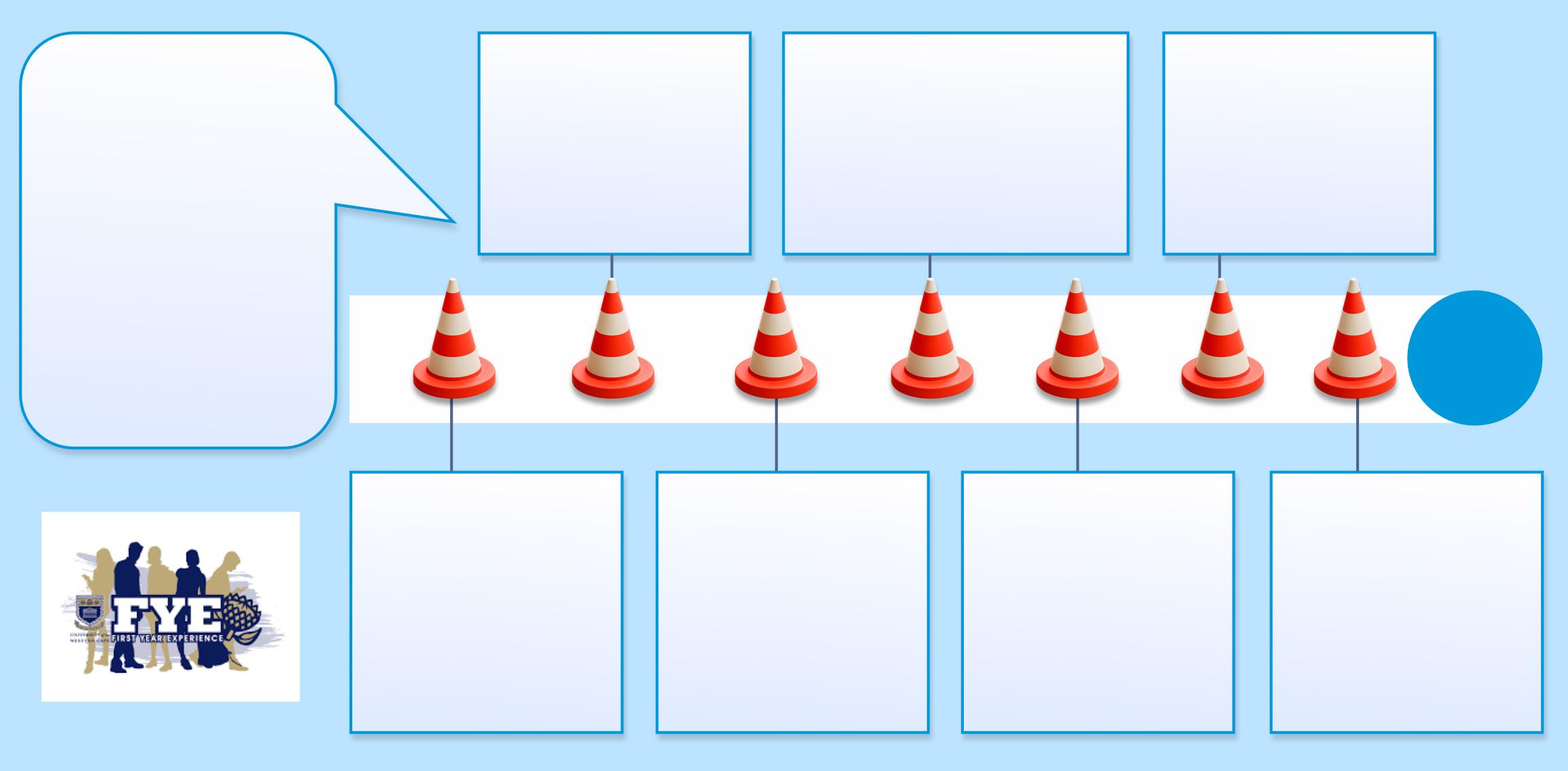
Transformative initiaves that have shaped UWC’s commitment to student success and fostering an inclusive, supportive learning environment.
2017 First-Year Experience (FYE)
• Orientation Week
• Learning Communities
• Celebrating Milestones
2016 Tutor Enhancement Programme (TEP)
• Training & Development
• Pedagogical Support
• Student Engagement
2019
UWC Student Retention & Success Framework
• Student Walk
• 3 Environments: Caring & Supportive
• Holistic Support
2018 First-Year Mentors: Transition Programme (FYTP)
• Personalised Guidance
• Building Networks
• Building Agency
• Skills Development

2021
Academic Advising
• One Stop Shop
• One-on-One Support
• Monitoring Progress
2020 Siyaphumelela Student Success Project
• Data Analysis
• Data informed Interventions
• Collaborations
2024 Designing for Social Justice Student-Staff
Partnership Project
• Curriculum
Transformation
• Collaborative Dialogue
• Community Engagement
Overview: Operation Student Success was conceptualised in the Office of the DVC: Academic as a high-impact practice to support students’ engagement, sense of belonging, academic retention and success. There are various student success initiatives, highlighted below which are aligned to goals one and two in UWC’s IOP 2021-2025. My thanks goes to Prof Subethra Patherand Dr Vanessa Brown for leading the Operation Student Success project at UWC.
Organogram of DVC Academic: Operation Student Success Team
The team and support initiatives within the DVC Academic’s office to support undergraduate student success in 2023 have increased.
Siyaphumelela 2.0
UWC Siyaphumelela Student Success Project 2020-2023 concluded in June 2023. The project was funded by the Kresge Foundation and UWC formed part of Siyaphumelela network in South Africa. UWC received $100,000 per year to support student retention and success initiatives.
Learning & Teaching Specialist Operation Student Success
Administrator
Academic Student Success Advisor (ASSA) - Tutor Enhancement Programme
Academic Student Success Advisor (ASSA)
- First Year Experience (FYE)
The Siyaphumelela (‘We Succeed’) initiative in South Africa helps partner institutions foster a culture of student success, identify data and tools to improve student success, strengthen institutional capacity, and develop practices for long-term student success. The Kresge Foundation is committed to strategic learning and knowledge-sharing that builds on insights, experiences and reflections of our partnership, and advances our student success mission. This is the Siyaphumelela network’s second cycle of funding.
Siyaphumelela UWC Project Goals:
The project goals are aligned with the Siyaphumelela project goals:
• Establish a more student-centred culture at UWC
• Successfully use data analytics to improve student success outcomes at UWC
• Improve institutional capacity to collect student data and integrate the use of data across different institutional divisions (e.g. Institutional Planning, Institutional Research, ICTS, CIECT, student services, and faculties)
Academic Student Success Advisor (ASSA) - First Year Transition Programme
Academic Student Success Advisor (ASSA) - Student Engagement
• Expand evidence-based student success efforts at UWC, using a network approach that builds on existing strengths Increase data transparency and accessibility within institutions to support student success
• Share our strengths and successes with the Siyaphumelela partners.
Siyaphumelela UWC Objectives for Funding Cycle 2.0
Objective 1: Strengthen the university’s business intelligence capabilities. The strengthening of this capacity was in response to the critical need to develop and refine the university’s data analytics policies, capabilities and practices.
Actions taken to meet objective 1: The UWC Siyaphumelela project during cycle 2.0 achieved significant milestones in strengthening the university’s business intelligence (BI) capabilities to address student success and outcome challenges. The project successfully employed a BI data analyst who played a crucial role in advancing data analytics capabilities. The analyst’s expertise and data analysis and interpretation skills contributed to the effective use of data for decision-making and strategic planning.

A Data Analytics Working Group was established to drive the implementation of data analytics policies and practices. This interdisciplinary group brought together experts from various departments to collaborate on data-related initiatives, ensuring a holistic approach to data management and use. Efforts were made to enhance the university’s BI data capabilities. They included providing access to a BI portal, reports, and dashboards, enabling stakeholders to access and interpret relevant data easily. By empowering users with comprehensive and user-friendly BI tools, data-driven decision-making has become more accessible across the UWC.
Training sessions and workshops were conducted to promote data literacy and enhance data-driven decision-making skills. These sessions equipped UWC employees with the necessary knowledge and skills to effectively analyse and interpret data, fostering a data-driven culture within the UWC.
A policy for the ethical use of data was developed. Stakeholder input was actively sought during to ensure alignment with institutional values and legal requirements. This policy will guide the responsible and ethical use of data in all UWC operations. To build data literacy among UWC employees, a comprehensive data literacy outlines programme was developed. This programme competency areas and proficiency levels, providing a framework for enhancing data literacy skills and ensuring a common understanding of data usage. The project has successfully shifted the institutional culture “Several improvements will be made to further enhance the data
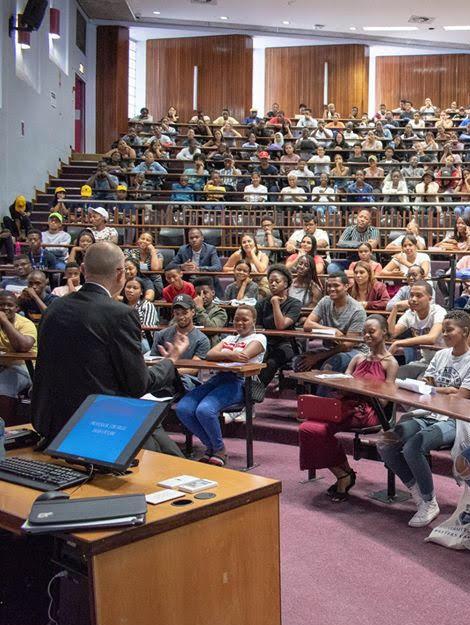
“Several improvements will be made to further enhance the data analytics capabilities at UWC. These initiatives will contribute to effectively using data for decision-making and promoting a data-driven culture. The ethical use of data policy will be finalised.”
analytics capabilities at UWC. These initiatives will contribute to effectively using data for decision-making and promoting a data-driven culture. The ethical use of data policy will be finalised.” from data-disengaged to data-enabled. Through awareness campaigns, communication strategies and targeted interventions, a culture of using data for decision-making has been cultivated, improving student success outcomes.
Next steps: Several improvements will be made to further enhance data analytics capabilities at UWC. These initiatives will contribute to effectively using data for decision-making and promoting a data-driven culture. The ethical use of data policy will be finalised. This policy will provide clear guidelines and principles for data’s responsible and ethical use. Input from stakeholders is being incorporated to ensure alignment with institutional values and legal requirements. Efforts will be made to increase faculty, staff and students’ awareness of the importance of data analytics and its role in supporting student success. Communication strategies, including regular updates, workshops and awareness campaigns, will educate the university community about the benefits and applications of data analytics. We will further improve data governance processes to ensure data accuracy, security and integrity. This includes establishing clear data governance policies, defining roles and responsibilities, implementing data quality assurance measures, and establishing data stewardship practices. Regular audits and reviews will identify areas for improvement and ensure compliance with data protection regulations. A data analytics colloquium will showcase the effective use of data across UWC. This event will feature success stories, case studies and innovative initiatives that have used student success data to improve retention, academic performance and overall student well being, with the hope that it will inspire the UWC community, encouraging further collaboration and the adoption of evidence-based practices. Ongoing training and professional development opportunities should be provided to faculty and staff to enhance their data analytics skills. Workshops, seminars, and online courses can be organised to equip individuals with the necessary knowledge and tools to analyse and interpret data effectively.

Objective 2: Using learning analytics for enhanced student support aims to apply learning analytics to improve academic and psycho-social student support. Data about students’ learning behaviours and progress can identify who might be struggling and why, and then offer tailored interventions to support them.
Actions taken to meet objective 2: The following student support initiatives have been implemented to achieve the second objective:
Online mental health platform
• Senior peer buddy programme
Academic advising initiative
Online mental health platform and senior peer buddy programme:
The Centre for Student Support Services (CSSS) has developed and piloted a predictive student thermometer assessment instrument designed for the UWC student. It offers students an opportunity to identify strengths and areas of concern that need to be addressed, and provides a personal map and enablers that activate student agency. Encouraging students to be coconstructors of their own success is foundational to the tool. Integrating this assessment as a requirement for all students is a proactive way to increase student awareness of the areas that require action to enhance retention and academic success. Several focus groups have been conducted to amplify the student voice and faculty input to improve the instrument for full implementation in 2024. The 30-day goal buddy and in-curriculum offering of the GDP as a one-year psycho-social adjustment, personal and academic skills development programme are essential enablers to augment the tool. Monthly mental health promotion campaigns have been offered and mental health podcasts are being developed to augment online resources available to students.
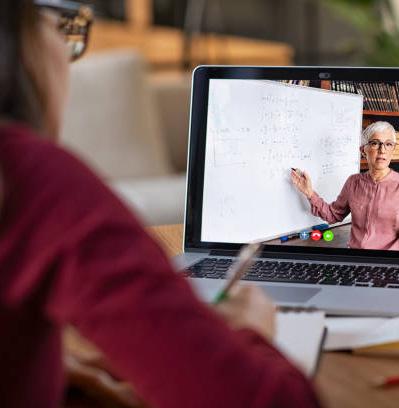
Academic advising initiative
Student success advising is a new high-impact initiative added to Operation Student Success. The aim of the academic advising initiative is to ensure students feel connected, empowered and supported to achieve academic success. This is done through the alignment of personal, academic and career aspirations. In addition to supporting the UWC Student Retention and Success Framework, academic advising will focus on the student walk from pre-entry to graduation, providing advice on academic matters, careers, learning experiences and the essential skills needed to ensure students achieve their personal and career goals. Student success advising at UWC is grounded in holistic support that delivers and integrates academic, social and psychosocial advice in caring and collaborative ways that promote each student’s agency and successful completion of their studies, as well as continued success in their career and life goals.
Next steps: CSSS intends to formalise a clearer project plan that incorporates considerations about students’ needs to improve continual feedback loops that assess and measure efforts for impact. The plan will include specific initiatives and varied forms of communicating and engaging with students, and continually involve considerations around ethics and communications so broader best practices are aligned to the institution’s values and expectations while still connecting with students and remaining relevant to them.
CSSS deals with a collection of students who have little input, exposure and experience from their fellow students (peers) in being part of the UWC student community. To address this shortfall in the students’ academic armour, it is recommended that face-to-face engagements would have a greater impact on student development as well as staff morale. CSSS proposes to expand the reach of the goal and exam buddy programmes to the critical mass via improved marketing strategies in a specified timeframe. Prompts could be enabled in the WOOP application to promote student engagement.
A total of 20 staff and students have completed the Academic Advising Professional Development course offered by the University of the Free State. We wish to continue supporting faculty officers and other staff members on the working group as they participate in the course.
Team: The ASSA provides holistic student success support to first-year students and student peers in the mentoring and tutoring programmes. Each ASSA is connected to a faculty and works closely with staff, first-year transition officers and mentors in supporting first-year student success.
Objective 3: The focus of the holistic support for high-priority (at-risk) modules is on providing holistic support to students taking modules identified as high-priority or at-risk. This could include additional tutoring, academic advising, peer mentorship or other support.

Actions taken to meet objective 3: Many modules that were regarded as high-priority before the pandemic have given way to new high-priority modules (HPMs) identified during the pandemic. A more in-depth investigation was conducted on these modules before and during Covid-19. Workshops were held with faculty staff to understand data and seek strategies to support students and staff with the HPMs.
The next step was to use data to get a holistic view of cohorts of students in the identified HPMs. The project aimed to understand student needs according to different characteristics. We triangulated the data from student administrative data and other environments such as student support services, and from surveys. Dashboards were developed, workshopped and shared with faculties:
• The module pass rates dashboard was shared with the student success committee members and the faculties, supported by structured presentation slides.
• Understanding first-year attributes and expectation dashboard was shared with the first-year experience team for consideration.
• Cohort dashboard and reports to faculties.
• Learner analytics progression report and dashboards.
Next steps: the following intervention will be put in place across faculties and institutional support units to provide holistic support to move the HPMs out of the risk platform:
1. Lecturer support: Directorate of Learning, Teaching and Student Success to design support to staff teaching in the HPMs. Determine shifts in HPMs post-Covid and determine which set to focus on in 2024.
2. Tutor support: The Tutor Enhancement Programme will design a programme to support tutors supporting students in HPMs. Conduct staff development initiatives at the programme level, through programme reviews.
3. Student support: CSSS to design a support strategy for students in these modules and the First-Year Transition Programme to ensure the mentoring programme is mandatory for students in HPMs. Work with student structures (SRC and student-faculty councils) to implement improvement strategies in HPMs.
4. Curriculum support: APU to support this area. Support implementation of a tracking system in the HPMs.
5. Data Support: The BI unit will use the learner case management system, the learner analytics progression and performance dashboard and the student tracker to enable comprehensive monitoring of student progress, identification of at-risk students, and proactive interventions to support student success. These data-driven tools will empower staff with real-time insights to make informed decisions and implement targeted strategies for enhancing student outcomes.
The UWC Tutor Enhancement Programme (TEP), which forms part of Operation Student Success in the DVC: Academic’s office, has been conceptualised as a high-impact practice to support student engagement, sense of belonging, academic retention and success. The TEP has been successfully implemented since 2017 against the backdrop of an urgent need to address the university’s high dropout rate and low throughput and success rate, particularly among first-year students and within the undergraduate programmes. The aim of the TEP is twofold. First, to develop an effective and sustainable tutor programme that can contribute to an increase in student engagement, sense of belonging and academic success. And second, to develop UWC’s graduate attributes in our students as a way of nurturing talent and training future academics. The TEP address UWC’s core goal areas: goals one and two of the IOP, which refer to student experience and teaching and learning respectively. Academic departments and tutors take on the responsibility of supporting students to achieve academic success through peer tutoring initiatives across all seven faculties and in two associated departments, CIECT and the Writing Centre. In 2023, the institution spent approximately R16 million on the tutor programme.
Each year, the seven faculties and specific units, Writing Centre and CIECT are provided with a budget to ensure tutors are allocated to HPMs in the undergraduate programmes. Below is the budget allocation for 2023. Part of the funds are allocated from the University Capacity Development Grant and the balance is subsidised by UWC Council funds

Training of new tutors
It is mandatory for new tutors in the peer tutoring programme to obtain generic skills on learning and teaching strategies, communication, dealing with diversity and conflict management so they can be confident and competent tutors able to support students in particular modules. Tutors also receive training from the CIECT to enable them to undertake e-tutoring. Each lecturer is responsible for providing support and training workshops for tutors in the subject content. A total of six training workshops were delivered at the beginning of the year and online training
Training date Training day
online training in the second semester, with 55 tutors being trained. One of the challenges with tutor training is finding suitable times and venues to conduct workshops. In 2023, 389 tutors signed up for training but only 287 (74%) completed it in semester one. Moving forward, better systems must be in place to ensure tutors providing such a key support service that influences student success are qualified and equipped to perform the task. Also in 2024, as requested by faculties, one training workshop online will be offered every month for new tutors joining throughout the year.
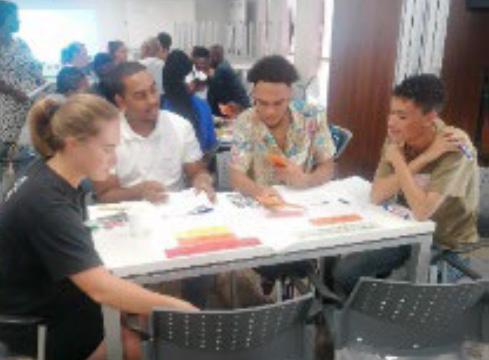
Total number of tutors trained from the start of the TEP in 2017
The highest number of tutors that were trained was in 2021 and 2022 during the Covid-19 pandemic when all tutors needed to be trained on delivering tutorials in the online environment. New strategies needed to be taught to engage with students online.

Tutor and student feedback on tutorials In 2021 an institutional feedback instrument was developed to collect feedback on the impact of tutorials on both students and tutors. The following tables include the voices of the students and the peer tutors.
Number of Respondents 1224
Most used tutorial format
How many of the tutorial sessions have you attended?
How often did you have tutorial sessions in a week for evaluated module?
Time spent on activities for evaluated module
One-on-one Consultations
Online tutorials due to Covid-19
Ranking teaching strategies used in tutorials
63% responded Almost All, while 6% said less than a quarter.
66% responded once a week, followed by 13% with twice weekly.
There were barely any faceto-face tutorials held, mainly due to Covid-19 pandemic restrictions.
66% had no one-on-one consultations with their tutors due to Covid-19 restrictions.
Online Platforms – largely attributed to the ongoing impact of Covid-19.
66% responded Almost All, while 5% said less than a quarter.
74% responded once a week, followed by 15% with twice weekly. 1% said 0. So when do they have tutorials exactly?
Most students spent <1 hour and 1-2 hours on actual tutorial sessions.
In-person Tutorials – In contrast to 2023, tutorials shifted away from predominantly online sessions, reflecting an absence of Covid-19 restrictions.
79% responded Almost All, while only 4% said less than a quarter.
85% responded once a week, followed by 9% with twice weekly. 1% said 0
Similar to the previous year, majority of the students spent <1 hour and 1-2 hours on actual tutorial sessions.
The traditional style of teaching online, questions and answers
Students’ responses of their tutors over three years: 2021,2022, 2023
Tutor’s professionalism
Tutor’s engagement skills
64% of the respondents indicated that they do not spend any time on One-onOne consultations. Was this due to the Covid-19 aftermath? Or a lack thereof?
Peer-to-peer work, traditional lecture style and questions and answers were the highly ranked teaching strategies.
Again, 64% of the respondents indicated that they do not spend any time on Oneon-One consultations. Was this due to the the Covid-19 aftermath? Or a lack thereof?
Peer-to-peer work, traditional lecture style and questions and answers were the highly ranked teaching strategies.
Across the three years, an overwhelming 86% or more of respondents consistently affirmed the professionalism and display of professional behaviour shown by their tutors. This trend underscores the strong vote of confidence from students in the consistent delivery of professionalism.
Students provided highly positive feedback on tutors’ engagement skills, except for the aspect of regular contact outside tutorial hours. In 2021, only 52% said they had had contact with their tutors outside of tutorials, with 49% in 2022 and 47% in 2023. This suggests a need to improve off-tutorial interactions while acknowledging the tutors’ strong engagement during sessions.
Tutor’s interpersonal skills In the realm of interpersonal skills, responses were again overwhelmingly positive across all three years. However, there was a lack of personalised interaction and effort in familiarising themselves with the students at an individual level. Across all three years there was a negative response to the question relating to tutors knowing their students’ names.
Tutorials’ influence on academic performance
Tutorials’ Influence on academic performance and social skills
Across the three years, an outstanding 81% or more of respondents consistently indicated that tutorials had had a positive influence on their academic performance.
Amidst predominantly positive feedback, two specific aspects gathered less favourable responses. Students indicated limited success in using tutorials as a means to foster new friendships at the university. Additionally, the lack of contact with tutors outside of tutorial classes emerged as another area of concern, hinting at potential challenges in establishing connections beyond formal instructional settings.

Number of modules responsible for 79% of tutor respondents were responsible for one module.
Method of tutoring used for module evaluated
Time spent on activities for evaluated module
Tutor engagement with student and lecturer
Online tutorials due to Covid-19
Most evaluated modules
There were barely any faceto-face tutorials held, mainly due to Covid-19 pandemic restrictions. However, 22% of respondents indicated they spent 1-2 hours on face-to-face tutoring.
63% indicated that they spent time with their lecturers. This justifies the assumption that tutors served as a link between students and lecturers during the hard lockdown.
Tutor’s Response to TEP over the three years: 2021, 2022, 2023.
Tutorial planning for module
Tutorials module
88% of tutor respondents were responsible for one module.
In 2022, as a continuing result of the Covid-19 pandemic restrictions, 69% of tutorials were held online, with only 19% of tutorials held in-person.
Most of the tutors spent <1 hour and 1-2 hours on actual tutorial sessions.
82% of tutor respondents were responsible for one module.
During 2023, we saw a change in tutorial methods, with 77% held in person. The rest were hybrid and in person.
Similar to the previous year, most of the tutors spent <1 hour and 1-2 hours on actual tutorial sessions.
In 2022, we saw a 21% rise in one-on-one consultations, as compared to the previous year.
MAT105, CHE114, MAM150, MAN131, MAM152, CHE116, LSC141, LCS111, BTN 222
One-on-one consultations continue to rise. We saw a rise of 24% as compared to 2021, and 3% as compared to 2022.
QSC131, LCS111, IFS131, SOC151, PHY151, MAT105, LSC141, ALC131
Across the three years, an overwhelming 93% or more of respondents consistently indicated that they planned effectively for tutorials. This included ensuring they had the necessary materials to conduct the tutorials, received tutorial outlines from lecturers and had their roles and responsibilities explained to them. However, though still satisfactory, we saw a slight decline across the three years in terms of weekly feedback meetings between tutors and lecturers.
Across all three years, and compared to other learning activities, students were less engaged in the learning process with their peers. This could be for several reasons, including lack of interest, diverse learning styles, lack of preparation and group dynamics.
Self-reflection on the module Almost all respondents indicated that tutoring improved their self-confidence and taught them life skills they would carry into the work environment. It was also pleasing to see an increase every year in the number of tutors who said tutoring had influenced them to consider a career in academics or lecturing.
The following actions were identified from the feedback survey from students and tutors:
• Personalised interaction - Encouraging tutors to make efforts to familiarize themselves with their students personally could enhance the sense of connection and support within the tutorial environment.
• Off-tutorial engagement - Encouraging more interactions or communication channels beyond class hours might help students feel more supported and engaged with their tutors.
• Social integration - Encouraging collaborative activities or group discussions during tutorials could facilitate a sense of community and friendship among students.
• Consistency in communication - Ensure consistency in the number and frequency of tutorial sessions per week. Timely feedback - Encourage more meetings between tutors and lecturers where lecturers get feedback on tutorial sessions.
• Address different learning styles: Incorporate various teaching methods to accommodate different learning preferences among students.
• Feedback loop: Encourage continuous feedback from students regarding the tutorial structure, content, and teaching methods.

As part of Operation Student Success, the office of the DVC: Academic added another high-impact practice to support holistic student success at UWC. The Academic Advising initiative is a collaboration with faculties, student support services, student administration and the DVC: Academic’s office to assist undergraduate students to plan and manage their academic journey at UWC.
The Academic Advising initiative aims to ensure that students receive an inviting academic advising experience that contributes to a successful academic and career pathway. In addition, and building on the UWC Framework for Student Retention and Success, the Academic Advising initiative focuses on the ‘student walk’ from pre-entry to graduation, providing students with advice on academic matters, careers, learning experiences and essential skills needed to ensure they achieve their personal and career goals.
In 2023, Academic Student Success Advising (ASSA) focused on high-priority modules (HPMs). The decision to focus on such modules was to address the number of students who were stuck in the pipeline to on-time completion. The following six modules were identified as HPMs that were situated in six faculties and across 20 streams. A total of 622 students were contacted and support offered if needed.
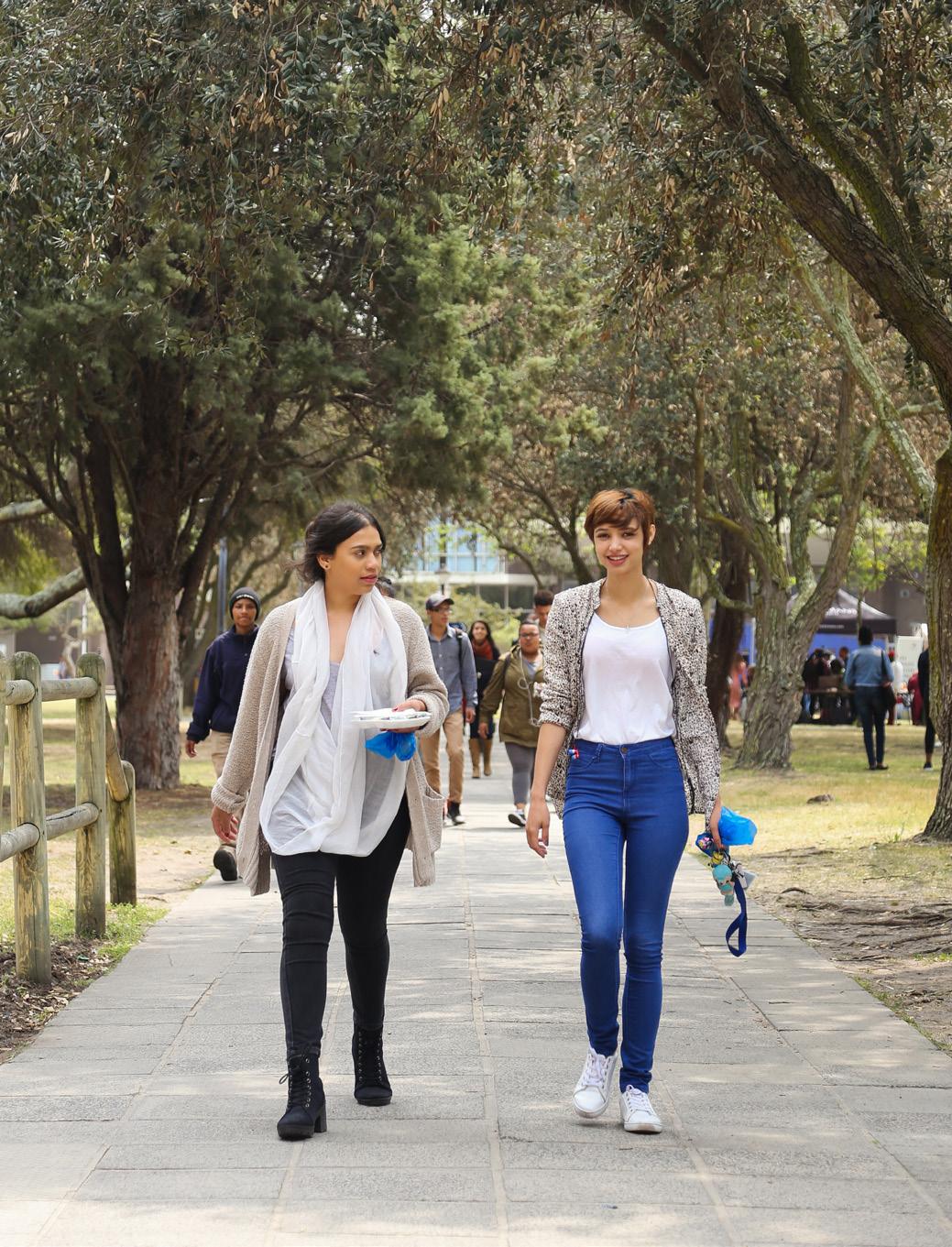
Additional ASSA and tutorial support was offered to students during the examination preparation week in a collaborative initiative between the offices of the Deputy Registrar and the DVC: Academic. The examination preparation sessions were held at the Jakes Gerwel Hall between 11am and 2pm from 25–27 October 2023. The ASSAs played an active role in the examination preparation week sessions. Predetermined HPMs per faculty were identified and students were informed of these sessions. Tutors were also notified and these sessions were with targeted students in preparation for the final examination. Before the study break, an email was sent to all students notifying them about the event. The event was well attended by students, who took time out of their schedules to gather the last bit of support from their tutors or lecturers. Students were told which days their module/s would be featured in the hall.
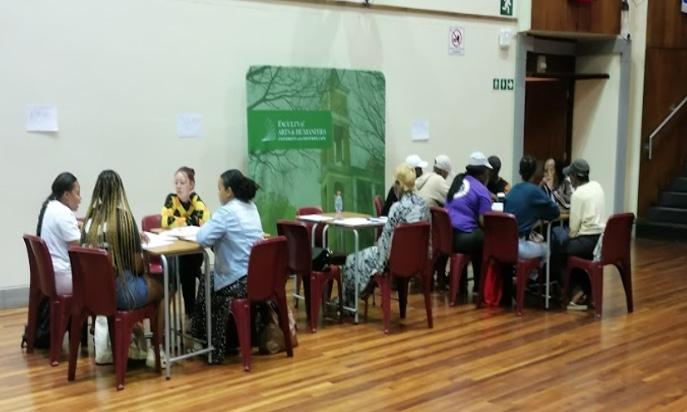
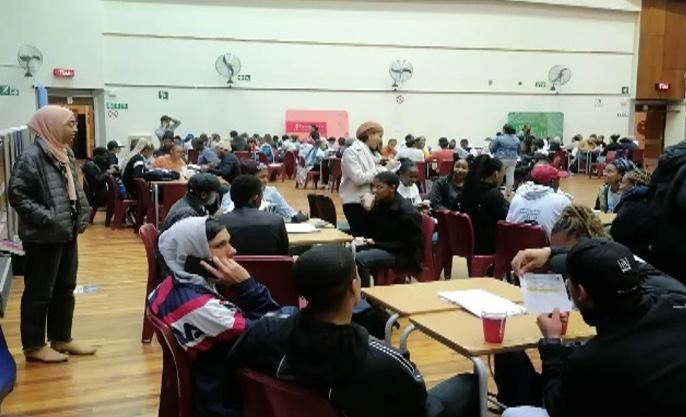

The vision for UWC’s First-Year Experience (FYE) is aligned with the institution’s mission. Our vision is to significantly enhance first-year student retention, engagement and success by addressing issues relating to first-year transition and improved academic performance. The term ‘student experience’ is used interchangeably with student engagement, which is often applied in higher education. FYE includes transition to university; student aspirations; balancing work, study and social commitments; social and academic integration on campus; student satisfaction; and response to courses in the programme of study.
The UWC FYE is an intentional and student centred programme that fosters an inclusive transition into higher learning in a systematic and coordinated way that celebrates diversity and UWC values. The programme integrates curricular and cocurricular activities to facilitate a shared sense of belonging, retention and success for all first-year students..
The idea of the FYE talks was adapted from TED Talks, aiming to bring students together in short and meaningful conversations and to encourage them to speak up and take agency in matters that involve their well-being and their academic journeys. Online FYE talks were successfully launched during Covid-19 in the second semester of the 2020 academic year. They continued in 2021 and 2022 but we realised that the academic load limited students’ regular attendance. To give students a fair chance to attend, we implemented biweekly sessions. As UWC returned to face-to-face lectures and tutorials in 2023, FYE talks remained online, allowing for a larger audience greater convenience for students. The talks are designed for the one-hour lunch break, allowing students to enjoy their comfortable and familiar campus spots while attending the sessions. The FYE talks commenced from term two.
Some FYE talks seemed to be better attended than others, as a result of which we decided to introduce more student voices and engagement, as well as social and play integration with guest speakers.
Within the FYE, we recognise the crucial significance of establishing and maintaining a presence across a variety of social media platforms. This section of the report showcases our endeavours and achievements as we embarked on a journey across platforms, including Instagram, Facebook, WhatsApp, TikTok and YouTube. Our engagement on these platforms has allowed us to reach, connect with and empower our target audience, primarily comprising first year students, mentors and support staff.
By strategically using these social media channels, we have not only disseminated vital information but also created spaces for interaction, support and inspiration. Whether it’s sharing key updates, offering academic advice, promoting wellness or celebrating accomplishments, our presence on these platforms has helped to address the multifaceted needs of our community. The image opposite, crafted in February 2023, is an example of our visual directory, collating the links for our FYE social media channels and delivering this information directly to first year students via email. This resource acts as a digital gateway for our audience, making it convenient for them to connect with us, stay informed and engage with our content, events and initiatives.
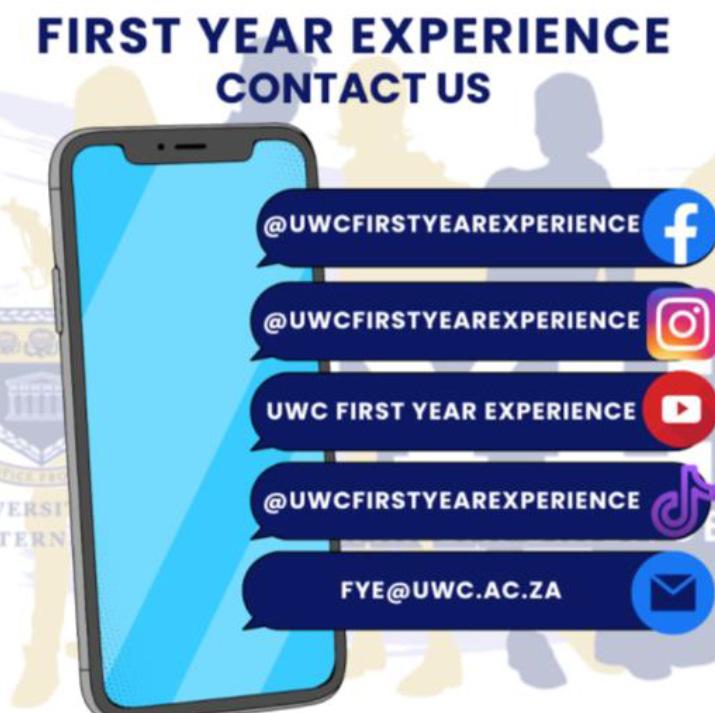

By embracing the digital landscape and strategically leveraging these platforms, the FYE programme is at the forefront of providing timely, relevant and engaging content. Our dedication to enhancing the first-year experience and promoting academic and personal growth remains at the core of our social media efforts.
The content strategy employed across social media platforms was structured around a set of categories, each designed to provide valuable and engaging information tailored to the theme of the day. This strategy ensured a consistent and predictable flow of content but also catered to the diverse interests and needs of the audience throughout the week. The content within these categories was carefully curated to resonate with the audience’s interests, needs and aspirations. Whether it was a thought-provoking quote on Monday, a practical study tip on Tuesday or a fun and celebratory post on Friday, the content was designed to create a well-rounded and engaging social media presence for the FYE programme
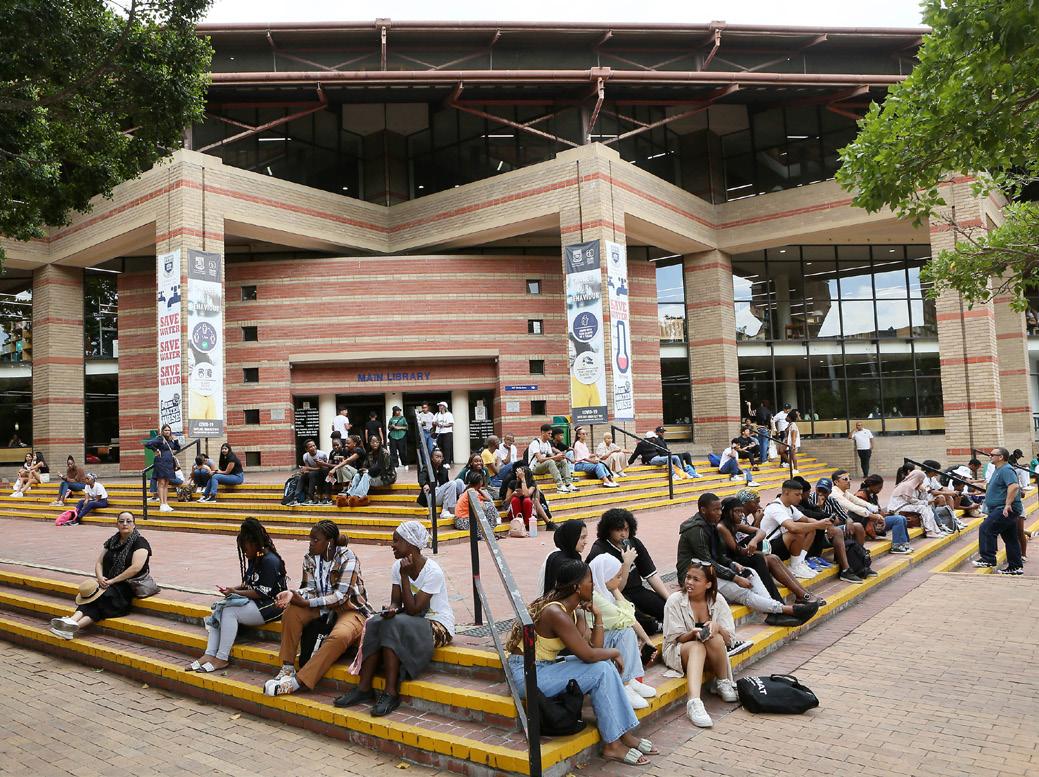

Monday Motivation: This category was all about starting the week with a dose of inspiration and positivity. It often featured motivational quotes, success stories, or encouraging messages to help followers start their week on an upbeat note. These posts aimed to boost morale and motivation, setting the tone for a productive week ahead.
Tuesday Tips: On Tuesdays, the content shifted towards practical advice and tips. These posts covered a wide range of topics, from academic success and time management to health and well-being. They provided followers with actionable advice and insights they could apply to their daily lives, aligning with the goal of the FYE programme to support and educate its audience.
Wednesday Wellness: Mid-week, the focus shifted to wellness. These posts were designed to promote physical and mental health, offering suggestions for self-care, stress management, exercise, and healthy living. It was an opportunity to remind the audience about the importance of well-being and provide guidance on achieving it.
Thriving Thursday: Thursday’s content aimed to empower followers with content that encouraged them to thrive in various aspects of their lives. This could encompass personal growth, career development, leadership skills, and more. The goal was to equip the audience with the tools and mindset to thrive in their academic and personal journeys.
Friday: As the weekend approached, the content on Fridays typically took a more light-hearted and celebratory tone. It was a day to acknowledge achievements, share fun content, or simply celebrate the end of the work or school week. This helped build a sense of community and camaraderie among the followers.

By offering a balanced mix of motivational, informative, and entertaining content, the program aimed to keep its followers engaged and connected throughout the week, while also promoting the overarching goals of the FYE initiative.
The table below provides a comprehensive overview of the First-Year Experience (FYE) programme’s presence on different social media platforms, detailing their engagement levels over the year, with quarterly breakdowns. This information is essential in understanding the programme’s outreach and the preferred channels through which it connects with its target audience.
About 13,000 (7.5%) individuals viewed the FYE menu. This indicates that students are keen on the help and resources provided to kickstart their higher education journey. Among the most asked questions to the chatbot, “Need academic advising?” stood out as one of the top 10 inquiries, with a striking outreach to 4,104 students.
The FYE Chatbot, situated on the UWC website, underwent an update to include fresh information pertinent to the upcoming 2024 academic year. To facilitate this update, the Deputy Registrar’s Office has received the following data for uploading:
Information and contact details related to the First Year Transition Programme, including details about First Year Transition Officers.
Information and contact details concerning Academic Advising, featuring details about Academic Student Success Advisors.
Details regarding the FYE program’s presence on various social media platforms.
The schedule for the 2024 FYE Talks.
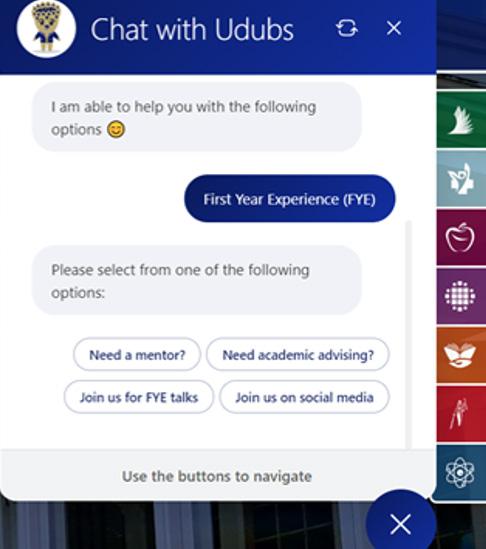
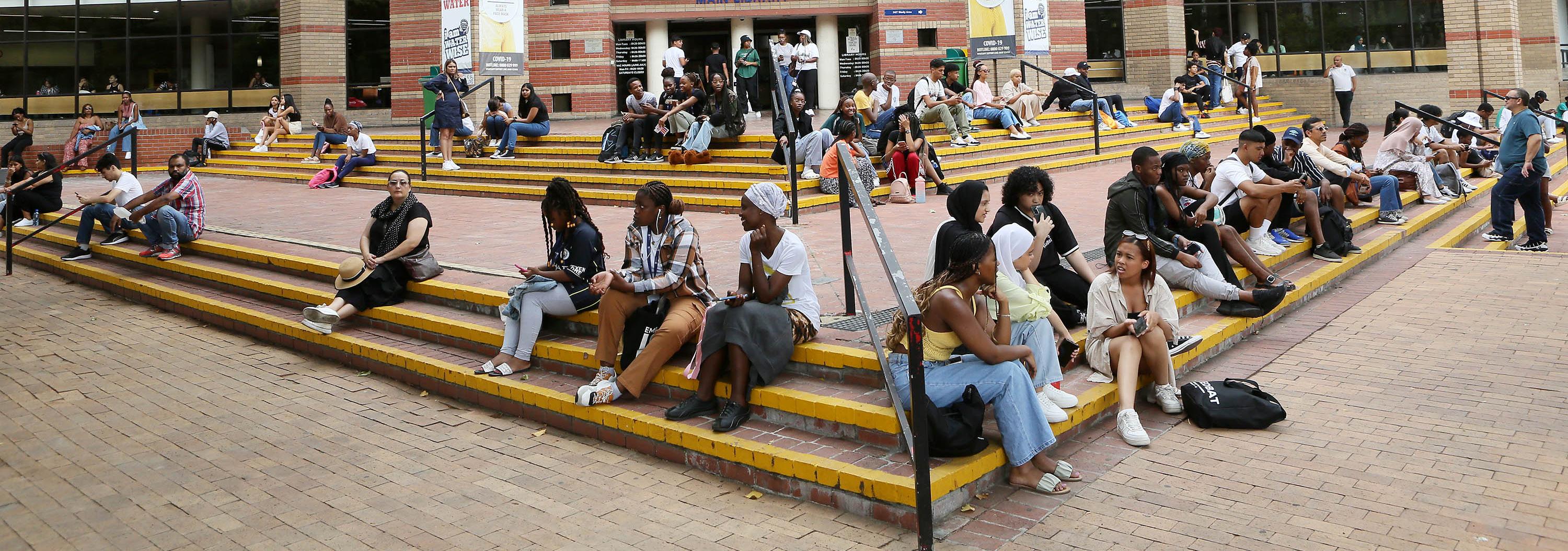

The FYTP newsletter is a quarterly summary of the activities that have occurred throughout the term. These newsletters were distributed to all deputy deans of teaching and learning as well as the teaching and learning specialists across the seven faculties, in addition to the DVC: Academics office, first year mentors and all registered first-year students. The newsletters can be seen on the right.
The FYE website is undergoing construction to enhance its functionality and integration within the official UWC website. This reconstruction involves the incorporation of critical information, including details about the new DVC: Student Development and Support, as well as updated contact numbers for essential support services. Once these modifications are completed and verified, the FYE course will also be integrated into the FYE website as an additional resource. Furthermore, the website will feature a user-friendly 360-degree virtual campus map, offering invaluable resources and navigation aids to incoming students, simplifying their transition and introduction to the university.
The First-Year Transition Programme (FYTP), which forms part of the FYE, was introduced into all seven faculties. The FYTP forms part of an intentional, collaborative partnership between first-year students and the university. The foundation of this programme is the partnerships that are formed between first-year students and mentors; mentors and First Year Transition Officers (FYTOs); and FYTOs and staff members. FYTOs and mentors are senior and postgraduate students. The use of senior students as partners in co-creating spaces for first-year students to feel a sense of belonging and connectedness to the institution is datainformed and was a result of findings from the institution’s online first-year expectation and first-year experience surveys. A firstyear mentor is a senior full-time student tasked with providing guidance and advice to first-year students within their faculty. Their responsibilities include offering psycho-social support and connecting students with various campus resources. The programme assigns mentors from each faculty, and they work closely with first-year students in corresponding departments within their faculties. The distribution of mentors is detailed in the table overleaf.
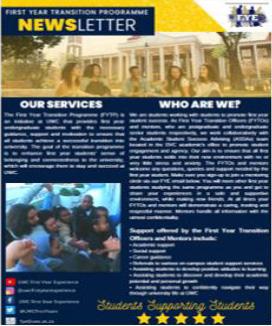
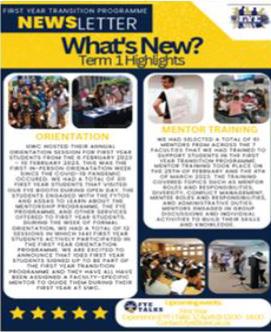
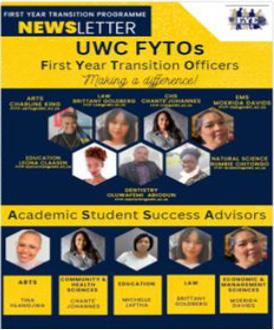

Mentor-mentee partnerships
Peers supporting peers at different levels of the transition programme is the strength of the programme. Students identify with each other and are relatable to one another’s needs. The FYTOs are mentors to the first-year mentors (who are their mentees), and the first-year mentors are mentors to the firstyear students who are their mentees. Mentors and mentees, as
participants in the mentoring partnership within the FYTP, are
Development of mutual trust, as a result of mutual respect; • Growth and discovery, through support and challenge; • Openness to give and receive help and feedback; and Action and results, the ability to make it happen.
Seven FYTOs are appointed each year, one for each faculty and the table below indicates the mentors appointed in the seven faculties from 2019 to 2023.
Training of FYTOs and mentors
Training of FYTOs and mentor training occurred in February 2023 and March 2023. Training is provided is as early as possible before the FYTOs and mentors engage with first-year students and faculties. FYTOs are post-graduate students registered in the selected faculty, while mentors chosen are undergraduate students also in the same faculty as their mentors selected. During the initial session, mentors delved into their roles and responsibilities, learning about how to navigate a diverse
institution and effectively manage conflicts. Sixty mentors are selected each year. The engagement with them is very interactive and incorporates various activities to foster collaboration within the group, agency, diversity, communication, providing feedback and conflict management skills. The second set of training centres around roles and responsibilities, and engagement with staff also covering essential documents, guidelines, and structures pertinent to conducting mentoring circles, meetings and report writing. The following skills are intentionally highlighted and practiced.
Listening actively
Building trust
Encouraging
Identifying goals and current reality
Shared core skills
Source: Skills for Successful Mentoring (Phillips-Jones, 2003)

Capabilities inspiring
Providing corrective feedback
Managing risks
Opening doors
Mentorspecific skills
First-year mentee numbers have been steadily increasing over the years. More students are seeing the value of having a mentor guide and support them in their first year of university.
Mentee Voices on the FYTP
Feedback from students is key to the programme developing and growing. The FYTP is a shifting target as it needs to constantly change and grow, taking into consideration the context of students and the institution. Below are some direct quotes from the mentee feedback on the mentorship transition programme. How has the mentor-mentee partnership helped you in your first semester?
It has provided me with an immaculate support system that immensely helped me be able to cope and want to further improve myself.
It made it easy for me to adapt to university life and manage my time as a student as well as preparing efficiently for examinations.
It was great. My mentor was always ready to assist in any way that she could. She would help us with a lot of things. I could even cry a little to her but she’d be able to direct me to all the relevant people I need to speak to about whatever area I’m crying about.
My mentor helped me to manage my time well and to cope with many tasks. She taught us the importance of not only focusing on academics but making time for family and friends as well. She taught us about the importance of having to qualify for exams.
The mentorship helped me in accepting my small academic failures that were a threat while trying to save the semester and helped in keeping my mental wellness in check. I actually have social anxiety but with the help of my mentor I was able to overcome it and make a lot of friends.
At the start of the year I was quiet most of the time with other fellow students when they were busy introducing themselves to each other so through the partnership I slowly got confident in expressing myself around other students.
• I realised that I am not the only one who studies Computer Science and me trying to do it all on my own is just selfish because the learning is much easier with others. Though all of us came from different backgrounds, it was never about where we came from but about where we are at the moment and where we are going.
The three collaborative projects extend from 2023 to 2025. Two are University Change Delivery Group collaborative projects while the third is an international multiple-stakeholder research project. All three focus on student and staff partnerships to enhance student retention and success.
UWC was one of the seven new institutions invited to participate in the collaborative grant for intentional development and support in Academic Advising initiatives. In addition, each institution had the opportunity to engage with the global academic advising association (NACADA) and connected with the national association, ELETSA at UFS. The opportunity to network locally and globally allowed us to develop communities of practice and learn from each other. Twenty-four UWC staff members and students from across faculties and units have also completed the Academic Advising Professional Development short learning programme. This has made it easier to work across departments and faculties to ensure that academic advising at UWC is holistic and intentional.

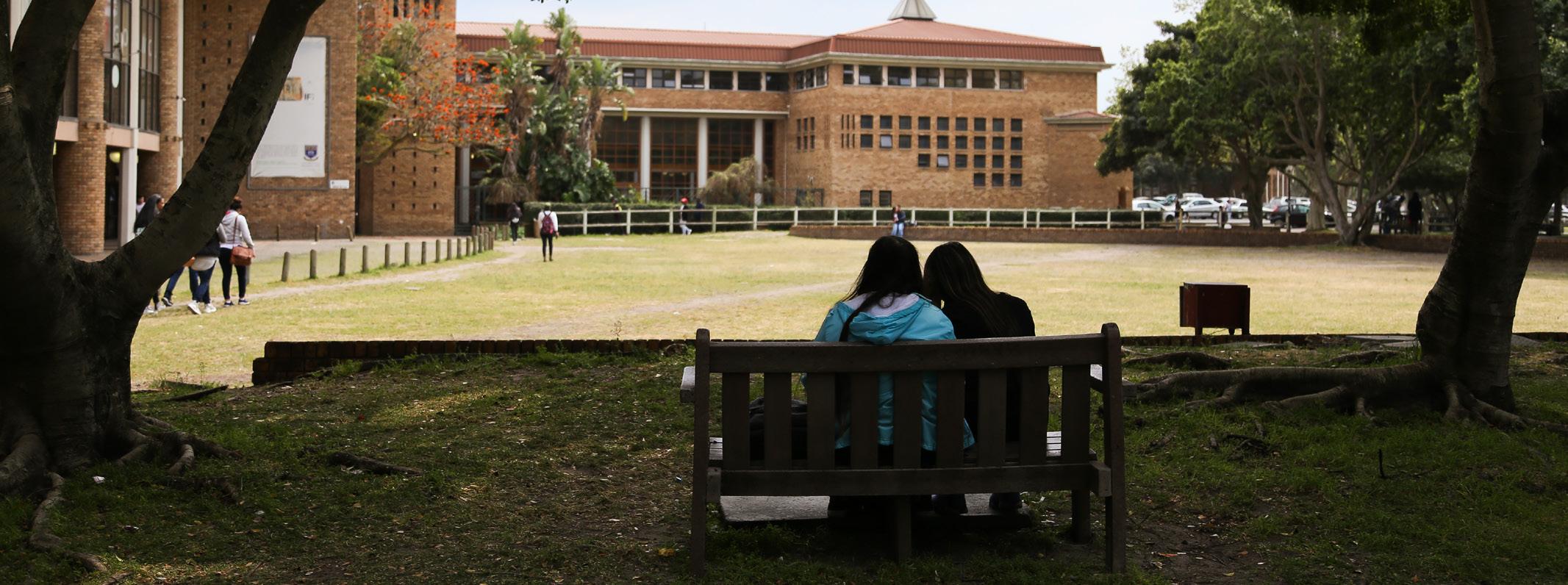
Designing for Social Justice Partnerships: UWC, CPUT and UCT
The Designing for Social Justice Partnership (DSJP) programme builds on experience from our Cape Higher Education Consortium short course on cocreating across the curriculum. The aim of this project is to provide staff student teams with the opportunity to cocreate/codesign courses as well as to promote the scholarship of learning and teaching through codesigning, conducting and publishing research on the effectiveness of these cocreated designs. Reflecting on the previous project, the rationale for this iteration seeks to design for social justice partnerships which enable the conditions that cultivate an academic community premised on the values and principles of open collaboration, forward-thinking and socially just design principles, shared between, among and with staff and students from multiple institutions. The DSJP programme seeks to expand the capacity of staff in South Africa through a regional student staff partnership (SSP) network and beyond to embrace social justice in the design and delivery of courses, while simultaneously increasing student success and advancing convergent research on its implications and long-term effects.
The DSJP research project will be distinctive in that it will extend existing SSP models to not only embrace social justice in higher education design and assessment, but to orient learning, teaching and research to the broader social context of the Global South, and South Africa specifically.
Mentoring meaningful learning experiences: Elon University, USA
The three-summer research seminar facilitates multi-institutional research on mentoring meaningful learning experiences. As part of the multi-institutional cohort of researchers, our collaborations included an investigation on the quality characteristics of
mentoring and how universities can foster equitable cultures of mentoring that:
• Support all students in identifying, developing, and maintaining personalized mentoring relationships;
• Build trust and empower students, particularly from marginalized communities, to identify mentoring relationships as normal, productive relationships worth pursuing; and
• Prepare academics, staff, and students to participate in meaningful mentoring relationships that adapt to members’ evolving needs over time
The theme for day one of the 2023 Academic Week, which focused on student voice, was student-staff partnerships. The event in August was attended by more than 70 staff and students. Staff were asked to submit proposals and present their partnership with a student. The student-staff partnership movement arose to challenge conventional power relationships at universities through the amplification of student voice and advocacy for meaningful student participation in teaching, research and support services (Bovill et al, 2011). In teaching, the movement recognises students’ expertise as learners, a perspective that differs substantively from that of lecturers or academic staff developers. This recognition, and an emphasis on social justice, enables students to contribute meaningfully to conversations about advancing desired learning outcomes, overcoming persistent challenges, student success barriers, and developing courses on subjects that are personally and professionally meaningful (Butcher & Maunder, 2014). Students and staff shared their experiences and reflected on the partnership, their personal growth, and the contribution to social justice and student success.

8:30am Opening address & welcome
8:40am Introduction: A social justice approach to student-staff partnership
DVC Academic’s office
TIME PRESENTERS
9:00am - 9:15am Prof Bradley Rink with student: Mr. Jaydeen Pretorius
Faculty of Arts & Humanities Faculty
9:15am - 9:20am Discussion: Q&A
9:20am - 9:35am Dr. Samuel Lundie with Students: Ms. Misha-Dee Dirkse; Mr. Luqmaan Daniels; Ms. Nicole Taryn Daniels; Ms. Tiffany Charne Darling and Ms. Shria Dheyaram
Faculty of Dentistry
9:35am - 9:40am Discussion: Q&A
9:40am - 9:55am Ms. Chante Johannes and Ms.Tina Hlanjwa
DVC Academic’s Office: Academic Students Success Advisors
Prof Vivienne Lawack Deputy Vice Chancellor: Academic
A/Prof Subethra Pather Teaching & Learning Specialist
TITLES & PROPOSALS
For Slow Teaching: Courageous and Compassionate Pedagogy in Times of Change
Slow teaching is a nascent movement forwarded by scholars who seek to imbue their teaching with attentiveness, deliberation, thoughtfulness, and open-ended inquiry. This paper presents findings from a TAU4 project in which slow teaching practices were applied within a first year GES111 Introduction to Human Geography at UWC. Focusing on ‘slow’ teaching not in terms of velocity but rather in terms of measured, deliberate and reflexive methods, the experiment with slow practices attempted to not leave others behind at the expense of progress. Drawing on lecturer, tutor and student reflections, this project was informed by theoretical insights from Slow scholarship, Slow teaching, authentic learning, Flux pedagogy and its ‘brave spaces’ for learning, and epistemic access. Findings suggest that slow teaching practices fostered epistemic justice by valuing everyday student knowledge, imagination and practice. This is where courage (for change) and compassion (embracing alternative views of the social world) on the part of both teaching staff and students together have the ability to impact on pedagogy.
Dentistry students working in partnership with staff in student-led research projects.
Engaging students actively in their learning is the most common form of partnership. Students acting as agents of change by setting their own agenda for research on teaching and learning, engaging with research processes and the implementation of solutions. Students apply and develop their research expertise in the context of their subject, taking responsibility for engaging with research-led, evidence informed change, and promoting reflection and review at faculty level.
Examples in practice of students working in partnership with staff can be found in student-led research projects in the Faculty of Dentistry. One of the student-led research projects focused on patients’ perceptions and attitudes towards receiving dental treatment from students. This research enabled dental students to identify problems and insecurities experienced by patients, in order to enhance overall treatment.
The research revealed that there is a level of progression with regard to comfort and confidence experienced by patients when treated by dental students at the faculty. The results obtained from the research, which correlates with the literature, provide a clear idea of the perceptions of patients treated by dental students at UWC. This study contributes to the existing body of knowledge but could serve as a stimulus for more robust and rigorous research to be conducted by the faculty.
Building student ggency: Peer-to-peer and staff partnerships in a first-year transition Programme during Covid-19
The First Year Transition Programme (FYTP) was established to assist new students in their first year by creating peer partnerships between First Year Mentors (senior undergraduates) and First Year Transition Officers (FYTOs). However, Covid-19 presented challenges, leading to feelings of isolation and apprehension among firstyear students (mentees). Mentors and FYTOs collaborated with mentees through online FYTP platforms to nurture their sense of agency. This presentation delves into how the FYTP’s peer-to-peer approach played a crucial role in supporting and enhancing the agency of first-year mentees during the pandemic. Using Zepke & Leach’s (2011) conceptual framework, the presentation examines how student engagement through peer partnerships influenced support for first-year students amidst the Covid-19 crisis. Utilizing a descriptive qualitative design, the presentation employs a world café methodology and thematic analysis to reveal the impact of peer partnerships on students’ agency. Data was generated by utilising narrative reports by FYTOs (7), mentors (50), and feedback surveys from mentees (98). This research provides valuable insights for stakeholders striving to amplify student retention and success within remote learning scenarios.

9:55am10:00am Discussion: Q&A
10:00am10:15am
Dr. Natasha Ross with Student Ms. Tamsen Orange
Faculty of Natural Science
10:15am10:20am Discussion: Q&A
10-minute BODY BREAK
10:30am -10:45am
Dr. Luzaan Africa with Student Ms. Pholoso Nyalungu
Faculty of Community Health Sciences (CHS)
10:45am10:50m Discussion: Q&A
10:50am11:05am Ms. Michelle Jaftha, Mrs. Moerida Davids and Mrs. Brittany Adams
DVC Academic’s Office: Academic Students
Success Advisors
11:05am11:10am Discussion: Q&A
The benefits of engagement through partnership
We sell students short if we treat learning and teaching as a one way transmission of knowledge and skills. Students aren’t pedagogical experts, however, their experience and expertise typically is in being a student. A student entering higher education brings a whole host of experiences, perceptions and thoughts which can be seen as vital resources for any new learning experience that strives to meet the other with openness, respect and curiosity. Cultivating student-staff partnership can engage and empower traditionally marginalized students and lead to sharing authority and responsibility with staff in the development of culturally sustainable pedagogy. Hence, student -staff partnership invite critical reflections which lead to the transformation of learning and teaching experiences whilst also raising the profile of research into learning and teaching, and employability skills and attributes. Partnership must be embedded beyond documents in order to become part of the culture and ethos of the institution.
Navigating power dynamics and social injustice through social constructivism in interprofessional education
In this reflection, we look at how social constructivism addressed social injustice and power dynamics in various roles in the interprofessional education curriculum. As students, we witnessed how reflection and class discussions challenge entrenched prejudices that support injustices. These discussions allowed us to critically reflect on our own biases and privileges. As tutors, we have come to recognise the value of co-creating knowledge with students, which fosters a shared understanding of reallife social justice issues. Through our interaction with the students, we were able to share knowledge and investigate current social justice issues. Currently, tutor teams frequently meet with the course convenor to exchange personal and professional experiences. This open dialogue enables me to modify the course material to ensure student access to an inclusive and unbiased curriculum. These strategies navigate power relationships between students/tutors and tutors/convenors and promotes social justice by empowering stakeholders to challenge and transform oppressive systems.
Speed bumps and bridges in constructing a university-wide understanding of academic advising: A collaborative student and staff partnerships
While academic advising has global recognition, its implementation in South Africa, particularly at historically disadvantaged institutions, is a recent development. Studies indicate that academic advising can significantly enhance student accessibility, retention and success, making it a pivotal practice in higher education. This study presents a case study involving student-staff partnerships. This partnership involved individuals from diverse units, departments and faculties who collaborated to establish a shared comprehension of academic advising at the University of the Western Cape (UWC). The student-staff partnership group, comprising members from seven faculties, student support units and student registration, engaged in brainstorming sessions addressing three key questions: What is academic advising? What is our current institutional practice of academic advising? How would we at UWC define academic advising considering our institutional context? Collaborative participation fostered trust and cooperation, leading to a unified definition and understanding of academic advising across UWC disciplines and departments. The collaborative process with the student-staff partnership allowed for knowledge sharing practices and the production of an institution-wide academic advising framework. The next steps involve finalising the framework to boost student retention and success, and implementing it across the institution.

11:10am - 11:25am Ms. Salo Moodley with Mrs. Norina Braaf
Economic Management Sciences (EMS) & CIECT
11:25am –11:30am Discussion: Q&A
11:30am11:45pm
Student: Mr Mohamed Hoosain Sungay
Faculty of Law
“To infinity and beyond” - Pushing boundaries and exploring student success
Despite the fact that Covid-19 forced the world into living, learning and working in confined spaces, it also pushed boundaries in `out of the box’ thinking and creative organisation in the world of work. Focusing specifically on higher education, Covid-19 ignited mind-shifts, resulting in innovative practices in the learning and teaching spaces, and cajoling lecturers to delve deeper, rethink traditional practices and explore new possibilities in the online terrain, thus dancing with change. The central aim of this joint presentation is to zoom into the Academic Literacy for Business module (ALB 131) to grasp exactly how this opportunity was harnessed to institute trailblazing, interactive online redesigns, using multiple collaborations with students, tutors and colleagues in our drive for student success. The key objective of these multiple collaborative partnerships in the sphere of planning, learning, teaching and student support was to redefine processes, procedures and power relations for student success. This presentation acknowledges the phenomenal contributions of students, tutors and colleagues, who enabled the opening up of our ALB educational space, drawing in student voices and expertise, thus inculcating deep learning and interactive engagement that fostered student success.
Law
In today’s rapidly evolving educational landscape, it is imperative that institutions prioritise active collaboration between students and staff. This partnership movement bridges the gap between these two crucial stakeholders, creating an environment where both parties can work together to co-create solutions, share insights and contribute to institutional development. I have been a UWC student since 2018, starting my LLB undergraduate degree at our esteemed Faculty of Law. Today, six years later, I am pursuing an LLD Doctor of Laws degree at UWC. Coinciding with my studies, I am a graduate assistant/ assistant lecturer in the Department of Public Law and Jurisprudence. Through this presentation, I will be highlighting the incredible achievements that UWC and I have attained. I’ll draw on my experiences as a student and a member of the esteemed UWC academic community to emphasise the chances I was able to seize thanks to the collaboration opportunities UWC provides.
11:45am11:50am Discussion: Q&A
11:50am12:20pm Mrs Elizabeth Booi & the Data Analytics Team
12:20pm –12:25pm Discussion: Q&A
12:25pm Closure
Shared goals, shared success: The power of partnership in data analytics.
Prof Subethra Pather

1. Cupido X., & Pather S. (2023) Hope in Times of Trouble: An Academic Development Perspective of Learning and Teaching During a Crisis. ISSN: 2188-1162 The European Conference on Education 2023: Official Conference Proceedings https://doi.org/10.22492/issn.21881162.2023.41 To link to this article: https://doi.org/10.22492/issn.21881162.2023.41
2. Pather, S.; Lawack, V. & Brown, V. (2023). Key Indicators Informing Students’ Perceptions of Online Learning and Academic Performance During the Covid-19 Pandemic. The Independent Journal of Teaching and Learning.18 (1), 22-38. https://journals.co.za/doi/abs/10.10520/ejc-jitl1-v18-n1-a3
3. Pather, S.; Johannes, C.; Abiodun, O. P.; Bota, L.; Chitongo, R.; Davids, M.; Goldberg, B. A.; Jaftha, M & Manie, N. (2023). Peer Partnerships in a First Year Transition Programme During Covid-19: Unmasking Student Voices. Proceedings of The Focus Conference (TFC 2022). Series: Advances in Social Science, Education and Humanities Research, 161-173. ISBN 978-2-38476-006-0. https://www.atlantis-press. com/proceedings/tfc-22/125984263
1. Johannes, C, Titus, S, Pather, S & De Jongh, J. (2023). First Year Experience Practices at a Historically Disadvantaged Institution in Health Sciences: A Reflective Paper. South African National Resource Centre (SANRC), First Year Experience (FYE) conference. East London, 17-19 May 2023
2. Pather.S, Davids. M, Goldberg.B, Hlanjwa. T, Jaftha. M, Johannes. C. (2023). “Speed Bumps” and Bridges in Conceptualising a University-Wide Understanding of Academic Advising: A Multi-stakeholder Collaboration. SANRC FYE Conference. East London, 17-19 MAY 2023.
3. Cupido, X. & Pather, S. (2023). Hope in Times of Trouble: An Academic Development Perspective of Learning and Teaching During a Crisis (70511). Virtual Presentation. The 11th European Conference on Education (ECE2023), 13-17 July 2023. London. UK.
4. Gachago, D., Pather, S. & Cupido, X. (2023). Co-creating Curricula Across Difference: A Path Towards a Liberated Education System. Students as Partners Roundtable, #SaPRT2023 Online, 20 October 2023, University of Melbourne, Australia.
5. Ganas, R., Pather, S. & Krull, G. (2023). In Flight Mode: Taking a “U” journey to explore collective generative leadership in higher education. Higher Education Learning and Teaching Association of Southern Africa (HELTASA) (Un)Conference. 24 to 26 October 2023, NW University, North West, SA.
Pather, S. (2023). Theme: ‘Paradigm shifts, opportunities lost and new frontiers’. Cape Peninsular University of Technology, Faculty of Business and Management Sciences Annual Best Practice Webinar, Tuesday 31 October 2023. Online.
Pather, S. (2023). Siyaphumelela Working Group: Mapping FirstYear Experience Initiatives, Programmes & Good Practices: Towards Developing a National Framework. UWC FYE Practice. Online 27 November & 28 November 2023, from 09h00-13h30. Facilitators: UKZN, UFS, DUT, UWC, NWU, CPUT, and WITS
Thank you to Prof Subethra Pather and team for their hard work and reporting so extensively on Operation Student Success.
he Accelerated Excellence Programme (AEP) was introduced to UWC as a component of student retention as well as in alignment with UWC’s Reward and Recognition Strategy. The purpose of the programme is to provide high-performing second-year students with essential skills for the changing world of work. I would like to thank Dr Anita Maürtin for conceptualising this programme with me and for leading the AEP since 2018.
The AEP’s major criterion is academic achievement in the first year of study. However, the equity of the group is considered as well. Thus, the AEP’s participants are regarded as the highperforming first-year students across faculties, which may not necessarily be the top achievers in the faculty. The AEP is designed to have monthly lunchtime meetings and four weekend residential sessions.
The cohort was the smallest since the inaugural programme in 2018. It started with 13 candidates and eight students completed the course. Three of the dentistry students did not attend module one and withdrew from the programme immediately when module one had been completed. Ten students completed module one. However, one student withdrew from the programme just before module two and the other candidate was withdrawn from the group on day three of module three due to a lack of participation and commitment. We contributed to the contraction and attrition in this group due to a different ethos and value system that developed in students during and after the Covid pandemic. However, we intend doing research to have evidence-based information to substantiate our observations.

Below please find the demographic and general information of the initial cohort with regard to faculty and gender.
The graph below indicates the number gender across faculty of the students who completed the AEP 2023.
The two candidates who did not complete the course were African females who were from the faculties of Law and Natural Sciences.
The monthly meetings remained online but students did participate in face-to-face residential sessions.

The first residential session took place in April, when the topics covered were presentation skills, CV development, analysis of self-awareness reports and interview techniques. The students seemed to form a bond almost immediately because on the first evening they were sharing lived experiences and joking with and about each other. This could be attributed to the small number of candidates in the group.
Residential two was on community engagement, and as in previous years the students thoroughly enjoyed the experience, especially the site visit where they provided information to the students at the Safe Home and where the residents had prepared a programme of some of their cocurricular skills such as gymnastics, singing, dancing and playing musical instruments.
Module three focused on transmedia skills and how they relate to participants being able to market themselves in the changing world of work. The students enjoyed working together to create a podcast. They also were intrigued by the silent walk and other activities in this module.
The final module was on leadership and critical thinking. The students thoroughly engaged and immersed themselves in their presentations. This was also the residential where the students reflected on their journey in the AEP.
Some of the reflections were:
‘The AEP is an amazing opportunity for any student blessed to be a part of it. It not only aims to give you a home as an academic but improves many other skills in a fun but also extremely informative manner. The way the cohorts were structured and the topics discussed were well thought out and exactly what was missing in my arsenal, but leaving enough room to want to learn more outside of the residential. The facilitators, Dr Maürtin, Ms Catherine and Ms Jenine, were very comforting and were amazing at their jobs. They created a healthy environment for students to express ourselves and we could all tell how much they cared. The time they gave up to build on us is invaluable.’
‘AEP was a fantastic opportunity which allowed for my horizons to be broadened. I find immense pride in being part of this group and am appreciative of all that has happened. The staff members, facilitators and peers are all amazing people and the bond that has been made through AEP should be one that lasts. Thank you to all staff and peers, this was an amazing experience.’
‘I feel like after this course I’ve made so many new friends and ones I know will always help bring out the best in me and help me be the best person that I can be. I also feel so much more equipped to take on the real world now that I have a huge set of newly discovered skills in my arsenal.’ ‘The AEP taught me insightful lessons about different skills. It made me feel reassured as a student who wants to overachieve. I think that
for anyone who is an AEP member, it is a blessing to have this experience and opportunity to be part of something that’s very special. It introduced me to a lot of new things and changed my perspectives.’’
‘The AEP is a home away from home for those academically inclined where you know you will always be accepted. The AEP does not judge, and although you have not known one another that long it feels like you have known one another forever. The members of the AEP are the best people I have ever met. They pushed me to be better and accepted me when I complained of something others would find silly.’
‘I really enjoyed the experience and the opportunity the course has give me to grow as an individual within a community. Very grateful for the coordinators, in how they run things. And everything they have done for us. I learned to love the people truly and I know that I will always admire each and every one of them.’
‘AEP is really informative. I enjoyed being part of this community. AEP is a great programme.’
‘Best programme which helps students to become great leaders. Best coordinators who create a relationship with the students and are not dictating. Best programmes really intertwined to make us great leaders.’
Much progress has been made in the implementation of the Apex projects, and the status of many of them moved from red to green, indicating that they are now in the implementation phase in faculties. The projects described below are all in a consolidation phase.
We introduced a reward and wecognition framework in 2017 to foreground excellence and student success. This includes the Guidelines on the Recognition of Excellence in Learning, Teaching and Community Engagement at UWC, which resulted in the first Academic Achievers’ Awards function in October 2017. This became an annual event.
The event includes the Faculty Excellent Lecturer Awards and Faculty Emerging Excellent Lecturer Awards. Faculty Excellent Lecturer awardees are eligible for the Institutional Excellent Lecturer Award and we also award an Institutional Learning and Teaching Excellence Team Award. Since a lot of innovation in teaching was evident as a result of the pandemic, the 2021 event included the Most Innovative Teacher Award, and the same happened for the 2022 awards.
The top first-year and final-year and honours-year performers in every faculty receive Learning Excellence Awards, with awards as well for the overall institutional first year, final-year and honours students.

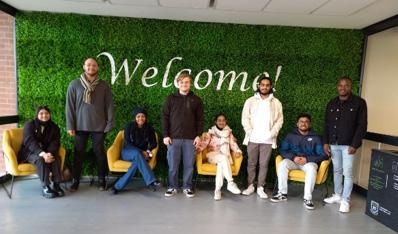
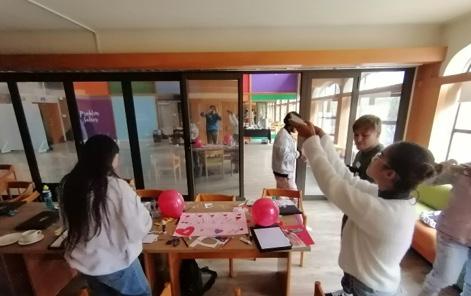

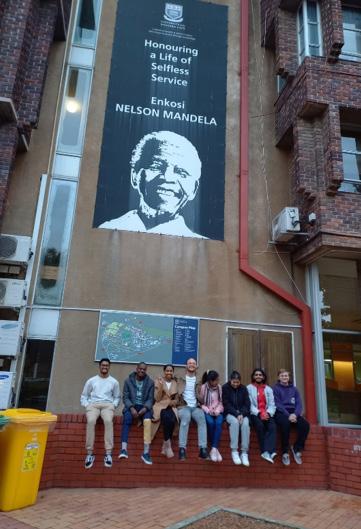

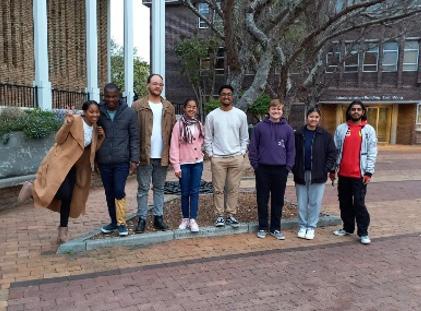
Activities the AEP students were involved in
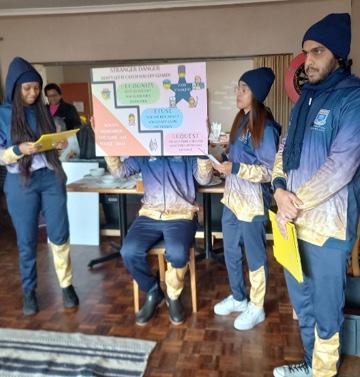

The Engagement Excellence Awards recognise individuals and teams who excel at integrating engagement into the teaching and learning, research and scholarship of the university. Two institutional awards are made: the Engagement Excellence Award and the Engagement Excellence Team Award. The 2022 Academic Achievers Awards event introduced excellence awards for the Scholarship of Engagement for Societal Impact
We also started Academic Week in 2017, initially as a way to ensure academics could grapple with topical academic issues, but also for faculties and professional support staff to showcase their work. This has led to greater cross-faculty awareness and collaboration. In the virtual academic weeks of 2020 and 2021, we discussed pertinent themes such as student success and retention, assessment, transformation and renewal of the curriculum and emerging technologies. The programme always ends with ‘UWC Creates’, which focuses on the creative talent of UWC students and staff. UWC Creates 2021 was in the form of a virtual concert presented by our Centre for Performing Arts staff, students and affiliate members.
Finally, in 2021, I initiated the Teaching Assistants programme, now called the Graduate Lecturing Assistant (GLA) programme.
A GLA is a UWC-registered postgraduate student who works under the guidance of a lecturer, senior lecturer and/ or head of programme to assist and support these academics in undergraduate module delivery. GLAs assist in the whole planning cycle of learning, teaching and assessment. They assist academics in matters concerning the academic programme and assessment of students. GLAs are attached to a particular lecturer and will attend lectures for the module, arrange and oversee the tutorial programme and assist with the marking of assignments. GLAs work expressly under the guidance of an academic. Importantly, academics may not ‘outsource’ their duties to the GLA, and they remain fully accountable for the course delivery.

Success of the Graduate Lecturing Assistant (GLA) programme 2022-2024
This report gives a summary of the number of GLAs appointed per faculty and the impact of the GLA programme from 2022 to May 2024. The costs of employing GLAs in 2022 and 2023 are also provided.
The 2022 GLA reflective reports from faculties show overwhelming support for the GLA programme and GLAs are deemed to be important members of the academic community in achieving the common goals of promoting student success and retention.
From the 2023 faculty reports it was evident that GLAs play an invaluable role in the learning and teaching environment. Some of the feedback is shown below:
Arts and Humanities: ‘The GLAs provide an essential ‘bridge’ between students, tutors and lecturers, thereby contributing significantly to the academic project of student success. Their presence in our faculty has made such a different to all departments – each department has one, two or three GLAs depending on their need.’
Community and Health Sciences: ‘GLAs promoted student success as lecturers could engage more with students as they had time to do so due to the workload being divided between themselves and the GLAs. It has also assisted with giving the students more individual feedback and reducing the workload of marking assignments. GLAs have contributed very positively to the development of modules offered online. The faculty has found that the GLAs were a very valuable addition and resource to learning and teaching, and overall student success.’
Education: ‘1) Enhanced student support: GLAs play a vital role in enhancing the educational experience for students by offering additional instructional support, feedback and mentoring; 2) Research productivity: Very few GLAs contribute to the department’s research output. Only one lecturer uses her GLA to assist with her research project; 3) Teaching and learning innovation: GLAs from other faculties bring the lecturers a fresh perspective and up-to-date knowledge. However, their contributions to pedagogical innovation and curriculum development are limited.’
Economic and Management Sciences: ‘The GLAs are part of and contribute to the success of the academic project. A contributing factor is that the GLAs are current students and therefore understand the learning needs of their peers. The GLAs are able to simplify the material and explain and clarify concepts. The GLAs similarly assist with the marking of tests and the feedback to students.’
Natural Sciences: ‘Lecturers report that GLAs have greatly assisted with learning and teaching activities and in consultations and feedback with students as well as marking. Feedback seems effective as students are able to relate to GLAs.

In addition, GLAs report that they derive significant personal benefits from the programme, which include experience in teaching, strengthening communication and management skills, and achieving professional growth towards a career in academia.’
Mr L Tjemolane, who was employed in July 2023, is the GLA training coordinator under the Sibusiso Bengu Development Grant programme. He has worked on the design of a generic training programme for GLAs across the institution, under the leadership and mentorship of Prof L Hassan. Since February 2024, generic training has been conducted in all the faculties and feedback is being solicited from participants to determine the impact of the training.
Due to the success of the programme, we received a budget to continue it. We also received a Sibusiso Bengu Development Grant to strengthen our GLA programme.

The Table below shows the number of appointments and cost per faculty.
Appointment of GLAs per faculty

I alluded above to the shift to ‘learning and teaching’ in goal two of the IOP. One of the graduate attributes refers to our graduates within the overarching, enabling attributes of ‘scholarship, creative and collaborative problem-solving, lifelong learning and critical citizenship and social good’.
Project Y (Why)? aimed at finding ways of enhancing the critical thinking and research skills of our undergraduate students. The project is now in phase two, which requires broadening the learning from the pilot phase to include all faculties.
Our undergraduate students conduct research, but undergraduate student workshop is required to determine its extent, the level of engagement in it, and to expand it to ensure a critical mass. Since 2020, we have supported faculty awards for the best student research papers. In some faculties, student research seminars are already taking place, but this needs to be consolidated and accelerated.
Finally, the increase in the Scholarship of Teaching and Learning (SOTL) publication outputs is very pleasing. foregrounding started Engagement the at first Scholarship of Community Engagement the Colloquium in 2017. Since community engagement is one of the core functions of the academic project, a lot of our energies have gone into ensuring that it takes a pivotal place alongside learning and teaching and research, but as integrated scholarship. In other words, community engagement is infused in our learning and teaching and we ensure that community engagement research is not only evidence based, but that community engagement matters. In 2021, we published our first Scholarship of Engagement Report that combined the Scholarship of Teaching and Learning and Scholarship of Engagement reports. More on this later in this report.
The digital developments of our time are impacting all areas of life and work, all institutions of society and a large number of people. Various designations are used to describe the locus or the extent of the changes that are effected, eg. digital society, digital era, digital economy, digital revolution, Fourth Industrial Revolution (4IR) and, in the new IOP, ‘digital transformation as a crosscutting theme’.
The pandemic highlighted the ways technology has disrupted the way we learn, teach and assess. In goal two, we firmly entrenched learning with technology through the inclusion of strategic priorities as well as in the DVC: Academic Plan and in the ‘emerging technologies’ and ‘flexible learning and provisioning’ Apex projects, which culminated in a successful Digital Academic Literacies programme 34 where staff and students are trained by the CIECT. The CIECT was our backbone
when we had to move online, and I would like to thank it for its tireless efforts in assisting our academic staff and students. Aside from my overview of how we dealt with the academic year using flexible learning and online teaching, the reflective report of Dr Juliet Stoltenkamp, the director of the CIECT, gives a good indication of the growth in learning technology stimulated as a result of the pandemic.
The second element of importance in this age is the fact that we are now at the stage where immersive technologies, the internet of things and augmented reality/virtual reality are issues that we grapple with under the banner of ‘AR/VR in the classroom’. The CIECT has developed the integration of our AR/VR library into the learning platform known as iKamva. In future, more of this will be available to the faculties that lend themselves to it, such as Natural Sciences, Community and Health Sciences and Dentistry. I look forward to iKamva being embedded in our teaching strategies in the IOP 2021—2025 period.
The CIECT director, in collaboration with an institutional task team (selected by DVC: Academic) developed the draft Artificial Intelligence Guidelines and Principles in October 2023. These guidelines served at SAP, followed by an interactive face-to-face workshop and call for comments by the Academic Planning Unit in April 2024. We are waiting for comments from the campus community and will review accordingly.
The transformation of higher education forms a key element of the broader processes of political, social and economic transformation of South African society. Public higher education institutions, through their practices and how they make sense of their knowledge generation and dissemination roles, can either reproduce the patterns of inequality that continue to shape our society or they can be critical levers of change. Universities can commit to being such a lever by giving meaning to a distinctive academic role that helps to build an equitable society in alignment with constitutional imperatives, as well as a moral and ethical obligation to enhance transformation. I take my role in advancing transformation in the broader sense very seriously, particularly the transformation and renewal of the curriculum
One of the largest undertakings that I led at UWC was the ‘(Re) creating an intellectual identity for UWC’ Apex project, which includes issues pertinent to transformation, Africanisation, decolonisation and internationalisation of the curriculum, and ‘internationalisation-at-home’ as strategic thrusts within the bigger project that will enhance the embedding of the graduate

attributes in the curriculum and cocurriculum. As stated, Senate and Council approved a new Charter of Attributes in 2016 that must be revisited in light of the changing world of work. Social responsiveness and social justice underlie all these initiatives.
Reconceptualising the intellectual identity of UWC in an era of decolonisation and Africanisation is facilitated through a process of revisiting history and synthesising the core values and belief system that make UWC uniquely UWC. In synthesising this history, we need to identify what we take forward and what we can leave behind as we move towards shaping the future of UWC. In the aftermath of the #FeesMustFall campaign, the process of revisiting UWC history and synthesising what makes UWC unique was identified as an important journey in the attempt to inclusively and comprehensively shape the future of the university.
This project was launched in January 2017, with the assistance of a task team of eminent academics within the university and input from students. Underlying all these initiatives are social responsiveness and social justice. An exciting part of the project was the Courageous Café Conversations with staff, students and alumni that we initiated in 2017. We had five alumni courageous conversations in 2017 and 2018 (two in Cape Town, and one each in Gqeberha, Johannesburg and Kimberley). The input emanating from the courageous conversations with alumni was analysed and reported to Senate and Council in 2019. Two virtual courageous conversations with alumni were held during the virtual 60th anniversary ‘homecoming’ of alumni in 2020 and 2021.
The Courageous Café Conversations methodology is an adaptation of the world café methodology, which ‘enhances the capacity for collaborative thinking about critical issues by linking small-group and large-group conversations’ (Brown & Isaacs, 2001: 2). These conversations are based on the systems perspective and postulate that through dynamic conversation and sharing of experiences, new knowledge is generated, facilitated by a process of collective intelligence. The sessions held in 2017 and 2018 facilitated pertinent discussion around the transformation of curriculum and the scholarship of engagement, and provided the preliminary data and rationale for developing a research proposal and registering the project with the Senate research and ethics committee. The next level was to consolidate and share the findings of the courageous conversations, especially those with alumni, with the senior management of the university.
In 2019, I appointed a small task team to draft a ‘framework for transformation and renewal of the curriculum at UWC’. The draft Principles for Curriculum Transformation and Renewal were discussed at Academic Week 2020 and led to the drafting of the UWC Curriculum Transformation and Renewal Framework. Roadshows were conducted with all faculties and support staff and students, and after an extensive consultation process with our stakeholders the framework was approved by the Senate in November 2021. The next few years should see us accelerating
this project and its outcomes, which will have a systemic impact.
I alluded to the scholarship of engagement earlier in this report. In October 2017, Prof Priscilla Daniels and I hosted the first Community Engagement Colloquium. Since community engagement is integral to the ethos of UWC, as well as the graduate attribute of being ‘locally and globally engaged citizens’, the two-day colloquium was themed ‘(Re)thinking/ creating community engagement at UWC’, as part of the Apex project. The objective of the Community Engagement Colloquium was to explore engagement at UWC in partnership with our stakeholders to encourage critical reflection and facilitate relevance within the South African context. The presentations, posters and discussions provided opportunities to discuss innovation in engagement within the contexts of research, teaching, curriculum and community. Furthermore, it was our intention at this event to showcase community engagement and examples of citizenry at UWC by staff, students and partners (government, NGO and private sector). We created the opportunity for a session of courageous conversations to distil resolutions and principles for future community engagement at UWC. The colloquium provided the opportunity to critically engage with partners and to draft ‘Principles for Community Engagement @ UWC’ through collaboration.
The Community Engagement Colloquium has since become an annual event. In 2022, with the UWC Framework Scholarship of Engagement (SoE) for Societal Impact (SI) being approved by Senate, we embarked on further institutionalising SoE for SI at UWC. UWC SoE for SI Colloquiums were held in October 2022, May 2023 and May 2024.
In addition, we are piloting our SoE model through the SoE for SI Knowledge Management Tool, which enables us to measure societal impact. We piloted the tool in the faculties of Community and Health Sciences, Education and Natural Sciences. Thanks to Dr Cornel Hart and Prof Priscilla Daniels, my co-drafters of the UWC Framework for the Scholarship of Engagement for Societal Impact. I could not have done this without you.
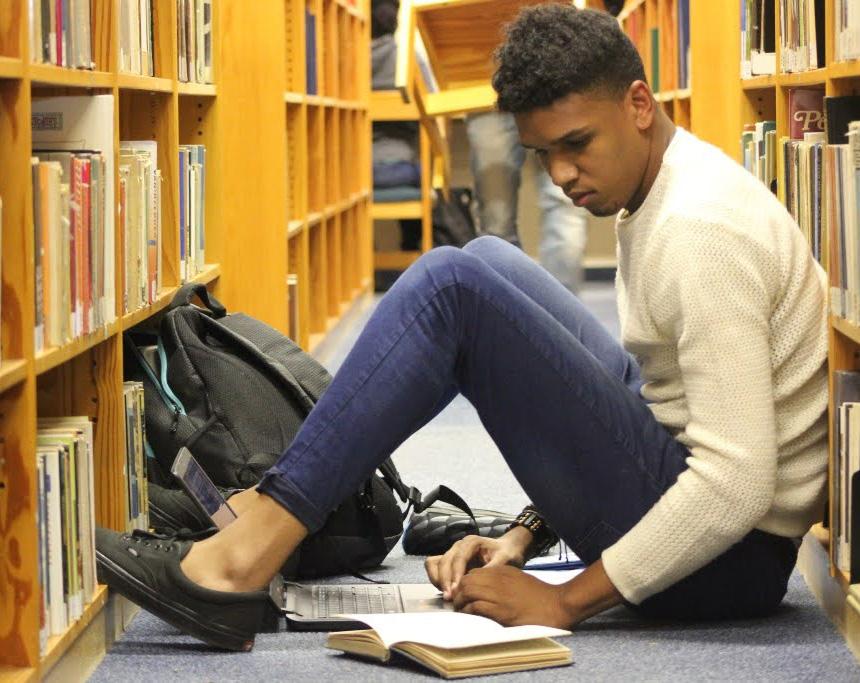

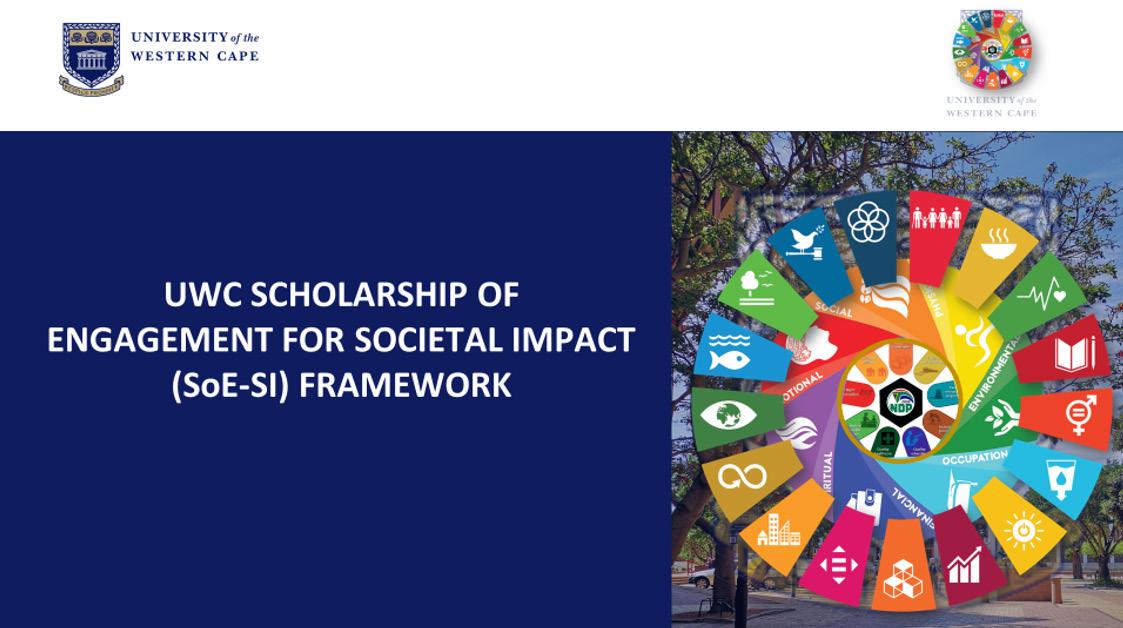
Our SoE-SI Colloquium
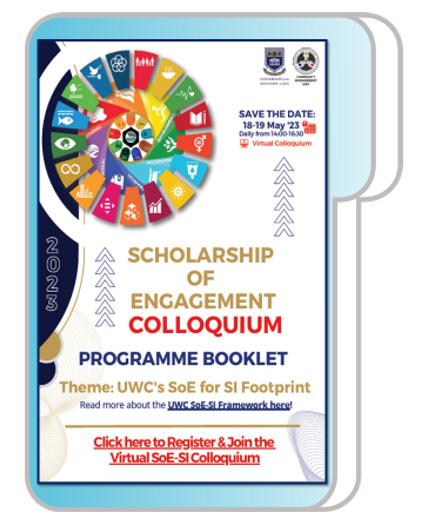

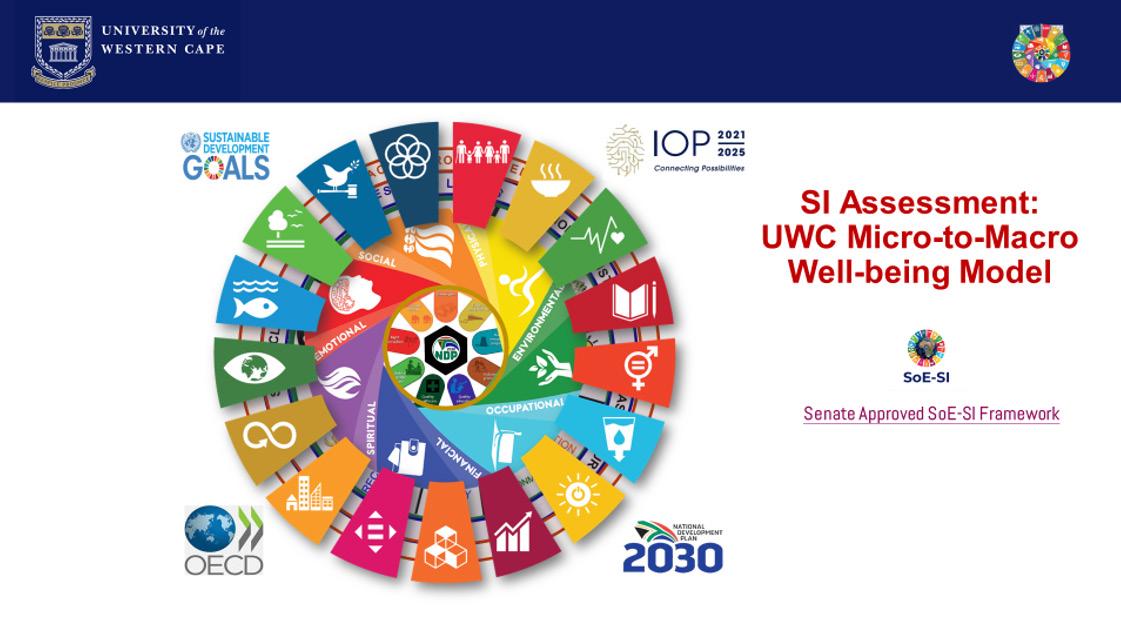
Academic reviews
In 2021, reviews were conducted of the School of Pharmacy and the Writing Centre, and of the Block Teaching Mode of Delivery. Meetings and interviews for the review of the Science Learning Centre for Africa took place in December 2020, and all of the review-related work, including report writing and further investigations requested by the review panel, took place in 2021.
A review of the Interdisciplinary Centre for Sport Science and Development (ICSSD) took place in 2020, and the review activities continued into 2022 with the establishment of an ICSSD task team chaired by the Academic Planning Unit (APU) director, to take forward implementation of key recommendations, including on the future form and function of the ICSSD. These matters have now been resolved.
In 2022, reviews were conducted of the Philosophy Department and the Earth Sciences Department. In addition, a university wide review was conducted of the tutoring programmes in each faculty.
In 2023, reviews were conducted of the School of Public Health (SOPH) and the Institute for Land and Agrarian Studies (PLAAS). We also continued work on an institutional themed review of the tutoring programme in all faculties, which we started in 2022.
The SOPH and PLAAS reviews have been concluded and the draft review reports are with the relevant divisions for their response. In 2023, the integrated report of the Department of Earth Sciences review served at Senate and Council; as well as the integrated report of the Department of Philosophy review.
The APU conducted its first review of a short course, namely the CoLab course in Multi-Platform Software Development. Previously, these reviews were done internally by the faculties and courses involved, and APU is pleased that we are now able to guide the reviews of continuing education (CE) and short courses. Towards the end of 2023, we started finalising a CE course review document, with guidelines and a review instrument. This will be completed in 2024.
The APU continued its work in curriculum renewal and transformation, supported by Barbara Jones, who was employed on contract against the UCDG grant, and by the director and staff members Dr Luvuyo Ndawule and Siya Sabata. Mr Sabata was also involved in the institutional review of the Graduate Attributes at UWC, along with all faculties and support divisions.
SAP also continued to support faculties in programme design and delivery and in their review of programmes, and supported the QA office in conducting formal institutional programme reviews for the first time. The Faculty of Natural Sciences embarked on an intense and far-reaching curriculum review of the Bachelor of Science, and the APU was invited to many engagements in 2023, as requested by the Faculty’s curriculum review working group.
Between 2016 and 2018 we developed 18 new programmes. The Senate Academic Planning (SAP) and in particular, the SAP curriculum sub committee (aka the regulatory committee) was very active in 2021. Curriculum renewal and transformation

work was led by Mr Odwa Mntonintshi (assisted by a curriculum specialist and assistant both on one-year contracts funded by the UCDG grant). The following new programmes were approved internally during 2021:
1. New online Masters in Health Data Analytics
2. Higher certificate in Sport Performance and Recreation Management
3. Higher Certificate in Early Childhood Care and Education
4. Postgraduate diploma in Environmental Law and Management
5. Postgraduate diploma in Transnational Criminal Justice
6. Postgraduate diploma in Tax law
7. Postgraduate diploma in Primary Care Nursing
8. LLM (and MPhil) in Competition Law and Policy
9. LLM (and MPhil) in Corporate Law
10. LLM (and MPhil) In Fintech Law and Regulation
The following new programmes were approved internally during 2022:
1. Postgraduate diploma in Medical Law
2. Postgraduate diploma in Language Practice
3. Bachelor of Biokinetics (conditionally)
Our Academic Planning Unit, led by Dr Vanessa Brown, also supported the university in preparing new programmes approved in 2021 for submission to the CHE through the new HEQC online submission process. This involved training and capacitating the Law, CHS and EMS faculties to design their new programmes in line with the HEQC accreditation requirements, to enable the online submission. APU supported the accreditation submission of the following programmes in December 2022:
1. Postgraduate diploma in Transnational Criminal Justice
2. Postgraduate diploma in Environmental Law
3. Postgraduate diploma in Tax Law
4. Postgraduate diploma in Fintech Law and Regulation; and
5. Postgraduate diploma in Medical Law.
The following new programmes were approved internally during 2023: Professional Master of Laws with the following coursework specialisations:
Transnational Criminal Justice
• Comparative Constitutional law
• Intellectual Property and Competition Law
Comparative and Labour law
• Legal Pluralism
APU also continued to assist the QA Office and faculties to address CHE accreditation conditions, so as to achieve full accreditation of certain new qualifications. The programmes are now part of the external accreditation process and we await the outcomes, in order to embark on these new programmes soon. More detail of the work of Dr Brown and her APU team can be found in the APU Reflective Report.
Thank you to APU, QA and our academic colleagues who made curriculum renewal and transformation happen at UWC.
As DVC Academic at UWC, since the Faculties report to me via their respective Deans, people planning and development in the academic project is one of my key tasks. I started the People Plan development for the Faculties, with assistance from Elvida Sias in human resources, implemented from 2017. Since then we have shared the People Plan template with the other Executive lines who could follow suit from 2018 onwards. Some of the key people development initiatives for staff include:
• Initiated the UWC Nurturing Ad Personam Promotions Process (2016 with Dr Anita Maürtin);
Targeted Appointment Concept and management thereof (2016 with Karlene Mercuur from HR;)
Guidelines for the Reward and Recognition of Academic Excellence at UWC (2017, with Dr Anita Maürtin);
• Initiated the annual Academic Achievers’ Awards event at UWC (2017 with Dr Anita Maürtin);
• Introduced Faculty Differentiation Criteria for Ad Personam Promotions approved by Senate in 2019 (with Deans Forum task team);
• Initiated the leadership programme for academic and professional staff (as an Apex project in 2017, now called the “lead programme” 2023);
• Initiated the UWC Migration and Mobilities Interdisciplinary Collective in Africa (MMICA, Apex project started in 2019, with the inter-faculty migration and mobilities reference group, led by Prof Mulugeta Dinbabo and Dr Leah Koskimaki.
We manage the Next Generation of Academics (nGAP) programme and the Future Professors programme. Dr Anita Maürtin is the manager of both programmes
New Generation of Academic Staff Programme (nGAP)
UWC was awarded 26 nGAP positions from phase one (2016) to phase seven (2021). The institution opted not to submit proposals for phase six and phase eight in order to consolidate the candidates in the institution. However, proposals were submitted for phase nine in November 2022 and we received notification of the successful awards of the five proposals that were submitted from the Faculty of Arts and Humanities.
Candidates in the first three phases completed the nGAP at the end of 2021, 2022 and 2023 respectively, although one candidate in phase two resigned in 2022, four months before completing the programme. All the candidates in phase one have completed their PhDs while one candidate in phase two is yet to complete the PhD. All the candidates in phase three have completed their PhDs.

UWC filled 2 nGAP positions in the Faculty of Education in 2023. These positions were vacant as one candidate’s contract of employment was terminated and the other position was able to be filled since 2018 after the primarius candidate did not accept the offer of employment. Below please find the graphical representation of the demographic and other information with regard to the nGAP candidates at UWC. All faculties except the Faculty Dentistry, have nGAP candidates in their staff complements.
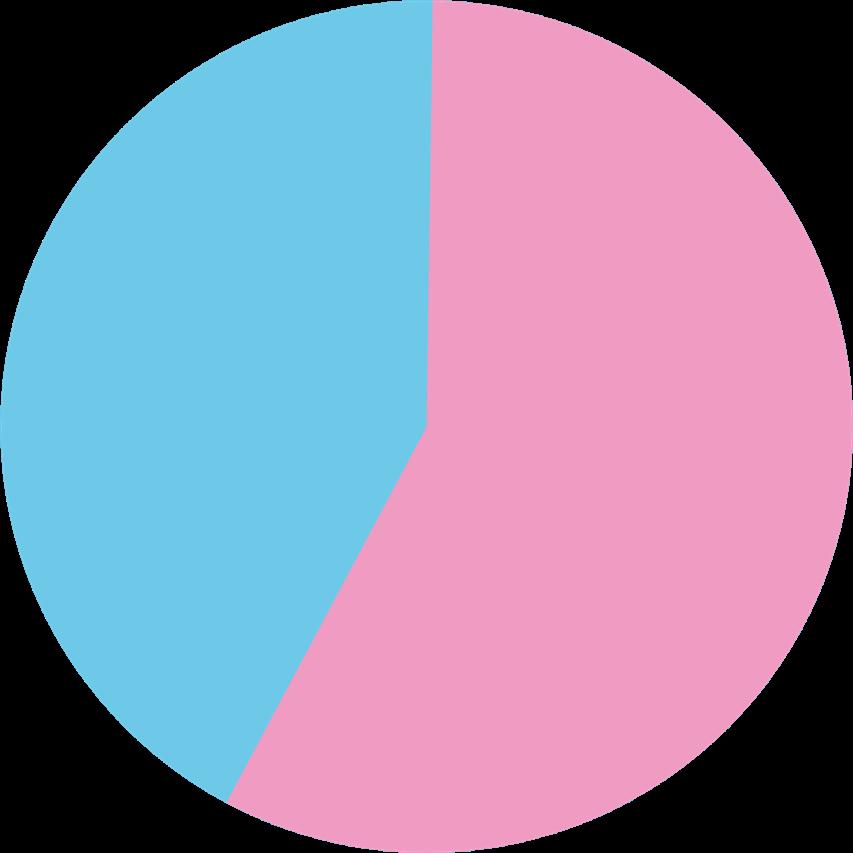

This programme is funded by the Department of Higher Education and Training and coordinated by the University of Stellenbosch. In phase one (2020), UWC had one candidate and in phase two (2021), two UWC candidates were successful in their applications for the programme. Unfortunately, one candidate withdrew from the phase two programme and thus UWC only has two candidates in the FPP. Both candidates are from the Science Faculty.
The candidate from phase one is an African female while the candidate from phase two is a coloured male. We are in constant contact with the co-ordinator of the FPP with regard to the candidates.
In the FPP coordinated by the University of Johannesburg, UWC has one candidate in phase one and one candidate in phase two. The phase one candidate is a coloured male from the Faculty of Law who completed the course last year while the phase two candidate is a coloured female from the Dentistry Faculty.
Below find graphical representations of the demographic information on the FPP.

We started targeted appointments in 2017 in an effort to increase our cohort of black African associate professors and full professors. There is a targeted appointments fund and the Accelerated Appointments and Promotions Committee, which I chair, has final approval of the appointments. These appointments are supernumeri, planned against future vacancies and retirements. As soon as a vacancy or retirement in the particular department or school is available, the person in the targeted appointment post takes up that position and the funding is freed up for the faculty to appoint a new targeted appointment candidate.
The following table depicts the current targeted sppointments.
Targeted appointments
Faculty
Arts and Humanities
Community & Health Sciences
Community & Health Sciences
Economics & Management Sciences
Economics & Management Sciences
Economics & Management Sciences
Economics & Management Sciences
Economics & Management Sciences
Education
Dr ES Mayeza
Siphe Madyibi
Prof. B H Khuzwayo
Law Dr Anzanilufuno Munyai
Law Dr Sagwadi Mabunda
Natural Science
Natural Science
Natural Science
Prof. N N Ludidi
Prof M Madiehe
Prof. L Leeuw

The Leadership, Empowerment and Advancement Programme (lead-programme)
The lead-programme had 21candidates in the 2023 cohort.
Below is the demographic and general information about the cohort across faculties/executives, gender and Historical Racial Categories.
participants across
and executive units
Number of participants across historical racial categories and gender
The cohort also has a session on the development of an entrepreneurial mindset in the higher education context.
The programme ended with candidates presenting their group projects, which were aligned to the IOP and specifically the academic project at UWC. The graduation of the cohort took place on the same day. Opposite are some pictures of the graduation.
Thanks to Dr Maürtin for being the nGAP manager and driver of the lead-programme.
Finally, as discussed above, I introduced the Graduate Lecturing Assistant (GTA) programme at UWC in 2020, to assist academics in learning and teaching but also to provide the GTAs with an opportunity to experience being a future academic.

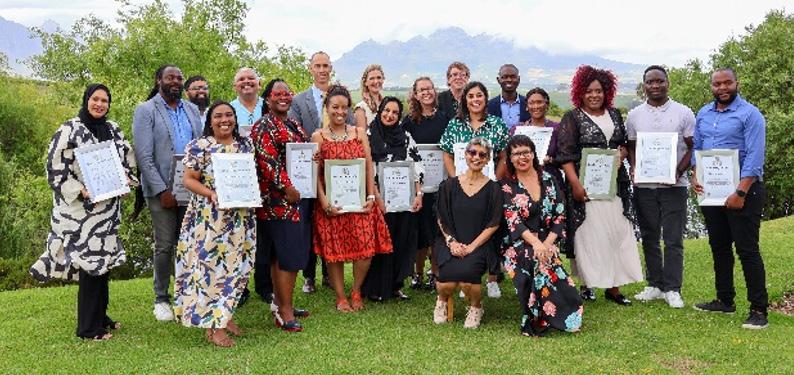
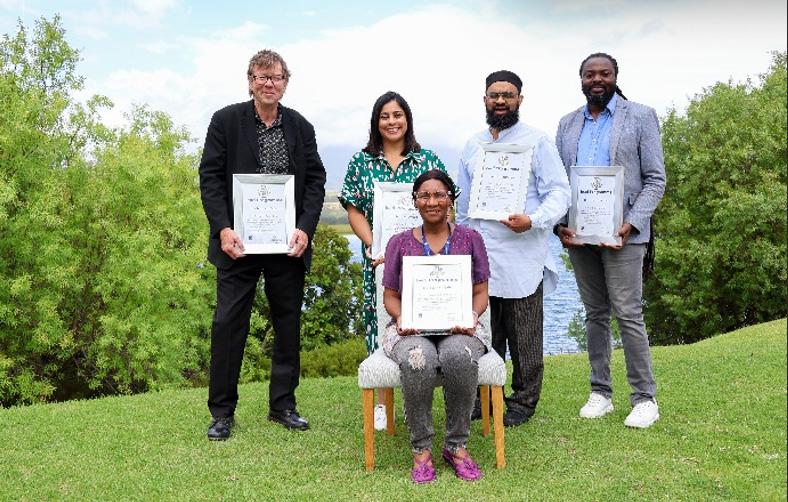
Introduction
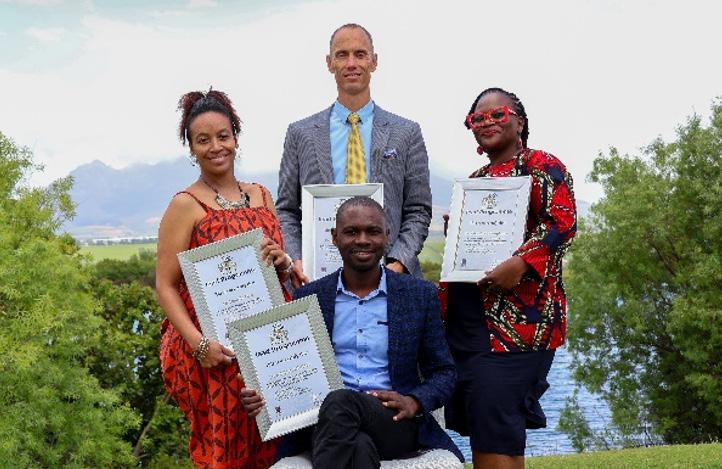
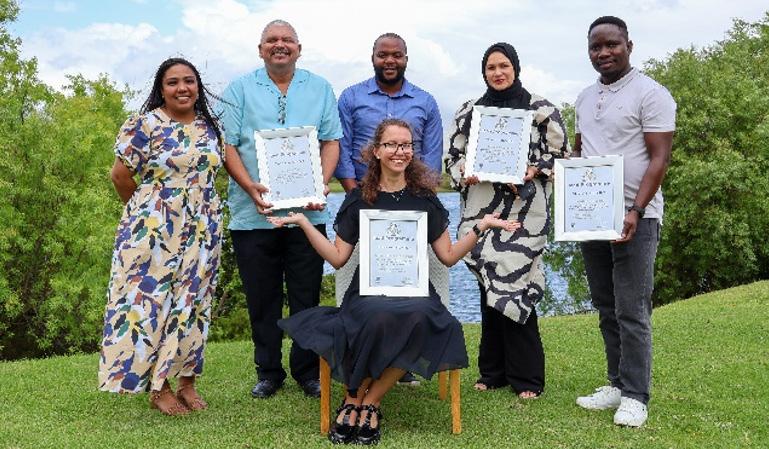
entrepreneurial skills. The outcome is a graduate with attributes necessary for a changing world of work in the digital age.
The project was successfully implemented with the HDI grant and achieved its success indicators.
With the help of a historically disadvantaged individual (HDI) grant, the ZoneLearning@UWC project was established in 2019 to encourage entrepreneurship education among students. The project was launched in 2020. Zone Learning, developed by Toronto Metropolitan University in Canada, is an innovative approach to preparing students for the 21st-century workplace. It provides opportunities for them to work on real projects, causes, companies and start-ups. UWC is one of the South African universities that adopted this innovative learning approach, embedded it in curricula and integrated it with community engagement.
From the outset, it was decided that the Zone Learning approach at UWC would be socially responsive and develop students’ responsiveness to their communities’ needs and challenges. With this in mind, ZoneLearning@UWC became an experiential learning and incubation space for UWC students and communities. It aims to equip students and communities with entrepreneurial skills and develop socially responsive graduates who drive entrepreneurial activities in their communities. Unique to this programme is that the curriculum is embedded in the learning experience. Thus, the project seeks to usher in a new era for UWC and its students marked by resilience and a pioneering spirit, accompanied by innovation, problem-solving and
• We implemented the pilot implementation and refined the funding model.
• We have established and launched an entrepreneurship incubator, Zone Learning, at UWC.
• We have established three ‘clinics’ that holistically speak to entrepreneurship education and development at UWC.
• The clinics expose students from different faculties to entrepreneurship and skill them for the work environment.
After receiving the grant, the first step was to benchmark it against the best programmes in the world. One of the leading entrepreneurial ventures was the Zone Learning approach at Toronto Metropolitan University in Canada. Hence, in 2017/18 UWC started with a benchmarking study tour. The aim was to engage with partner institutions to break down the silo-thinking and practices between faculties. UWC and Toronto Metropolitan University signed a memorandum of understanding on using the Zone Learning concept at UWC. A draft concept document was completed. The concept document was open to comments, and after the comments were received a venue on campus was identified. The venue was secured and renovated in 2019 for the implementation of the project.

UWC appointed a service provider to implement a pilot UWC appointed a service provider to implement a pilot entrepreneurship programme from March to November 2019. The pilot aimed to identify potential student entrepreneurs and help them with their entrepreneurial ideas. Several workshops and events at UWC led up to the ‘Battle of the Faculties’.
As the pilot drew to a close, a project manager was appointed. Three entrepreneurship ‘clinics’ were identified: the New Media and Transmedia Clinic, the Entrepreneurial Law Clinic and the Small Business Clinic. Academic coordinators for the Entrepreneurial Law Clinic and the Small Business Clinic were appointed. The project’s launch was scheduled for 18 March 2020 but had to be postponed due to the Covid-19 pandemic. We decided to launch the Zone Learning project virtually on 23 September 2020.
The ZoneLearning@UWC project prides itself on being embedded in the curriculum. For this reason, we collaborated early on with the Linguistics Department in the Arts Faculty. The aim was to introduce transmedia storytelling in the Critical Media Studies module. ZoneLearning@UWC was tasked to train students on the basics of filmmaking and transmedia. We consider this groundbreaking since UWC does not have a New Media and Transmedia course. This collaboration opened a new avenue for UWC. ZoneLearning@UWC, with the help of the Linguistics Department, developed a New Media and Transmedia continuing education course. The course was approved in May 2022. ZoneLearning@UWC also decided to help rural and especially marginalised communities to tell their own stories. We developed a transmedia storytelling workshop model and tailored the continuing education course so that it speaks to creatives in society. In addition, we decided to help communities make documentary films. Find the creative output list below.
In March 2020, a supervising attorney was appointed to plan and implement the ELC. The ELC now forms part of the UWC Law Clinic. The ELC supports entrepreneurs with practical legal advice for starting a business. In July 2020, 10 law students were selected to participate in the ELC and fomed part of the Management Fundamentals for Entrepreneurship course. At the beginning of February 2021, the students were placed into groups (each group consisted of a mixture of Law and EMS students) and required to work in teams on SimVenture. The ELC also equips the selected law students with the practical legal experience they 44 • ZoneLearning@UWC aims to equip registered UWC students with entrepreneurial skills and develop socially responsive graduates who drive entrepreneurial activities in their communities in programmes aligned to their respective academic courses.
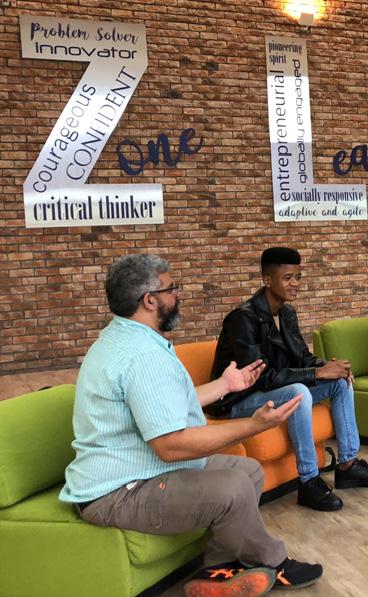
• ZoneLearning@UWC aims to increase its local, provincial and national standing. To achieve this, our primary focus will be partnership development.
• ZoneLearning@UWC aims to conduct research on entrepreneurship, social justice and transformation issues.
• ZoneLearning@UWC aims to become financially sustainable through income diversification.
We also decided to focus on sustainable development, and it was for this reason that we decided on three entities for the ZoneLearning@UWC project: the New Media and Transmedia Clinic, the Entrepreneurial Law Clinic and the Green Incubator. During our project evaluation, we realised that a Green Incubator would better suit the ZoneLearning@UWC project. A portion of the HDI grant was used to establish the ZoneLearning@UWC

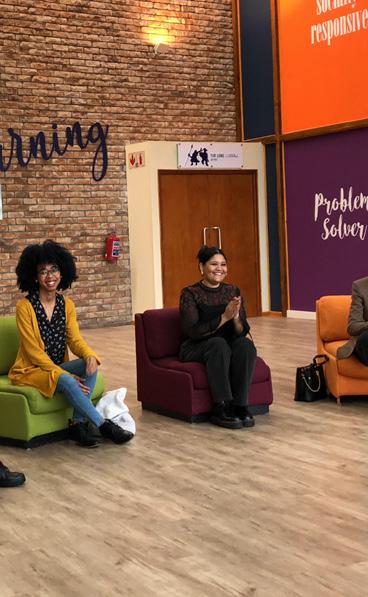
space on campus need for the world of work. As a requirement to participate in the ELC, they have to complete SimVenture. SimVenture gives them the required ‘business’ experience to assist clients in the ELC. In addition to this, the ELC has been incorporated into the curriculum and forms part of an existing final-year law module, Legal Process 401. The course structure for the ELC is the same as the existing Legal Process 401 module. The ELC also launched an e-guide, ‘A practical legal guide to entrepreneurial ventures’, that LexisNexis published. It is their first interactive e guide and is now available as a textbook.
In the EMS faculty, we worked with the Small Business Clinic. At first, this clinic was a component of ZoneLearning@UWC. We piloted an entrepreneurship project with honours students in 2020.
Students had to submit a two-page business idea. After the initial presentations, students were selected based on their availability, their seriousness about taking the business idea to market, and their commitment to complete the programme. Ten EMS students were selected and went through ideation and incubation phases. The ideation phase consisted of a short Management Fundamentals of Entrepreneurship course. The incubation phase consisted of SimVenture, a business simulator and a platform to simulate entrepreneurial ideas. The pilot project was evaluated. completed in February 2021 and was In August 2020, the Griqua Royal House asked us to help it establish a Cultural Village and Entrepreneurship Hub at Touws River. ZoneLearning@UWC helped it key develop a high-level business model and facilitated several meetings with stakeholders, including Municipality and the UWC Arts Faculty. Post
Towards the end of the HDI grant, we started an evaluation process for the project. We saw that the project had the potential to enhance UWC’s offering to students and rural and marginalised communities. With this in mind, we developed the ZoneLearning@ UWC Strategic Plan 2021–2025. We developed the following four goals:
We decided to develop and register two short continuing education courses: Transmedia for the Creative Economy and Entrepreneurship Development for Artists. It was decided that ZoneLearning@UWC will drive Transmedia for the Creative Economy and Entrepreneurship Development for Artists at the Centre for Performing Arts. This report will only reflect on Transmedia for the Creative Economy.
Transmedia for the Creative Economy continuing education ZoneLearning@UWC and the Arts and Humanities Faculty registered a continuing education course. The course is titled Transmedia for the Creative Economy and is for people with NFQ Level 4 and equivalent. It focuses on ‘new media’ and transmedia storytelling. New media includes podcasting, vlogging, websites, blogging, social media, gaming, AI and AR, and music and television streaming services. New media uses digital technologies to connect people, services and products. Transmedia storytelling, on the other hand, uses multiple media.
The pilot phase of the course began in February 2023. So far, we have piloted the course in Calitzdorp and Bitterfontein in the Western Cape, Douglas in the Northern Cape and Kokstad in KwaZulu-Natal. Our selection is based on our second goal, which is to increase ZoneLearning@UWC’s local, provincial and national footprint. We chose rural sites because rural communities do not get the same exposure as peri urban, urban and metropolitan areas. Our target group was rural youth, especially those who could not attend university. We also partnered with the Institute for Justice and Reconciliation.


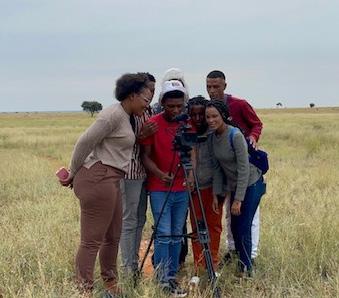
workshop focussed on six key themes: transmedia storytelling, new media, ethics and legal considerations, digital marketing, content production and monetisation and distribution.
So far, 87 people have participated, 57 have completed the course, and 35 have graduated.
There are early signs of success for the Transmedia for the Creative Economy continuing education course. The Calitzdorp cohort has started a community podcast that focuses on repairing, healing and changing the narrative of their community. The name of the podcast is “Feite Oppie Tafel.”
Transmedia Community Workshop
In November 2022, ZoneLearning@UWC was invited by the San community in Platfontein, Kimberley, Northern Cape to help them with film training. In March 2023, we partnered with SanVision and piloted the Transmedia Community Workshop amongst the San community in Platfontein, Kimberley, in the Northern Cape. The aim was to introduce sustainable storytelling mediums and help them tell their stories from their vantage points.
The training was divided into two phases: theoretical and practical. The first was the theoretical component of the training, and the second was the practical component of the training. The
After covering the theoretical component, we introduced practical training. During the practical component, participants were taught how to use the camera and sound equipment and were tasked to make their short films after completing the basic training. The short films the community produced were mindblowing. The films were also produced in their native tongues: Xûn and Khwedam.
In addition to the Platfontein community, we shortened the fiveday workshop with the Accelerated Excellence Programme (AEP) 2024 cohort. The training took place at UWC and was received extremely well by students. Some students already created content and indicated that the transmedia training enhanced their skills.
Intake
Platfontein
Total number of participants
25
AEP 9
Total 34
One of our first successes was an invitation to screen the Platfontein film at the Desmond & Leah Tutu Legacy Foundation. One of the producers attended the screening, and it was a milestone for her. She mentioned that the San people were often film subjects, and they rarely are recognised as producers. The film was well received at the screening and he was also selected for the Mbawula Youth Film Festival in Kimberley.

Documentary Films and Other Creative Outputs
ZoneLearning@UWC is in the process of producing several documentary films. In 2023, we released “Stemme Van Clarkson: A Documentary Film” and Platfontein: Changing the Narrative. “Stemme Van Clarkson” is based on the book of the same name, which was published by Professor Vivienne Lawack with friends and family in 2021.”
This book captures many of the voices of people in the small Eastern Cape town of Clarkson. The film was screened in Clarkson, Cape Town and Gqeberha. After the screening, the film was released on YouTube to ensure people could access it.
In addition, we also produced the “Celebrating 100 Years of Women in Law” podcast. It is a 10-part series celebrating 100 years of women in law.
The Green Incubator
In 2022, ZoneLearning@UWC received funding from the BankSETA to train 30 green entrepreneurs and assist them with establishing businesses. Twenty-eight students completed the training. In March 2023, they participated in a pitching competition which aimed to identify the top five business ideas and fund the start-up of these businesses. The Centre for Entrepreneurship and Innovation co-hosted the event.
After the pitching competition, we appointed a business coach to work with the entrepreneurs. The business coach helped them write business plans and plan the lifespan of their businesses.
Each student also received a book that guided them on the journey

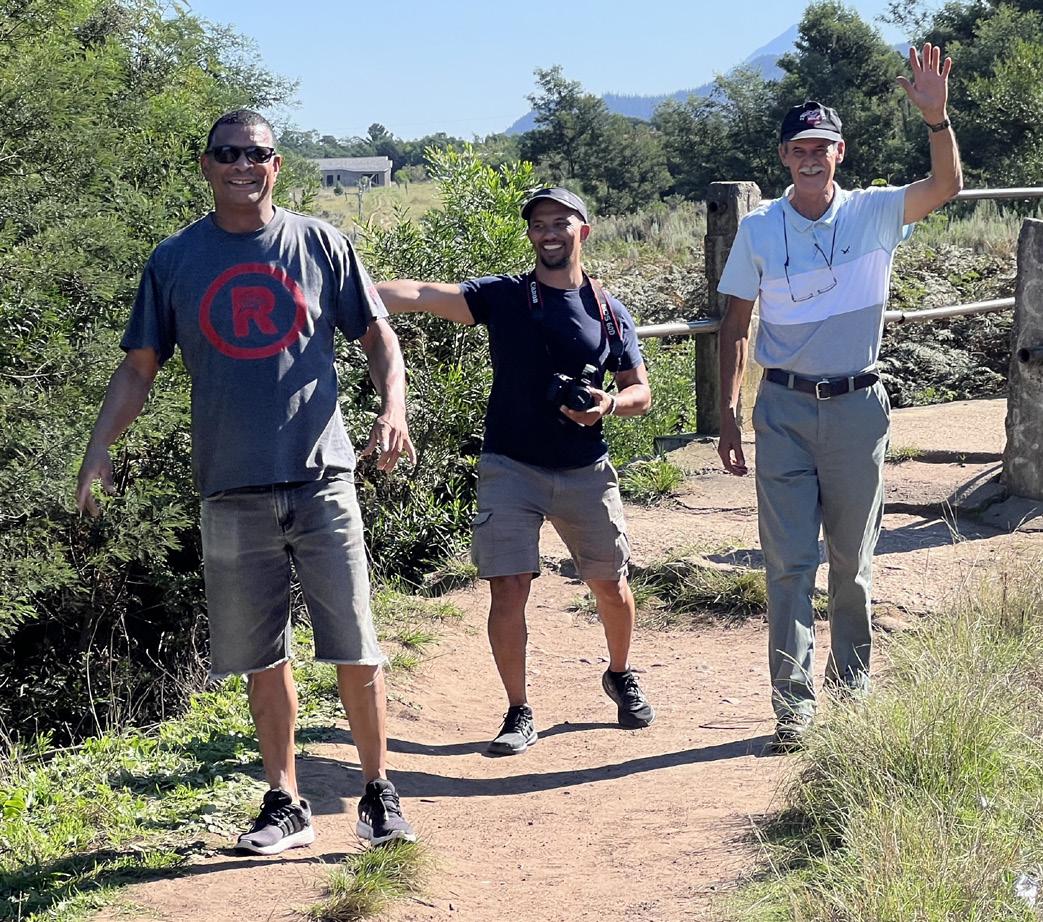
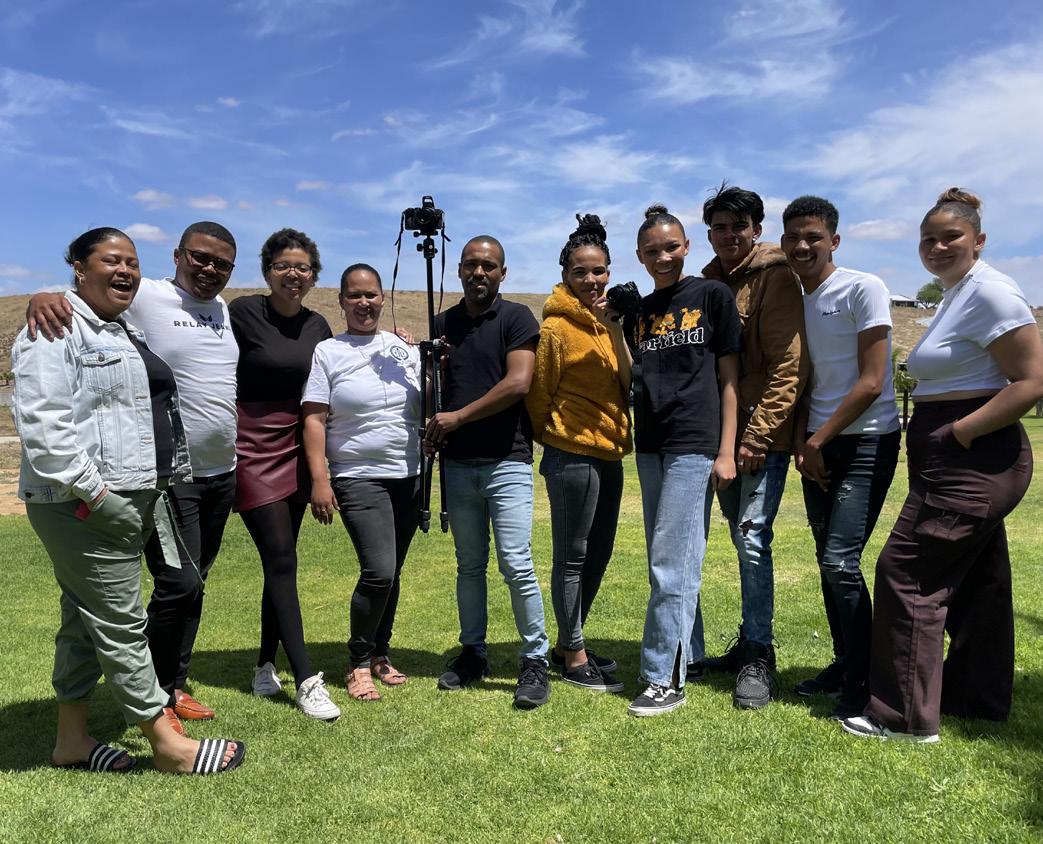

In addition to this, we also assisted 13 students in registering their businesses. After completing the business mentoring process, we issued students with a certificate indicating that they had completed the programme. The overall winner of the programme was Refematla Koapa.
Total number of participants 30 Completed ideation 24
Participated in pitching competition 19
Participated in the incubation phase 24
Participated in advanced mentorship 5
Registered businesses 13
Winner 1
The Community Green Incubator focuses on sustainable development and encourages green entrepreneurship and innovation initiatives. The focus will be on creating an alternative green economy. We chose Clarkson as the site for the project due to the availability of land and resources. There were several community engagement steps before we chose Clarkson: community introduction, benchmarking, community readiness assessment, strategic planning and community presentation.
In November 2023, leaders in the community accepted a 20 year green incubator plan. To operationalise the plan, we identified four flagship programmes for the green incubator. We are implementing a food security programme in Clarkson as a research project and will closely work with PLAAS in the coming years.
ZoneLearning@UWC partnered with Dr Lorato Mokwena, Unisa and the Castle of Good Hope to host the Dit is ‘n Noord Kaap Ding colloquium (DINK) in 2023. The theme was ‘Ruptures and legacies: The Northern Cape before and after the borders’. The colloquium sought to answer questions related to the ruptures caused by colonialism and apartheid. These were not only literal ruptures such as the ones brought on by geographical boundaries but also included ruptures in reliance on identities, indigenous traditional knowledge lifestyles and and medicine. Additionally, the colloquium explored issues pertaining to the legacies and untold stories that linger in the Northern Cape.
In 2023, the colloquium featured presentations from academics, postgraduate students and activists, including Prof David Morris, Prof William Ellis and Dr Lorato Mokwena, who delivered the keynote addresses. Other presenters include Dr Sophie Schasiepen, Janine Lange, Patric Mellet and activist Anmiray Opperman. Two Northern Cape artists, Robert Gardiner and Ulrich Roberts, exhibited at the Castle during the three-day colloquium, which ended with a visit to Robben Island.
Total number of participants
guest 18
DINK 2023 was also livestreamed.
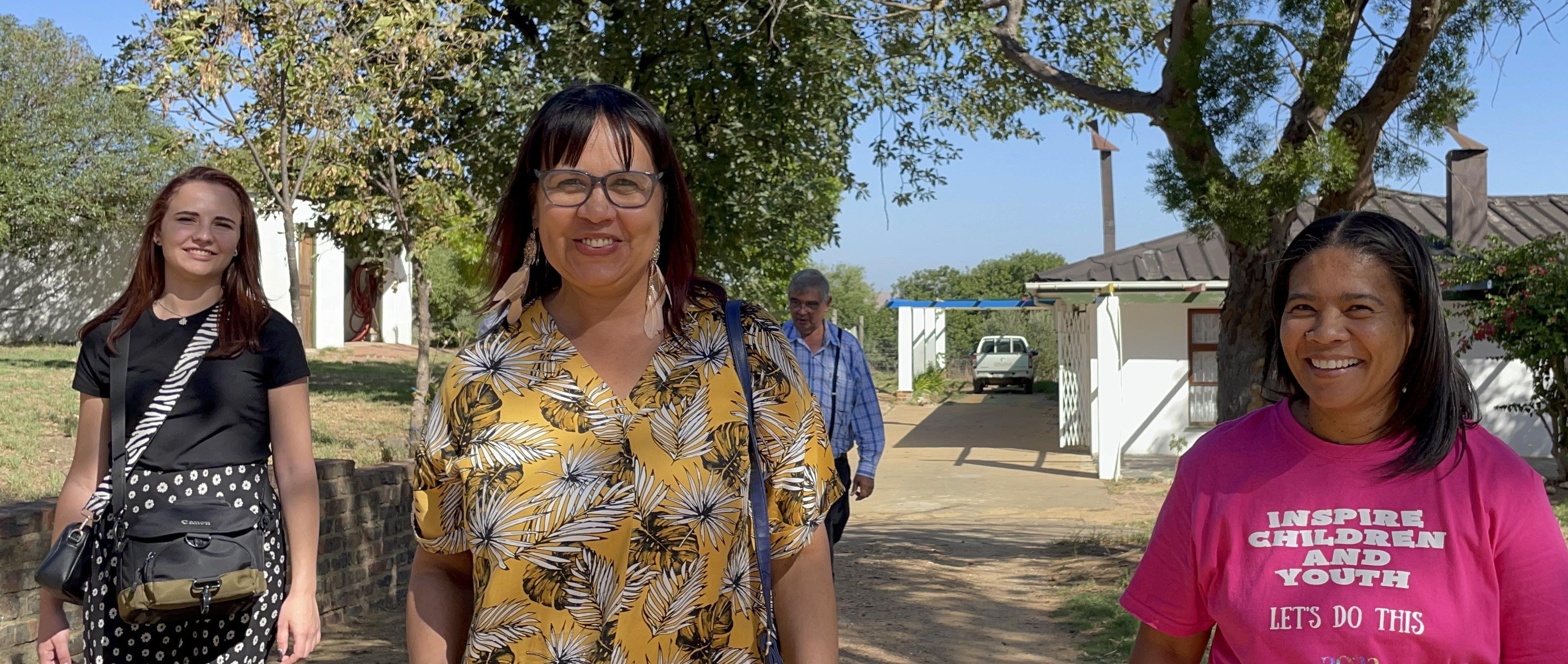

The Attempted Erasure of the Khoekhoe and San ‘The Attempted Erasure of the Khoekhoe and San’, written by Dr Jacob Cloete, was a book project sponsored by the DVC: Academic and ZoneLearning@UWC. The book delves into the complex issue of problematic coloured identity and the ongoing erasure of the Khoekhoe and San people in South Africa. African Sun Media published the book under its SUN MeDIA imprint and it was launched at the Castle of Good Hope on 4 December 2023.
A Practical Legal Guide to Entrepreneurial Ventures (E-text book )
Ms Lynette Visagie-Swart and Prof Vivienne Lawack are coauthors of this book. The book is used as a text book in a new module in the Faculty of Law developed by them, called “Entrepreneurial Law and Practice” elective module, taught by Ms Cezanne Britton to final year law students. The second edition was d9ne in 2023 and the third edition has been released in July 2024. Thanks to my co-author Lynette for working with me on this exciting book to enable law students to not only understand the substantive entrepreneurial law, but also to gain hands-on practical experience.
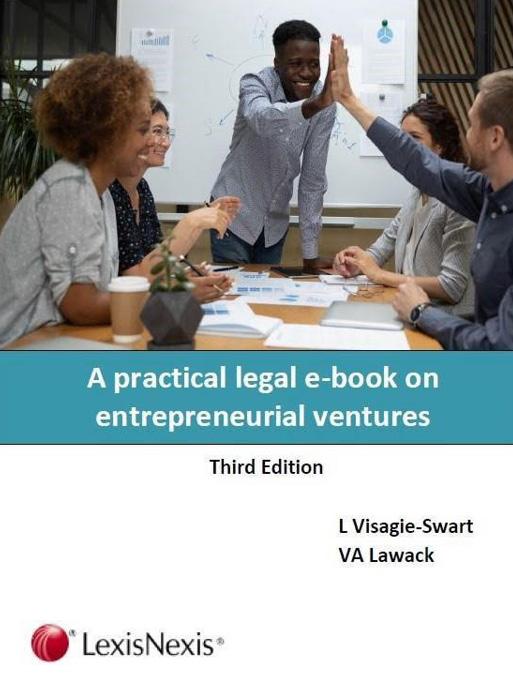
Thank you
A huge appreciation goes to Dr Jacob Cloete who is the project leader of ZoneLearning@UWC. This project has been personally exciting and rewarding for me. I look forward to assisting in the future sustainability of the project.
Outputs
Continuing education courses
1. Transmedia for the Creative Economy: approved June 2022 by SAP
2. Entrepreneurship Development for Artists: August 2022 by SAP
Research: Books
1. Lawack, V. & Visagie-Swart, L. (2021). A Practical Legal Guide to Entrepreneurial Ventures. Lexis Nexus
2. Cloete, J. (2023). The Attempted Erasure of the Khoekhoe and San. African Sun Media.
Creative Outputs
1. The Zone Learning at UWC: 23 September 2020 https:// www.youtube.com/watch?v=vc-YRUFTWfo
2. UWC’s long history of community engagement: 23 November 2020 https://youtu.be/SHQL7DWACs?si=B0xvLbvhIGaaLgDn
3. ZoneLearning@UWC an Incubation Space: 21 November 2021 https://youtu.be/Fgxzt7rlPJY?si=GahtZDmP40Wc4 dp5
4. Professor Allan Boesak - Selfless Revolutionaries: 13 April 2022 https://youtu.be/_ABUcf4dTM?si=YN7AFE2t5bwpVH2v
5. Stemme Van Clarkson Documentary Film Trailer: 23 April 2023 https://www.youtube.com/watch?v=R31m4OZFeHw
6. 100 Years of Women in Law Podcast [10 episodes]: 09 August 2023 to 24 October 2023 https://www.youtube. com/watch?v=Wek0CqcnKUo&list=PLnsdD16ZXHnx43i5k1b abPlEZpCRMI1Yd
7. Stemme Van Clarkson Full Documentary Film: 04 October 2024 https://www.youtube.com/watch?v=O8tNSjC8oIY
8. Platfontein Changing the Narrative: October 2024
Colloquium
1. Dit is ‘n Noord-Kaap Ding 2023 at the Castle of Good Hope.
Pillar Seven: Reimagining and Enhancing the Offering of Continuing Education (CE) Courses at UWC
Pillar Seven (P7) was formed under three years ago and has made remarkable progress in Continuing Education (CE) offering at UWC. P7 has successfully redesigned business processes, implemented cutting-edge software for CE administration, and we are in the process of drafting comprehensive amendments to the CE policy. The collective efforts have yielded substantial improvements CE course registration, operational efficiency, and overall business performance.
Pillar Seven (P7) of UWC’s strategic plan focuses on revolutionising our Continuing Education (CE) offerings to meet the evolving needs of lifelong learners and the demands of the modern workforce. This report outlines our significant strides in redesigning our business processes, implementing cutting-edge

software, and expanding our course offerings during 2023-24. Our efforts have resulted in a more efficient, responsive, and high-quality CE programme that serves a growing number of students and reinforces UWC’s position as a leader in continuous learning.
Redesigning business processes for CE courses offering
P7 embarked on an ambitious initiative to redesign existing business processes, enhancing the overall experience of registering, managing and offering CE. This initiative was a collaborative effort, with every stakeholder in the CE process playing a crucial role. P7 has successfully streamlined various workflows, ensuring that academic rigour and governance processes for CE stay the same, but improved on the crucial checkpoints for maintaining the integrity and quality of CE courses. The redesigned processes have streamlined administration, automated most manual tasks and reduced paperwork. This has significantly improved efficiency in terms of time and cost and has helped manage the CE offerings’ workflow. We are now seeing better turnaround times for course approval, with few referrals for courses to the units. Besides, the redesigned processes have played a crucial role in our ability to successfully run and expand our CE course offerings, as evidenced by our recent course statistics.
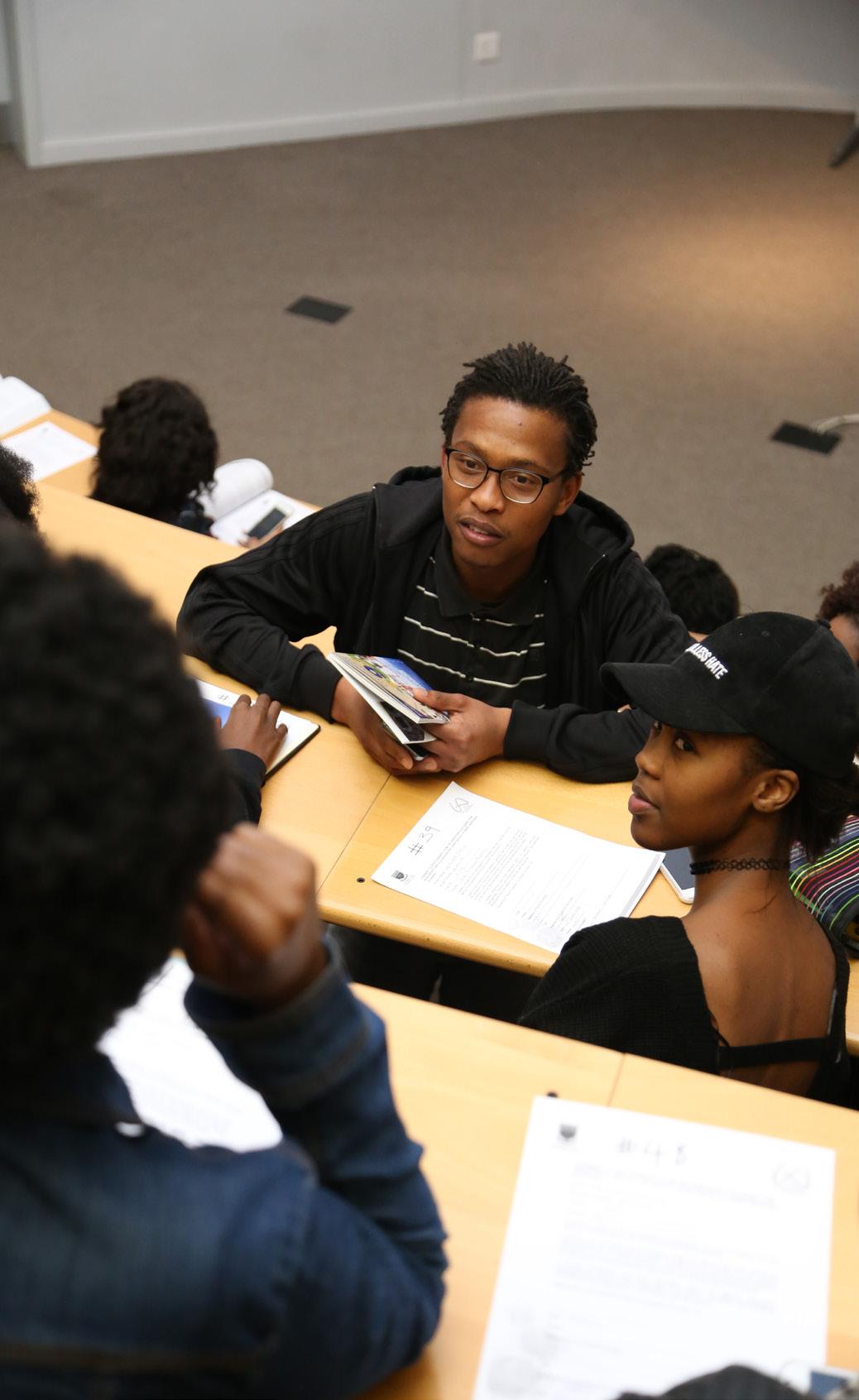
Implementing software for CE administration
Recognising the importance of leveraging technology to enhance our customer experience, P7 has implemented a state-of-theart software solution tailored to CE administration based on the redesigned business processes. The new software platform efficiently manages the CE course lifecycle, including participants’ application and selection, enrolment, marks administration and management, financial management and reporting, and customer relationship management. Its advanced features have enhanced our ability to respond promptly and provided valuable information to help faculties make decisions regarding their CE courses.
The software implementation is almost 95% complete, with the team addressing integration issues to ensure seamless operation across all systems. This near-complete implementation has already shown its value in supporting our expanded CE offerings. We are currently addressing integration challenges.
P7 has made significant progress in expanding and improving our Continuing Education offerings, largely facilitated by our redesigned processes:
• CHE has accredited two flexible online programmes currently awaiting South African Qualifications Authority numbers. We are looking to start advertising for these two programmes later in 2024.
In 2023-24, we have 24 CE courses approved: 15 in 2023 and 9 as of June 2024. More courses are at various stages in the approval process. We also reviewed 5 CE courses before the expiry of the three-year offering cycle.
• In 2023, we successfully offered nine CE courses, attracting 257 students. The redesigned processes helped us effectively handle this increased volume of courses and students.
For 2024, as of June 6, we have already offered six CE courses, with 113 students enrolled. This shows a strong continuation of our CE program’s growth and popularity, supported by improved administrative processes.
• The approvals, reviews, and offerings of CE courses are in line with the targets we set for P7: eight courses in 2023 and 16 in 2024.
These statistics highlight the increasing demand for our CE courses and the success of our redesigned processes in enabling us to meet this demand efficiently.
I am pleased with the progress made by the Pillar 7 team for our CE, continuous professional development (CPD) and online education offerings and that the first new CE courses in Pillar7 were run in 2023. Some faculties have also curriculated fully online programme offerings, such as the Faculties of Law, Education and Community and Health Sciences. The programmes have passed the internal Senate and Council approval processes and

are now in the external accreditation phase. This is an exciting space in which we can expand on access, taught postgraduate programmes and our third-stream funding.
• Create societal impact and social transformation in this area through policy intervention, advocacy and community engagement. and
• Position UWC as a thought leader on migration issues in the region

UWC Migration and Mobilities Interdisciplinary Collective in Africa (MMICA)
Introduction
Migration and mobilities refer to the contemporary and historical movement of people on various scales around the globe, as well as to the circulation of ideas, objects, and capital that often accompanies this mobility. UWC has significant research capacity across faculties addressing aspects of this theme, and UWC’s Migration and Mobilities Interdisciplinary Collective in Africa (MMICA) was established in 2019 in the Office of the DVC- Academic Prof Vivienne Lawack to promote further critical approaches in research and collaboration on this topic. Our aim is to build an academic Centre for the Study of Migration and Mobilities at UWC, as we develop new critical approaches to analysing the contemporary issues and global concerns in the field of migration studies. We advocate for a new generation of South African and African academics to do research internationally and secure funding to broaden the horizons of migration and mobilities research from an African perspective.
MMICA is a cross-faculty initiative based in the Office of the DVC-Academic, Prof Vivienne Lawack
What does MMICA do? https://mmica.uwc.ac.za/
The collective: https://mmica.uwc.ac.za/about/the-collective/ MMICA’s work aims to integrate research, teaching and learning, and community engagement. Our goals are to:
• Conduct, collaborate and publish cutting edge research in migration and mobilities; Promote and support a new generation of academics and researchers in migration and mobilities through capacity building, teaching and learning;
• To increase cutting-edge research publications in the field of migration and mobilities
• To provide contextually relevant and excellent scholarship in learning and teaching
To enhance and strengthen partnerships, and engagement, locally, regionally & globally
• To secure our financial sustainability while maintaining our intellectual autonomy
• To promote a new generation of academics and researchers through capacity building
• To promote social transformation through policy intervention, advocacy and community engagement
Our research programmes across faculties have covered and will continue to build on interdisciplinary thematic areas including: migration governance, refugee and vulnerable migrant challenges, livelihoods and survival strategies, transnationalism, integration policies, urban and rural mobilities, remittance and financial flows, cross border economic exchange, and the impact of Covid-19 on mobility.
Team members have secured external research funding and collaborations among our faculty members, postdoctoral researchers, to produce impactful research. The Migration and Mobilities Interdisciplinary Collective in Africa (MMICA) is dedicated to advancing critical research, collaborative partnerships and societal impact concerning migration and mobilities, with a focus on African perspectives and global implications.

Highlights
October 2023: Symposium
In October 2023, UWC and MMICA hosted the International Symposium on Migration and Mobilities in Cape Town, in partnership with the Migration and Food Security in The Global South: Interactions, Impacts and Remedies (MiFOOD Network). The symposium responded to the evolving need to examine mobilities on various scales through collaborative local and global partnerships and interdisciplinary approaches. During the event, global academic researchers, delegates from international and governmental organisations, policy makers and community and civil society groups shared and offered global and local perspectives on migration and mobilities topics. The symposium brought together migration and mobilities experts from 17 countries across north and central America, Asia, Africa, Europe and the Middle East
Presentations included MiFOOD sessions from various geographic contexts on ‘Cities of Contagion: Migration, food insecurity and Covid-19 in comparative perspective’, a round table with the Urban Sanctuary, Migrant Solidarity and Hospitality and Global Perspective project, a workshop and research presentations with the Engaged Scholarship and Narratives of Change in Comparative Perspective project, and research presentations with peer researchers on ‘Investigating young men’s experiences of walking to the “bus” in low-income neighbourhoods of Cape Town and London: A comparative study built round a community peer research methodology’. The symposium was opened by Peter Mudungwe, African Union Commission senior technical adviser: migration governance and liaison. Participants also included speakers and attendees from the International Organization for Migration (IOM), the United Nations High Commissioner for Refugees (UNHCR), and the NGOs, Africa Unite, Scalabrini, The Fruit Basket, SWEAT and M&Co.
What are some of the networks, partnerships and funding we have generated and sustained amd what research has been supported?
Research projects: https://mmica.uwc.ac.za/research/
Journal: The African Human Mobility Review (AHMR) is an interdisciplinary peer-reviewed online journal created to encourage and facilitate the study of all aspects (socio economic, political, legislative and developmental) of human mobility in Africa. AHMR is jointly owned by UWC and Scalabrini Institute for Human Mobility in Africa. AHMR is also accredited by the Department of Higher Education and Training journal list
Through the publication of original research, policy discussions and evidence-based research papers, t h e AHMR provides a comprehensive forum devoted exclusively to the analysis of contemporaneous trends, migration patterns and some of the most important migration-related issues. The journal is accessible online at no charge.
The UWC DVC: Academic provided unwavering technical and administrative support and resources for the success of the AHMR. This journal is pivotal in advancing scholarly discourse on human mobility issues in Africa, showcasing UWC as a leader in academic research and fostering international collaboration.
Research projects:
Canadian projects: The Urban Sanctuary, Migrant Solidarity and Hospitality in Global Perspective project
Leah Koskimaki did the same in the Canadian Social Sciences and Humanities Research Council (SSHRC) funded partnership project, Urban Sanctuary, Migrant Solidarity and Hospitality in Global Perspective, which is directed by Prof Harald Bauder of the Department of Geography and Environmental Studies at Toronto Metropolitan University. The project was awarded C$2.5 million over seven years and has generated R500,000 for student support, research and events. It has supported UWC researchers in attending and taking part in events.
2021-2028: South-South Migration and Migration and Food Insecurity in the Global South (MiFOOD) Project: The MiFood Project, commissioned by the Canadian SSHRC) builds on the strong foundation laid by the network of partner institutions, coinvestigators and collaborators from seven Canadian universities and teams from partners in China, Jamaica, Kenya, Mexico, Namibia, Mozambique, Ecuador, Ghana, India, Qatar, South Africa and Singapore. The specific objectives are to: (a) design and implement a new global research and knowledge mobilisation agenda on
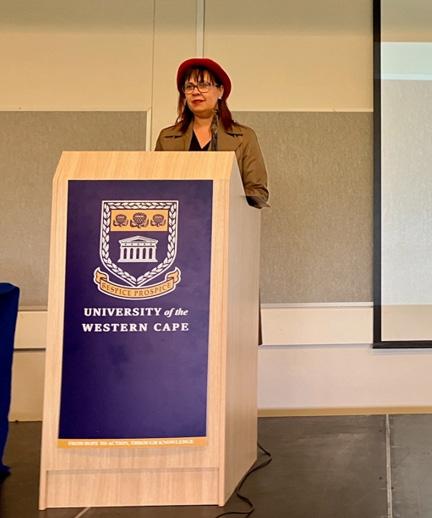

the interactions between international and internal South migration and food security; (b) compare the food security vulnerabilities of migrant women, men and children in different cities, migration corridors and migrant-sending communities across the Global South; (c) examine how the transformation of food systems is generating new forms of migration, precarious migrant employment and food insecurity; and (d) ensure that the neglected migration and food security nexus becomes a major focus of attention on global, national and local development agendas. The originality of the project is its innovative, comparative and inter-disciplinary focus on the critical development challenge of how to maximise the food security benefits of migration for the rapidly growing numbers of migrants within the Global South and their dependents
Other research project by the collective: Bradley Rink: https://mmica.uwc.ac.za/research/ investigating-young-mens-experiences-of-walking-to-thebus-in-low-income-neighbourhoods-of-cape-town-andlondon-a-comparative-study-built-round-a-communitypeer-research-me/ Rajendra Chetty: https://mmica.uwc.ac.za/news/uwchosts-first-seminar-of-the-decolonization-of-educationand-research-on-migration-derm-project/
Partnerships
MoU with the African Union
In May 2023, in a historic moment for UWC, a Memorandum of Understanding (MoU) between the AU Commission and UWC was signed by Prof Vivienne Lawack, DVC: Academic at UWC, and Ambassador Minata Samaté Cessouma, Commissioner for Health, Humanitarian Affairs and Social Development of the African Union, on behalf of the commission
The MoU marks an important step in UWC’s work to collaborate with African partners and assist the AU in the implementation of its Agenda 2063. The MoU was signed at the AU Commissioner’s Office at AU Headquarters in Addis Ababa.
This MoU enables MMICA to be the AU Commission partner on migration studies in the following ways:
• UWC’s new Master’s in Migration Studies, which started in January 2024, makes UWC one of only four African universities to offer the programme.
• UWC has agreed to do continuing education, starting with the accreditation of the AU Handbook on Migration Governance. This training will be available to the AU member states and regional centres.
• Part of the MoU involves scholarships for Master’s and PhD students, as well as research collaboration with the three AU African Centres of Excellence in Migration in Mali, Rabat (Morocco) and Khartoum (Sudan).
• The technical team assisted in a lengthy negotiation process that included Prof Mulugeta Dinbabo, the lead coordinator of the new Master’s in Migration Studies programme, and Mr Peter Mudungu from the AU Commission, with the support of Mr Sabelo Mbokazi, head of division: labour, employment and migration.
Since the objective of the MoU is to build the capability of scholars and practitioners in migration and mobilities, it was agreed that it would be the start of the relationship between the AU Commission and UWC, and it can be expanded to intersecting areas implementation.
MoU with the IOM
November 2021, UWC and the International Organization for Migration (IOM) signed a cooperation agreement. UWC’s DeputyVice Chancellor: its Academic, Professor Vivienne Lawack, and Charles Allan Kwenin, the IOM regional director for Southern Africa, signed the cooperation agreement, which outlines the exchange of information between the two institutions.
The agreement touches on activities related to research, academic programmes, capacity building, postgraduate student internships and human resource exchange. Research focus areas aim to:
• Promote and mutually reinforce the links between migration and development for the benefits of countries of origin and destinations as well as migrants.
• Work towards well-managed labour migration that benefits migrant 53 (H3) Learning and teaching workers and employers, as well as the sustainable development of countries of origin and destination.
• Build the capacity of vulnerable communities to demonstrate enhanced coping mechanisms and resilience towards environment-related and climate induced change.
• Facilitate intraregional and interregional cooperation and coordination in migration governance among member states and RECs.
• Enhance regional and multilateral cooperation for the facilitation of mobility in alignment with the Southern African and continental integrative agenda, the Global Compact for Migration and the United Nations 2030 Agenda for Sustainable Development.
MoU signing with TMU
In January 2024, Prof Vivienne Lawack, Deputy Vice ChancellorAcademic at UWC, signed a Memorandum of Understanding between the University of Western Cape (UWC) and Toronto Metropolitan University in Toronto, Canada to promote research support and exchanges in migration and mobilities. The MoU builds on an earlier agreement to enhance collaborations in Zone Learning. The institutions agree to work toward project-based collaborative research activities, organisation of joint events, and academic staff mobility.

MoU with BSIA
In April 2024, Prof Lawack, Professor Ann Fitz-Gerald, director of the Balsillie School of International Affairs (BSIA) in Waterloo, Canada, and Professor Jenna Hennebry, co director of The Migration+Technology Hub (MTH) at the BSIA, signed a Memorandum of Understanding to partner in developing new research and capacity building in the areas of migration, technology and governance. Migration scholars from UWC’s Institute for Social Development (ISD) and BSIA met at UWC in April to discuss the need for greater understanding of the social and ethical challenges, potential benefits and overall role of technology in migration and governance globally.
AAMR partnership:
Through Prof Lawack’s support and the growth of MMICA, UWC became a core partner of The African Academy for Migration Research (AAMR). AAMR aims to build research capacity and support the professional development of the next generation of African migration scholars. The academy facilitates a series of activities, including regional thematic institutes, local workshops and individual research grants. These events are held remotely and in-person across the continent to ensure an equitable distribution of resources and opportunities.
The AAMR is funded by UK Research and Innovation (UKRI) and is being implemented by PI Prof Jo Vearey at the African Centre for Migration and Society (ACMS) at the University of the Witwatersrand, South Africa
The AAMR has eight core partners:
• Eduardo Mondlane University (Mozambique) Makerere University (Uganda)
• Organisation for Social Science Research in Eastern and Southern Africa (Ethiopia)
University of Addis Ababa (Ethiopia)
• University of Cape Town (South Africa)
University of Ghana (Ghana)
• University of the Western Cape (South Africa)
• University of the Witwatersrand (South Africa)
Through the AAMR, MMICA collaborators received an AAMR partner grant of 16,000 GBP
The project grant has supported the multifaceted development of an interdisciplinary research cluster within MMICA on translocality and urban issues for migrants and enhanced MMICA’s community engagement. Activities have developed
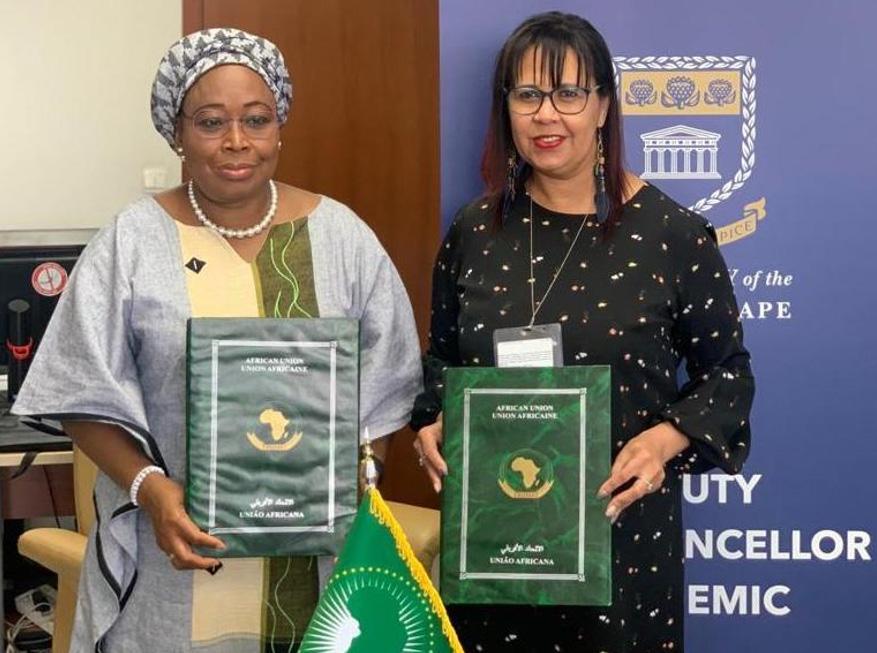

cross disciplinary synergies, deepened our research through workshops, supported capacity building of postgraduate students, encouraged collaborations on new research agendas, supported an engaged scholarship (SoE for SI) linked workshop with colleagues in the Netherlands and migrant NGOs in migration (some which are migrant-led), and circulated new knowledge on translocality in the African context.
A new Master’s Programme in Migration Studies at UWC is forthcoming. The programme is designed to offer students a comprehensive and integrated understanding of aspects and debates of migration and mobility from diverse disciplinary perspectives. Coursework will cover the relevant concepts, theories and legislation associated with migration.
Community engagement and Engaged Scholarship
MMICA is building partnerships and has invited various NGOs and organisations to attend events and have dialogues with community-based organisations. These include an SoE / Engaged Scholarship event: Critical and Transformative Engaged Scholarship on Migration and Mobilities Workshop as part of the 2023 International Symposium in Migration and Mobilities at UWC
The workshop was a collaboration between MMICA, as part of its partnership in the African Academy of Migration Research, and the Engaged Scholarship Narratives of Change project based at Vrije Universiteit Amsterdam, in engagement with community organisations and NGOs in South Africa. These organisations were M&Co, a community organisation of women from the Democratic Republic of Congo and Uganda based in Gqeberha; The Fruit Basket, an organisation in Johannesburg focused on the needs and concerns of LGBTQI+ forced migrants; SWEAT, an organisation based in Cape Town that advocates for the rights of sex workers; and Africa Unite, a human rights and youth empowerment organisation that works with citizens, refugees and migrants to prevent conflicts, enhance social cohesion and promote socio-economic development.
The workshop connected UWC’s Scholarship of Engagement for Societal Impact and the work of the Engaged Scholarship Narratives of Change project. Engaged scholarship here stands as critical and socially relevant academic work that contributes to the societal inclusion of migrant, refugee and mobile communities, while problematising the very structures of power that may (dis)connect academia from their lived realities. The workshop consisted of critical and collaborative engagement and centred the voices of the South African context, while also welcoming input from the Netherlands and the US. The intention was to facilitate a comparative perspective on engaged scholarship and to strengthen migrant solidarity.
The establishment of MMICA has been an interdisciplinary initiative supported and led by the DVC- Academic, Prof Vivienne Lawack. At UWC, with MMICA we plan to embrace a scholarship of engagement for societal impact approach to address one of the most pressing global issues of our time. By fostering knowledge mobilisation and dissemination, conducting impactful research, and fostering internationalisation, MMICA will continue make a positive impact on UWC, the academic community, policymakers, and the wider society.
I would like to express my deepest gratitude to Dr Leah Koskimaki and Prof Mulugeta Dinbabo who led the project and for the MMICA reference group for their support and participation.
As with the previous reflective reports (since 2017), reflection always provides evidence of what can be achieved when people work together. There have been many people who worked with me at UWC on many initiatives, some whose names appear above.
I would like to extend my heartfelt thanks to all the deans, directors, deputy deans: learning and teaching, learning and teaching specialists and all other academic and professional support staff who contributed to our successful completion of the 2023 academic year and continued hard work in 2023, our ‘Transitioning Year’.
I would like to thank the drivers of the Apex projects who so willingly and enthusiastically implemented the projects. I look forward to the continued embedding of these projects within the DNA of this great university.
A special thank you to my office: Catherine Cebindevu (executive PA), Dr Anita Maürtin (director: special academic projects), Janine Fielies (finance administrator), Unathi Sigodi (project administrator) and Dr Mohamed Djemilou (researcher). Your support has been tremendous. Thanks for believing in what we could achieve, for your love, kindness and much laughter.
As this is my last reflective report in my capacity as DVC: Academic at UWC, I look back with a feeling of great contentment on what we as ‘Team UWC’ have achieved in the nine years since I joined the university on 1 April 2015. I can say without fear or favour that I enjoyed my time in this role immensely and that I did not do this on my own, but always with people. This collaboration has stood us in good stead and my wish for UWC is that you will continue to embark on new initiatives, with people and not as individuals. I wish you all of the best. May the academic project at UWC go from strength to strength!

Prof Vivienne Lawack July 2024

Period: January — December 2023
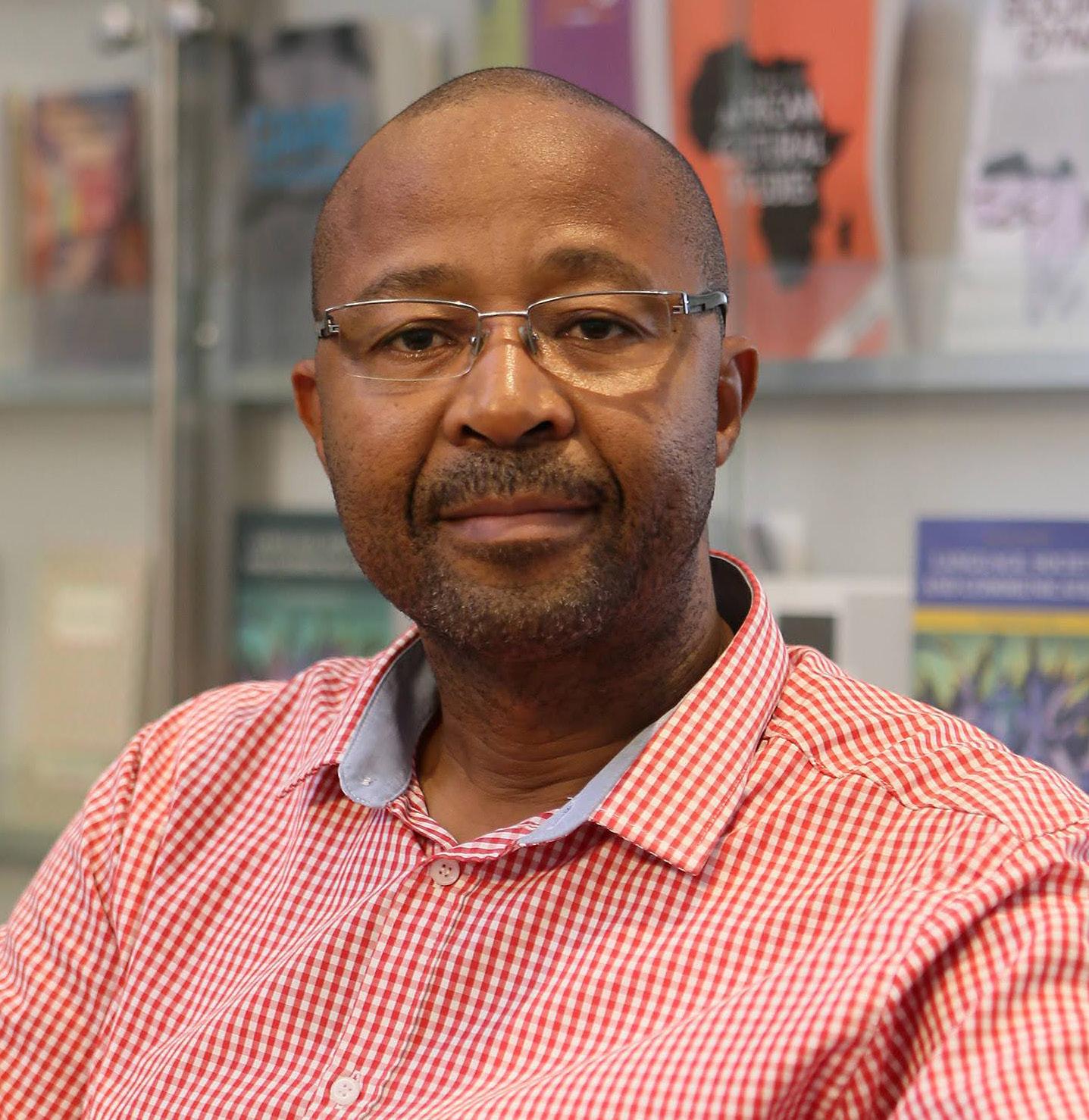
Dean: Faculty of Arts and Humanities
This report reflects broadly on the academic project within the Arts and Humanities Faculty regarding its key priorities accomplished in the 2023 academic year. It therefore highlights the faculty’s achievements as well as our ongoing academic activities and plans. In doing so, it reflects on enablements that have made those achievements possible; it also reflects on constraints that, at times, have impeded us from fully implementing the shared vision we set out for ourselves in alignment with the Institutional Operating Plan (IOP) of 2021–2025. With our collaborative approach and efforts, challenges – where these existed – have been (and continue to be) addressed as effectively as possible and without delay. Finally, based on our insights and shared vision, the report outlines our strategies to continue to implement our plans in areas where we have succeeded, as well as to work at those areas where we seem to have fallen short. There are ongoing ‘work in progress’ activities in the faculty that continuously feed into the academic programme, with gaps identified and addressed through our attempts to embrace good practices.
Promoting research and postgraduate studies
During the year under review, the faculty continued to support its research agenda, postgraduate students and early career researchers through various scholarships and grants which include, but are not limited to: Department of Sport, Arts and Culture; DVC: Research and Innovation bursaries; National Institute for Humanities and Social Sciences (NIHSS); and Andrew Mellon Fellowships. Some of these initiatives are intended to consolidate an academic pipeline for aspiring academics and early career researchers to advance their career pathways.
In 2023, the faculty’s top researchers received their National Research Foundation ratings as evidence of their scholarship and contribution in their respective disciplines, and a handful of our top scholars were placed in the B category.
During the year under review, senior scholars from the faculty and those affiliated with UWC held visiting scholarship and professorship positions with the aim of supporting the faculty’s research agenda. The senior scholars include, but are not limited to: Prof Ruth Barton, visiting professor in film studies, under the auspices of the Charlotte Maxeke-Mary Robinson Research Chair visiting fellowship in the CHR; Prof Sarojini Nadar, visiting professorship: King’s College, London and Wesley House, Cambridge; and Prof Monwabisi Ralarala, guest researcher and visiting fellow, Linnaeus University Centre for Concurrences in Colonial and Post-Colonial Studies, Sweden.
The first term of 2023 began with the Dean’s Distinguished Lecture. The Women and Gender Studies Department, in collaboration with the faculty, hosted a prolific feminist scholar from Rutgers University, Prof Jasbir Puar, who delivered the lecture, Combat Breathing: On Maiming as Global Governance.
The faculty is proud to announce the following promotions that were awarded during the year under review: 57
• From lecturer to senior lecturer: Dr Chinwe Obuaku from Sociology; Dr Lynn Mafofo from Linguistics.

• From senior lecturer to associate professor: Dr Kelly Gillespie (Anthropology); Dr Jonathan Jodamus (Religion and Theology); Dr Lee Shae Sharnick-Udermans (Desmond Tutu Centre for Religion and Social Justice).
• From associate professor to full professor: Prof Zannie Bock (Deputy Dean: Teaching and Learning).
Implementing effective administrative systems and governance
The faculty’s effective administrative systems continue to be one of its key priorities. Its achievements in 2023, resulting from its high level of efficiency, responsiveness and support, have been recognised through the nomination and winning of awards by our professional staff at the Registrar’s Rewards and Recognition event. Faculty staff whose commitment and contributions were validated in the awards comprise the following: Dimpho Ndala (most promising academic administrator); Giles Stevens (positive attitude); Grace Naidoo (most innovative administrator; Tasneem Parker (outstanding PA/ secretary/office admin); Leslie Richards (outstanding administrator); Dr Susheela Mcwatts (faculty manager of the year); Zandile Dorothea Mcinziba (service excellence); Linguistics Department (most outstanding department or unit).
Extraordinary appointments: extraordinary professors, research fellows, and emeritus professorships
During the year under review, the faculty was delighted to announce the appointment of its extraordinary professors and research fellows with effect from 2023. These extraordinary appointments were as follows:
• Nine extraordinary professors: Afrikaans and Nederlands; Desmond Tutu Centre for Religion and Social Justice; English; Religion and Theology; Sociology; Historical Studies; Women’s and Gender Studies; Seven research fellows appointments: Religion and Theology; Women’s and Gender Studies; Desmond Tutu Centre for Religion and Social Justice; Centre for Multilingualism and Diversities Research.
• One emeritus professorship: Historical Studies, signalling the faculty’s commitment to advancing one of the key institutional goals, that is, to be a research-led institution.
Commitment to delivering relevant academic programmes
Apart from its achievements and good standing status through the recognition of its students and academics for teaching and learning excellence, in 2023 the faculty saw an extensive environmental scan. This preceded the design and development of new interdisciplinary BA Honours (Media Studies) as well as the Postgraduate Diploma in Language Practice, the latter with an option to focus on Legal Interpreting and Forensic Linguistics. These newly developed postgraduate programmes, which are intended for offering in 2024 and 2025 respectively, have been contextualised within the country’s current needs, and are responsive to the needs of the relevant industries.
In 2023, the faculty continued with its commitment to grow its staff from underrepresented groups through the creation of associate lectureships, nGap programmes and targeted appointments in the context of retirements of senior members or resignations. This will empower young black scholars (in the broad sense) who are capable of developing into senior positions within a relatively short period. Based on this commitment, the faculty continues to implement the employment equity plan, as and when the opportunity arises.
During the year under review, work continued to improve the coordination and synergy between student support initiatives and the faculty. This was evidenced by the establishment of a legitimate faculty structure (Arts and Humanities’ Student Faculty Council), a move that was considered to be a unique opportunity to shape the direction of the faculty and ensure student interests are given priority and that student voices on academic and other related matters are heard at the highest levels of governance.
In recognition of the importance of connecting our research with knowledge production, in the Global South and North, internationalisation took centre stage in 2023. The high point was the faculty’s participation in the UWC delegation visit to Belgium to deepen its relationship with longstanding partner, UGhent, and to consolidate the relationship with new partner, Vrije Universiteit Brussels, a relationship out of which research and teaching partnerships are steadily being realised.
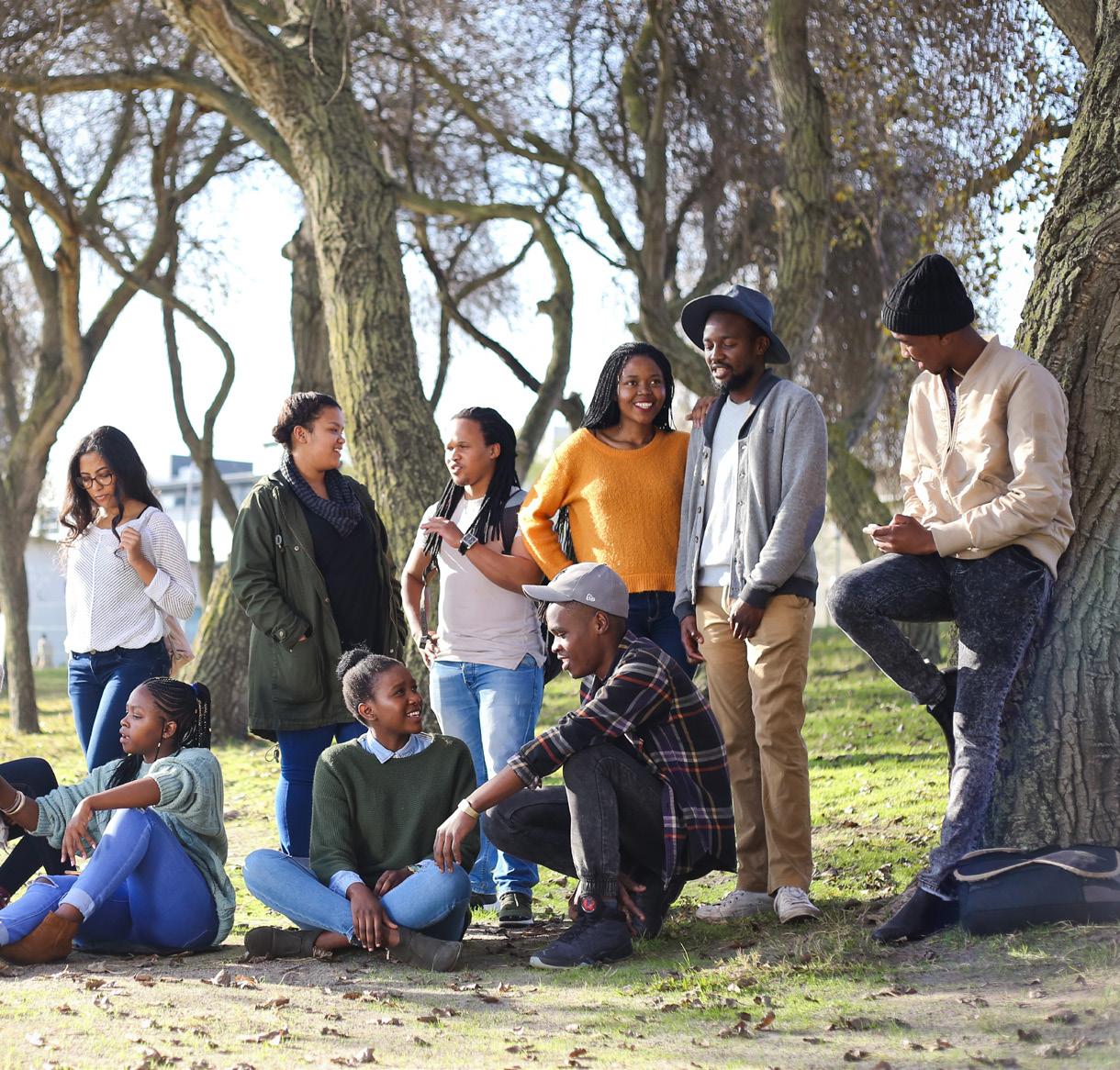

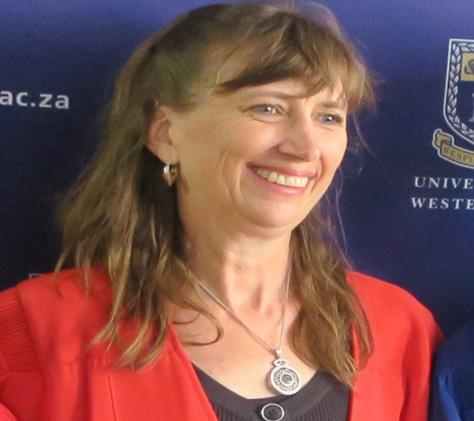
Supported by Dr Marijke du Toit, Learning and Teaching Specialist, Faculty of Arts and Humanities
The strategic priority of this goal is to foster a conducive environment for excellence in learning and teaching, to enhance the student experience, and to ensure student success and retention. In 2023, the student experience was supported by several institutional and faculty initiatives.
Graduate Lecturing Assistant (GLA) Project: Under the leadership of the Deputy Dean of Learning and Teaching and the Learning and Teaching Specialist, the A&H GLA programme continued to grow. In 2023, 40+ GLAs were appointed at a cost of R3 344 000. We began the year with the CIECT=led online training to introduce GLAs to the online learning and teaching environment. We then held a day-long workshop at the hotel conference venue 15 On Orange. This served to introduce the programme to newly appointed GLAs and to build the cohort through the exchange of ideas and insights about learning and teaching at UWC.
We also offered several workshops during the first semester, including a workshop on student mental health issues led by Roné Gerber of CSSS; and a workshop which focused on the enrichment of participants’ own writing for their graduate research, led by the Writing Centre. These workshop sessions were well received. We continued our series of faculty-based workshops in the second semester. The first two workshops aimed to help GLAs hone work-related life skills and careerbuilding by focusing on how to complete personal tax returns and on professional presentation of CVs. The third workshop drew on creative writing techniques to enhance academic writing skills and to open up opportunities for support within the cohort of GLAs in relation to their academic research as MA and PhD students. These workshop sessions received a positive response from participants (as reported in all the individual reports on GLA workshops as part of our UCDG funding). The programme concluded with a day-long reflective workshop at the Greatmore Hub in Woodstock.

Advice and assistance for the design of a university-wide programme of workshops for GASs: At the start of the second semester, a former GA, Leballo Tjemolane, was appointed by the DLTSS and tasked to design a series of workshops for GAs at UWC. As a first stage of this initiative, he embarked on consultations with the various faculties. We invited Tjemolane to attend our second-semester workshops. The T&L specialist, Dr du Toit, also held several discussions to contribute insights and ideas to the planned workshops.
The FYE Project: The mentorship offered via the First-Year Experience project was strengthened by an effort to make sure the team of mentors represents the majority of departments in the faculty. Early in 2023, the DD L&T and T&L Specialist met Tina Hlanjwa, the new academic student success adviser, and with Charline King, our new FY transition officer, to ascertain what support they needed from us and to help strengthen communication between the FYE project and lecturers in our faculty. We then assisted with the introduction of the FYE project to those lecturers and course coordinators who are responsible for first-year modules. We also updated and extended the resources about FYE available on our Faculty T&L resources website. King and Hlanjwa also attended our lunchtime GLA workshops (as much as possible, in terms of their schedules of training and other engagements). The Faculty T&L team has also continued to meet regularly with King. At the end of the second semester, King resigned to focus on her studies, and the ASSA officer, Hlanjwa, undertook to act in her place. Hlanjwa also participated in discussions and planning for the design of the faculty implementation of the student mental health and wellness implementation plan.
The tutor project has continued to provide critical support to the academic programme. The faculty tutor budget for 2023 was allocated to the 15 faculty departments using the proportional method (based on student registrations per module) developed by the DD L&T. This system, as well as the monthly monitoring of spending, has resulted in a fair and transparent approach to the spending of the budget, as well as ensuring that the faculty remains within budget and aligned with institutional tutor payment norms. However, several problems remain:
Late or incorrect payments: Unfortunately, this remains an ongoing issue with workstudy payments. Although not nearly on the same scale as experienced in 2022, the problems persisted, with some tutors having to wait until the following month to be paid. As a result, we experienced a high degree of tutor attrition. In sum, tutor pay is too low or too erratic to compete with more attractive opportunities which our students are increasingly able to find in the online work environment, e.g. as online materials developers/ learning materials designers. We are increasingly struggling to retain experienced tutors for our academic programme.
Another concern is that it is impossible to obtain correct spending figures from Workstudy/Finance, despite repeated requests. This makes proper budget planning difficult. From a faculty perspective, we try to keep track of departmental spending by requesting that departmental tutor co-ordinators (TCs) send us their total figures for each month. However, given the ongoing issues with payments, TCs are not always sure how much tutors are paid. We therefore request that, to be sure of our spending for the semester, and indeed for the year, we be given regular, accurate figures drawn off the system by Finance.
Under the leadership of Dr Martina van Heerden and Grace Naidoo, the A&H Faculty continues to manage all bursary advertising, information and application processes via the A&H Bursary hub (https://www.uwc.ac.za/study/ faculties-andprogrammes/faculty-of-arts-and-humanities/ bursary-hub).
This means the bursaries we have at our disposal, including the DVC R&I bursaries for postgraduate study, the DSAC Language bursaries and several Mellon funding opportunities, are accessible to all students. These bursaries are fairly and transparently allocated, following the principle that the funding should be spread across the student body (i.e. only one bursary per student).
Student Faculty Council (SFC): The Arts & Humanities Student Faculty Council was set up in 2022. At the end of 2023, we hosted a lunch and end-of-year-reflection with council members. During this event, it became clear that th faculty needs to provide more support for this initiative to ensure the Student Council receives adequate leadership training. For 2024, Franwin Strauss, an experienced faculty officer with oversight over undergraduate student affairs, will be appointed as our faculty liaison person to give more direct leadership to this project.
Student mental health and wellness implementation plan:
During the second half of 2023, the Deputy Dean Learning and Teaching and the L&T Specialist convened a working group to prepare the faculty implementation plan for the newly approved institutional student mental health and wellness policy. The working group included representatives from the GLA cohort, SRC, SFC and academic and administrative staff. The group met every second week over three months under the guidance of the CSSS steering committee, developing the implementation plan in a consultative manner. This consultation included a survey for lecturers on their assessment practices and how they accommodate student mental health issues, and the presentation and discussion of the plan at the faculty learning and teaching committee, mancomm and faculty board. The implementation plan was ratified in early 2024 and the new faculty wellness subcommittee, led by the DD L&T, put together a series of practical activities to bring it to life.

The strategic priorities of this goal are to develop a conducive environment for excellence in learning and teaching, embracing pedagogy that enables graduates to acquire attributes for the changing world; and align and integrate teaching and assessment practices to ensure the acquisition of graduate attributes. To this end, the DD L&T and T&L Specialist initiated several projects and actions:
Arts T&L Awards 2023: Two lecturers in the Faculty for the Arts & Humanities received the Excellent Emerging Lecturer Award: Dr Kamil Naicker and Dr Mbulisi Sibanda. Naicker went on to win the Institutional Excellent Emerging Lecturer Award.
Learning and Teaching policy development and strategic planning: The DD L&T and L&T Specialist contributed to discussion and planning towards the DDTLS pilot project for student feedback on teaching and modules. Interim guidelines were also provided in response to the public launch of generative AI, with a focus on possible adjustment of assessment practices. The L&T Specialist also created a dedicated website with relevant resources. The website reviews international developments in policy and responses, and provides a range of guidelines and toolkits. Relevant documents produced by the L&T Office during 2023 include:
A&H Guidelines for the Mode of L&T for 2023
A&H response to the Student Feedback on Teaching and Modules (SFTM) proposal
Arts & Humanities T&L Strategic Plan 2023-2025 https://sites.google.com/uwc.ac.za/ai-tl-humanities-uwc/ home
New, careers-oriented postgraduate programmes: The DD T&L worked with the Dean and other colleagues to get two new postgraduate career-focused programmes up and running:
Planning for the launch of the Postgraduate Diploma in Language Practice continued, with the CMDR taking the lead. This new interdisciplinary programme will commence with its first cohort in 2024, taught by A&H colleagues from different departments (CMDR, African Languages, English, Foreign Languages, Linguistics). This diploma addresses the need for more careers-orientated degrees as it includes theory and a work-integrated component. The content provides a practical and theoretical foundation within a rigorous academic framework that builds a high-level foundation training to enable students to succeed as professional language practitioners and/ or engage in further research. More specifically, it gives insights at a practical level into the various aspects of a professional language practice career (such as translation and interpreting, literary translation and lexicography), and at an academic level into the processes and principles that should inform language practice professions. However, for the successful implementation of this hybrid module, better infrastructure is needed, including a seminar room properly equipped for hybrid teaching and a language laboratory or hub with state-of-the-art translation and interpreting equipment. A funding proposal has been prepared, with the raising of funds to support this a priority in 2024.
Planning for the new, interdisciplinary Media Studies Honours programme continued, with the decision that the Linguistics Department should host the programme, and the strategic appointment of an associate professor with relevant media expertise and industry experience. This appointment is to be
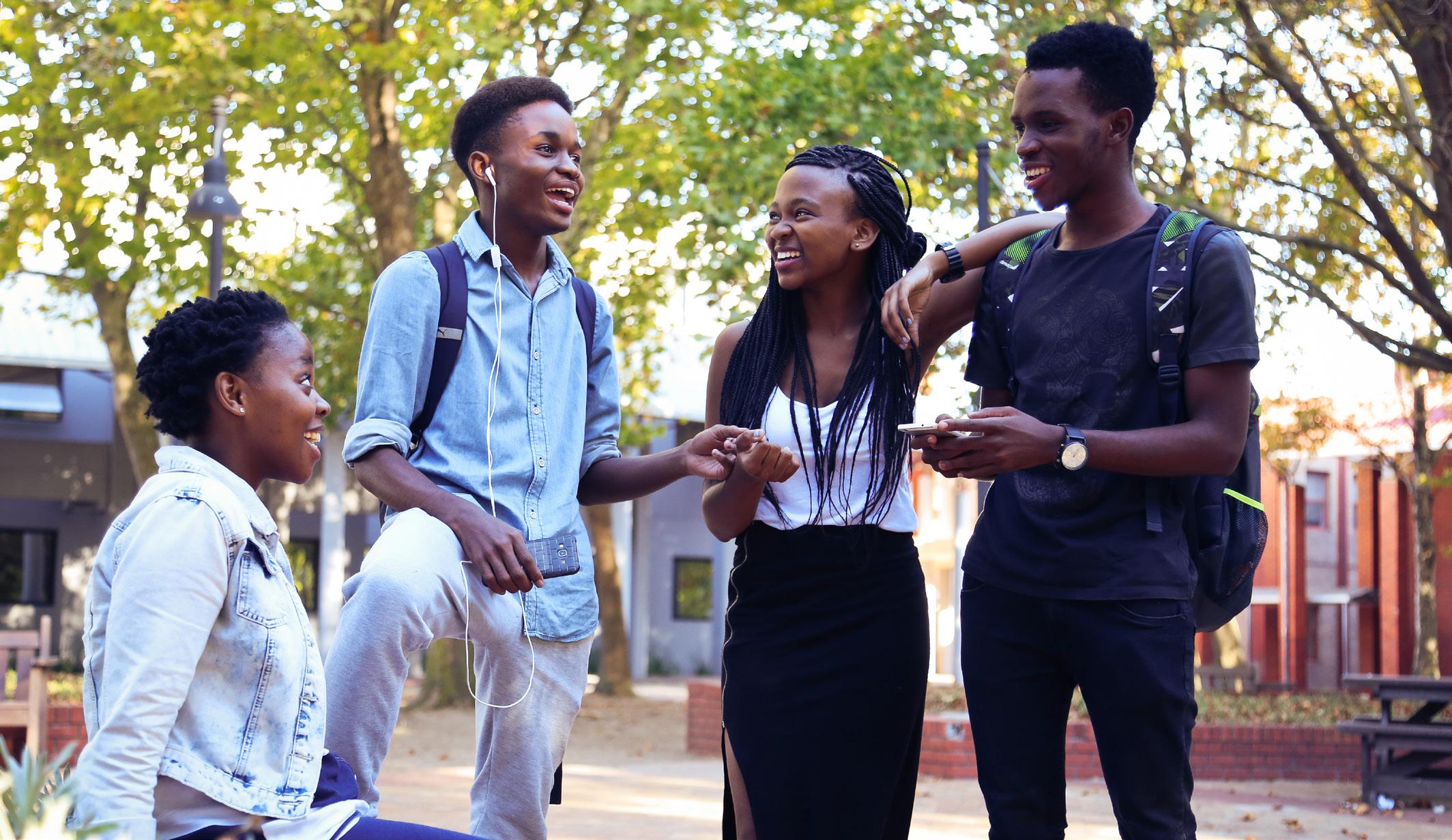

strengthened by the creation of a joint chair with a senior colleague from the Free University of Brussels (VUB). The development of the documentation for the new programme will take place in 2024. It is anticipated that the programme documents will serve at SAP in June 2024, for implementation in 2026. This new programme is in direct support of the Institutional Operating Plan, which seeks to develop programmes with a cutting-edge disciplinary and critical perspective, and to prepare our graduates for the workplace.
Undergraduate curriculum renewal: A series of workshops and meetings with the departments of English, Anthropology and Geography, Environmental Studies and Tourism were held as part of planning for curriculum renewal and transformation.
High Impact modules: The T&L Specialist spent considerable time working with data analyst Gairodien Schroeder (APU) to explore possibilities for detailed analysis of data in order to provide insight into questions of student academic performance with respect to modules identified as high priority and high impact, and also more generally. We focused strongly on data analytics and the design of tools that will enable us to work productively with departments across the faculty on questions of student performance and academic success. An important outcome of these discussions was the development by Mr Schroeder of a spreadsheet tool (using Excel) that enables us to look closely at module pass rates. While there is significant overlap with the data that can be extracted from other platforms that are being used as part of the Siyaphumelela Project, such as PowerHeda, we opted for this widely accessible Microsoft tool at this early stage of our project because it is easy to use offline and useful as part of enabling academic staff who do not have specialist training for data analysis to participate in reflective discussions in which strong use is made of relevant statistics and data sets. We are now easily able to produce a table-style graph that shows the overall distribution of marks, e.g. what percentage of student marks fall within ‘bands’ (0%, 1-9%, 10-19% ... up to and including 80-89%, etc.). The spreadsheet tool is set up so that it is possible to compare overall student performance in terms of final marks for two modules at a time, e.g. data pertaining to the same module in two different years, or two entirely different modules from a particular year, etc. We can also easily find out and share details about the programmes involving students who took a particular module, whether situated in our own or in other faculties. The tool allows for a ‘deep dive’ into the details of student coursework and exam results for each module, a facility which creates useful possibilities for exploring patterns of student academic performance. In the second semester (using data from 2019 to the first semester of 2023), the L&T Specialist used the tool to examine pass rates and academic performance more generally, pertaining to HP and HI modules. This will feed into future discussions with departments about how best to support student learning needs, and also promises to provide valuable data for departmental and programme reviews
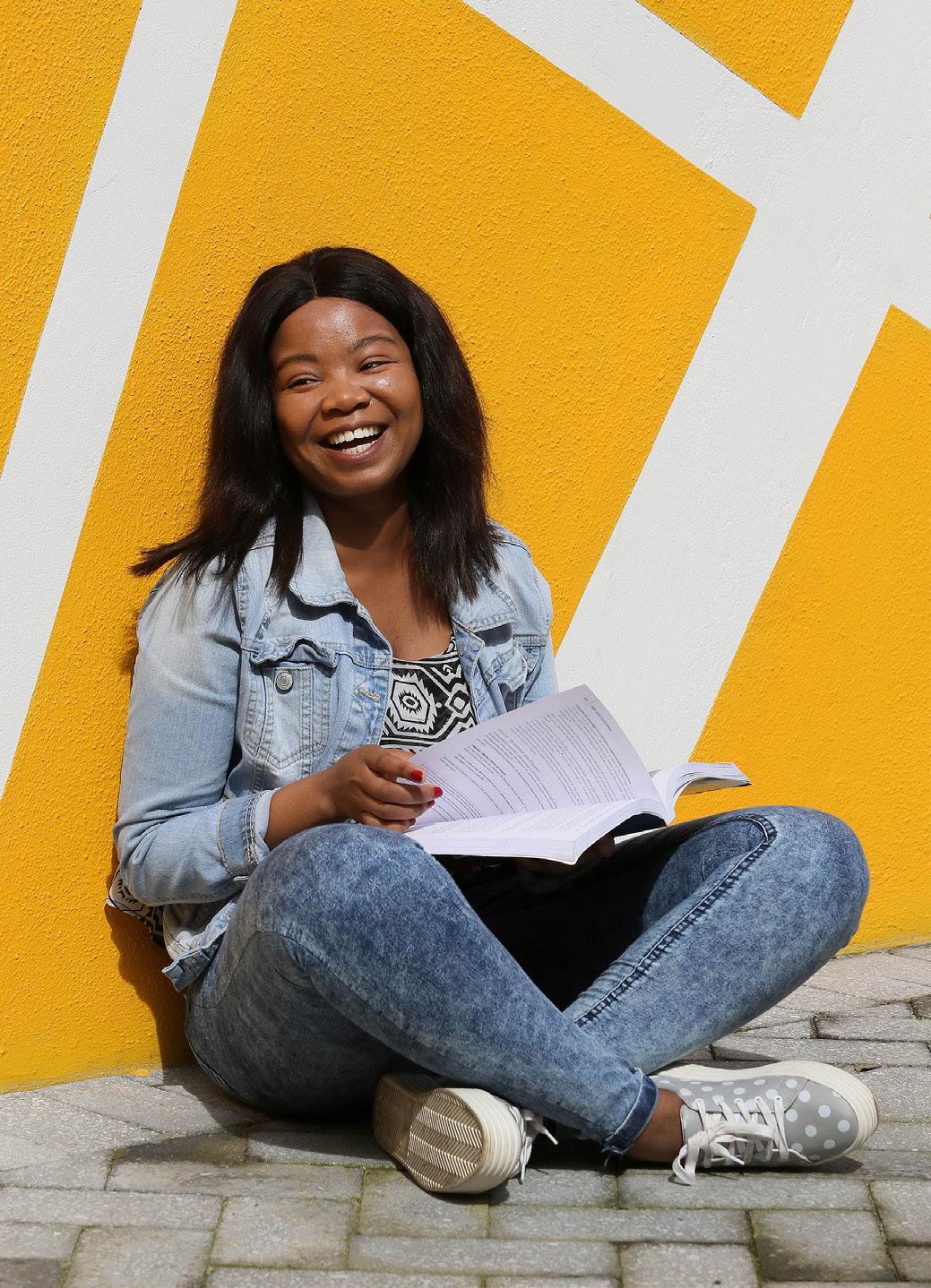
Discussions of how to develop tools for data analysis have also included the possible use of statistics from Ikamva as the learning management system used by all modules in the faculty. Exploratory research suggests there is a strong correlation between students’ use of on-Ikamva-based resources and tools and the marks they achieve in a particular module. This can also easily be exported to Excel. We plan to integrate this data set into the Excel spreadsheet tool as part of enabling a much more nuanced understanding of student participation in learning activities and whether/how this interrelates with the course and exam marks they achieve in a particular module.
This strategic priority is to create a conducive environment for a research-led approach to learning and teaching. Here is the list of learning and teaching research achievements for 2022:
SOTL publications and projects: The Faculty of Arts and Humanities continues to produce an impressive list of SOTL publications and externally funded projects (see Appendix A).
UCDG funding: In 2023, the T&L Office organised and funded a number of activities and events to strengthen the learning and teaching project in the Faculty of Arts and Humanities from the UCDG budget. Total budget: R130 500. These activities covered student support (e.g. GLA workshops), staff support (e.g. T&L writing retreats) and curriculum support (e.g. departmental workshops on curriculum).

Faculty curriculum book project: As one of the editors of the faculty book project, the DD T&L assisted with getting this project off the ground. Seventeen prospective chapters were sent out for review, and we anticipate a 2024 publication date:
Ralarala, M., Pillay, S., Bock, Z. & Kaschula, R. (Eds) (forthcoming). Unlocking the chains of knowledge: Understanding the challenges, remaking pedagogies and curriculum renewal. Stellenbosch: AFRICAN SUN MeDIA.
During the year under review, the DD L&T and L&T Specialist initiated and facilitated the following initiatives:
CIECT training in February: We are once again appreciative of the fact that throughout February, CIECT ran training for our staff and GLAs to prepare them for hybrid learning and teaching in 2023.
Teaching and learning retreats and induction of recently appointed lecturers: Newly appointed lecturers attended the course Towards Professionalisation of Teaching and Learning, which is co-ordinated by the DLTSS. We held a writing retreat from 22–24 June. Participants focused on L&T publications and their portfolios. The faculty L&T team was available for consultations and worked intensively with several colleagues. The retreat also hosted a session for discussion of work-in-progress for the special issue of Multilingual Margins that was conceptualised during last year’s retreat, titled, Building decolonial teaching and learning through connecting to our diverse pasts: A case for ukuzilanda. The special issue will be published in early 2024. The L&T writing retreat and the printing of the special issue were funded through our UCDG L&T funds.
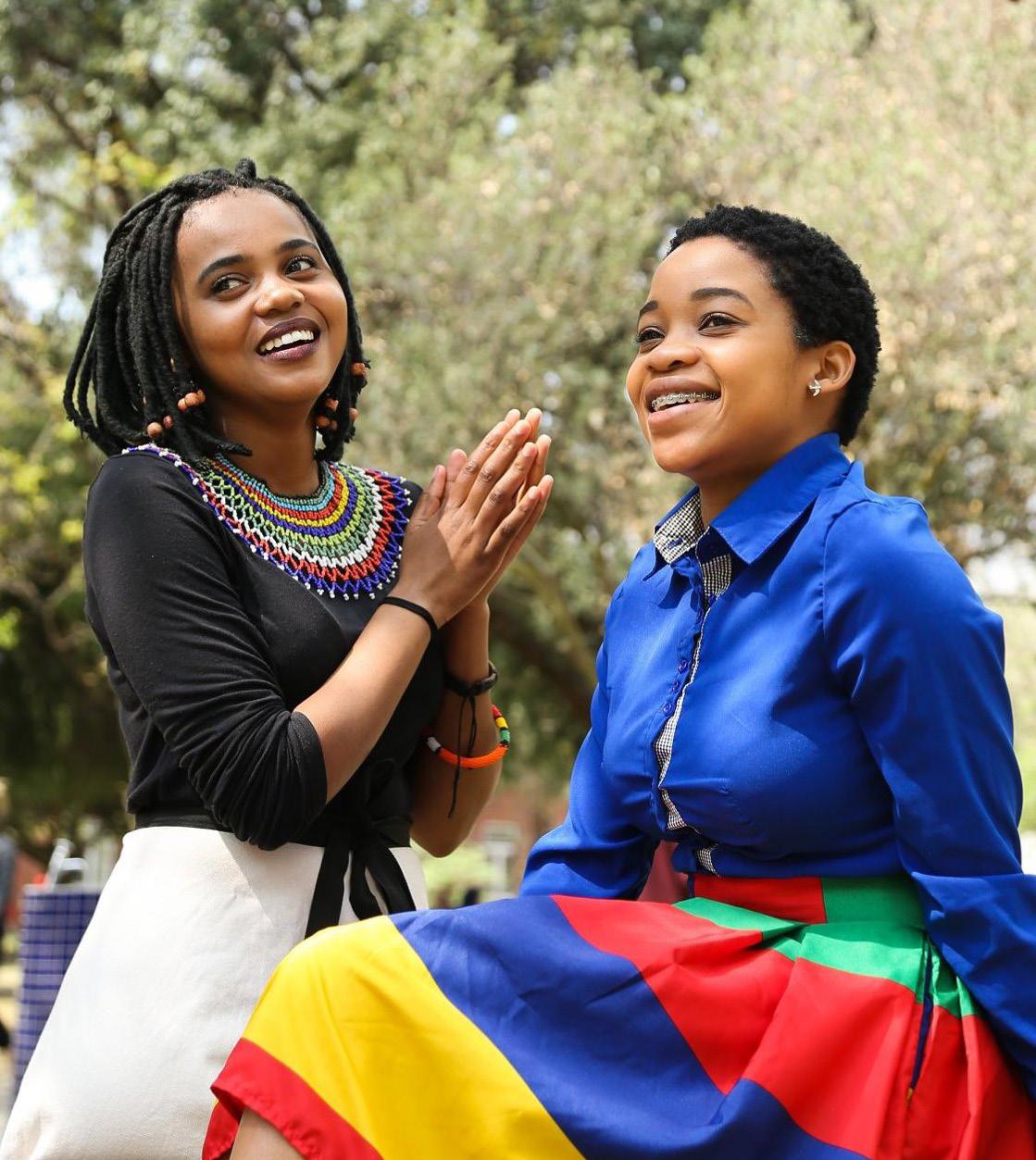
The strategic priority for this goal is to enhance the visibility and academic reputation of the academic project. As part of our strategy to communicate effectively with lecturers and GLAs, the Arts L&T Resources (Ikamva website) continues to be revised and updated. One of the sections that has been revised and expanded this year aims to involve lecturers in plans to consolidate and improve our approach to student course evaluations.
Dr du Toit has also developed a new resource that specifically focuses on the implications (for learning and teaching at universities) of the rapid development and increased public availability of large language module chatbots such as ChatGPT. Because of the wide range of urgent and relevant issues, we created a separate website (available at https://sites.google. com/uwc.ac.za/ai-tl- humanities-uwc/home). The website has guidelines and resources relevant to learning and teaching in all of our faculties. It provides introductory explanations of relevant AI technologies; a survey of how universities globally have responded with regard to policy development, for example by extending/adapting their commitment to ‘academic integrity’; a page that presents various ‘AI tools kits’ developed by South African universities; a section that features current public and scholarly debate about the social and educational impact of AI; and annotated reading lists of relevant research. A subsection also focuses on the implications of AI with regard to assessment in the humanities.
Prof Zannie Bock graduated from the HELM Women in Leadership certificate course at a ceremony at NMMU in February 2023.
Prof Bradley Rink completed the programme requirements and was confirmed as a lifetime Teaching Advancement at Universities (TAU) Fellow in 2023. Prof Rink was part of the TAU4 cohort –the fourth since the inception of the DHET-funded programme which seeks to build a cadre of teaching fellows in a wide range of disciplines and aims to contribute towards the enhancement of teaching and learning in higher education in South Africa by supporting the development of academics across institutions and disciplines as scholars, leaders and mentors in their fields. Along with a range of programme requirements and tasks, Prof Rink completed an institutional project titled, ‘For Slow Teaching: Courageous and Compassionate Pedagogy in Times of Change’. The project sought to explore the application of Slow teaching practices within a first-year module, GES111 Introduction to Human Geography. Prof Rink has continued his participation in the Teaching Advancement at Universities (TAU) fellowship for the period 2022–2025. This achievement will enrich the faculty’s teaching and learning strategy, as Prof Rink plays a prominent role in our activities and can provide leadership at departmental and faculty levels.

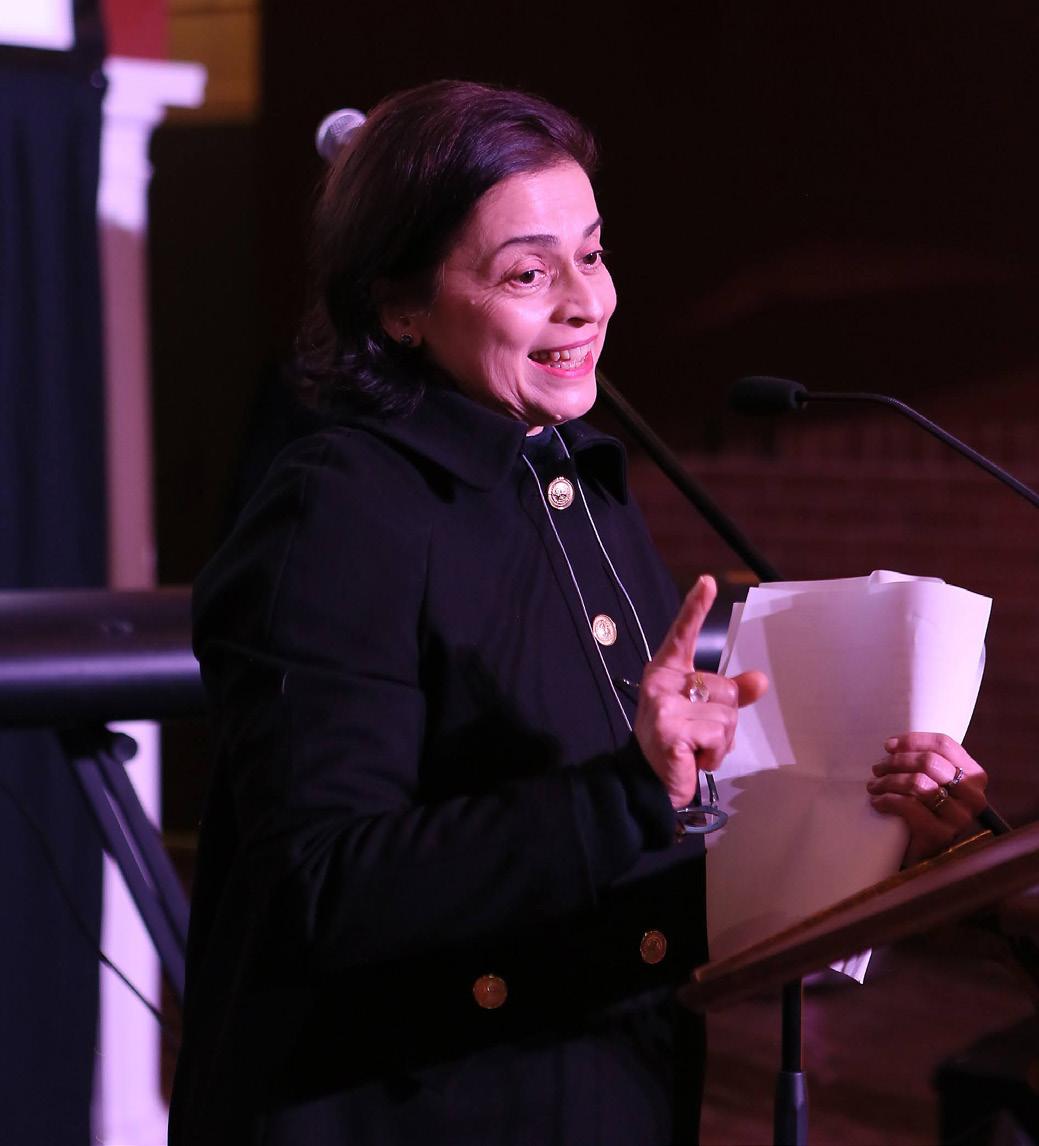
Prof. F. Fiona Moolla
In 2023, the Faculty of Arts and Humanities again surpassed expectations of the quality and quantity of its research that often critically challenges dominant assumptions and experimentally cuts across genres and modes. Scholars in the faculty excel in the authorship of the more traditional research forms like the journal article, the book chapter and the monograph, finding avenues for publication in premier journals and first-tier publishing houses. However, the faculty also pushes the boundaries of these genres in the strength of alternative modes of critical and theoretical expression that take the form of creative writing, narrative non-fiction, mixed media works and performance. In respect of accredited publications only, the faculty will be submitting 180 journal articles, 14 book chapters, six monographs, one conference proceeding and one novel.
In October 2023, the Faculty of Arts and Humanities celebrated its standing at the DVC Research Recognition Awards, taking the following prizes: The overview that follows of the research and related production of the faculty’s four centres, four research chairs and 15 departments/units makes it clear that the submissions to the Department of Higher Education and Training represent merely a superficial marker of the full scope of the research activity of the faculty.
• Mrs Grace Naidoo received the award for the administrator who best supported research and innovation in 2022.
• Dr Aja Marnewick of the Centre for Humanities Research won the award for best faculty impact creative arts output (2022).
• The Faculty took second place for its overall research uutput in 2022.
The faculty’s reputation as a leading national hub for research in the arts and humanities is attested to by the record number of successful NRF ratings and reratings. These include Prof Tammy Shefer’s B1 rating; Prof Sarojini Nadar’s B2 rating; Profs Simon Beck, Duncan Brown and Ignatius Swart’s B3 ratings; and the C2 ratings of Profs Emmanuel Mayeza, Amiena Peck and Bradley Rink.
To a significant extent, the faculty’s research productivity is supported by its productive writing retreats. The retreat held from 24-27 October 2023 gave academics a welcome break from teaching and administrative duties, allowing for the culmination of their research in writing.
In 2023, the faculty continued to strengthen external links with its international partners. For example, internationalisation opportunities for staff and students at meetings with representatives of the following institutions were explored:
Pontifícia Universidade Católica do Paraná Delegation
• EPHE, Ecole Pratique des Hautes Etudes (Paris)
• University of Minnesota
Institution Mission – Brazilian Federal Institutes: Instituto Federal do Rio Grande do Norte (IFRN), Natal (Brazil)
The faculty participated in the UGhent GAPSYM16 Conference, hosted by the Centre for Humanities Research at Greatmore from 13-14 November 2023, on the theme, ‘Knowledge production, research ethics and authorship in African contexts’.
The GAPSYMM16 Conference was followed by an all-day exchange in the faculty at the Bellville campus that allowed for networking of the entire faculty with the UGhent partners and other visitors who attended the conference. Presentations were also made by two representatives of São Paulo Federal University of ABC.
Towards the end of 2023, the faculty also won funding for a fouryear project awarded by the European Education and Culture Executive Agency Intra-Africa Academic Mobility Scheme. This will further intra-African contact and networking in the years to come.
The project, ‘Towards Enhancing Sustainable and Innovative Environmental Change Solutions’ (TESIECS), is a Southern African-focused initiative encompassing several highly ranked institutions. The EU technical partner is Vrije University and the collaborating institutions are UWC, the University of Johannesburg, the University of Botswana, the University of Zimbabwe and the Namibia University of Science and Technology. Different aspects of climate change and adaption, mitigation, assessment and solution-seeking are present in the institutions’ missions, ethos and academic programmes. These have been brought together within the work package of the IntraAfrica Academic Mobility Scheme TESIECS plan. Ultimately, TESIECS is designed to enhance the capacities of staff to be better able to teach, train and develop new cohorts

of postgraduates in the area of climate change and social and environmental justice. Master’s and doctoral students will be nurtured to become future experts with specialised knowledge, critical skills, and know-how to be impactful in addressing the specifics of climate change mitigation in the various countries of the region. The development will emerge as graduates are trained as interns and students take on formal degrees, attend seminars and are mentored by experienced scholars working in the interdisciplinary domains of climate, development, impact assessment and socio-economic and environmental interventions. An Africa-By-Bus programme, pioneered by the University of Johannesburg, will bring in a dynamic and innovative dimension to the training and will offer a grounding in the relevant mobility issues to facilitate the travel of large groups of students to one another’s countries to witness key issues of relevance to understanding the shifting environment, sustainability and development contexts.
By targeting a diverse range of staff and students and with an explicit transformation purpose (including a strong representation of women, the differently abled and minority ethnic groups), an inclusive approach will be assured. Competent professionals who are capable of influencing state policies, programmes and initiatives on the topic of sustainable and equitable environmental development will be developed. At the inter-institutional level, a robust infrastructure for research and a solution-orientated think-tank driving thought leadership and strategic interventions will be cocreated by the partners. Over its lifespan, TESIECS will contribute towards the achieving of at least nine Sustainable Development Goals (climate action, no poverty, zero hunger, good health and wellbeing, clean water and sanitation, affordable and clean energy, sustainable cities and communities, life below water, and strong institutions for peace and justice) and to constructing a uniquely Southern African network capable of driving the debate in the area of sustainable and innovative environmental change solutions.
The participating departments in the Faculty of Arts and Humanities are Women’s and Gender Studies, Geography, Environmental Studies and Tourism. These departments will partner with the Institute for Social Development in the Economic Management Sciences Faculty.
Acknowledging that the postgraduate students of today are the Arts and Humanities researchers and authors of tomorrow, the faculty has embarked on a period of paying focused attention to the postgraduate experience of its MA and PhD students, and their development as world-class scholars. In 2023, the faculty hosted two full-day events: a postgraduate student workshop in the third quarter and a supervisor workshop in the final quarter. The faculty also relaunched its postgraduate student journal. The WritingThreeSixty Journal of Research and Creative Texts has found fresh momentum under a new editorial board.
The CHR, from its locations on the Bellville main campus and the Iyatsiba Lab in Woodstock, has continued to undo hierarchies in the knowledge economy and develop local communities in innovative and enabling ways. The CHR achieves these goals through a number of strategic initiatives, including its annual winter school, the directed reading programme, the introductory humanities lectures, the wew archival visions labs, sound working groups, a documentary film programme, and its partnership with the Zeitz Museum of Contemporary Art Africa. In 2023, the CHR continued its longstanding partnership with the rural arts education organisation Net vir Pret, bringing to realisation another puppetry parade in Barrydale.
In 2023, the CHR produced 13 journal articles, six book chapters and one book – Premesh Lalu’s Undoing Apartheid, published by Polity Press.
The 2023 report on the first five years of the 15-year DSI-NRF Flagship Programme housed at the CHR recognised the abovethreshold performance of the Flagship in all significant areas.
The centre conceptualises its activities through thematic areas: religion, gender and sexuality; religion and media; religion, education and epistemology; religion, race, politics, and African religions; and religion, ecology and economy. In each of these areas, the centre supports graduate research, conferences, seminars and workshops, and community engagement activities. The director, Prof Sarojini Nadar, and the centre’s extraordinary professor, Prof Miranda Pillay, were invited as the keynote speakers to numerous conferences, colloquia and symposia.
In June 2023, Ishaya Anthony, a joint PhD candidate associated with the UWC-Ghent SIP partnership, jointly supervised by Lee Scharnick-Udemans and Kris Rutten, successfully completed his public defence, concluding the Belgian portion of the examination.
The centre’s researchers produced 15 journal articles, 13 book chapters and 18 public scholarship publications/op-eds in various media outlets in 2023.
The Centre for Multilingualism and Diversities Research (CMDR)
In 2023, the CMDR made significant strides as a research centre. The centre has expanded its research footprint in niche areas –family multilingualism, multilingual literatures and multilingual education – gaining the attention of local and international stakeholders. The CMDR has become a home for postgraduate and postdoctoral students and welcomed academics and students to share in its activities, seminars and workshops in 2023. Fellows captured funding to grow these areas but also engaged

in numerous academic activities (locally and internationally) and community activities, and produced important publications in their fields of research. From these activities and publications, new networks have been established, importantly in the Global South, and fellows have been acknowledged for the quality of their research through awards, special lectures, workshops and other fora. In 2023, the CMDR recruited its first cohort of students for the Postgraduate Diploma in Language Practice programme in the Faculty of Arts and Humanities. The PGDip Language Practice students will enter the 2024 academic year.
The Centre for the Advanced Study of African Societies
CASAS made its presence felt at various conferences, with notable participation and achievements. Senior researcher
Dr Ndinga-Koumba-Binza chaired a keynote session at the Colloque International de Linguistique de Dakar, further establishing CASAS as a key player in the academic and research community. Prof Mantoa Motinyane delivered a keynote at the International SAFOS Conference hosted by CUT, Bloemfontein. Seminars presented scholars’ research as follows: Dr Levis Mugumya (a CASAS visiting scholar from Makerere University, Uganda), on ‘Historicising the humanities at Makerere: Trends, patterns and prospects’; Prof Sandew Hira (The Institute for Scientific Research, The Hague, Netherlands), on ‘Decolonizing the mind - a guide to decolonial theory and practice’; and Dr Steve H Ndinga-Koumba-Binza, the CASAS senior researcher, on ‘Considering dialectal issues within mother-tongue education in the African context’. In collaboration with Hangzhou Normal University of China, CASAS also hosted the 8th International Multicultural Discourses Conference from 26-28 October. There were about 50 participants representing Europe, Asia and North America. As part of International Dictionary Day, CASAS hosted a training workshop on 14 October. It was a joint workshop with AFRILEX. The purpose was to train 20 schoolteachers on issues of dictionary and dictionary integration into teaching and learning. Publications for 2023 include: Lusekelo Amani’s Plant Nomenclature and Ethnobotany of the Hadzabe Society of Tanzania (CASAS Book Series No. 135) and Ron Simango Silvester’s A Southern African Perspective on Language: Language policy, planning and practice in the era of linguistic decolonization: Papers in honour of Gregory Hankoni Kamwendo (CASAS Book Series No. 134).
NRF SARChI Chair in Visual History and Theory (housed in the CHR) Visual history and theory workshop: The SARChI Chair in Visual History and Theory convened its annual international workshop on 27-28 July 2023 on the theme ‘Power: Remaking selves, archives, environments’. The main keynote lecture was delivered by Prof Leigh Raiford from the Department of AfricanAmerican Studies at the University of California, Berkeley. Prof Raiford presented her research on exiled members of the Black Panther Party and their family archives in ‘Home is a photograph’.
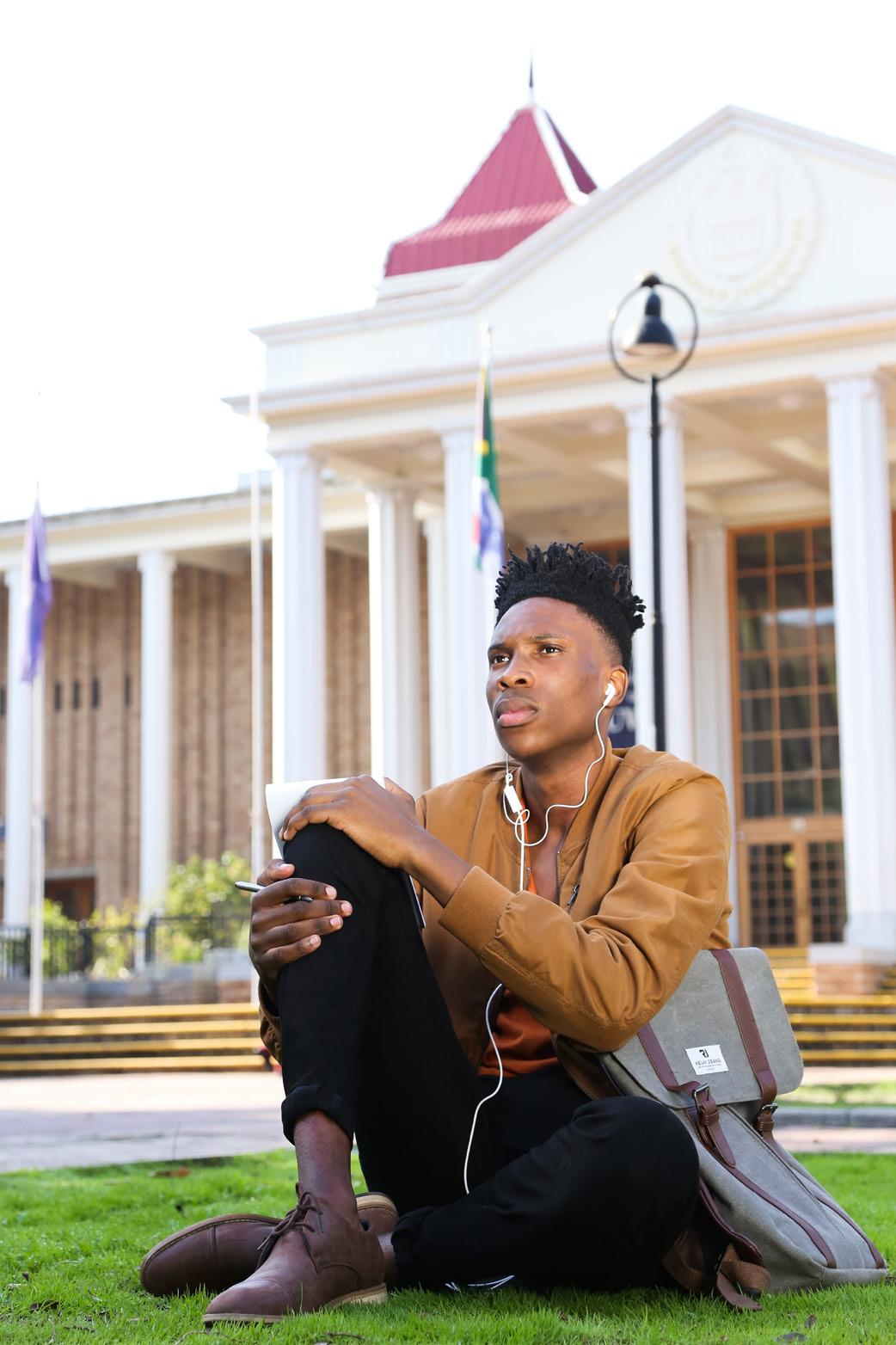
A second keynote lecture, ‘Photographs of environmental damage wrought by the Russian invasion of Ukraine’, was presented by Prof Denis Skopin, formerly of St Petersburg State University.
NRF SARChI Desmond Tutu Research Chair in Religion and Social Justice
Two significant highlights of the chair have been its annual ‘Economies of violence’ event and a series of Palestine solidarity events. Since 2019, the chair has been expanding transdisciplinary research that intersects activism and academia through the commemoration of the anti-apartheid women’s march of August 1956 and the Marikana massacre of August 2012. The annual event is structured through the theoretical lens of “economies of violence”. On 31 August, as part of the annual commemoration, the chair, in partnership with The Desmond and Leah Tutu Legacy Foundation, hosted a multimedia art exhibition curated by MA student Carl Collison. The exhibition, called ‘Islanded (no more)’, which comprised photography, text and short documentary films, covered the lived experiences of LGBTIQ+ people across Africa. It focused on the intersections between queerness and religious and traditional belief systems in various parts of Africa. It was originally on show at the Western Oregon University’s Hamersly Library gallery before being exhibited by the chair.

As part of the ongoing social responsiveness work of the Chair in Religion and Social Justice, a webinar titled ‘Religious software supporting the occupation in Palestine’ was convened on 7 November 2023, with Dr Mitri Raheb, president of Dar-AlKalima University in Palestine and a respected and renowned global scholar on Palestine. The event was opened by Rector Tyrone Pretorius, who made several moving opening remarks, including encouraging those present to “plead for peace, call for freedom, and petition for dignity”. Dr Raheb contended that a key to understanding the current context in Gaza is not only how empire provides the ‘hardware’ in the form of military arms, but how Christian seminaries and faith communities provide the ‘software’ for occupation through dangerous theologies which align with Christian Zionism.
In 2023, the chair hosted the first forensic linguistics conference under the banner of the new African Association of Forensic and Legal Linguistics; and the chair, research fellows and MA and PhD students attended a number of other conferences. Under the auspices of the chair, two books were published: Language and Crime in Contemporary African Courts and Beyond, edited by Russell Kaschula, Monwabisi Ralarala and Georgina Heydon (African Sun Media); anda creative multilingual work, KnifeEdge (New Africa Books), as part of the Siyagruva series on multilingual writing for young people. A journal article and book chapter were also published in 2023. The chair has also funded and is supervising eight MA and PhD students.
Maxeke-Mary Robinson Research Chair (Housed in the CHR)
Renowned novelist, lecturer and screenwriter Eoin McNamee, director of the Trinity Oscar Wilde Centre for Irish and Creative Writing at Trinity College Dublin, is the inaugural Charlotte Maxeke-Mary Robinson Chair at UWC. The prestigious research chair, named in honour of South African educationalist Charlotte
Maxeke and Ireland’s former president, Robinson, was announced by the Trinity Long Room Hub Arts and Humanities Research Institute and the Centre for Humanities Research at UWC in March 2023. The chair will facilitate a broad and reciprocal collaboration between Ireland and South Africa to address, through the creative arts and humanities, a complex inheritance of colonialism, empire, partition and apartheid. Key themes will include the arts and archives of post-partition societies, technology and the human, society and aesthetic education, poetics and post-partition futures, and new models of reconciliation in the wake of conflict.
The Arts and Humanities research projects
Critical Food Studies Project
On 27 October 2023, the project celebrated its fifth anniversary at an event that combined reflection on achievements, poetry readings, music and, of course, food. A ‘Food’ special issue of the journal Agenda was also launched at the event. The project’s many research and related activities are well represented on its website: https:// criticalfoodstudies.org.za/
Mellon Rethinking South African Literature(s)
A large number of publications emerged from the project in 2023. These include the volume edited by Duncan Brown, Kobus Moolman and Nkosinathi Sithole, titled, Notes from the Body: Health, illness, trauma, published by the University of KwaZuluNatal Press, as well as five book chapters, five journal articles and 16 creative works. The project also hosted three in-person workshops on translation of literary texts, from and into varieties of Kaaps.
Arts and Humanities departments
African Language Studies
In 2023, ALS seems to have made a seamless transition between research and community engagement, especially in the work done by Dr Sebolelo Mokapela and Ms Somikazi Mlonyeni. Mr


Zukile Jama and Thenjiswa Ntwana were especially conferenceactive in 2023, while Mr Bonkwe Xakatha published a Xhosa poetry collection in 2023. Research affiliate, Dr Zakeerah Docrat, published extensively in both scholarly and popular outlets.
Afrikaans en Nederlands
Researchers in this department made their presence felt in 2023, mainly in the popular media, with a large number of articles, reviews and interviews in print, television and online media. Community engagement activities included the public lectures of Prof Steward van Wyk, the service on various boards of Dr Donovan Lawrence and Dr Marni Bonthuys, and the community oral history project of Dr Anastasia de Vries.
Anthropology
The professional and public profile of members of this department is especially noticeable, with the membership of Profs Heike Becker, Kelly Gillespie and William Ellis on editorial boards of prestigious journals. These colleagues, as well as Dr Hameedah Parker, have also been active in respect of conference organisation and paper presentation. Through the initiatives of Prof Gillespie, the department’s community engagement profile is also strong.
Extended Curriculum Provision
Dr Delphi Carstens of this unit publishes prolifically in the area of posthumanism and the scholarship of learning and teaching (SoTL). In 2023, Dr Carstens published three accredited journal articles and one book chapter.
English
The Department of English proved its versatility once again in 2023, producing a range of publication types in the research niches of it members – the aesthetics of transitional justice (Prof Carrol Clarkson), intermediality (Prof Hermann Wittenberg), narrative nonfiction (Prof Julia Martin), creative writing (Profs Kobus Moolman and Meg van der Merwe), disability studies (Prof Kobus Moolman), postcolonial genre fiction (Dr Kamil Naicker), and eros in African and world literature and culture (Prof Fiona Moolla). A staff member who has recently joined the department, Katlego Chale, explores theatre in all its forms through his research, his award-winning performances and extensive community engagement.
English for Educational Development
This small unit punched above its weight in 2023 in respect of publications in the area of the scholarship of teaching and learning. Prof Sharita Bharuthram, Dr Martina van Heerden and Mahmoud Patel published individually, together, or with colleagues from the Centre for Innovative Educational Technologies (CIECT), the Faculty of Law, and across departments in our faculty and other universities. Patel also has a significant popular media profile, commenting via a large
number of outlets on a range of social justice issues; and he is regularly invited to international forums as a keynote speaker.
Foreign Languages (French, German, Arabic, Classical Studies)
The Arabic section (Prof Tawffeek Mohammed and Dr Mustapha Saidi) of the Department of Foreign Languages was research active in respect of scholarly publications in 2023, while Kira Schmidt of the German section was active in a research network workshop. The Arabic section is also involved in many community engagement initiatives.
The department produced a record number of publications in 2023, including the monograph Transforming Food Systems in Secondary Cities in Africa, by Extraordinary Professor Jonathan Crush, published by Palgrave Macmillan; the Urban Forum special issue on the theme of ‘The past in present African urban mobility systems’, guest-edited by Prof Bradley Rink; 26 accredited journal articles, a large number by Dr Mbulisi Sibanda; and three book chapters and 11 popular media articles where the work of Dr Erin Torkelson and Dr Tinashe Kanosvamhira looms large. As a member of the Western Cape Provincial Geographical Names Committee, Dr Mandy Carolissen made the community engagement footprint of the department felt.
The research of colleagues in this department, including Profs Ciraj Rassool, Leslie Witz (retired at the end of 2023), Paolo Israel, Rory Bester, Dr Koni Benson, Dr Riedwaan Moosage, Dr Phindi Mnyaka, Dr Aidan Erasmus, Dr Bianca van Laun, Bongani Kona and Robyn Humphreys, is quite formidable. In 2023, these colleagues contributed across a range of forms of academic and creative modes involving the full range of types of scholarly publication; community engagement and public appearances; and service on editorial boards and reviewing. Their work often seems to elide the disciplinary border of historical study, crossing into more creative modes, especially visible in the pieces produced by, and engagements of, Bongani Kona.
The research standing of this department is clearly reflected in colleagues’ publications, the number of MA and PhD examinations done in 2023, as well as from their service on editorial boards and journal article reviewing. Prof Sandy Zinn, Dr Lizette King, Dr Oghenere Salubi and Dr Nikiwe Momoti are also clearly able to make their research publicly accessible, as indexed by their public appearances.
The Department of Linguistics has produced 19 publications

in the 2023 period, with Prof Bassey Antia producing several articles and book chapters in the area of decolonialism, racism and Southern epistemologies. His publications are produced in cutting-edge journals and he collaborates with new and established academics in the field, thus ensuring that gaps in 68 research are addressed through the diversity of collaborators which, in itself, enriches the field. Prof Felix Banda has published in the area of formal linguistics, focusing on languages such as Khoekhoegowa, Lungu, Mambwe and Namwanga. His work is published in cutting-edge journals and provides innovative entry points into formal linguistics of an international level. Dr Lynn Mafofo has published in the area of foodscapes and provides novel transnational perspectives on food studies in the region. This research is also quite exciting in the area of linguistic landscapes. Prof Amiena Peck has published in the field of virtual linguistic landscapes, identity and media, focusing on colloquial expressions of identity through an innovative hashtag analysis of #dalawhatyoumust. Prof Mantoa Motinyane provides a critical discourse analysis of pre-election poetry in South Africa and the utility of folkore in the 21st century. Prof Quentin Williams has published a volume on multilingualism and hip hop with Routledge. Added to this, he has also contributed to the field of hip hop and activism, Afrikaaps and decoloniality. Dr Steve Ndinga-Koumba- Binza has co-edited an impressive dictionary, Dictionnaire des Expressions Idiomatiques Lumbu.
Collectively, it is clear that the Linguistics Department has many different research foci, but members remain consistent in publishing in accredited, reputable and international publishing houses and journals. Collaborations ensure that papers are interdisciplinary, state-of-the-art and emblematic of the dedication to enhancing and contributing to their respective fields.
Prof Tony Oyowe held up the publication end of the department in 2023, publishing two accredited journal articles and a book chapter. Prof Simon Beck was invited to present a keynote address at an international conference, while Dr Jessica Lerm and Dr Kyle Seakgwa participated in a number of seminars, workshops and conferences.
Staff members, research associates and postgraduate students in the Department of Religion and Theology were again prolific in 2023. Collectively, the department published three monographs, two edited volumes (with a few more in the making), one special edition of a journal, 12 essays in peer-reviewed edited volumes (with others in the making) and 19 articles in peer-reviewed journals. Only one doctoral student in the department graduated in 2023 but many doctoral and Master’s students are engaged in projects nearing completion. As indicated in the report, various sources of research funding were secured, for example, from the National Research Foundation, an International Research
Training Group with Humboldt University and UKZN, the Nagel Institute, the South African-German Research Hub on Religion and Sustainability, and Erasmus+. The colleagues responsible for this impressive research output are Profs Ignatius Swart, Ernst Conradie, Johnathan Jodamus, Dr Teddy Sakupapa and Dr Demaine Solomons, as well as the many research affiliates and extraordinary professors attached to this department.
Along with publication and student supervision and graduation, the members of this department have distinguished themselves through leadership of professional societies:
Dr Chinwe Obuaku-Igwe was elected as president of the South African Sociological Association for a second term (July 2022 to July 2023) and was elected to the board of the Clinical Sociology Research Committee (RC46) of the International Sociological Association in July 2023. Prof Marlize Rabe was elected for a second term (2023-2028) to the board of the Family Research Committee (RC06) of the International Sociological Association. Trevor Makhetha organised a conference titled, Reimagining Sociology of Education in South Africa and Africa (3-5 April 2023), co-hosted by the International Sociological Association and the research committee on Sociology of Education (ISA, RC04), in collaboration with the Sociology of Schooling Working Group of the South African Sociological Association and the Department of Sociology at UWC. Prof Emmanuel Mayeza stands out for the number of accredited publications produced in 2023.
WGS (Profs Sisa Ngabaza, Lindsay Clowes, Desiree Lewis and Tammy Shefer, and Dr Carmine Rustin) consistently produces research of the highest calibre that takes the form of accredited publications, publications in other media, community engagement and professional service. Notable is the publication of two edited volumes in 2023: Feeling lives: An intersectional exploration of past experiences and present living , African Sun Media, edited by Lindsay Clowes, Sisa Ngabaza and others; and Sexuality education for gender justice in South African contexts: Pitfalls and possibilities , CSA&G Pretoria University, edited by Tammy Shefer and Sisa Ngabaza.
As can be seen through this reflective report, the faculty underscores the importance of the academic project and its shared priorities and strategic goals in relation to consolidating a research culture, its driving commitment to delivering relevant academic programmes, teaching and learning activities, promoting postgraduate study, implementing effective administrative systems, and continuing its commitment to equity, transformation and staff development. All of these priorities get funnelled down and operationalised through the teaching and learning and the research and postgraduate studies portfolios, the fine details of which are reflected below.

A&H SOTL Research projects: The Faculty hosted several externally funded SOTL projects, including:
Prof. Lindsay Clowes co-edited a book with LJ Theo, Nadia Sanger, Landa Mabenge & Sisa Ngabaza (eds) titled: Feeling lives: An intersectional exploration of past experiences and present living. What is significant about this book is that most of it is undergraduate student writing. In the first section, the students write about living and learning under lockdown; in the second section, about history and the social production of gender; in the third, about contemporary gender, race, and culture; in the fourth, on gender depression, anxiety; and in the fifth, about gender and un/belonging.
Mahmoud Patel presented the following topic: ‘Failure of a Novus Actus and an Actus Dei: Artificial Intelligence and Repercussions in Higher Education’ at the UWC CIECT Colloquium: Artificial Intelligence (Chat GPT) threat or opportunity? July 2023. https://revue.univ-oran2.dz/revuealtralang/index.php/altralang/ article/view/286
Mahmoud Patel and Norina Braaf jointly presented the following topic: ‘Online Assessments for Reflection within a Large Class: A Case Study of EED Law students’ at the Annual CIECT Colloquium on Blended Learning, Teaching and Assessment Approaches and the Use of Artificial Intelligence on 31 August 2023 (hosted during DVC’s Academic Week).
Mr Patel is also a member of the UWC’s Artificial Intelligence (AI) Task Team (UWC), tasked with developing Guidelines and Principles Fostering innovation and excellence across UWC’s academic, research, professional, and administrative domains.
Prof. Bradley Rink completed an institutional project (HSSREC Ref HS23/1/8) titled, For Slow teaching: Courageous and Compassionate Pedagogy in Times of Change. The project sought to explore the application of Slow teaching practices within a first year module, GES111 Introduction to Human Geography. The project remains active and the development of GES111 learning & teaching practices continues.
Prof. Hermann Wittenberg (Department of English) has been working on questions of pedagogy and technology. He presented a paper on plagiarism for a departmental staff seminar. The research has now been published as an article in an accredited journal (see below).
Bharuthram, S. & Van Heerden, M. 2023. The affective effect: Exploring undergraduate students’ emotions in giving and receiving peer feedback. Innovations in Education and Teaching International, 60(3):379-389
Carstens, D. & Gray, C. 2023. Doing academia differently: Taking care of humans, technologies and environments in the digital age. Scholarship of Teaching and Learning (SoTL) in the South, 7(1). https://doi.org/10.36615/sotls.v7i1.294
Carstens, D. 2023. An octo-aesthetic figuration for pedagogies in uncertain Times. CriStal, 11(2). https://doi.org/10.14426/cristal. v11iSI 2.712
Clarence, S. & Van Heerden, M. 2023. Doctor who? Developing a translation device for exploring successful doctoral being and becoming. Critical Studies in Teaching and Learning, 11(1):96-119.
Clowes, L. 2023. History, culture & the social production of gender. In L. Clowes, L.J. Theo, N. Sanger, L. Mabenge & S. Ngabaza (eds). Feeling lives: An intersectional exploration of past experiences and present living.
Clowes, L., L.J. Theo, N. Sanger, L.L. Mabenge & S. Ngabaza (eds). 2023. Feeling lives: An intersectional exploration of past experiences and present living.
Clowes, L., L.J. Theo, N. Sanger, L.L. Mabenge & S. Ngabaza. 2023. Introduction. In L. Clowes, L.J. Theo, N. Sanger, L. Mabenge & S. Ngabaza (eds). Feeling lives: An intersectional exploration of past experiences and present living.
Patel, M., Braaf, N., Chinnian, K. & Mohammed, T. 2023. Online assessments for reflection within a large class: A case study of English for educational development law students at the University of the Western Cape. ALTRALANG Journal, 5(1):336-354. https:// doi.org/10.52919/altralang.v5i01.286
Rink, B. 2023. Emplacing students through everyday mobilities: From practice to theory. Transfers, 13(1/2): 55–67. https://doi. org/10.3167/TRANS.2023.13010205
Romano, N., Bozalek, V. & Shefer, T. (eds). 2023. Special Edition: Thinking with ocean/s for reconceptualising scholarship in higher education. Critical studies in Teaching and Learning, 11(2).
Shefer, T. 2023. Thinking with creativity, affect and embodiment in sexual justice scholarship. In D. Bhana, M. Crewe & P. Aggleton (eds). Sex, sexuality and sexual health in Southern Africa: Contemporary perspectives. New York and London: Routledge. 159-172.
Shefer, T., Zembylas, M. & Bozalek, V. 2023. Re-viewing peer reviewing: Towards an affirmative scholarship. SOTL in the South, 7(1):47-167.
Ntobela, T., Mabandla, A., Majiet, A., Marais, R.B., Brinkhuis, A., & Clowes, L. 2023. Lockdown, living & learning. In L. Clowes, L.J. Theo, N. Sanger, L. Mabenge & S. Ngabaza (eds). Feeling lives: An intersectional exploration of past experiences and present living.
Van Heerden, M. & Bharuthram, S. 2023. ‘It does not feel like I am a university student’: Considering the impact of online learning on students’ sense of belonging in a ‘post pandemic’ academic literacy module. Perspectives in Education, 41(3):95-106.
Van Heerden, M. & Bharuthram, S. 2023. ‘Sometimes I wonder if our best really is our best’: Tutor reflections on shifting to online tutoring during the COVID-19 pandemic. Perspectives in Education, 41(4):329-341.
Wittenberg, H. 2024. ‘Turn-it-off’: Reflections on technology, the knowledge commons and the academic plagiarism industry. Scrutiny 2, DOI: 18125441.2024.2320892

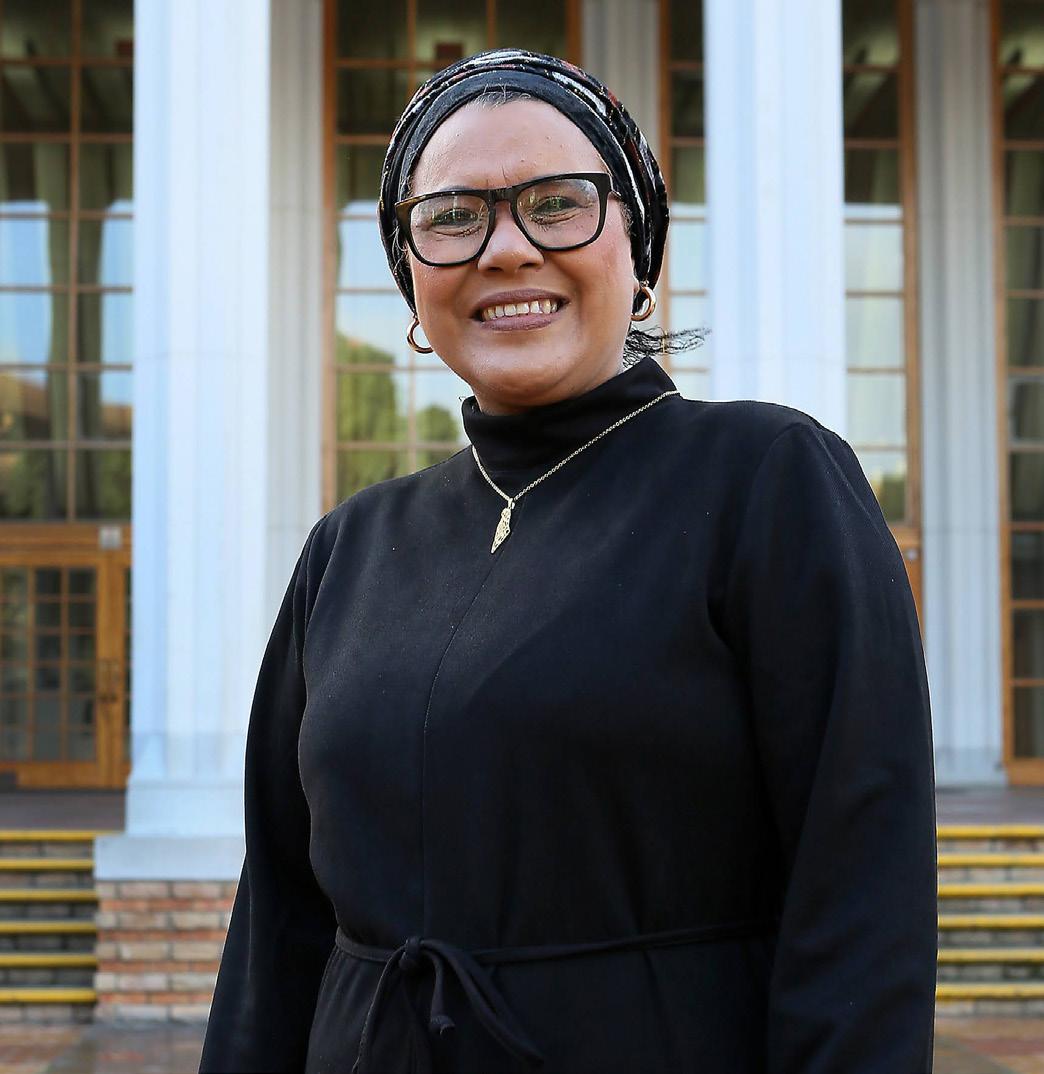
The Community and Health Sciences (CHS) collective (staff and students) have worked hard at completing all academic and clinical requirements as set out in the four-year professional qualification, which brought the Covid-19 intake of students to graduation in the December 2023 ceremony.
CHS celebrated the recognition of their work at being voted the best faculty at the Registrar’s Award Ceremony on 5 May 2023, and the faculty leadership expressed their gratitude to all staff who contributed to this achievement, adding that it was not due to the work of one individual but a collective effort. Notwithstanding the demands and challenges of the health sector during the pandemic years, staff stood strong and persevered, and the achievement and recognition is well received. In addition, the faculty embarked on a bimonthly student blog to further aid mental wellbeing.
Prof Nicolette Roman received the HERS-SA National Award for Women in Humanities and Social Science, and various other staff were recognised for their achievements at the DVC: R & I Research Excellence Awards event.
CHS staff are increasingly contributing to society as a whole by means of publications, via hosting of webinars, other forms of media interaction, their appointments to key national and international decision-making boards as well as presentations at conferences.
It is encouraging to see how students are taking up the challenge of presenting at conferences; one being the only student to present and another being given the opportunity to chair two sessions at a recent international conference.
With the DHET-funded mobile clinic launched on 18 July 2023, the report further details the increase of community activities across departments within the faculty. Being our main source of data collection, CHS hopes to successfully deposit research translation back to the communities where the data originated, creating an ongoing ‘whirlpool’ of knowledge transfer. CHS strategically partners with all stakeholders in the health sector to bring primary health care to communities where it is needed most.
Leading the faculty’s thinking of professionalisation of administrative staff, the mentorship and coaching programme includes academic and administrative staff as well as a publication in the South African Journal of Higher Education: ‘Information technology as a catalyst for the professionalisation of academic administrators: A case study of a health sciences faculty.’
With the addition of two more chairs, the faculty now has seven chairs in total, spanning a wide range of focus areas.
Professor Anthea Rhoda, Dean of faculty, announced that she was taking up the position of DVC: Learning and Teaching at the University of Free State and the entire faculty acknowledged her for her contribution and leadership to the faculty and wished her well.
The CHS faculty continuously strives to foster a conducive environment for excellence in learning and teaching by enhancing the student experience in a holistic manner and ensuring student success and retention.
Faculty engagement in enhancing holistic student experience further testifies to the upholding of UWC values of engagement

and responsiveness, integrity and accountability, collegiality and collaboration, and inclusivity and diversity.
In creating a solution-driven approach, the faculty is becoming more aware of the volatility and economic uncertainty in our country that are affecting student holistic wellbeing. This goal is also cross-referenced with the IOP 2021–2025 goal areas one and two: the student experience, and learning and teaching in terms of student success and retention.
Enhanced student academic experience is aided by our electronic clinical tracking system, and a First-Year Experience (FYE) strategy exists in the faculty, in collaboration with UWC academic support departments, to improve orientation and engagement of students. The faculty employs a student counsellor who assists students, either individually or in groups, especially those working at clinical sites.
Implementation of strategic projects follow a prescribed process of:
• Strategic planning IOP/SDG alignment
• Implementation
• Monitoring Reflection
• Integrating changes
Prof Jo Celene de Jongh, g retired at the end of December 2023 and the faculty acknowledge her for her contribution and work in the portfolio of Deputy Dean: Teaching & Learning
Aligning SDG goals with societal impact, CHS prioritised all spheres of research that relates to knowledge translation, transformative engagement and social innovation (SDG 3, 4, 10, 11 and 17).
Here the SoPH (Integrated Knowledge Translation IKT project) collaborated with the South African Medical research Council and the University of Stellenbosch and to complete two scoping reviews with five focus areas.
Social work, social services and community engagement drive a human rights perspective in development. To this end, four partner universities embarked on developing a Master’s curriculum focusing on SDG 10 with the topic ‘SDG 10: reduce inequality within and among countries’. The partner universities are the University of Frankfurt of Applied Sciences in Germany, UWC Universiti Kebangsaan in Malaysia and Tata Institute in India. The project draws on the expertise of the partners in areas such as social, economic and political inclusion of all, elimination
of discriminatory laws, policies and practices, migration and mobility of people, as well as assistance in development
This project strengthens the research-policy-practice nexus, addressing discriminatory practices, fostering a rights-based approach, promoting inclusive research and ownership, and engaging young women and men as emerging researchers as well as global citizens and agents for change.
The faculty embarked on a social innovation programme in collaboration with the office of the DVC: R & I. Staff formed five groups which each presented an innovative project. A project spearheaded by the Department of Social Work looked at transforming the traditional way of viewing social interventions to social innovation. It was very relevant in the impoverished areas around Cape Town, and the team explored how they could establish a working relationship for a greener environment through small green business initiatives. The team had to embrace different concepts and language to orient themselves to business offerings and home in on what the social return on investment would be for funders and participants, then articulate these clearly to get buy-in on their project. Partnering with the City of Cape Town for the youth training intervention, the green slant to the project was further advanced by including findings on ‘green social work’ in the ECP module ‘Contextualising the field of Social Work’. Aiming to enhance the postgraduate student experience, the faculty interrogated suggested interventions (drawn from a survey) conducted with postgraduate students as well as supervisors.
With the addition of two more chairs in the faculty, the focus areas are;-
1. UWC – digital health
2. UWC – high performance sport and development
3. UNESCO – sport development and peace and Olympic education.
4. SARChi - human capabilities, social cohesion and the family
5. SARChi - research chair in waste and society
6. SARChi - health systems, complexity and social change
7. SARChi - health systems governance
The DHET funded the purchase and refurbishment of a mobile health clinic, and although the official launch was on 18 July 2023, the services offered via this platform started in February 2023 at the newly established relationship in the Dwarsriver Valley.
With more visibility, community services, service learnings of students and research alignment have been multi beneficial to all role players.
Our collaboration with other health care service facilities has strengthened the health care model across all sectors. This will be particularly advantageous in the climate of a constrained fiscus.

CHS ran a pilot on an interprofessional student-led wellness centre at the CHS hub in Mitchells Plain in 2023 and this will be replicated at our other two hubs in 2024.
A memorandum of understanding between UWC and the Dwars River Valley Trust was signed in 2023 with the objective of partnering for sustainable community development, livelihoods, interdependence and social cohesion.
Dietetics
Dietetics academic staff including the clinical supervisors have provided guidance, counselling and support to numerous students who have experienced academic, social and metal wellness challenges in the face of transitions including, inter alia.
• Transition from secondary school to university Transition from online/blended platforms to face to face L&T
• Transition from theoretical learning to practical application in the internship program
Administrative staff have provided guidance, support and referral to students experiencing food insecurity and issues with accommodation.
Several staff members attended the CSSS Workshop, facilitated by Ms Gerber on 14 April 2023 (Psychological First Aid). This, along with a Departmental Journal Club facilitated by psychologist Jenean van Muylwijk titled ‘Ethical boundaries in counselling’ afforded faculty and clinical supervisors the opportunity to discuss and brainstorm the manner in which we navigate the roles of teacher/supervisor and counsellor to our students.
UWC’s revised graduate attributes are included in all departmental
module guides. The attributes are embedded into the teaching, learning and assessment content and approaches. One example of this is the incorporation of a campus-based food gardening project as an assignment in the third-year Community Nutrition modules, DIE312 and NUT311. This is linked to the content area of ‘Food environments and systems’, which is aligned with Sustainable Development Goal 2 (End hunger, achieve food security and improved nutrition and promote sustainable agriculture).
Across modules, learning activities are designed to provide opportunities for students to practise translating nutrition science into practicable actions through community engagement:
In the DIE322 and NUT322 modules, students hosted nutrition and health awareness projects for the campus community (focused on raising awareness of the disadvantages of excessive consumption of sugar-sweetened beverages). In the community of Klipheuwel, students presented health and nutrition promotion programmes targeted at young children in vulnerable situations.
In the Applied Community Nutrition module, interns worked with early childhood development centres (identified through the faculty’s IPEU team) to implement programmes aimed at improving the food environment and nutrition status of children.
Through application of the HSSREC research for training guidelines, the department was able to fast-track the ethics and permission-seeking process for our fourth-year Dietetics Research module.
Students worked in groups to complete nine research projects conducted with UWC students on Main Campus.
These projects were presented through a conference style poster exhibition which was assessed and highly commended by a panel of external and internal examiners.

The Dietetics Department was afforded four UPS units by CHS Faculty, which were used in the lecture venues to ensure continuation of the academic programme during load shedding.
The Department of Social Work has, as part of their continuous transformation of the curriculum engagement, completed the first phase of an exploration of a discipline specific supported education framework to acknowledge and respond to academic and psychosocial challenges faced by students. This phase focused on developing a profile of registered student social workers, and the development of a framework to develop supported education practices with learning and teaching activities.
Decoloniality in pedagogic practices has received attention through a research project among fourth year students in the department who explored the concepts of culture, cultural identity and decoloniality from their own experiences and perspectives. The dissemination of the findings will form part of a book focusing on decolonised social work.
The Bachelor of Community Development programme has developed a stakeholder forum that forms part of its workplace integrated learning modules. Staff engaged in training in digital tools to assess student learning and teaching experiences, facilitated by Redau Saffodien.
The SoN collaborated with the Department of Oral Hygiene and Colgate to integrate oral health competencies into the undergraduate nursing curriculum. The first lectures to be integrated were ECP, BN1 and BN4.
In the physiotherapy department we were able to include clinical supervisors within practical classes and provide clinical expertise regarding the physiotherapy assessment and management of patients in the clinical setting. In the Applied Physiotherapy Adult ICU module we successfully used a training mannequin for practical demonstration and practice, and with the addition of the clinical supervisors we were able to implement simulated ICU patient cases using case scenarios, and work through theoretical and practical concepts using ICU bed charts and other medical-related documents typically seen in the ICU. Students found the session useful, relevant and highly informative, especially with the addition of the clinical expertise provided by the clinical supervisors.
The Department of Occupational Therapy continued to be involved in blended learning and teaching-related strategies and assessments in the faculty during 2023. Intensive efforts were made to develop interactive, supportive online learning and teaching environments for students. Colleagues have regularly attended workshops focusing on new developments to improve learning and teaching strategies.
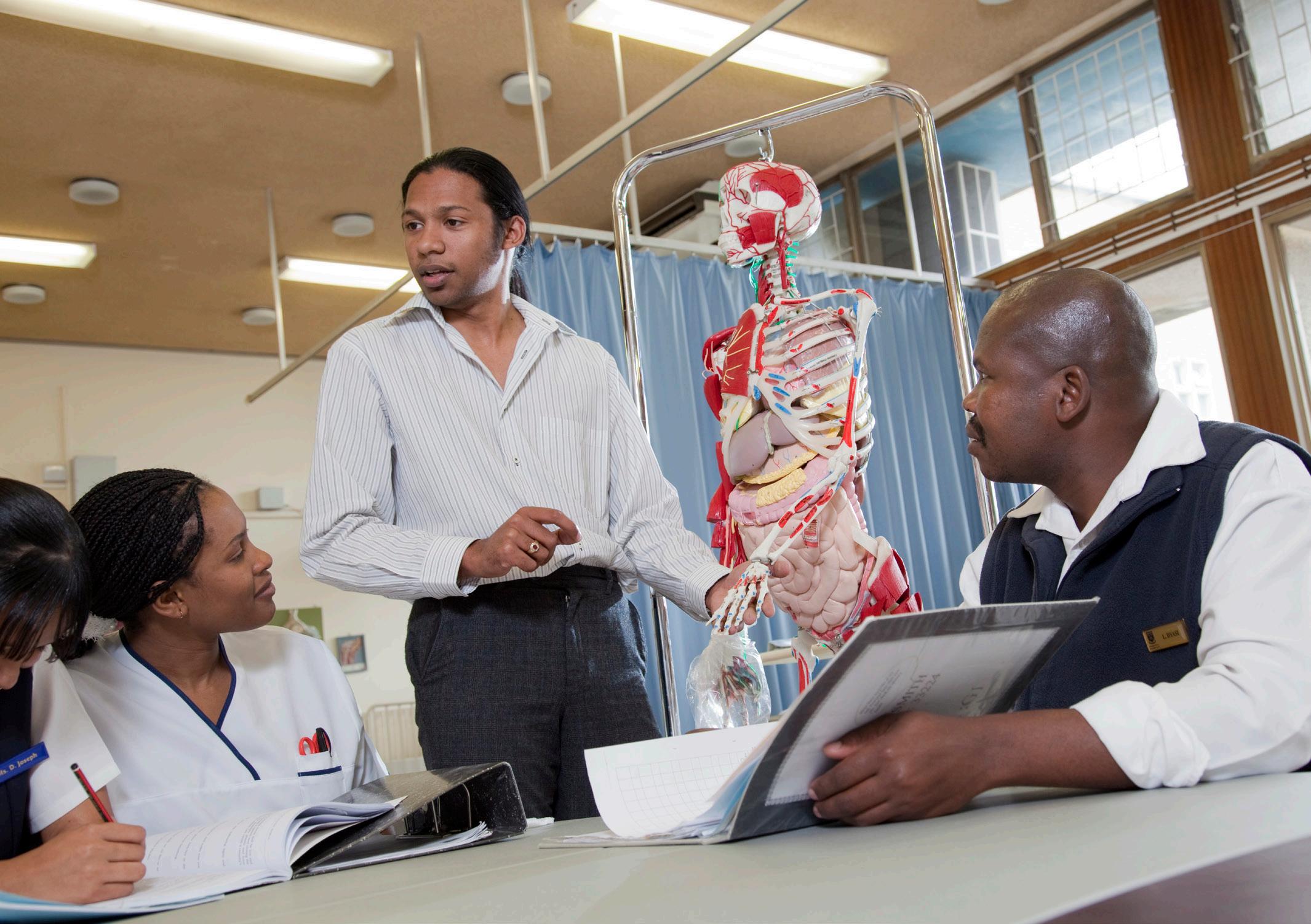

Some of the workshops that colleagues in our department attended include: curriculum transformation webinars, teaching and assessment webinars, CHS online ethics webinars, an effective design of an online environment webinar, CHS community engagement webinars, portfolio development workshops and supportive workshops for postgraduate students. Colleagues also embarked on a strategy to foster digitisation in their curriculum. Staff continue to place all training videos, assessment and treatment literature on online systems, particularly iKamva, and continue to use a blended learning approach in learning and teaching activities.
Interprofessional Education Unit (IPEU)
3D printing was incorporated with students in clinical practice in OT, PT, SW and requests for teaching aids from SoPH, Dietetics and Nutrition, and SoN. On-going discussions are taking place with OT to include 3D printing in their Splinting and Assistive Devices module at the 2nd year level.
Research Projects
Dietetics
1. R Swart & P Bergsten. Seed to end malnutrition in South Africa and Sweden. Funded by SASUF
2. R Swart & E Kunneke. National Dietary Intake Survey. Funded by NDoH
3. R Swart & R Burger (SU). Building healthier communities. Funded by SAMRS, NRF
4. R Swart & S O’Keefe (SU). Diet and the Microbiome in Noncommunicable Diseases. Funded by NRF
5. N Sayed & Rina Swart. Drivers of food choice. Funded by CoE.
6. R Swart & T Frank & A Khan. Investigating the packaged food supply of the South African market. Funded by Bloomberg Philanthropies.
7. R Swart & T Frank, A Khan & L Deyce. Investigating food marketing on television in South Africa. Funded by Bloomberg Philanthropies.
8. R Swart & T Frank, A Khan & S Solomon. Investigating the on-package nutrition information and marketing techniques of the packaged food supply in Eastern and Southern Africa. Funded by UNICEF.
9. R Swart. Prospective urban and rural epidemiology study (PURE) to track changing lifestyle and risk factors for Chronic Diseases. Funded by PHRI, Canada; SAMRC.
All the above research projects are run under the auspices of the CoE for Food Security.
1. M van der Westhuizen (CE project): Developing guidelines to use the social dimensions of making music together in intercultural social work (HS19/10/5)
2. M van der Westhuizen: (SOTL Project) Social work and decolonisation: social work students’ understanding of the concepts of ‘culture’, ‘cultural identity’ and ‘decolonisation’ (HS21/9/8)
3. M Van der Westhuizen, M Safodien, F Brey, R Davids, A Human-Hendricks, U September: (SOTL Project) A needs assessment to identify key aspects to include in a Supported Education Framework (HS19/10/25)
4. G Dykes, S Carelse, M van der Westhuizen, R Davids, A Human-Hendricks (SOTL and CE Project): Towards environmental justice: A community-based strategy to
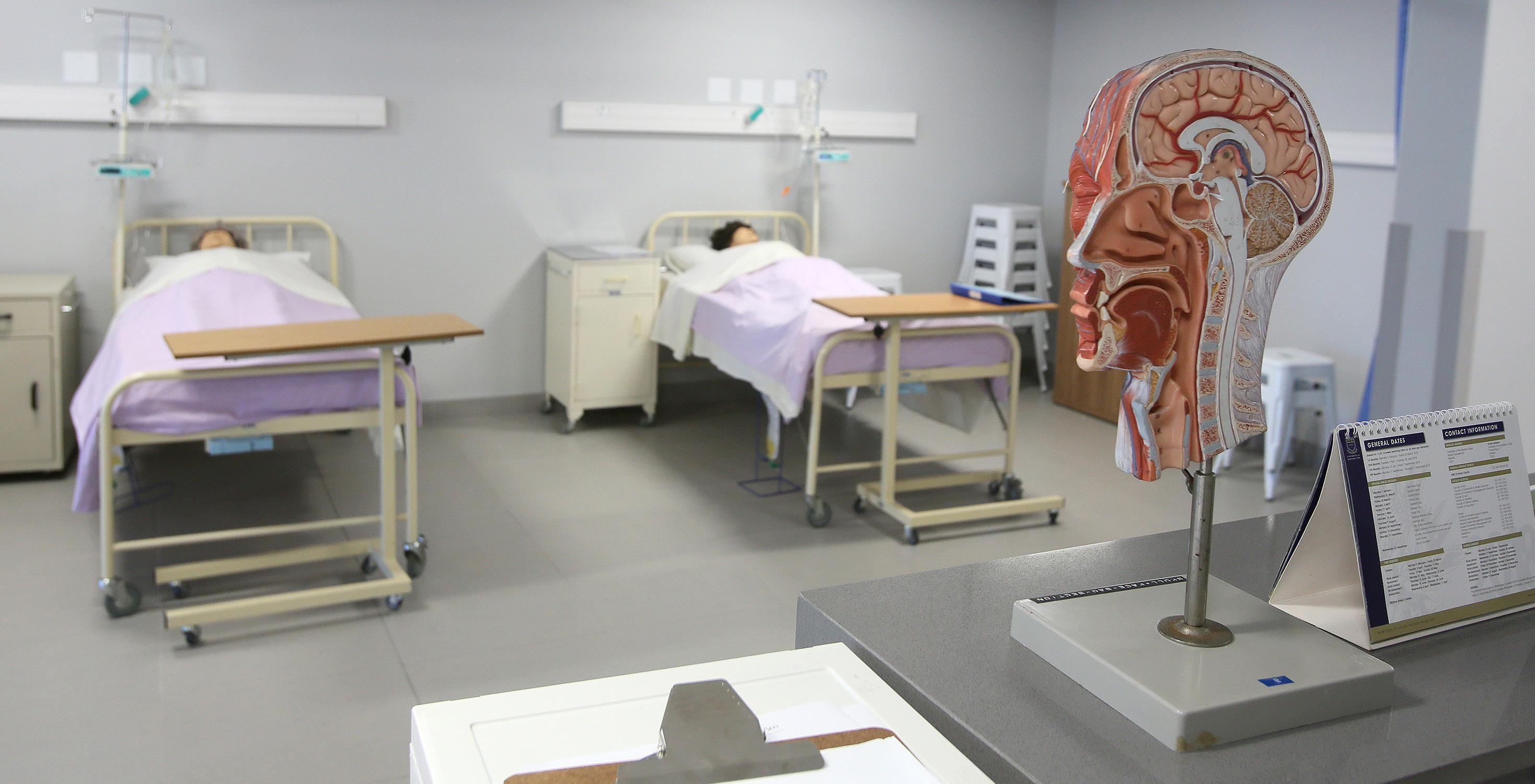

facilitate youth participation in a green economy in a selected community in the Western Cape (HS22/9/30)
5. S Carelse, G Dykes (SOTL Project): Developing appropriate learning and teaching strategies through the exploration of self-positioning of social students in the context of social exclusion, intersectionality and participation in an international context
6. A Human-Hendricks (CE Project): Intergenerational transference of parenting: Developing an intervention to improve parental competency and child well-being HS23/4/32
7. S Gawulayo (SOTL Project): The impact of the wellness programmes and extra-curricular activities on student’s academic success at a university in the Western Cape (BM23/5/11)
1. Anam Nyembezi, Kristian Leisegang, Mankola Lethoko. An exploration of factors contributing to delay in prostate cancer screening and testing among black males in three Municipalities of the Free State Province, South Africa. MPH (SoPH). Ongoing.
2. Anam Nyembezi, Kristian Leisegang, Paidemoyo Gonouya. Factors associated with low uptake of voluntary medical male circumcision as an HIV prevention strategy among males aged 20 – 29 years from Gokwe South District, Zimbabwe. MPH (SoPH). Ongoing.
3. Kristian Leisegang, Gareth Smithdorf, Joshua Albertyn. The relationship between the prevalence of musculoskeletal injuries and playing position among elite footballers in the Western Cape. MA (SRES). Ongoing.
4. Kristian Leisegang, Ralf Henkel, Lutho Menyane. The mechanisms of leptin induced steroidogenesis collapse in TM3 Leydig cells and an investigation into the potential protective role of Sutherlandia frutescens extracts. MSc (MBS). Ongoing.
5. Kristian Leisegang, Ralf Henkel, Faith Moichela. The in vitro effects of endocannabinoids and synthetic cannabinoid receptor antagonists on male reproductive cell function. PhD (MBS). Ongoing.
6. Jianqiao Fang, Xuesheng Ma, Shannah Erasmus. Clinical study on Acupuncture for chronic pain management. Master in Acupuncture. Ongoing.
7. Xuesheng Ma in Collaboration with West South University and Chongqing TCM Hospital. Intelligent Non-Invasive Blood Glucose Monitoring System Based on Video Photo plethysmograph. Ongoing.
8. Xuesheng Ma in Collaboration with Tianjing University of Chinese Medicine and UCT. Neuro-imagine research on Acupuncture treating stroke. Ongoing.
9. Wendy Ericksen-Pereira, Naturopathy Students. A retrospective study of a Naturopathic Clinic: May 2022 to May 2023. Completed November 2023.
10. Wagheda Cassiem, Chinese Medicine and Acupuncture Students. Is Acupuncture treatment beneficial in rotator cuff injuries: A scoping review. Completed November 2023.
11. James Campbell, Phytotherapy Students. An investigation on the effects of Cinnamomum spp. in treating tuberculosis: A scoping review. Completed November 2023.
12. Mujeeb Hoosen, Unani Students. Effectiveness of cupping therapy in the treatment of sciatica in the Unani system of medicine. Completed November 2023.
1. Dr Bimray, A values-based leadership approach to nursing education in a School of Nursing at an institution of higher education in the Cape Town Metropole, South Africa and a College of Nursing at a higher education institution in Mangaluru, India.
2. Prof Chipps, Psychological distress, social support, coping and resilience among university nursing students during COVID-19 pandemic
3. Prof Chipps, CHS faculty vaccine hesitancy and uptake during COVID-19 pandemic
4. Prof Chipps, A survey of nursing students’ perceptions of using learning management systems using a Technology Accepted Model
5. Prof Chipps, Nurse care – A psychological resilience mhealth intervention for frontline health workers
6. Prof Chipps, Perceived stress, anxiety, and resilience amongst nurses during COVID-19 pandemic in public health facilities in the Cape Town Metropolitan area
7. Prof Chipps, Prediction of the Unplanned & Avoidable Trauma & Surgical Readmissions in a selected emergency department in KwaZulu-Natal, South Africa.
8. Prof Chipps, A survey of health literacy of university students at a selected university in the Western Cape
9. Prof Chipps, Smart gloves for CPR
10. Prof Chipps, A longitudinal study of embedded student values in nursing at a disadvantaged institution of higher education in the Cape Town Metropole.
11. Prof Chipps, Survey of research skills needs for academic staff and
postgraduate students in the School of Nursing.
12. Prof Chipps, Health Device Development Short Course Evaluation
13. Prof Chipps, VR open-source research project
14. Prof Chipps, VR open-source research project
15. Prof Chipps, ISEAH simulation project
16. Prof Chipps, digiAfiya
17. Prof Chipps, Development and evaluation of an intervention to enhance resilience among nurses in acute units in a psychiatric hospital, in the Western Cape.
18. Prof Crowley, Supporting HIV-positive adolescents with Self-Management to be Resilient and Thrive (S-SMART) feasibility, acceptability and preliminary effectiveness

19. Prof Crowley, Cardiovascular (CVD) risk amongst community members in three communities in the Western Cape
20. Dr Hoffman, Establishing the vaccination, Vitamin A and deworming status and growth monitoring in early childhood development centres in the southern sub-district, Western Cape
21. Dr Hoffman, An evaluation of the use of a mobile application for nursing clinical supervision (MANCS) at a University in the Western Cape.
22. Prof Daniels, Student nurses’ perceptions of professional identity across contexts: An associative group analysis
23. Prof Daniels, Development of a competency framework for child mental health specialization for Professional Nurses in South Africa.
24. Mr Tokwe, Exploring undergraduate nursing students’ experience of the implementation of the COVID-19 policies at a university in the Western Cape.
25. Dr Willemse, UFS & UWC collaboration: The influence of the COVID-19 pandemic on preceptors’ experience of accompanying nursing students.
26.Dr Willemse, Perceptions on the introduction of a hybrid learning approach in preceptorship education for nurses
1. Prof Roman, Strengthening family capability as a resource for individual and family wellbeing.
2. Prof Roman, Strengthening Capacity for Research and Policy Engagement in Shifting Notions of Motherhood and Fatherhood for Improved Children’s Wellbeing in Africa(SCaRPE – A)
3. Prof Roman, The development of Social Cohesion through the Family: Developing Guidelines
4. Prof Roman, The development of Human Capabilities through the Family: Developing Guidelines
5. Prof Roman, In the eye of the storm: Co-designing and developing an intervention by practitioners and families to enhance the well-being of families post Covid-19 pandemic
6. Prof Roman, The development of Social Cohesion through the Family: Co-designing Interventions
7. Prof Roman, The development of Human Capabilities through the Family: Co-designing Interventions Prof Rich, Measures to Counter TIP in South Africa: Phase 1 component study
8. Prof Erasmus, Influence of nurturing care during early childhood development: A systematic review
9. Dr Yassin-Burns, HIV-related stigma and Family Functioning: A scoping review
10. Prof Schenck, Exploring the informal waste tyre dealers in South Africa
11. Prof Schenck, Exploring the end-of-life (EOL) situation and potential for reuse and repair of Solar Photovoltaic (PV) modules in South Africa
12. Prof Schenck, Exploring the informal e- waste refurbishes and repairers in South Africa
13. Prof Schenck, The feasibility of a Deposit return scheme for South Africa
14. Prof Schenck, Evaluating a pilot collection system for AHP waste in Langa Cape Town
15. Prof Schenck, Beyond the city: Examining solid waste leakages and opportunities in South Africa’s local municipalities waste management
16. Prof Schenck, Making the Invisible Visible: Waste Management Practices among Backyard Dwellers in South Africa.
1. Prof Liezel Ennion registered a research project titled: “Adoption and use of a self-diagnostic and therapeutic device to monitor and treat sensory loss in persons with diabetes mellitus.” (BM23/6/3)
2. Dr Tania Steyl registered a research project titled: “The research journey during COVID-19: Experiences of doctoral candidates from a Physiotherapy Department in the Western Cape.” (HS23/10/23)
3. Dr Farhana Karachi registered two projects: Views and usage of vape and vape-related education amongst Physiotherapy Students in the Western Cape (HS23/6/71)
Coping mechanisms for stress and prevention of burnout in final year health sciences students at a university in the Western Cape (HS23/10/2) - Dr Dominique Leibbrandt is the other Primary Investigator on the Project.
1. Prof MS Soeker, Determining research priorities for the profession of occupational therapy
2. Prof Soeker, OTASA Rapid Review Project related to obtaining evidence to support occupational therapy practice in South Africa
3. Prof Soeker, SASUF – Project that focuses on community mobility and occupational therapy practice in Sweden, Switzerland and South Africa.
4. Prof Soeker, The effectiveness of the Model of Occupational Self Efficacy in improving the quality of life and self-efficacy beliefs in individuals living with TBI: A randomised control study.
5. Prof L Wegner, Youth risk and leisure: A comparative study on perceptions of, and participation in, risk behaviour and leisure engagement among vulnerable youth in rural South Africa. Publications to date: five articles and one chapter.
6. Prof L Wegner, Students’ perspectives on healthy and unhealthy leisure and the influence on health and wellbeing. Publication: a draft article has been prepared and will be submitted to a journal in 2024.
7. Prof L Wegner, Occupational Therapy Students’ Perspectives

of the Influence of COVID-19 on Health, Wellbeing and Learning. Publications to date: two articles published.
8. Prof l Wegner, Healthcare professional students’ perspectives of interprofessional ethics education and practice.
9. Prof l Wegner, Publications to date: one chapter published, two articles accepted for publication in 2024
10. Prof L Wegner, Youth Parenthood: An exploration of adulthood transition among rural South African NEET (Not in Education, Employment, or Training) youth during COVID-19. Collaboration with Prof Thuli Mthembu, Dr Makhaya Malema, Prof Wilson Majee (Missouri University, USA) and Dr Anakwe Adaobi (Drexel University, USA). Data collection completed in 2023, data analysis underway in 2024.
11. Prof J De Jongh, Healthcare professional students’ perspectives of interprofessional ethics education and practice.
12. Prof J De Jongh, UMSAEP Interprofessional Ethics Project.
13. Prof J De Jongh, Health Professions education (UWC and SU)
14. Prof J De Jongh, Student Success and retention (UWC Project)
15. Prof J De Jongh, Mentoring (UWC)
16. Prof L Hess April, Exploring the development and application of a responsive curriculum framework for healthcare professionals in South Africa
17. Prof L Hess April, SASUF Project - Virtual exchange for developing cultural-, global health-, and person-cantered healthcare competencies in selected rehabilitation professions students.
18. Prof L Hess April, Higher Education post COVID-19.
19. Prof T Mthembu, Washington University in St Louis: An African Philosophy of Personhood in Southern Occupational Therapy and project on Spirituality in Health Education
20. Prof T Mthembu, Washington University in St Louis: Occupational roles of clergy on families caring for clients with chronic diseases
21. Prof T Mthembu, UMSAEP project on legacy beliefs collaboration between UWC and UM
22. Prof T Mthembu, Infusing IPE into CHS research education
23. Prof T Mthembu, Infusing Spirituality and Spiritual Care into IPE
24. Prof T Mthembu, VID Specialized University: Existential perspectives in professional practice
25. Prof T Mthembu, Infusing IPR and Knowledge and awareness of occupational therapy by nurses (UWC, Mpumalanga College and Wits Nursing School)
26.Prof T Mthembu, Spirituality, Resilience and Aging
27. Prof T Mthembu, Completed the LEAD Program from DVC Academic
1. Erasmus+ funding was obtained for student and staff mobility, and research on decolonised social work and environmental social work through collaboration with the Karl de Grote University of Applied Sciences (Antwerp, Belgium), the University of Applied Sciences Darmstadt (Germany) and the University of Applied Sciences Bochum (Germany).
2. Dr R Davids: DVC Research and Innovation grant for international collaborations with the Gaulluadet University, USA (R50 000.00)
3. Mr Asandile Mandlana: SACERT (Sustainable Academic Capacity Building for Excellence through Research and Training) Programme scholarship
4. Dr Uwarren September: Interinstitutional NRF Funding for project titled: Social Work Education post-COVID-19 Course Redesign- Rediscovering new ways of learning and teaching in Africa/South Africa
5. Dr Anja Human-Hendricks: African Research Alliance with United Kingdom Research and Innovation Centre, for the Project SCaRPE - Strengthening capacity for research and policy engagement in shifting notions of motherhood and fatherhood for improved children’s wellbeing in Africa.
1. MRC SIR funding: Prof Chipps R170, 000 pa for three years
2. Prof Crowley: TTO office R500, 000
3. SR funding: Prof Crowley R30, 000
4. DVC: Research & Innovation - UCDG funding: Ms. Fürst
5. DVC: R&I Teaching Relief funding: Four SoN staff members received funding
6. Ms. Fürst; Mr. Tokwe; Mr. Hendricks; Ms. Tengeh.
Children and Family and Society
1. SARChI – Tier 1, R14 749 999.70, 2023-2027
2. Erasmus Plus: Staff and student exchange - UWC to Frankfurt exchange:
3. R672 072, 37, 2021-2023
4. DAAD – Germany, Overall project for 4 countries: SA, Germany, India and Malaysia: R4 580 302.11
5. UWC award: R975 879, 70, 2021-2024.
6. Measures to Counter TIP in South Africa: Phase 1 Component study - R500 000.00, 2023-2024
7. UKRI: SCaRPE – Africa - Total Project budget: R6 733 576, 62 - Sub-award for UWC – 2021-2023:
8. R884 591, 37, 2021-2024
9. SARCHi Chair in Waste and Society - R14 749 999.70. (NRF), 2023- 2027
10. Exploring the informal waste tyre dealers in South Africa - R1 050 000.00. (NRF), 2023-2025

11. Exploring the informal e-waste refurbishes and repairers in South Africa - R1 200 000.00. (NRF-COP), 2023-2024
12. Feasibility for a deposit return scheme for South Africa - R2 526 877.26. (Norwegian Embassy and Alliance to end plastic waste), 2023- 2024
13. AHP conference, R100 000.00 (NRF), 2023
14. Evaluating a pilot collection system for AHP waste in Langa Cape Town - R1 000 000.00 estimate. (Kimberly- Clark), 2023-2024
15. Beyond the city: Examining solid waste leakages and opportunities in South Africa’s local municipalities waste management - R1 100 000.00. (NRF/SWISS), 2023-2025
1. Prof Liezel Ennion obtained R500 000 in research funding from the UWC ISF SEED fund.
2. Prof Liezel Ennion obtained R532 000 in research funding from the MRC MeDDIC grant.
3. Dr Tania Steyl received R30 000 from CHSRC to attend and present at an International Conference (WCPT, Dubai) in 2023.
4. Prof Nondwe Mlenzana obtained R100 000 in research funding from the MRC.
5. Dr Farhana Karachi received R50 000 for Post-PhD: International Conference & Staff Networking as part of the DVC: Research and Innovation Developing the Scholar Programme (DTS) 2023
6. Dr Danelle Hess received R40 000 - Research Project Funding as part of the Developing the Scholar programme as part of the University Capacity Development Programme for Early Career Researchers.
7. Dr Danelle Hess was a registered co-applicant for the project, Virtual exchange for developing cultural-, global health-, and person-centered healthcare competencies in selected rehabilitation professions students, within SASUF Virtual Exchange Grants. The grant awarded amounted to 200 000 Swedish Krona which will be divided between the collaborating institutions.
1. Prof Wegner - 2022- 2023: Title of Project: A CommunityBased, Participatory Research Approach to Understand Challenges, Needs, Risks and Engagement amongst Vulnerable Youth in South Africa. Funder UWC SR R30 000
2. Prof Soeker - 2021- 2024: Title of Project: Improving the work skills of individuals who sustained Traumatic Brain Injury (TBI). Funder: South African Medical Research Council. The value of the funding was R250 000.
3. Ms Taryn du Toit - NRF nGAP targeted research grant towards her PhD as follows: 2023-2024: Title of PhD: Developing a framework for the transition into employment within the open labour market for persons with mild and moderate intellectual disability in South Africa. The value of the funding was R60 000.
1. Van der Westhuizen, B., Frank, T., Karim, S.A. and Swart, R.E.C., 2023. Determining food industry compliance to mandatory sodium limits: Successes and challenges from the South African experience. Public Health Nutrition, 26(11), pp.2551-2558.
2. Khan AS, Frank T, Swart R. Child-directed marketing on packaged breakfast cereals in South Africa. Public Health Nutr. 2023 Aug 4:1-23. doi: 10.1017/S1368980023001507. Epub ahead of print. PMID: 37539472.
3. Nkwanyana, A., Florence, M. and Swart, E.C., 2023. Scoping review protocol exploring the relationship between food insecurity, mental health and diet intake among adolescents across the globe. BMJ open, 13(4), p.e069436.
4. Theron, M., Swart, R., Londani, M., Parry, C., Williams, P.P. and Harker, N., 2023. Alcohol consumption patterns, suppliers and online alcohol marketing: Before and during COVID-19 alcohol bans. South African Journal of Science, 119(11-12), pp.1-10.
5. Murphy, A., Palafox, B., Chifamba, J., Kruger, I.M., Ncube, B.J., Ncube, T.L., Rangarajan, S., Swart, E.C., Tsolkile, L., Walli-Attaei, M. and West, N.J., 2023. Comparing estimates of household expenditures between pictorial diaries and surveys in three low-and middle-income countries. PLoS global public health, 3(4), p.e0001739.
6. Madlala, S.S., Hill, J., Kunneke, E. and Faber, M., 2023. Nutrient density and cost of commonly consumed foods: a South African perspective. Journal of Nutritional Science, 12, p.e10.
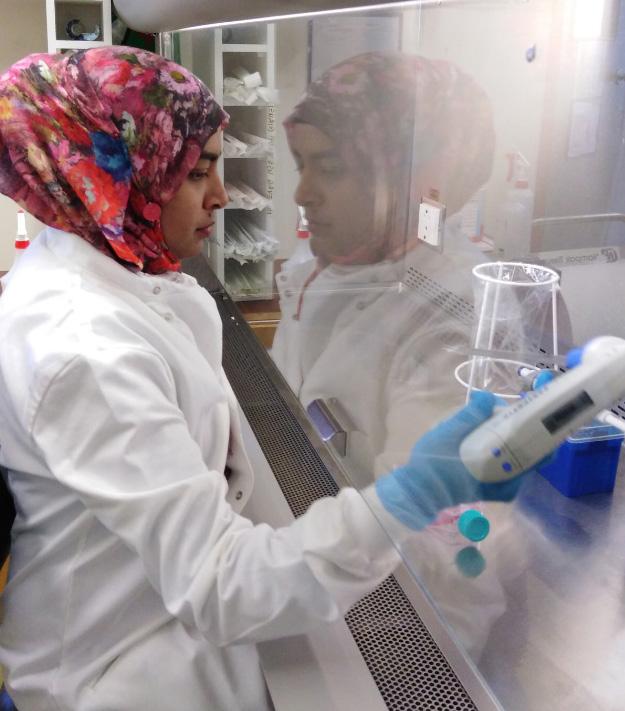

7. Mulabisano, T.A., Laubscher, R., Hoffman, M., Hill, J., Kunneke, E., Smuts, C.M. and Faber, M., 2022. Retail Cost and Energy Adjusted Cost Are Associated with Dietary Diversity and Nutrient Adequacy for Diets of 6–24 Months Children. Nutrients, 14(16), p.3376.
8. O’Keefe S, Ramaboli M, Ocvirk S, Mirzaei MK, Eberhart BL, Valdivia-Garcia M, Metwaly A, Neuhaus K, Barker G, Ru J, Nesengani L, Wilson A, Joni S, Layman D, Zheng J, Mandal JR, Chen Q, Perez M, S FortuinS, B Gaunt B, David Wishart D, Barbara Methe B, Dirk Haller D, Jia Li J, Li Deng L, Rina Swart R, and Dina Mahdi-Joest D. 2024. Diet Changes due to Urbanization in South Africa are Linked to Microbiome and Metabolome Signatures of Westernization and Colorectal Cancer” [Paper #NCOMMS-23-30985B], Nature.
9. Hart, C., Daniels, P. and September-Brown, P. (2023). A model for scholarship of engagement institutionalization and operationalization. South African Journal of Higher Education, 37(1), pp.224-242.
10. Lukelelo, N., Roman, N., & Schenck, C. (2023). A Needs Assessment for Social Work Interventions For Children Affected by HIV and AIDS. Social Work/Maatskaplike Werk, 59 (2). https://doi:org/10.15270/59-2-1048
11. Davids, R., Roman, N., & Schenck, C. (2023). The codevelopment of a framework to support parents of children with a hearing loss: using a consensus workshop. Social Work/Maatskaplike Werk, 59(1), 24-41. https://doi. org/10.15270/59-1-1091
12. Van der Westhuizen, M. A., & Greuel, T. (2023). Accommodating change during the COVID-19 pandemic: An auto ethnographic reflection on transdisciplinary digitalisation and internationalisation, In Cape Higher Education Consortium, COVID-19 Management and Responses. Lessons learnt for the future. SUN Media.
13. Hlatshwayo, L. P., & Van der Westhuizen, M. (2023). Towards flexible learning and teaching: Lessons learned from educator and student experiences during the COVID-19 pandemic. Perspectives in Education, 41(2), 151-165. https:// doi.org/10.38140/pie.v41i2.6224.
14. Van der Westhuizen, M. (2023). The Importance of social workers in communities: A global perspective. Journal of Community Psychosocial Research Editorial, 1, 1-7.
15. September-Brown, P., Daniels, P. & Hart, C. (2023). Decentralized Systemising of Scholarship of Engagement (SoE) in Higher Education (HE) toward Societal Impact. South African Journal of Higher Education, 37(4):266-285.
16. Hart, C. Legislation and policy frameworks associated with community development in South Africa. In Community development: Breaking the cycle of poverty. 7th ed. F. De Beer & M. De Beer. Eds. Juta and Company ltd. 473-495.
17. Hart, C. Professional community development practice. In Community development: Breaking the cycle of poverty. 7th ed. F. De Beer & M. De Beer. Eds. Juta and Company ltd. 529-546.
18. Azia, Ivo Nchendia, Anam Nyembezi, Shernaaz Carelse, and Ferdinand C. Mukumbang. “Understanding the role of religious beliefs in adherence to antiretroviral therapy among Pentecostal Christians living with HIV in sub-Saharan Africa: a scoping review.” BMC Public Health 23, no. 1 (2023): 1768. DOIhttps://doi.org/10.1186/s12889-023-16616-5
19. School of Natural Medicine
20. Hoosen M, Roman NV, Mthembu TG, Naseer M. Unani Tibb practitioners’ perceptions and attitudes towards spirituality and spiritual care in Unani Tibb practice in South Africa. BMC Complement Med Ther 2023; 23(1):189.
21. Leisegang K, Finelli R, Henkel R, Zenoaga-Barbăroșie C. The effect of aqueous Lessertia frutescens extract on TM3 Leydig cells exposed to TNF- in vitro. Frontiers in BioScience Landmark 2023; 28(9):213.
22. Leisegang K, Opuwari CS, Moichela F, Finelli R. Traditional, Complementary and Alternative Medicines in the Treatment of Ejaculatory Disorders: A Systematic Review. Medicina 2023; 59(9):1607.
23. Leisegang K, Finelli R, Moungala L, Moichela F, Pearce K, Ramasamy R, Henkel R. The impact of COVID-19 vaccines on male semen parameters: A retrospective cohort study. Andrologia 2023. Article ID: 7826568.
24. Hansen A, Engel-Hills P, Jacobs C, Blitz J, Cooke R, Hess L, Leisegang K, Naidoo N, Volschenk M, van Schalkwyk S. Understandings and practices: Towards socially responsive curricula for the health professions. Advances in Health Sciences Education 2023; 28:1131-1149.
25. Majzoub A, Elbardisi H, Madani S, Leisegang K, Mahdi M, Agarwal A, Henkel R, Khalafalla K, ElSaid S, Arafa M. Impact of body composition analysis on male sexual function: A metabolic age study. Frontiers in Endocrinology 2023; 13:1050441.
26.Agarwal A, Cannarella R, Saleh R, Boitrelle F, Gül M, Toprak T, Salvio G, Arafa M, Russo GI, Harraz AM, Singh R, Garrido N, Hamoda TAA, Rambhatla A, Kavoussi P, Kuroda S, Çalik G, Saini P, Ceyhan E, Dimitriadis F, Henkel R, Crafa A, Palani A, Duran MB, Maziotis E, Saïs É, Bendayan M, Darbandi M, Le TV, Gunes S, Tsioulou P, Sengupta P, Hazir B, Çeker G, Darbandi S, Durairajanayagam D, Aghamajidi A, Alkhalidi N, Sogutdelen E, Leisegang K, Alarbid A, Ho CCK, Malhotra V, Finocchi F, Crisóstomo L, Kosgi R, ElBardisi H, Zini A, Birowo P, Colpi G, Park HJ, Serefoglu EC, Nguyen Q, Ko E, de la Rosette J, Pinggera GM, Nguyen HVP, Kandil H, Shah R. Impact of varicocele repair on semen parameters in infertile men: A systematic review and meta-analysis. World Journal of Men’s Health 2023; 41(2):289-310.
1. Dankyi, Sawan Sa; Bimerew, Million Mi; and Chipps, Jennifer-Anne Ja (2023) “Pre-operative anxiety of patients in district hospitals in Ashanti Region, Ghana,” Journal

of Perioperative Nursing: Vol. 36: Iss. 3, 1: https://doi. org/10.26550/2209-1092.1242
2. Rafferty, B., Mthimunye, K., & Bimerew, M. (2023). Theorypractice gap: Nursing students’ self-reported depth of understanding of bioscience and its relevance to clinical practice. Plos one, 18(11), e0294319.
3. Bimray P, Chipps J, Ticha V. (2023) Professional Values of Undergraduate Students at a Nursing School in South Africa. Nursing Research and Practice. 2023 Sep 4;2023:9635033. doi: 10.1155/2023/9635033. PMID: 37701929; PMCID: PMC10495230.
4. Bimray, P., & Jooste, K. (2023). Climbing the Ladder in Crafting a Professionalism Framework for Nursing Students in South Africa. Babali Nursing Research, 4(3), 440-459.
5. Steenkamp, I., Chipps, J. (In Press). COVID-19 fear among junior undergraduate nursing students during the COVID-19 pandemic in South Africa. HSAG
6. Crowley, T., & Daniels, F. (2023). Nursing education reform in South Africa: Implications for postgraduate nursing programmes. International Journal of Africa Nursing Sciences, 18, 100528.
7. Nangolo, R., Robertson, A. & Crowley, T. Factors promoting exclusive breastfeeding in Windhoek Namibia: a descriptive comparative study. IJANS, https://doi.org/10.1016/j. ijans.2023.100544
8. Crowley, T., Petinger, C., Nchendia, A. I., & van Wyk, B. (2023). Effectiveness, acceptability and feasibility of technologyenabled health interventions for adolescents living with HIV in low-and middle-income countries: a systematic review. International Journal of Environmental Research and Public Health, 20(3), 2464.
9. Crowley, T., Petinger, C., Nchendia, A. I., & van Wyk, B. (2023). Effectiveness, acceptability and feasibility of technologyenabled health interventions for adolescents living with HIV in low-and middle-income countries: a systematic reviewProtocol. Plos ONE 18(2) 1932-6203
10. Landu, Z. K., & Crowley, T. (2023). Primary health care nurses’ knowledge, self-efficacy and performance of diabetes self-management support. African Journal of Primary Health Care & Family Medicine, 15(1), 3713.
11. Ojo, E. O., Onwuegbuzie, A. J., Bergsteedt, B. J., Adams, S. P., Crowley, T., & Burger, A. (2023). A meta-methods analysis of academics’ challenges affecting research productivity during COVID-19: Insights from a South African university. Journal of Higher Education Theory and Practice, 23(5), 27-45.
12. Crowley, T., & de Lange-Cloete, F. (2023). Supporting HIV self-management in adolescents to be resilient and thrive: an intervention development study. Vulnerable Children and Youth Studies, 1-15.
13. Kordom, A., Daniels, F., & Chipps, J. (2023). Training needs of professional nurses in primary health care in the Cape Metropole, South Africa. African Journal of Primary Health Care & Family Medicine, 15(1), 3741.
14. Daniels, F. M., & Heradien, Z. (2023). Clinical supervisors’ experiences of factors affecting nursing students’ skills transfer from skills laboratory to practice. International Journal of Africa Nursing Sciences, 19, 100628.
15. Adibone Emebigwine, D. L., Linda, N. S., & Martin, P. (2023). Objective structured clinical examination: Do first-year nursing students perceive it to be stressful? Curationis, 46(1), 2339.
16. Bekelepi, N., & Martin, P. (2023). Self-reported incidents of violence towards nurses working in acute psychiatric units. Curationis, 46(1), 1-8.
17. Bazirete, O., Hughes, K., Lopes, S. C., Turkmani, S., Abdullah, A. S., Ayaz, T., Minnie, C. S., & Homer, C. S. (2023). Midwifeled birthing centres in four countries: a case study. BMC Health Services Research, 23(1), 1105.
18. Jordaan-Schlebusch, C., & Minnie, C. S. (2023). Outcomes of births attended by private midwives in the Gauteng Province of South Africa: A retrospective cohort study. International Journal of Africa Nursing Sciences, 18, 100566
1. Erasmus, C. & Harris, A. 2023. Experiences and challenges of parents with children removed through a statutory process. Southern African Journal of Social Work and Social Development
2. Danhouse, M., & Erasmus, C.J. 2023. Strengthening family connectedness: experiences of families with children with behavioural problems. Southern African Journal of Social Work and Social Development, 35(2):
3. Achmat G, Erasmus C, Kanaley J, et al. 2023. Effect of physical activity on coronary heart disease risk factors among firefighters: a scoping review protocol. BMJ Open; 13: e068353. doi:10.1136/ bmjopen-2022-068353
4. Dadipoor, S., Alavi, A., Kader, Z., Mohseni, S., Kakhaki, H.E.S., Shahabi, N. (2023). Predictive power of PEN-3 cultural model in cervical cancer screening among women: a crosssectional study in South of Iran. BMC Cancer, 23:730 https:// doi.org/10.1186/s12885-023-11240-3
5. Dadipoor, S., Alavi. Kader, Z., Eshaghi, H., Kakhaki,S., Mohseni,S. & Shahabi, N. (2023). Utilization of cervical cancer screening services and its associated factors in Iran: A case-control study. Infectious Agents and Cancer, 18 (17), 2-10, https://doi.org/10.1186/s13027-023-00496-w.
6. Rich, E., Londt, M., Holtman L, (2023). Exploring childhood experiences and family contexts as risk factors for drug use in the lives of young drug users in the Western Cape, South Africa. Vulnerable Children and Youth Studies, DOI: 10.1080/17450128.2023.2179149
7. Rich, E.G., Butler-Kruger, L.; Roman, N. V. (2023). Exploring strategies to support adolescent mental health after parental divorce: A Scoping Review. Youth, 3, 428–436. https://doi. org/10.3390/ youth3010029

8. Benjamin, F., Chinyakata, R., Rich, E.D., Koegler, E., Roman, N.V. (2023). Adults’ Subjective Experiences of Exploitation in South Africa, Dignity: A Journal of Analysis of Exploitation and Violence: Vol. 8: Iss. 2, Article 5. https://doi.org/10.23860/ dignity.2023.08.02.05
9. Koegler, Erica., Vickerman, Shelley A., Bender, Annah K., Rich, Edna, G. (2023). Screening for Trafficking in Persons among High-Risk Transgender and Gender Non-conforming people in Cape Town. Journal of Human Trafficking Journal of Human Trafficking. DOI: 10.1080/23322705.2023.2265805
10. Balogun, T. V., October, K. R., Adebiyi, B., & Roman, N. V. (2023). The influence of the 4th industrial revolution on family cohesion–A systematic review protocol. Plos one, 18(9), e0288954. PLOS ONE | https://doi.org/10.1371/journal. pone.0288954 September 8, 2023
11. De Jongh, J., Titus, S., Roman, N.V. & Frantz, J. (2023). The Role of Research Units at a Higher Education Institution: Intention or Reality? Journal of Research Administration, 55 (3), 114-126.
12. Khaile, F., Van Staden, M., October, K., Human-Hendricks, Anja. Roman, N. (2023). Exploring the Role of Race in Social Cohesion in Two Rural Communities of South Africa. African Journal of Governance & Development, 12(1) 138-161.
13. Lukelelo, N., Roman, N., & Schenck, C. (2023). A Needs Assessment for Social Work Interventions for Children Affected by HIV and AIDS. Social Work/Maatskaplike Werk, 59(2), 88-108. https://doi:org/10.15270/59-2-1048
14. Braaf, E. & Roman, N.V. (2023). Wellness Practitioners’ perspectives on supporting SUD recovery in the workplace: Enabling or impeding factors. Journal of Behavioural Health.
15. Behardien, N., Brijlal, P., & Roman, N.V. (2023). Exodontia skills acquisition: Focusing on clinical teaching and training. PLoS One, 18(6): e0286737. https://doi.org/10.1371/journal. pone.0286737
16. Hoosen, M., Roman, N. V., Mthembu, T. G., & Naseer, M. (2023). Unani Tibb practitioners’ perceptions and attitudes towards spirituality and spiritual care in Unani Tibb practice in South Africa. BMC Complementary Medicine and Therapies, 23(1), 1-12.
17. Magidigidi, L., Roman, N.V. & Sonn, I.K., (2023). Human capabilities of South African parents who have children with developmental disabilities, African Journal of Disability 12(0), a1155. https://doi.org/10.4102/ajod. v12i0.1155
18. Davids, R., Roman, N., & Schenck, C. (2023). The CoDevelopment of a Framework to Support Parents of Children with a Hearing Loss: Using a Consensus Workshop. Social Work/Maatskaplike Werk, 59(1), 24-41.https://doi. org/10.15270/59-1-109
19. Chinyakata, R., Msiza, F.B., Du Plessis, B. & Roman, N.V. (2024). Factors inhibiting control over one’s environment: A human capabilities perspective, Cogent Social Sciences, 10:1, 2292862, DOI: 10.1080/23311886.2023.2292862
20. Alwaseea, N.N., Roman, N.V., Ahmed, F., Alaqeli, E., Ashur, A.B.,
21. El Magrahi, H., Mousa, A., Atia, A., Abuagela, M., Abdulwahed, E., Jerbi, R. The Mental Health Status among Libyan Cases during COVID-19. Derna University Journal of Medical Sciences [Dujms] 2(1): 98-106, 2023
22.Van Staden, M., Khaile, F.T., October, K.R., HumanHendricks, A., & Roman, N.V. Exploring the Role of Race in Social Cohesion in Two Rural Communities of South Africa. African Journal of Governance and Development | Volume 12 Issue 1 • July • 2023 https://doi.org/10.36369/26169045/2023/v12i1a8 Online ISSN: 2616-9045.Print ISSN: 2218-5615
23. Schenck, C. J., Blaauw, D., Theodore, N., & Niyobuhungiro, R. Informal Tyre Dealers in South Africa: an Assessment of Their Contributions to a Circular Economy. Urban Forum https://doi.org/10.1007/s12132-023-09502-1
24. Kumar, S., Schenck, C., Oberlies, D. & Bhaiya., A. A Participatory Research Workshop in Northern India—A Transnational Collaboration
25. Kadhila, T., de Wit, M.P. & Schenck, R. A conceptual framework for sustainable waste management in small municipalities: the cases of Langebaan, South Africa and Swakopmund, Namibia. Environmental Science and Pollution Research https://doi.org/10.1007/s11356-02326904-7
26. Pretorius, A., Blaauw, D., Schenck, R. & Grobler, L. Towards a circular economy: A cross-case analysis of recycling in three South African towns, Development Southern Africa, DOI: 10.1080/0376835X.2022.2162857
27. Schenck, C.J., Chitaka, T.Y., Tyrrell, H., 2 & Couvert, A. Disposable Diaper Usage and Disposal Practices in Samora Machel Township, South Africa. Sustainability 2023, 15, 9478. https://doi.org/10.3390/su15129478 https://www. mdpi.com/journal/sustainability
28. Van Wyk, A. M., Blaauw, P. F. & Schenck, C. Day labouring in Southern Africa after the global economic and financial crisis: The case of Pretoria and Windhoek. Journal of Economic and Financial Sciences ISSN: (Online) 23122803, (Print) 1995-7076
29. Chitaka, T. Y., Schenck, C. Developing country imperatives in the circular bio economy: A review of the South African case. Environmental Development 45 (2023) 100812 https://doi.org/10.1016/j.envdev.2023.100812
30. Lishman, M., Bolger, J., Gibson, N., Spolander, G., & Yuell, C., (eds) (2023) Social Work an Introduction, 3rd edition, London, Sage Publishing. Copy donated to UWC library.
31. Spolander, G., Garcia, M. L. T., Guerra, T. M. Z., Teixeira, R. V., Khalil-Babatunde, M. and Adefila, A. (2022) Academic Activism in Higher Education: A Dialectic of Resistance and Surrender in a Time of Neoliberalism, Philosophy and Theory in Higher Education, 4(2), pp. 51-86. https://www.ingentaconnect.com/content/plg/ ptihe/2022/00000004/00000002/art00006#

1. Kiplagat S.J., Phillips, J., Steyl, T. & Wachira, L-J. (2023). Prevalence of risk factors of non-communicable diseases among secondary school students in Uasin Gishu County, Kenya. East African Medical Journal, 100(10 October 2023), 6367-6376.
2. Kiplagat S.J., Steyl, T, Wachira, L-J & Phillips, J (2023). Knowledge of Non-communicable diseases among adolescents in Uasin Gishu County, Kenya. African Health Sciences Journal, 23(2), 589-596.
3. Karachi, F., Van Nes, M., Hanekom, S., Gosselink, R. (2023) Patient perceptions of ICU Physiotherapy: “Your body needs to go somewhere to be recharged …” Southern African Journal of Critical Care, 39(3), e1092. https://doi. org/10.7196/SAJCC.2023.v39i3.1092
4. Karachi, F., Gosselink, R., & Hanekom, S. (2023). Public sector physiotherapists’ organisation and profile: Implications for intensive care service. The South African journal of physiotherapy, 79(1), 1803. https://doi. org/10.4102/sajp.v79i1.1803
5. Makalla, AR., Karachi, F., Phillips, J. (2023). Cardiac surgery in East Africa: a profile of cases and referral to physiotherapy. African Health Sciences. 23(2):336-345. https://dx.doi. org/10.4314/ahs.v23i2.37
6. Soeker, M.S., Abbas, I., and Karachi, F. (2023) ‘The Effectiveness of the Model of Occupational Self-efficacy in Improving the Quality of Life and Self-efficacy Beliefs in Individuals Living with Schizophrenia: A Pre- and Post-intervention Pilot Study’, Journal of Vocational Rehabilitation, 59 (2): 221-231.
7. Kenga Salipako, Marjorie R. Mwansa, Nondwe Mlenzana, Richard Kunda (2023). The knowledge of physiotherapy practitioners on the effects of strengthening exercises on stroke patients at selected hospitals in Lusaka District. International Journal of Health Sciences and Research, Vol.13; Issue: 11; November 2023.
Occupational Therapy
Colleagues in the Department of Occupational Therapy have been active with regard to publications. In total for the year 2023, they had 25 articles published in accredited journals and one book chapter. The Department of Occupational Therapy is proud to state that a record-breaking 16.22 publication units were obtained for 2023 publications.
1. Lebogang M.L., Soeker M.S. & Naidoo D. (2023) PROTOCOL: Evidence-based frameworks used to promote selfemployment with persons with disabilities: A scoping review. Campbell Syst Rev. 2023 Aug 15; 19(3):e1350. doi: 10.1002/ cl2.1350. PMID: 37588261; PMCID: PMC10427164.
2. Chimedza, I., Uys, K., & Soeker, S. (2023). The impact of impairment, socio-demographic and environmental factors on spinal cord injury survivors’ ability to return to work. Work
(Reading, Mass.), 75(2), 461–469. https://doi.org/10.3233/ WOR-205036
3. Soeker MS. & Olaoye, O. (2023) Determining the research priorities for the profession of occupational therapy in South Africa. South African Journal of Occupational Therapy. Vol 53 No1, April 2023. DOI: https:/doi.org/10.17159/23103833/2023/vol53n1a2
4. Darries, Z. & Soeker M.S. (2023) Exploring the experiences of women with acquired brain injury on return to work and entrepreneurial skills development in the Western Cape Metropolitan, South Africa. WORK DOI: 10.3233/WOR220576 (Accredited)
5. Ganie Z & Soeker MS. (2023) Factors influencing return to work after a cardiac incident in the Western Cape, South Africa. WORK DOI: 10.3233/WOR-220065 (Accredited)
6. Ganie, Z., Soeker, M.S. & Rhoda, A. (2023) Return to work rate of individuals after cardiac rehabilitation and the demographic and impairment factors that influence return to work in the Western Cape, South Africa. F1000 https:// f1000research.com/articles/12-894/v1
7. David, I., Wegner L., & Majee, W. (2023). “We want to see youth that would be better people than us”: A case report on addressing adolescent substance use in rural South Africa. International Journal of Environmental Research and Public Health, 20(4), 3493; https://doi.org/10.3390/ ijerph20043493
8. De Jongh, J. & Wegner, L. (accepted). Interprofessional-Ethics World Café: Facilitating healthcare professional students’ perspectives on collaboration before, and during, the Covid-19 pandemic. International Journal of Health Sciences.
9. De Jongh, J., & Wegner, L. (2023). Facilitating healthcare professional students’ learning and teaching about ethics and professionalism during times of disruption: COVID-19. In COVID-19 Management and Responses within SA HEIs: Lessons learnt for the future (pp. 17-27). CHEC.
10. De Vries, A.; Mthembu, T.G., Wegner, L. (2023). Older adults’ adaptiveness to disruptions during South Africa’s COVID-19 lockdown. South African Journal of Occupational Therapy. 53(1), 54-66. DOI: https:/doi.org/10.17159/23103833/2023/vol53n1a7
11. Majee, W., & Wegner, L. (2023). “We must sit like this and discuss”: Introducing Needs Ranking as an innovative qualitative methodology for engaging disengaged youth. International Journal of Qualitative Methods. 22, 1–10. DOI: 10.1177/16094069231202206
12. Malema, M., Young, M., & Wegner, L. (2023). Leisure education to leadership: Youth with physical disabilities’ experiences in South Africa. African Journal of Disability, 12, 12 pages. doi: https://doi.org/10.4102/ajod.v12i0.1234
13. Mthembu, T. G., Harrison, S., Botha, K., Britz, J., Katts, B., Millar, M., Sulliman, Z., & Zitha, V. (2023). Influences of COVID-19 vaccination policy on students’ vaccine acceptance. Health SA = SA Gesondheid, 28, 2265. https://

doi.org/10.4102/hsag.v28i0.2265
14. Mthembu, T.G., Julius, W.G., Havenga, K., Mwadira, I.T., Oliver, K, & Alexander, M. (2023). Decolonial turn of collective occupations in post-apartheid South Africa: Young people’s voices of occupational legacy. South African Journal of Occupational Therapy, 53(2), 43-54. https://dx.doi. org/10.17159/2310-3833/2023/vol53n2a5
15. Hoosen, M., Roman, N.V., Mthembu, T.G. et al. (2023). Unani Tibb practitioners’ perceptions and attitudes towards spirituality and spiritual care in Unani Tibb practice in South Africa. BMC Complement Med Ther 23, 189 https://doi. org/10.1186/s12906-023-04002-y
16. Filies, G.C., Ingram, C., & Mthembu, T.M. (2023). Interprofessional learning through 3D printing of assistive devices. Med Educ. 57(8):777-778.doi:10.1111/medu.15112
17. Mthembu, T.G., & Bell, T. (2023). Experiences and influences of COVID-19 confinement on the occupational engagement and mental wellbeing of adults in South Africa: A qualitative meta-analysis. African Journal of Physical Activity and Health Science, 29(2), 100-125.
18. Mthembu, T.G., Christiansen, N., Kriel, S., Marone, C., Mason, J., & Zwane, S. (In press). South African Journal of Occupational Therapy, 53(3),
19. Arendse P & Hess-April L (2023). Collaboration within a curriculum of support in the classroom: occupational therapists’ and educators’ perceptions and experiences. South African Journal of Occupational Therapy. Vol 53, No 3. https://doi.org/10.17159 /2310-3833/2023/vol53n3a3
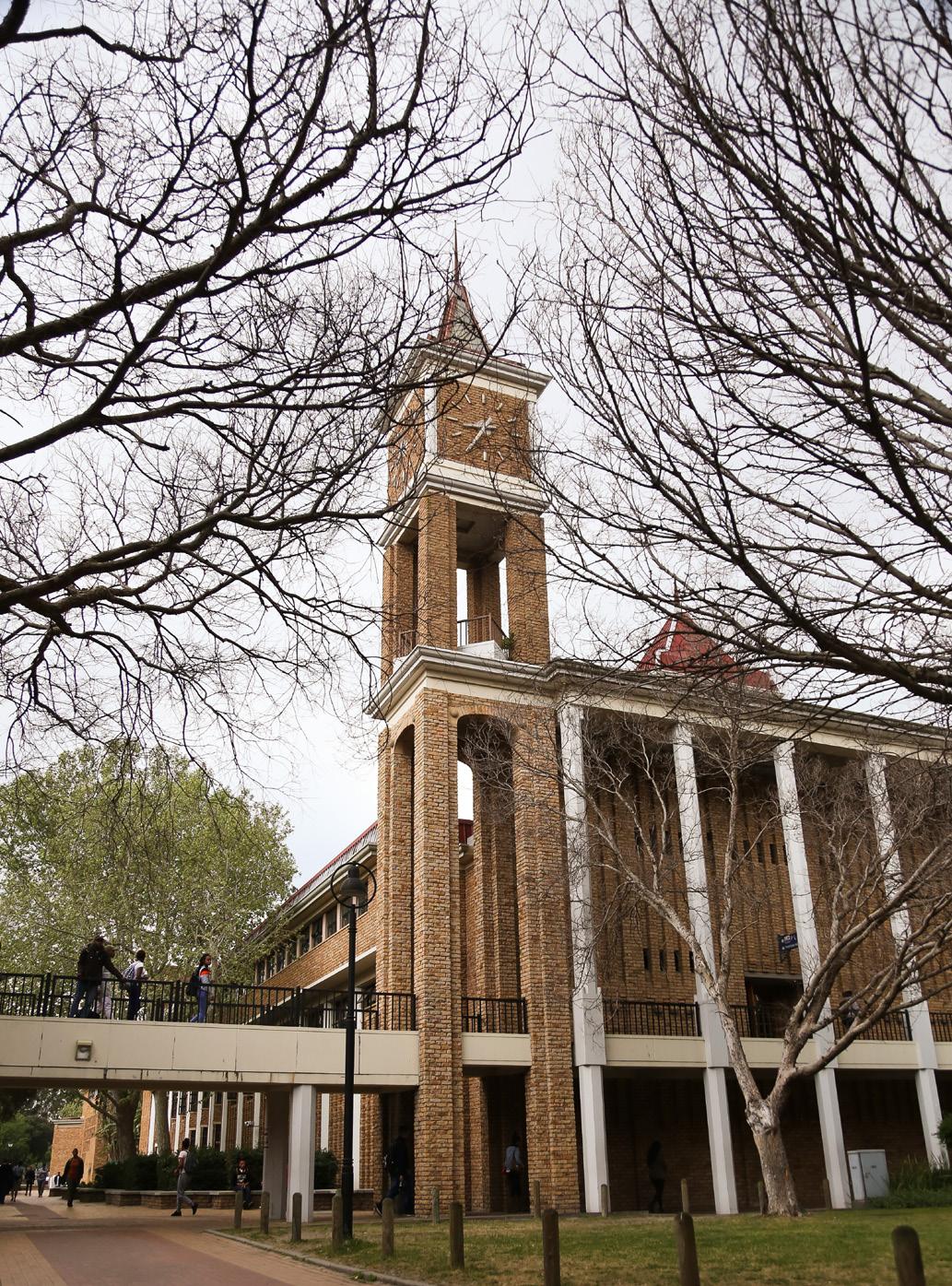
20. Hansen A, Engel-Hills P, Jacobs C. Blitz J, Cooke R, HessApril L et al ( 2023). Understandings and practices: Towards socially responsive curricula for the health professions. Advances in Health Sciences Education. https://doi. org/10.1007/s10459-023-10207-0
21. Soeker, M.S, Smith, M. & Hess- April, L. (2023) The experiences and perceptions of individuals with stroke about the usefulness of the Model of Occupational Self Efficacy in a rural setting in Cape Town, South Africa. Journal of Vocational Rehabilitation DOI: 10.3233/JVR-230041
1. Florence, M., Adonis, T., Botha, C., Mpisane, N., Thalmayer, A. & Naude, L. (2023). An International Longitudinal Research Project Investigating the Psychological Development of Young Adults in South Africa: Managing Attrition. Paper published in INTED, 2023 conference proceedings. ISBN: 978-84-09-49026-4. IATED Digital Library (library.iated.org)
2. Mamutse, S., Adonis, T. & Sonhlaba, N. (2023). Exploring Primary Caregivers’ Perceptions of Children’s Wellbeing during Covid-19 within a Low Socioeconomic Status School Context in the Cape Metropole. Paper published in INTED, 2023 conference proceedings. ISBN: 978-84-09-49026-4. IATED Digital Library (library.iated.org)
3. Tucker, L.A, Agbonika, le Roux, M., S., Spicer, S., Lewis, H., & R. Grigg (2023) Africa (Chapter 5). In H. Lewis and R. Grigg (Eds.), Dogs in Schools: Pedagogy and Practice for Happy, Healthy, and Humane Interventions. Routledge.
4. Jackson, K., Faroa, B. D., Augustyn, N. A., & Padmanabhanunni, A. (2023). What motivates South African students to attend university? A cross-sectional study on motivational orientation. South African Journal of Psychology, 53(4), 565-575.
5. Faroa, B. D., & Mwaba, K. (2023). Self-Reported IntraPersonal Causal Factors of Anti-Social Offending Behaviour among a Group of South African Emerging Adults. Acta Criminological: African Journal of Criminology & Victimology, 36(1), 56-92.
6. Pretorius, T. B., Padmanabhanunni, A., Jackson, K. M., & Faroa, B. D. (2023). Satisfied with teaching? Psychometric properties of the Teaching Satisfaction Scale. African Journal of Psychological Assessment, 5(0), a140.
7. Padmanabhanunni, P., Pretorius, T.B. & Isaacs, S.A. (2023). Validation of the vaccination attitudes examination scale in a South African context in relation to the COVID-19 vaccine: Quantifying dimensionality with bifactor indices. BMC Public Health, 23, 1872. https://doi.org/10.1186/s12889-02316803-4.
8. Pretorius, T.B., Heppner, P.P., Padmanabhanunni, A. & Isaacs, S.A. (2023). The PSI-20: Development of a viable short form alternative of the Problem Solving Inventory using Item Response Theory. Sage Open, https://doi. org/10.1177/21582440231215633.

9. James, S. & Isaacs, S. (2023). A phenomenological study on the experiences of parents of substance users from resource-constrained contexts in the Western Cape. Community Psychology in Global Perspective, 9(2), 84-104.
10. Pretorius, T.B., Padmanabhanunni, P. & Isaacs, S.A. (2023). Satisfied with life? Life satisfaction as a protective factor in the relationship between stress and psychological distress. International Journal of Environmental Research and Public Health (In press)
11. Padmanabhanunni, P., Pretorius, T.B. & Isaacs, S.A. (2023). We are not islands: The role of social support in the relationship between perceived stress during the COVID-19 pandemic and psychological distress. International Journal of Environmental Research and Public Health, 20(4), 3179. Doi: 10.3390/ijerph20043179
1. Shuro, L., & Waggie, F. (2023). Trends in socio-demographic characteristics and substance use among high school learners in a selected district in Limpopo Province, South Africa.
2. Nawagi, F., Munabi, I. G., Vyt, A., Kiguli, S., Rabin, T., Waggie, F., & Mubuuke, A. G. (2023). Using the modified Delphi technique to develop a framework for interprofessional education during international electives in health professions training institutions in Sub-Saharan Africa. Frontiers in Medicine, 10.
3. Africa, L., Frantz, J. M., & Mlenzana, N. B. (2023). Activities to Promote Interprofessional Practice at Primary Healthcare Level: A Systematic Review. Journal of Social and Health Sciences. 20 pages. https://doi.org/10.25159/29573645/12130
4. Filies GC, Nyalungu PS. Interprofessional student-led clinics can ease health care in
5. the Western Cape. Med Educ. 2023;1. doi:10.1111/ medu.15284.
6. Filies, G.C. & Africa, L. (2023). Health professionals need to collaborate. Changing how they’re taught helps build that skill. The Conversation. Retrieved 14 November 2023, from: https://theconversation.com/health-professionals-needto-collaborate-changing-how-theyre-taught-helps-buildthat-skill-216189
7. Irlam, J. H., Dreyer, A., Filies, G. C., Govender, L., Jacob, N., Jayakumar, J., Lokotola, C. L., Reid, S. & Rother, H. A. (2023). Early Online Issue 4: Education about planetary health and sustainable healthcare: A national audit of health professions education curricula in South Africa. African Journal of Health Professions Education, 15(4):e326. https://doi.org/10.7196/ AJHPE.2023.v15i4.326
8. Filies, GC, Ingram C, Mthembu TM. Interprofessional learning through 3D printing of assistive devices. Med Edu. 2023. http://doi.org/10.1111/medu.15112
1. Malema, M. J., Young, M. E., & Wegner, L. (2023). Leisure education to leadership: Youth with physical disabilities’ experiences in South Africa. African Journal of Disability (Online), 12, 1-12. http://dx.doi.org/10.4102/ajod.v12i0.1234
2. Malema, M. J., Malema, D. R., Mahlalela, E., Matsovhana, K., Malema, M. P. (2023). Leisure time during Covid-19 in the Western Cape, South Africa: experiences of people with disabilities. World Leisure Journal. https://doi.org/10.1080/1 6078055.2023.2239760
3. Mkwelo, A., Shai, K., Madide, S.,Mahlalela, E., Malema, P., & Malema M.J. (2023). Perceptions of leisure-time physical activity for people living with disabilities. The Open Health Journal. DOI: 10.2174/18749445-v16-e230717-2023-15
4. Bartels, C. A., Lambert, E. V., Young, M. E. M., & KolbeAlexander, T. (2023). If You Build It Will They Come? Park Upgrades, Park Use and Park-Based Physical Activity in Urban Cape Town, South Africa—The SUN Study. International Journal of Environmental Research and Public Health, 20(3), 2574. MDPI AG. http://dx.doi.org/10.3390/ ijerph20032574
5. Young, MEM., Mahlalela, P.E. & Venter, T. (2023) Sports Facility Management. In Hollander, W. & Knolte, L. (Eds), The Management of Sport in South Africa (pp. 291 – 304). Halfway House, Midrand, South Africa: KR Publishing. ISBN: 9781869229764
This is the first South African Textbook for Sport Management and addresses curriculum transformation and colonisation. The book is widely advertised among SA institutions to include in Sport management programs.


Publications
* Indicates student or postdoctoral fellow author
*Akunne OO, Valoyi V, Wehmeyer A, Johnson Y & Coetzee R. (2023). Implications of the South African National Drug Policy on prescribing patterns: A case study of the Limpopo Province. Journal of Pharmaceutical Policy and Practice, 16: 111. https://doi. org/10.1186/s40545-023-00622-4.
Agweyu A, Hill K, Diaz T, Jackson D, Hailu BG & Muzigaba M. (2023). Regular measurement in essential but insufficient to improve quality of healthcare. The BMJ, 380. https://doi. org/10.1136/bmj-2022-073412.
Asefa A, Gebremedhin S, Marthias T, Nababan H, Christou A, Semaan A, Banke-Thomas A, Tabana H, Al-Beity FMA, Dossou JP, Gutema K, Delvaux T, Birabwa C, Dennis M, Grovogui FM, McPake B & Beňová L. (2023). Wealth-based inequality in the continuum of maternal health service utilisation in 16 sub-Saharan African countries. International Journal of Equity in Health, 22(1): 203. doi: 10.1186/s12939023-02015-0.
*Azia IN, Nyembezi A, Carelse S & Mukumbang FC. (2023). Understanding the role of religious beliefs in adherence to antiretroviral therapy among Pentecostal Christians living with HIV in sub-Saharan Africa: a scoping review. BMC Public Health, 23, 1768. https://doi.org/10.1186/s12889-023-16616-5.
*Babatunde GB & Akintola O. (2023). Caregivers’ healthseeking behaviour for children participating in an integrated school health programme in KwaZulu-Natal, South Africa. African Journal of Primary Health Care and Family Medicine, 15(1), a3822. https://doi.org/10.4102/phcfm.v15i1.3822.
*Babatunde GB & Akintola O. (2023). Beyond access: Can a school health initiative facilitate healthcare services utilisation for school-going children? International Journal of Environmental Research and Public Health, 20(15). https:// doi.org/10.3390/ijerph20156448.
Barron P, Mahomed F, Masilela TC, Vallabhjee K & Schneider H. (2023). District health system performance in South AFRICA: Are current monitoring systems optimal? South African Medical Journal, 113(12): e1614. https://doi. org/10.7196/SAMJ.2023.v113i12.1614
Bello K, George A, De Jong M, Adeyera O, Faye C, Oyelade T, Mathews K & Binagwaho A. (2023). African governments must build on covid-19 responses to advance gender equality. BMJ, 381: e072239. doi: 10.1136/bmj-2022-072239.
*Bokolo, NP; Van Niekerk, R.L.; Mathews, V.; Leach, L.
A Systematic Review Protocol for the Effectiveness of Psycho-Educational Intervention Programmes in Addressing the Psychological Risk Factors Associated with NonCommunicable Diseases among Adolescents. Int. J. Environ. Res. Public Health 2023, 20, 6467. https:// doi. org/10.3390/ijerph20156467
Chademana E, Maluleke U & van Wyk B. (2023). A baseline assessment of developmental delays among children under 5 years in a high-HIV-prevalence setting in the Cape Metropole. Chetty T, Singh Y, Odendaal W, Mianda S, Abdelatif N, Manda S, Schneider H & Goga A. (2023). Intervention in mothers and newborns to reduce maternal and perinatal mortality in 3 provinces in South Africa using a quality improvement approach: Protocol for a mixed method type 2 hybrid evaluation. JMIR Research Protocols, 12: e42041. https://www. researchprotocols.org/2023/1/e42041
Clark J, George A & Khosla R. (2023). No pandemic preparedness and research without gender equality. The BMJ, 381: p1213. http://dx.doi.org/10.1136/bmj.p1213
Crowley T, *Petinger C, Nchendia AI & van Wyk B. (2023). Effectiveness, acceptability and feasibility of technologyenabled health interventions for adolescents living with HIV in low- and middle-income countries: A systematic review. International Journal of Environmental Research and Public Health, 20(3), 2464. https://doi.org/10.3390/ijerph20032464.
Crowley T, *Petinger C & van Wyk B. (2023). Effectiveness, acceptability, and feasibility of technology-enabled health interventions for adolescents living with HIV in low- and middle-income countries: A systematic review protocol. PLoS ONE, 18(2), e0281894. https://doi.org/10.1371/journal. pone.0281894 .
Crutchley RD, Newsome C, Chen LW, Li D, Sarangarm P, Min A, Bowers D, Coetzee R & McKeirnan KC. (2023). Design, implementation and assessment approaches within an advanced human immunodeficiency virus (HIV) elective course. Journal of Pharmacy Practice, 36(5), 1284-1293. doi:10.1177/08971900221108723.
Dada S, Cocoman O, Portela A, De Brun A, Bhattacharyya S, Tuncalp O, Jackson D & Gilmore B. (2023). What’s in a name? Unpacking ‘Community Blank’ terminology in reproductive, maternal, newborn and child health: A scoping review. BMJ Global Health, 8:e009423. doi:10.1136/bmjgh-2022-009423.
Doherty T, Horwood C, *Pereira-Kotze C, du Plessis L & Witten C. (2023). Stemming commercial milk formula marketing: now is the time for radical transformation to build resilience for breastfeeding. The Lancet, 401(10375), p. 415-418. https://doi. org/10.1016/S0140-6736(23)00095-8.
Durão S, Burns J, Schmidt BM, Tumusiime D, Hohlfield A, Pfadenhauer L, Ongolo-Zogo C, Rehfuess E & Kredo T. (2023). Infrastructure, policy and regulatory interventions to increase physical activity to prevent cardiovascular diseases and diabetes: A systematic review. BMC Public Health, 23(112). https://doi.org/10.1186/s12889-022-14841-y.
*Etiaba E, Eboreime EA, Dalglish SL & Lehmann U. (2023).
Aspirations and realities of intergovernmental collaboration in national- level interventions: insights from maternal, neonatal and child health policy processes in Nigeria, 2009–2019. BMJ Global Health, 8:e010186. doi:10.1136/bmjgh-2022-010186.
George AS, Lopes CA, Vijayasingham L, Mothupi MC,

Musizvingoza R, Mishra G, Stevenson J & Remme M. (2023). A shared agenda for gender and COVID-19 research: priorities based on broadening engagement in science. BMJ Global Health, 8: e011315. doi:10.1136/bmjgh-2022-011315.
*Gwelo NB, *Sumankuuro J, Akintola O & Brieger WR. (2023). Factors associated with underweight, overweight, stunting and wasting among primary school-going children participating in a school health initiative in South Africa. BMC Nutrition, 9:119. https://doi.org/10.1186/s40795-02300778-x.
Hardy VP, Beedle A, Murphy S, Storey C, Aggarwal N, Dandona R, Dev A, Doherty P, Heazell A, *Kinney M,. Nam S, Quigley P & Steen S. (2023). Support after stillbirth: Findings from the Parent Voices Initiative Global Registry Project. Bereavement, 2. https://doi.org/10.54210/bj.2023.1084
Jaca A, *Mulopo C, Wiysonge CS & Schmidt BM. (2023). A mapping exercise to identify the strengths, and gaps in knowledge translation activities at Cochrane South Africa. The Pan African Medical Journal, 45(64). https://doi. org/10.11604/pamj.2023.45.64.38075.
Jackson D, Katwan E, Boehm C & Diaz T. (2023). Use of routine health information systems to monitor disruptions of coverage of maternal, newborn, and child health services during COVID-19: A scoping review. Journal of Global Health, 13:06002. doi: 10.7189/jogh.13.06002.
Jacobs T, George AS. (2023). How gender is socially constructed in policy making processes: a case study of the Adolescent and Youth Health Policy in South Africa. International Journal of Equity in Health, 22:36. https://doi.org/10.1186/ s12939-022-01819-w.
KC A, Waiswa P & Kinney M. (2023). Research on high quality health care needs to move beyond what to how. The Lancet, 11. https://doi.org/10.1016/S2214-109X(23)00209-7
*Khan AS, Frank T, Swart RE. (2023). Child-directed marketing on packaged breakfast cereals in South Africa. Public Health Nutrition. 2023;26(10): 2139-2148. doi:10.1017/ S1368980023001507
*Kinney MV, George AS, Rhoda NR, Pattinson RC & Bergh A. (2023). From pre-implementation to institutionalisation: Lessons from sustaining a perinatal audit program in South Africa. Global Health: Science and Practice, 11(2). https://doi. org/10.9745/GHSP-D-22-00213.
Madela SLM, Harriman NW, Sewpaul R, Mbewu AD, Wiliiams DR, Sifunda S, Manyaapelo T, Nyembezi A & Reddy SP. (2023). Individual and area-level socioeconomic correlates of hypertension prevalence, awareness, treatment, and control in uMgugundlovu, Kwazulu-Natal, South Africa. BMC Public Health, 23, 417. https://doi.org/10.1186/s12889-023-15247-0. Makubuya T, Sexual Behavior, 52, 2835-2844. https://doi. org/10.1007/s10508-023-02718-z.
Materia FT, Smyth JM, Puoane T, Tsolekile L. Goggin K. Kodish SR. Fox AT. Resnicow K, Werntz S & Catley D. (2023). Implementing text-messaging to support and enhance
delivery of health behavior change interventions in low-to middle-income countries: case study of the Lifestyle Africa intervention. BMC Public Health, 23(1), pp.1-14.
Matlapeng KM, *Babatunde GB, *Gwelo NB & Akintola O. (2023). Accessing HIV services in Botswana: perspectives of men who have sex with men and other stakeholders. Global Health Action, 16(1), 2262197. https://doi.org/10.1080/16549 716.2023.2262197.
*Mayman YR & Van Wyk B. (2023). The impact of COVID-19 on HIV treatment of adolescents in sub-Saharan Africa: A scoping review. Health SA Gesondheid, 28(0), a2226. https://doi.org/10.4102/hsag.v28i0.2226.
Mensah Abrampah NA, Okwaraji YB, You D, Hug L, Maswime S, Pule C, Blencowe H & Jackson D. (2023). Global stillbirth policy review- Outcomes and implications ahead of the 2030 sustainable development goal agenda. International Journal of Health Policy and Management, 12: 7391. Doi:10.34172/ijhpm.2023.7391.
Mianda S, Todowede O & Schneider H. (2023). Service delivery interventions to improve maternal and newborn health in low- and middle-income countries: scoping review of quality improvement, implementation research and health system strengthening approaches. BMC Health Services Research, 23: 1223. https://doi.org/10.1186/s12913-023-10202-6.
Mlangeni N, Adetokunboh O, Lembani M, Malotle M, Ngah V,Nyasulu PS. Provision of HIV prevention and careservices to farmworkers in sub-Saharan Africancountries. Trop Med Int Health. 2023;28(9):710–9.https://doi.org/10.1111/ tmi.13922 TROPICAL MEDICINE & INTERNATIONAL HEALTH719
*Mothupi M, Dasgupta J, Jebeli SSH, Stevenson J, Berdichevsky K, Vong S, Barasa E, George A. (2023). Using an intersectionality approach to transform health services for overlooked healthcare users and workers after covid-19. The BMJ, 381: e072243. doi: 10.1136/bmj-2022-072243
*Msipu Phiri T, *Nyamaruze P & Akintola O. (2023). Perspectives about social support among unmarried pregnant university students in South Africa. PLoS ONE, 18(4)) e0284906. https://doi.org/10.1371/journal. pone.0284906
*Munyani FK & Van Wyk B. (2023). Determinants and rates of retention in HIV care among adolescents receiving antiretroviral therapy in Windhoek, Namibia: a baseline cohort analysis. BMC Public Health, 23:458. https://doi. org/10.1186/s12889-023-15356-w.
Murphy A, Palafox B, Chifamba J, Kruger IM, Ncube BJ, Ncube TL, Rangarajan S, Swart EC, Tsolekile L, Walli-Attaei M, J. West NJ, Yeates KE, Yusuf S, McKee M, and Hanson K. (2023) Comparing estimates of household expenditures between pictorial diaries and surveys in three low- and middle-income countries. PLOS Glob Public Health 3(4): e0001739. https://doi.org/10.1371/journal.pgph.0001739
Nyembezi A. (2023). A life course approach to promote

health and wellbeing of boys and men. International Journal of Health Promotion and Education, 61(4), 157. DOI: 10.1080/14635240.2023.2225954.
*Nkwanyana A, Mathews V, Zachary I & Bhayani V. (2023). Skills and competencies in health data analytics for health professionals: a scoping review protocol. BMJ Open, 13: 13:e070596. doi: 10.1136/bmjopen-2022-070596.
Nyondo-Mipando AL, Chirwa M, Kumitawa A, Salimu S, Chinkonde J, Chimuna TJ, Dohlsten M, Chikwapulo B, Senbete M, Gohar F, Hailegebriel TD & Jackson D. (2023). Uptake of, barriers and enablers to the utilization of postnatal care services in Thyolo, Malawi. BMC Pregnancy and Childbirth, 23: 2721. https://doi.org/10.1186/s12884023-05587-5.
*Orth Z & Van Wyk B. (2023). Asking the experts: Using cognitive interview techniques to explore the face validity of the mental wellness measure for adolescents living with HIV. International Journal of Environmental Research and Public Health, 20(5), 4061. https://doi.org/10.3390/ ijerph20054061.
Orth Z & Van Wyk B. (2023). Content validation of a mental wellness measuring instrument for adolescents living with HIV: a modified delphi study. BMC Psychology, 11:339. https://doi.org/10.1186/s40359-023-01350-9.
Payedimarri AB, Mouhssine S, Aljadeeah S, Gaidano G & Ravinetto R. (2023). Globalisation of industry-sponsored clinical trials for breast, lung and colon cancer research: trends, threats and opportunities. BMJ Oncology, 2: e000101. doi:10.1136/bmjonc-2023-000101
*Pereira-Kotze C, Faber M, Kannemeyer L & Doherty T. (2023). Access to maternity protection and potential implications for breastfeeding practices of domestic workers in the Western Cape of South Africa. International Journal of Environmental Research and Public Health, 20(4). https://doi.org/10.3390/ ijerph20042796.
*Pereira-Kotze C, Feeley A, Doherty T & Faber M. (2023). Maternity protection entitlements for non-standard workers in low-and-middle-income countries and potential implications for breastfeeding practices: a scoping review of research since 2000. International Breastfeeding Journal, 18(9). https://doi.org/10.1186/s13006-023-00542-8.
*Pereira- Kotze C, Faber M & Doherty T. (2023). Knowledge, understanding and perceptions on key stakeholders on the maternity protection available and accessible to female domestic workers in South Africa. PLOS Global Public Health, 3(6): e0001199. https://doi.org/10.1371/journal. pgph.0001199
Perrow BL & Schneider H. (2023). Mistrust in government and National Health Insurance: A qualitative study of solo private practitioners in Cape Town. South African Family Practice, 65(1), a5768. https://doi.org/10.4102/safp.v65i1.5768
Prisco JL, Laudone TW, Keuler NL, Coetzee R. (2023) A call for social accountability within pharmacy education: Concepts,
relevance, and accreditation. Currents in Pharmacy Teaching and Learning. 2023 Mar;15(3):231-233. doi: 10.1016/j. cptl.2023.03.001
*Roomaney RA, van Wyk B, Cois A & Pillay van-Wyk V. (2023). Multimorbidity patterns in South Africa: A latent class analysis. Frontiers in Public Health, 10: 1082587. doi: 10.3389/fpubh.2022.1082587.
*Roomaney RA, van Wyk B & Pillay-van Wyk V. (2023). Multimorbidity in South Africa: Is the health system ready? Journal of Multimorbidity and Comorbidity, 13. https://doi. org/10.1177/26335565231182483
Schneider H, Kredo T, Odendaal WA & Abdullah F. (2023). What are health policy and systems research priorities for universal health coverage in South Africa? South African Medical Journal, 113(2): 61-64. https://doi.org/10.7196/SAMJ.2023. v113i2.16798
Schneider, H.; Mianda, S.;Odendaal,W.; Chetty, T. Managing Local Health System Interdependencies: Referral and Outreach Systems for Maternal and Newborn Health in Three South African Districts. Systems 2023, 11, 462. https:// doi.org/10.3390/systems11090462
Schneider H, Masilela T, Mndebele J, Vallabhjee K, Petersen I, Gilson L & Engelbrecht B. (2023). Special series on the District Health System. South African Medical Journal, 113(11): e1653. https://doi.org/10.7196/SAMJ.2023.v113i11.16531.
Schneider H, Mukinda F, Cupido J, Wessels J, Kupa P, Leboho P, Nkoana N, Bosch N & Pillay Y. (2023). Improving health outcomes and quality at the subdistrict level: Evaluation of the ‘3 feet model’ in Waterberg District, Limpopo Province, South Africa. South African Medical Journal, 113(11): e1558. https://doi.org/10.7196/SAMJ.2023.v113i11.1558
*Siseho GM, Mathole T & Jackson D. (2023). Implementing quality-of-care during labour, childbirth, and early postnatal care, northeast Namibia: A quasi-experimental study. Journal of Global Health Reports, 7: e2023075. https://doi. org/10.29392/001c.90725.
*Siseho GM, Mathole T & Jackson D. (2023). Baseline assessment of the WHO/UNICEF,UNFPA maternal and newborn quality-of-care standards around childbirth: Results from an intermediate hospital, northeast Namibia. Frontiers in Pediatrics, 10:972815. doi: 10.3389/ fped.2022.972815.
*Ssegujja E, Andipatin M (2023) National level key stakeholders’ perspectives regarding intervention progression and emerging challenges within the national stillbirth reduction response in Uganda. PLoS ONE 18(4): e0285172. https://doi. org/10.1371/journal.pone.0285172
Tack B, Vita D, Ntangu E, Ngina J, Mukoko P, Lutumba A, Vangeluwe D, Toelen J, Allegaert K, Lunguya O, Ravinetto R & Jacobs J. (2023). Challenges of antibiotic formulations and administration in the treatment of bloodstream infections in children under five admitted to Kisantu Hospital, Democratic Republic of Congo. American Journal of Tropical Medicine

and Hygiene, 0(0), 1-15. doi: 10.4269/ajtmh.23-0322.
Tefera GM, Lembani M, David I & Majee W. (2023). COVID-19 and migrant coping strategies: A person in environment perspective on experiences of Malawian migrants living in South Africa. Journal of Social Service Research, 49:4, 447460. https://doi.org/10.1080/01488376.2023.2236140.
Theron M*, Harker N, and Swart R. (2023). Newsprint representation of the alcohol sales bans during the COVID-19 pandemic in South Africa: A mixed methods analysis. International Journal of Alcohol and Drug Research, 13-22. https://doi.org/10.7895/ijadr.419
Theron M*, Swart R, Londani M, Parry C, Petersen Williams P, Harker N. (2023). Alcohol consumption patterns, suppliers and online alcohol marketing: Before and during COVID-19 alcohol bans. S Afr J Sci. 2023;119(11/12), Art. #14543. https:// doi.org/10.17159/sajs.2023 /14543
Waffo Tchounga CA, Sacre´ P-, Ravinetto R, Lieberman M, Hamuli Ciza P, Ngono Mballa R, et al. (2023) Usefulness of medicine screening tools in the frame of pharmaceutical postmarketing surveillance. PLoS ONE, 18(8): e0289865
Whittingdon MD, Goggin K, Tsolekile L, Puoane T, Fox AT, Resnicow K, Fleming KK, Smyth JM, Materia FT, Hurkey EM, Vitolins MZ, Lamerty EV, Levitt NS & Catley D. (2023).
Cost-effectiveness of Lifestyle Africa: an adaptation of the diabetes prevention programme for delivery by community health workers in urban South Africa. Global Health Action, 16, https://doi.org/10.1080/16549716.2023.2212952
Zakumumpa H, Rujumba J,Kyomuhendo M, Amde W. (2023). Drivers of retention of the HIV workforce transitioned from PEPFAR support to the Uganda government payroll. Human Resources for Health, 21, 38 https://doi.org/10.1186/s12960023-00824-6
van der Westhuizen B, Frank T, Abdool Karim S, Swart REC(2023). . Determining food industry compliance to mandatory sodium limits: successes and challenges from the South African experience. Public Health Nutr. 2023 Nov;26(11):2551-2558. doi: 10.1017/S1368980023000757. Epub 2023 Apr 18. PMID: 37070406; PMCID: PMC10641639.
Book chapters
Centre for Interdisciplinary Studies of Children and Family and Society (CISCFS)
Schenck C, Louw H, Mandlana A 2023. Poverty. In Rautenbach J V, Maistry M, Shokane AL. Introduction to Social Work 2nd ed Juta. Pretoria
Schenck C, Nell C, Blaauw D, Grobler L 2023. Max-Neef’s Fundamental Human Needs a social indicators for sustainability: Examples of waste management in South Africa. In El Bari H, Trois C (ed) Waste management in Developing countries. Springer
School of Public Health
Sanders, David, Wim De Ceukelaire, and Barbara Hutton
(eds), The Struggle for Health: Medicine and the politics of underdevelopment, 2nd edn (Oxford, 2023; online edn, Oxford Academic, 23 Mar. 2023), https://doi.org/10.1093/ oso/9780192858450.001.0001
Technical report submitted
Centre for Interdisciplinary Studies of Children, Family and Society
Koegler, E., Mahlangu, T., Rich, E.G., Butler-Kruger, L., Webb, J., Zhang, S.X., Roper, M., & Price, R.K. (2023). Phase I Delphi Component Study Round 1. Measures for Countering Trafficking in Persons in South Africa (MCTIP), November 2023. Submitted to the US Department of State.
Acker-Cooper C, Schenck R, Nell C, Chitaka TY, Jordan L, van Wyk I, Uys MT 2023. A comparative provincial assessment of disposable nappies or diaper system dynamics. One Health Network and Endangered Wild Life Trust
Schenck C J, Nell C, Chitaka TY. 2023. Exploring disposable diaper usage and disposal practices in rural areas. CSIR Waste RDI Roadmap. Pretoria
Acker Cooper C; Schenck C J and Uys M T 2023 One Health AHP Waste Forum: Conference outcomes and strategic way forward. November 2023. Conference: Conservation Symposium 2023 Special Session: One Health AHP Waste Forum. At: Wild Coast Sun, Port Edward, Eastern Cape
School of Public Health
Kinney M, Ateva E, Malhotra J, Bender PTH, Cocoman O, Khalil M, Sacks E, Schaaf M, Stahlhofer M, Suguitani L, Tames R & Wanduru P. (2023). Chapter 3: Rights and respect: putting people at the centre of the response to preterm birth. Report: Born too soon- decade of action on preterm birth. http://www. borntoosoonaction.org/
Mckenzie A, Assegaai T & Schneider H. (2023). South Africa: a primary health care case study in the context of the Covid-19 pandemic. Geneva: World Health Organization
Policy Briefs
Matodzi M Amisi, Gwen Dereymaeker, Jody van der Heyde and Nicolette Roman (2023) Policy Brief: Scaling violence prevention in South Africa.
[This policy brief shows that interventions can prevent and reduce violence in South Africa. There are however challenges to delivering these programmes at scale. These include limited capacity for implementation, adapting for context, and balancing the need for programmes to be evidence-based while also being responsive to communities’ needs. South Africa’s policymakers and researchers need to find solutions to these challenges.]

Videos produced
1. Our Waste
2. https://kruger2canyons.org/links-2/
3. https://www.youtube.com/watch?v=bvloSUDafvY
School of Natural Medicine (SoN)
1. Prof. Daniels (SoN) participated in a workshop by SANC (South African Nursing Council) and CHE on the articulation for the PGDip Nursing Programmes on 14 February 2023.
2. Prof. Martin (Director) and Prof. Daniels (Deputy Director) attended the: SANC Indaba in Gauteng on 18 and 19 May 2023. FUNDISA quarterly meeting at TUT on 25 and 26 May 2023
3. Prof. Chipps, Ms. Cornelissen, Ms. Goba, and Ms. Jaganath attended a 5-day workshop at the University of Turku in Finland in March on Innovative Digital Technology for Simulation-Based Training and to discuss further collaboration from 4 to 11 March 2023.
4. Mr. Tokwe, a 2nd-year lecturer, and 5 SoN students together with Dentistry visited Japan for 5 days to do presentations on training and programmes from 6 to 11 March 2023.
5. Prof. Chipps attended two workshops in Germany from 22 March to 3 April 2023 for DFG on German/African collaboration. Health Technology Assessment and Grant writing for DFG
6. Attended and presented at a 2-day conference on German/ African collaboration
7. Prof. Chipps attended a one-week workshop in Zanzibar from 26 August to 4 September for DFG on German/African collaboration.
8. Prof. Martin, Prof. Daniels, and Prof. Chipps visited the Western Norway University of Applied Sciences or HVL in Bergen on 26 September to investigate establishing collaboration between the two universities.
9. Prof. Chipps represented the School at the NHI Universal Access conference in Pretoria on December 12, 2023.
1. Prof Liezel Ennion presented a poster at the 16th International Primary Care Diabetes - Europe conference in Barcelona, Spain. Vibrating insole therapy improves plantar sensation in patients with Type II Diabetes Mellitus and advanced peripheral neuropathy in the short and long term. (ID 10107).
2. Dr Tania Steyl presented the following two posters at the World Physiotherapy Congress (WCPT) Dubai, 2-4 June 2023. “The effectiveness of diabetes self-management education training among individuals with type 2 diabetes mellitus in rural Nigeria.”
3. “Text neck syndrome in undergraduate health science students from a University in the Western Cape: a crosssectional study.”
4. Dr Blake Boggenpoel: Platform presentation was presented on my behalf by co-author Prof Conran Joseph at the World Physiotherapy Congress (WCPT) Dubai, 2-4 June 2023. Key clinical questions in facilitating traumatic spinal cord injury (tSCI) management in South Africa: A Delphi consensus study.
5. Dr Farhana Karachi chaired an international congress namely the 6th World Congress on Physical Therapy and Rehabilitation Medicine (PTRM 2023) in Rome, Italy 0405 October 2023 and presented a paper entitled: ‘Family and patient perception of physiotherapy care rendered to patients in the cardiothoracic intensive care unit.’
Dietetics
J Wilkenson PhD research project in process: An exploration of Emergency Remote Teaching triggered tensions and transformations in Teaching and Learning practices within a Dietetics Department of a South African Health Science Faculty
School of Natural Medicine (SoNM)
Hansen A, Engel-Hills P, Jacobs C, Blitz J, Cooke R, Hess L, Leisegang K, Naidoo N, Volschenk M, van Schalkwyk S. Understandings and practices: Towards socially responsive curricula for the health professions. Advances in Health Sciences Education 2023;28:1131-1149.
Dr Danelle Hess was a facilitator on the pilot Collaborative Online International Learning as part of the virtual exchange for developing cultural-, global health- and person-centred healthcare competencies in selected rehabilitation professions students, within SASUF virtual exchange grants. 26 and 27 October 2023. Students from various institutions and health professions backgrounds participated in two online cases, including physiotherapy students from the University of the Western Cape.
Occupational Therapy
Infusing IPE into ethics practice and education (Prof De Jongh and colleagues).
Psychology
Faroa BD, Padamnabhanunni A. (2023). Exploring community resilience: An application of photovoice in post-graduate studies (resource for guiding the incorporation of photovoice in postgraduate courses). Southern African Resilience Academy

and Global Resilience Partnership. Initiative by the multi-country, transdisciplinary working group consisting of colleagues from: University of the Free State, Tulane University, Dillard University, and UWC.
Filies GC, Muller, J. Using the International Classification of Functioning, Disability and Health as a common framework in promoting continued collaborative practice at two higher education institutions in South Africa: an explorative study (HSSREC Reference Number: HS21/7/33). 13 September 2021 – 13 September 2024.
Filies GC, Africa L, Jaffer L, Waggie, F et al. (co-investigator of a faculty wide project comprising of three subgroups). An evaluation of interprofessional education and collaborative practice curriculum offered at a South African university (Ethics Reference Number: HS19/9/28).
Filies GC (co-investigator on joint project with Stellenbosch University): A community-based, participatory research approach to understand challenges, needs, risk and engagement among vulnerable youth in South Africa (Ethics reference: BM22/2/8).
Period: 12 April 2022 – 12 April 2025.
Ghaleelullah Achmat - Western Cape Government and UWC (SRES department) successfully hosted the diabetes support group as part of Western Cape on Wellness (WOW projectMitchells Plain)
M Malema is busy with data collection for his project titled: The impact of wellness programmes and extracurricular activities on students’ academic success at a university in the Western Cape.
M Malema submitted a grant application: Erasmus Global Application in collaboration with Norwegian School of Sport Science
MEM Young, the UWC team leader, was involved in an Erasmus KA2+ project proposal titled ‘Digital innovation capacity building of South African HEIs for advancing underserved communities and people with disabilities’ write-up. Partner institutions include Cape Peninsula University of Technology, the University of Fort Hare, LAB University (Finland), Karel de Grote University of Applied Sciences (KdG) (Belgium) and Avance University of Applied Sciences (Netherlands). Most meetings were done online. Two face-to-face meetings were held by invitation to LAB University on 28 May – 3 June and KdG on 28 August - 1 September. Other UWC staff members involved in the project are Prof Barry Andrews (SRES), Prof Talitha Crowley (Nursing), Tak Wing YU (Physiotherapy) and Asandile Mandlana (Social Work). The proposal will be submitted for funding in February 2024.
MEM Young, as programme coordinator, and the BA (Hons) Sport and Exercise Science Community Health stream students,
hosted a World Leisure Student Wellness Day on 2 May. This was used as a project for the students and aimed at educating UWC students on healthy habits during their academic studies. The CHS faculty and departments were invited to collaborate on the event, which proved successful.
SEMINARS AND CONFERENCES AND INTERNATIONAL VISITORS/FELLOWS
Webinars
Social Work
1. Van der Westhuizen M. 3 November 2023: Environmental social work and youth empowerment at an international webinar organised by the University of Applied Sciences Nuremberg, Germany.
2. Van der Westhuizen, M. 19 April 2023. The Global Agenda for Social Work and Social Development and how it Relates to Work with Refugees and Climate Change. International webinar hosted by the University of Applied Sciences Bochum, Germany: Social Work with Refugees and Internally Displaced Peoples - Examples from the global context
3. Van der Westhuizen, M. 25 April 2023. Decolonised social work practice. University of Applied Sciences and the Arts, (Gent, Belgium): Intercultural perspectives on decoloniality.
4. Hart, C. 17 March 2023. Finding an academic Rhythm: Hacks and Tips. Varsity College: Research & Publication capacity building.
5. M van der Westhuizen: Colonialism and Apartheid: How does social work contribute to a move towards postcolonial practice – Webinar hosted by the Karl De Grote University of Antwerp, Belgium. 24 October 2023
6. C Hart: Tools for Impactful Scholarship of Engagement –UWC DVC Academic Week.
7. R Safodien: AI and Social Work Education ResponseUWC CIECT Colloquium on Artificial Intelligence in Higher Education. 19 July 2023
8. R Davids. Gender-based violence and maintenance. National webinar by DeafSA and the NPA. 19. August
9. Dr Shernaaz Carelse presented the topic. “Gender based violence and concepts on Social work in an international context of Germany and South Africa.” International programme - Hephata Campus, Schwalmstadt, Germany.
10. Dr Human-Hendricks: Presentation done at the Sociology Department, University of Ghana. Topic: Parenting competencies and child wellbeing in communities.
1. SoN hosted Karel de Grote University (KdG) Antwerp, Belgium University, on 21 February 2023 to discuss future collaboration and student mobility.

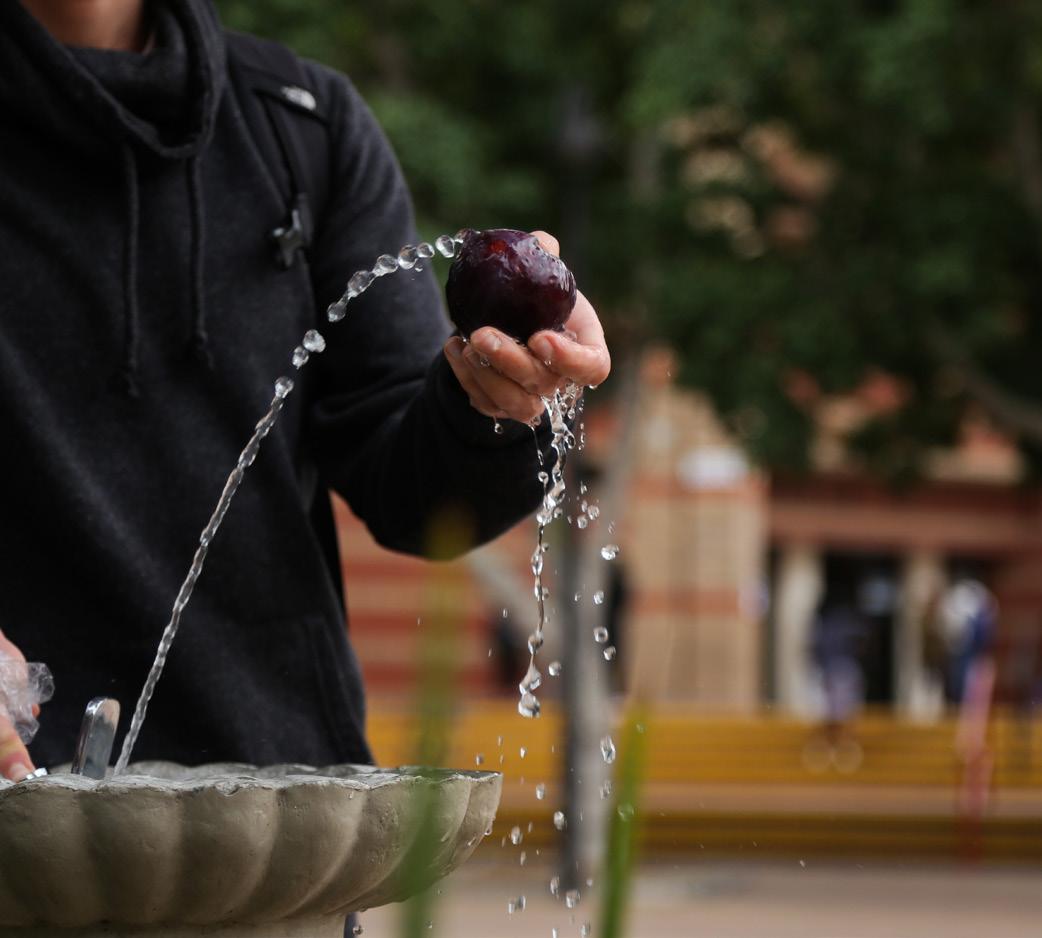
2. The Director of the School of Nursing, Prof. Martin, and Deputy Director, Prof. Daniels hosted the first quarterly meeting of 2023 for FUNDISA (Forum of Nursing Deans South Africa) at the CHS Bellville Campus from 23 to 24 February 2023. Forty delegates from all the different universities in South Africa attended the event. CHS and SoN were congratulated on our excellent facilities and dedicated staff. A tour of the Skills Lab left many delegates in awe, saying that they wished that they too could have such state-of-the-art facilities.
3. Prof. Bimerew presented a two-day International Collaborative Digital Health Informatics Symposium. Theme: Disseminate the results based on the research information needs, in continuity of care for effective care coordination in the Western Cape. Delegates from the Department of Health, SU, CPUT, UWC, FUNDISA, and Primary Health Care Nurses on Digital Information Systems in Primary Health Care, University of Sheffield (UK), University of Leeds (UK). The Western Cape Minister of Health & Wellbeing Dr. Nomafrench Mbombo, an UWC Alumni and ex-staff member closed the 2-day workshop (PLUME grant) on 27 and 28 February 2023.
4. Ms. N. Holtman: Theme; Exploring SRH information needs and barriers of adolescents; and Ms. P. Koopman: Theme: Information needs of midwives to support women with mental health needs (Prof Bimerew’s Masters’ students who were funded by the project) presented at the symposium on 27 February 2023.
5. Ms L. Le Roux (Prof Chipps, and Prof Bimerew’s Ph.D. student and staff member) presented at the symposium on 27 February 2023. Theme: Framework for nursing informatics competencies in South Africa.
6. SoN hosted Prof. Lakshmi Thangavelu, Dean of International Affairs of Saveetha Institute of Technical and Medical Sciences, Chennai in India on Monday, 8 & 10 May 2023 to discuss possible future collaborations.
7. SoN hosted Artevelde University of Applied Sciences, Ghent, Belgium on 9 June 2023 to discuss possible future collaborations.
8. SoN hosted Oslo Metropolitan University, Norway on 3 November 2023 to discuss possible future collaborations.
9. SoN hosted the Western Norway University of Applied Sciences (HVL) on 8 November 2023 to discuss future collaboration.
10. Prof. Chipps hosted Prof Salantera and Prof Peltonen from the University of Turku, Finland at the School of Nursing for a week from 4 to 8 December 2024 to engage with staff and to plan further collaborations.
11. The School of Nursing, the University of Moi, and the University of Turku hosted a 6-week online course from 13 September to 18 October 2023 on Design Thinking, with 7 CHS staff and students completing the course and graduating:
Prof. Talitha Crowley
• Dr. Gérard Filies
• Mr. Arthur Chikware
Ms. Chante Johannes
• Ms. Noxolo Masete
• Ms. Meghann Petersen
Ms. Thandazile Sibindi
Occupational Therapy
Missouri University partner Professor Wilson Majee was appointed as an extraordinary professor in the Department of Occupational Therapy in 2020 - 2022. He was re-appointed for a second term of three years from 2023 - 2025. He continued his collaboration with Prof Wegner and colleagues in the Department and CHS faculty in 2023.
Several colleagues attended online webinars that were hosted by the Occupational Therapy Association of South Africa (OTASA). Some of the webinars focused on occupational therapy education, occupational therapy clinical practice, occupational therapy research and occupational therapy and decoloniality.
Psychology
1. Florence, M., Adonis, T., Botha, C., Mpisane, N., Thalmayer, A. & Naude, L. (2023, March). An International Longitudinal Research Project Investigating The Psychological Development of Young Adults in South Africa: Managing Attrition. Paper presented at INTED, 2023
2. Mamutse, S., Adonis, T. & Sonhlaba, N. (2023, March). Exploring Primary Caregivers’ Perceptions of Children’s Wellbeing during Covid-19 within a Low Socioeconomic Status School Context in the Cape Metropole. Paper presented at INTED, 2023.
3. Viljoen, A. & Adonis, T. (2023, September). Exploring Postgraduate Psychology Students’ Perceptions and Experiences of Empathy in an Online Learning Environment, amidst the COVID-19 Pandemic. Paper presented at

Negotiating the Fabric of the African University: Global Trends and Local Realities. Hosted by University of the Western Cape (UWC), University of Cape Town (UCT) and Stellenbosch University (SU).
4. Mamabolo, K., & Tucker, L.A. (2023, October). Ethical and Practical Considerations for Animal-Assisted Therapy in South Africa. Paper presented at the PsySSA Annual Conference, Johannesburg.
5. Viljoen, A & Adonis, T. (2023, October). Exploring social connectedness and general empathy with postgraduate psychology students amidst the COVID-19 Pandemic: the value of the Hidden Curriculum. Paper presented at PsySSA Annual Conference, Johannesburg.
6. Botha, C., Brogneri, S., Thomas, N., Chetty, J., Adonis, T & Florence, M. Exploring protective factors for self-reported substance use amongst emerging adults across South Africa: A mixed method study. Paper presented at PsySSA Annual Conference, Johannesburg.
1. M.P Malema and Prof Barry Andrews - Attended an International conference held in the United Kingdom between Liverpool John Moore University, University of the Western Cape, University of Johannesburg, University of Pretoria, as well as the University of Salford as part of a British Council Going Global Partnership Programme. The conference was from the 22nd of January 2024 till the 26th of January 2024.
2. Prof Marie Young was an invited lecturer at the Summer School Positive Health & Resilience, a Summer school for students in healthcare and welfare hosted by KdG, Belgium, from August 21 to September 1 2023.
3. Prof Marie Young hosted Mrs Veronique Fromont from the KdG Nursing Department from 20-25 February. She set up meetings with the UWC Nursing Department to establish a relationship between the Departments and set up a memorandum of understanding.
4. Prof Marie Young visited Prof. Jo Ann Coco-Ripp at Winston Salem State University from 4-9 September to continue discussing developing the therapeutic recreation (TR) curriculum and internship program in South Africa. She addressed the TR major students, discussing the health system in South Africa and the possibility of student exchange to set up an internship program.
5. Prof Marie Young attended the 17th World Leisure Congress in Dunedin, New Zealand, from 11 to 16 December. She served as the session chair for a special Leisure Education and Human rights session, chaired plenary sessions, and presented two papers, one as the first author and one on behalf of a PhD student.
6. Dr. Mkhaya Malema attended the 17th World Leisure Congress in Dunedin, New Zealand, from 11 to 16 December. He presented two papers at the congress
7. Papers presented by Prof Young and Dr Malema:
8. Venter, T. & Young, M. (2023). A context-specific PE programme for senior-phase schools using Delphi method. 17th World Leisure Congress, Dunedin, New Zealand 11-15 December, 2023. Conference proceeding (p.211). ISBN: 9780-473-70722-4
9. Young, M., Onagbiye, S., Basson, M., Muller, F., Robertson, G. & Stuart, D. (2023). The influence of COVID-19 on leisure time physical activity among people with physical disabilities in the Western Cape 17th World Leisure Congress, Dunedin, New Zealand 11-15 December, 2023. Conference proceeding (p.212). ISBN: 978-0-473-70722-4
10. Malema, M., Young, M. & Lisa Wegner, L. (2023) Experts’ knowledge and experience in leisure education and leadership development for youth with a physical disability. 17th World Leisure Congress, Dunedin, New Zealand 11-15 December, 2023. Conference proceeding (p.104). ISBN: 9780-473-70722-4
11. Malema, M., Malema, D. R., Mahlalela, E. P., Matsovhana, K., & Malema, M. P. (2023). Expert knowledge on LTPA for people with disabilities in the midst of COVID-19: perceptions of key informants. 17th World Leisure Congress, Dunedin, New Zealand 11-15 December, 2023. Conference proceeding (p.104). ISBN: 978-0-473-70722-4
School of Public Health
1. Ms Corinne Carolissen and Dr Woldekidan Made participated in the CARTA conference in WITs School of Public Health, University of the Witwatersrand in Johannesburg, 14-15 September, 2023. Dr Amde made a presentation on the strengths of the SOPH doctoral program and the possible areas of collaboration with the CARTA program.
2. Dr Oyinye Akunne, A Postdoctoral Fellow presented at the International Society for Pharmacoepidemiology’s 3rd Annual Conference on Pharmacoepidemiology in Africa 19th World Congress of Basic & Clinical Pharmacology.
3. Dr Verona Mathews attended the Precision Medicine meeting 27-20 March. Dr Chanelle Mulopo participated in the SAMRC Research Capacity Development Beneficiary Conference 2023 SAMRC-Grant Holders Annual Meeting 2023
4. Dr Xolisa Nxele, presented a seminar at the South African Society for Biochemistry and Molecular Biology. Dr Carmen Späth made a research presentation at Division of Social and Behavioural Sciences, University of Cape Town. Dr Carmen Späth has a Poster displayed at The Public Health Association of South Africa (PHASA) conference. Dr Matina Lembani Organised session – PHASA conference 2023 on Understanding and confronting health xenophobia within public health.
5. Dr Netsai Gwelo and Prof Olagoke Akintola gave on community participation in rural communities
6. at the on online CHS Connect Seminar Series (Participating countries: Zambia, Sweden, Uganda, Tanzania, South Africa)

1. Hart, C., Daniels, P. & Lawack, V. Developing the Next Generation Postgraduate Capacity and Research Ethos: “Being socially just, relevant, transformative and impactful”. CHE Higher Education Conference, 1-3 March 2023.
2. M Van der Westhuizen: Student social workers’ understanding of the concepts of culture, cultural identity and decolonization. International Conference of the Association of South African Social Work Education Institutions (ASASWEI) - Advancing social work praxis through strengthened multi-sectoral responses to adversity, vulnerability and trauma. 27 September 2023
3. R Safodien: Social work educators and practitioners perceptions of e-social work.ASASWEI National Social Work Conference. International Conference of the Association of South African Social Work Education Institutions (ASASWEI) - Advancing social work praxis through strengthened multisectoral responses to adversity, vulnerability and trauma. 28 September 2023
4. U September: Social work and police services in advancing mental health support services to families. International Conference of the Association of South African Social Work Education Institutions (ASASWEI) - Advancing social work praxis through strengthened multi-sectoral responses to adversity, vulnerability and trauma. 27 September 2023
5. M Smith: Work Integrated Learning as a Tool and Space for Innovative Learning. HELTASA National Conference. 24-26 October 2023
6. L Maphumulo. Exploring the experiences of student’s support during online Teaching and Learning: A case study of the students at the University of KwaZulu-Natal, College of Humanities in the School of Built Environment and Development Studies - Innovations in the Scholarship of Teaching and Learning (iSoTL) Conference 27 September 2023.
7. R Davids. The experiences of women who are deaf and gender-based violence. Hearing their Voices. AFRINEAD, Cape Town. 29 November.
8. Dr Anja Human-Hendricks: Conference on ‘Precarity and its Implications for Social Justice’ at the University of Ghana. Topic: Strategies for upliftment and empowerment in the face of growing economic precarity and social inequality.
School of Natural Medicine
1. AHPCSA Education Committee. 10 November 2023. Presentation of proposed new BSc (CHS), Masters and PG Diploma for SoNM and accreditation by AHPCSA.
2. SoNM Research Day. 14 November 2023, Online. Research presentations from student research projects (for assessment purposes) and staff research projects.
3. Oxrider Academy (Netherlands and SA Collaboration). 15 November 2023, CHS Bellville. Preliminary discussions on
curriculum advising, community engagement, staff and student exchange within Chinese Medicine and Acupuncture.
4. Ministry of Health and Shandong Health Delegation. 20 – 21 November 2023, CHS Bellville. CHS and Shandong delegation discussed the future collaboration in nursing, PT, OT, Psychology and SoNM in staff and student exchange and researchers.
1. Prof. Chipps presented on Digital Mobile Health at the Digital Health Informatics Symposium on 28 February 2023.
2. Prof. Chipps presented on Digital Health Evaluation with Prof Sukums and Dr Felix Holl on the 30th of March 2023 at a 2-day conference on German/African collaboration.
3. Prof. Minnie attended the International Maternal Newborn Health Conference from 8 to 11 May 2023.
4. Prof Minnie attended the 33rd Triennial Congress of the International Confederation of Midwives from 11 to 14 June 2023.
5. Prof Crowley presented at the 11th SA AIDS Conference in Durban 20-23 June 2023: Supporting Adolescents with SelfManagement to be Resilient and Thrive (S-SMART)
6. Prof. Chipps presented at the UWC Digital Horizons: Transforming Higher Education on AI in Nursing on 27 July 2023.
7. Prof. Chipps presented at the Life Healthcare College Nursing Education Symposium: AI and Nursing on 31 July 2023.
8. Prof. Chipps presented at the International Africa Health Conference in Johannesburg on 17 October 2023 on AI and Nursing.
9. Prof. Chipps presented on Digital health in Nursing to ANHUI Medical University of China on 21 November 2023.
10. Prof. Martin, Prof. Daniels, Prof. Chipps, Dr. Bekelepi (Prof. Martin’s Ph.D. student who graduated on 17 April 2023 ), Ms. Sibindi (Prof. Chipps’s Ph.D. student, in her second enrolment year) presented at the SANORD Conference in Norway, from 20 - 22 September in Oslo, Norway and presented the following papers:
11. Chipps, J., Sibindi, T. and Crowley, T. Climate change – a challenge for primary care nursing education at the SANORD Conference, from 20 - 22 September, Oslo, Norway.
12. Daniels, F. and Crowley, T. Nursing education reform in South Africa: Implications for offering postgraduate diplomas and the supply of human resources for health at the SANORD Conference, from 20 - 22 September, Oslo, Norway.
13. Chipps, J. and Owoeye I. Grassroots uptake of smartphones for nursing education in Africa at the SANORD Conference, from 20 - 22 September, Oslo, Norway.
14. Bekelepi, N. and Martin, P. Violence experienced by nurses

working in acute psychiatric wards: Western Cape, South Africa at the SANORD Conference, from 20 - 22 September, Oslo, Norway.
15. Ms. Sibindi, T. (SoN Ph.D. student) also had the opportunity to chair two sessions, North-South Collaboration and Mobility and Sustainable Development in Teacher Education at the SANORD Conference, from 20 - 22 September, in Oslo, Norway.
16. Ms. Sibindi, Prof Chipps’ Ph.D. student presented at Thomas Moore University on her Ph.D. Echo competencies in Nursing, Climate Change on 14 February 2023.
17. Mr. Isaihah Owoeye, Ph.D. student (Prof Chipps & Prof Daniels) presented on Smartphone addiction in nursing students on 2 November 2023 at the DVC: R&I Research Week.
18. Prof. Chipps & Prof Daniels presented on The grassroots uptake of smartphones in nursing education on 2 November 2023 at the DVC: R&I Research Week.
Centre for Interdisciplinary Studies of Children, Family and Society
1. Roman, N. Inequality within and among countriesSDG10: An Overview. An oral presentation at “The 13th International Malaysian Studies Conference” (MSC 13), 1516th Suguat 2023, Kuala Lumpur, Malaysia.
2. Johannes, C, Roman, N.V.; Onagbiye, S. O.; Titus, S, Leach, L.L. The relationship between psychosocial factors and physical activity among undergraduate university students. 19th Annual International conference on sport and exercise science, 24-27 July 2023, Athens, Greece. Online presentation.
3. Behardien N, Brijlal P, Roman NV. Course Evaluation: Assessment Practices of a Pre-clinical Exodontia Skills Course (Interactive Talk Presentation). IADR/LAR General Session & Exhibition with WCPD, Bogotá, Colombia, 21-24 June 2023.
4. Behardien N, Brijlal P, Roman NV. 52nd IADR SA conference 07 – 08 September 2023 in Cape Town, South Africa. Challenges faced by clinical teachers teaching exodontia
5. CISCFS hosted Dr Raan Haan Tan from Malaysia who conducted a workshop on evaluating SDGs.
6. Professor Roman conducted four virtual sessions between November and December 2023, for international participants, focusing on writing a book chapter.
7. Kumar, S., Schwarzer, B., Ramli, R., & Roman, NV (2023). Inequality within and among countries - Implementing a research-based social work curriculum on SDG 10 (IWAAC-10). An oral presentation at the SWDE 2023 Virtual Conference on April 12-14, 2023.
8. Professor Roman conducted in-person systematic review training for early career researchers from UWC, Uganda and Kenya between 23-27 October 2023.
9. As part of an international SDG10 project funded by DAAD, Professor Roman, Professor Schenck, Dr. Lukelelo (Department of Social Work), Dr. Samuels (Staff member at the Department of Correctional Services) and Dr. Sambo (Staff Member at CPUT) participated in an international writing retreat hosted in Langkawi in Malaysia and supported by Germany, India and South Africa in August 2023. Professor Roman was the main facilitator of the writing retreat. In the second week, all students and early career researchers, of the participating countries, presented their articles as posters at an international conference in Kuala Lumpur, Malaysia.
10. The Shifting Notions of Motherhood and Fatherhood in Contemporary Africa: Strengthening Capacity for Research and Policy Engagement in Shifting Notions of Motherhood and Fatherhood for Improved Children’s Well-being in Africa (SCaRPE – A) project, funded by the UKRI, is a project implemented by five countries in Africa (South Africa, Uganda, Kenya, Rwanda and Nigeria). Professor Roman is the PI and facilitator for strengthening capacity in research and writing for publication. Dr. HumanHendricks (Department of Social Work), Dr. Adebiyi (FCHS Postdoc) and Mr. Lewaks (PhD Candidate) are early career researchers on the project. Their research is supported through the grant, and they have opportunities for mobility and training at the partner universities. Dr HumanHendricks and Mr. Lewaks spent a week in September in Uganda focusing on grant writing, research uptake and writing for publication.
11. 3 Nov 2023: University of Missouri (UMSL): Prof. Rich and her US partner, (Prof E Koegler, UM-SL), presented their findings from a completed project (The Nature and Scope of Trafficking in Persons (TIP) in South Africa) in a hybrid webinar entitled: Global Perspectives on Human Trafficking: Screening & Prevalence in South Africa at UM-SL’s School of Social Work Coffee & Conversation Research Series.
12. Acker Cooper C; Schenck C J and Uys M T 2023 One Health AHP Waste Forum: Conference outcomes and strategic way forward. November 2023. Conference: Conservation Symposium 2023 Special Session: One Health AHP Waste Forum. At: Wild Coast Sun, Port Edward, Eastern Cape
13. Feedback session for Child Health Stucy with Stellenbosch university _ HH waste management. DG Murray Trust
14. Schenck C J and Nell C 2023 Baseline assessment: Kruger to Canyon Biospheres Conference: Conservation Symposium 2023 Special Session: One Health AHP Waste Forum. At: Wild Coast Sun, Port Edward, Eastern Cape
15. Schenck C J , Tyrrell H, Nell C 11 September 2023 Realities of the ‘End-of-Life’ of disposable diapers in South Africa. To Kimberly-Clark Corporation
16. Schenck C J We have to think differently about waste and the management of waste – (no blue economy if we do not get it right). Norwegian Embassy August 2023. Two Oceans

Aquarium, Cape Town.
17. Schenck C J and Nell C The spending patterns on disposable diapers: Implications for the 1str 1000 days. Conference: Conservation Symposium 2023 Special Session: One Health AHP Waste Forum. At: Wild Coast Sun, Port Edward, Eastern Cape
Interprofessional Education Unit
Symposia
1. Filies, G.C. Literature Review Webinar to postgraduate students (28 March 2023)
2. Filies, G.C: Interprofessional Education & Collaborative Practice: Life Healthcare College Nursing Education Symposium (31 July 2023)
Conferences
1. F Waggie. Interprofessional Education & Collaborative Practice:Are we making a difference in Africa? Keynote, 4th AfrIPEN Conference- Blantyre, Malawi (15 - 17 September 2023)
2. L Africa. World Physiotherapy Congress - Dubai, UAE (2 - 4 June 2023)
3. Africa, L., Frantz, J., Mlenzana, N. - Title: Activities that promote interprofessional practice in the rehabilitation sector of a primary health care facility to meet contextual challenges (Poster presentation) 4th AfrIPEN ConferenceBlantyre, Malawi (15 - 17 September 2023)
4. Africa, L., Filies, G. - Title: The perspectives of first-year students on interprofessional education as a vehicle for achieving Sustainable Development Goal 3 (Oral presentation)
5. Africa, L., Filies, G., Jaffer, L., Swinny, C. - Title: On URL marks, get set, AMAZING RACE! (Oral presentation
6. Filies, G.C & Titus, S. - A design thinking approach to developing an online curriculum in interprofessional education in health in South Africa
7. Filies, G.C & Muller, J - The International Classification of Functioning, Disability and Health Framework as a strategy to promote interprofessional collaboration during rural training in South Africa
8. McLaggan, K., Lister, H. & Filies, G.C. - Exploring strategies promoting interprofessional collaborative practice in spinal cord injury rehabilitation at a private South African hospital group Showstark, M., Wiss, A.C., Joosten-Hagye, D., Sappio, E.M., Pattershall-Geide, J., Cavezza, R., Nyathi, N., Nyoni, C.N., Filies, G.C., Embry, E., Zschaebitz, E., Biernacki, P., Slusser, M.M., Mcginnis, P., Resnik, C., An, I., Delawala, F., Pitout H., Schweickerdt, L., Muller, J., Africa, L., Kholvadia, A., Ntsekhe, T., Tshotetsi, L. & Ricks, E
9. Virtual Interprofessional Education (VIPE) for the African continent: AFRI-VIPE.
1. Prof Thandi Puoane and Dr Lungiswa Tsolekile hosted Prof Delwyn Catley from Children’s Mercy Hospital, Kansas City, Missouri, USA to hold discussions about future proposals and research papers. Prof Olagoke Akintola hosted Dr Simon Plug from Durban University of Technology, Durban, South Africa to participate in a grant writing workshop. Prof. Olagoke Akintola hosted Dr Netsai Gwelo, a Senior Researcher with UWC but working out our field office in Durban came to present at the journal club and to facilitate a grant writing workshop.
2. Dr Chanelle Mulopo and Dr Bey Schimdt hosted Dr. Shannon McMahon and team from Heidelberg global institute in Germany. This is a on-going collaboration between Heidelberg global institute in Germany and UWC-SOPH on the NCD-policy Transfer Project.
3. Dr Netsai Bianca Gwelo and Prof Olagoke Akintola hosted Dr Catherine van de Ruit, Ursinus College, Pennsylvania, USA. The purpose was to discuss collaborative NIH grant writing on community processes in health care in rural South African communities
Prof Swart received the Nutrition Society Award for her contribution to Nutrition in South Africa
Final year Dietetic student, M Coovadia was awarded the Nutrition Safari Grant.
1. Dr Glynnis Dykes was promoted to Associate Professor
2. Dr Ronel Davids was promoted to Senior Lecturer
3. Two staff members obtained their PhDs: Dr Nomvuyo Lukelelo and Dr Uwarren September
4. Prof Glynnis Dykes and team received the DVC Research and Innovation Award for Creative Arts Output: Societal input
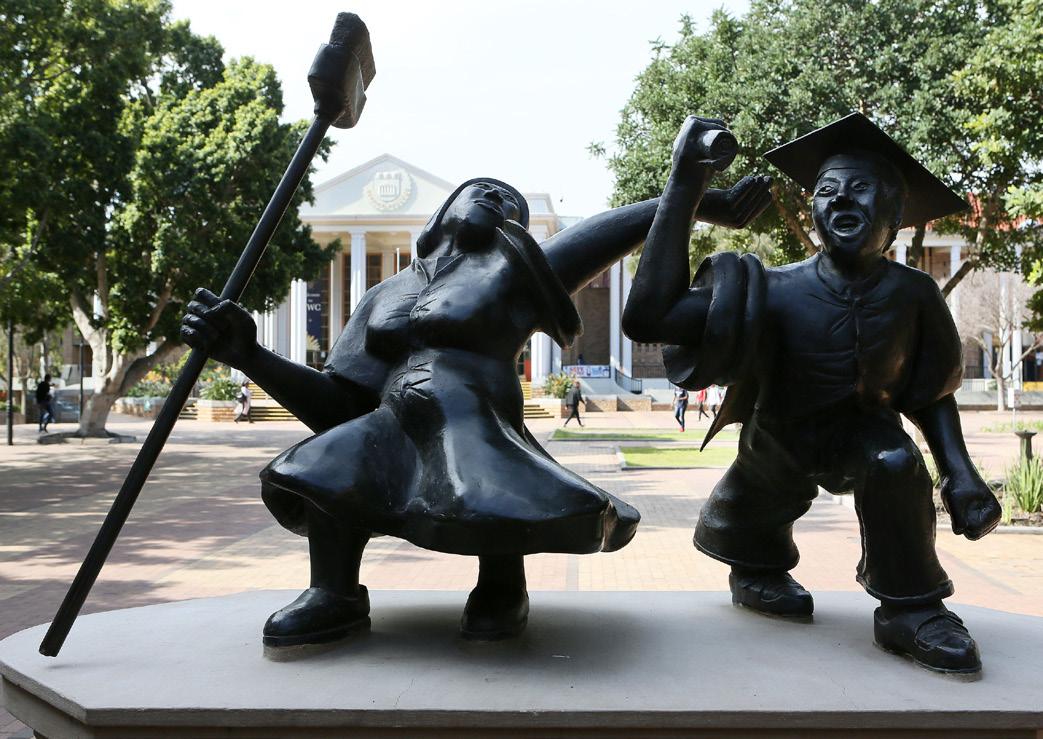

1. Prof. Talitha Crowley has received an NRF Y-2 rating (2023)
2. Mr. Brandon Layman received the award for the “Most Promising Academic Administrator”
3. Ms. Magda Jansen van Vuuren received the award for “Outstanding PA/Secretary” CISCFS
1. Professor Roman was appointed as the Director of the Centre for Interdisciplinary Studies of Children, Families and Society (CISCFS)
2. The TIP consortium comprising of Prof Rumi Price, Washington University (WashU), Dr Zhang, University of Massachusetts at Lowell (UML), Prof Erica Koegler, University of Missouri (UMSL), Prof E Rich (UWC), Ms M Roper, Khulisa Management Services. University of Calgary, Canada, was funded by the U.S. Department of State, Washington DC, International Programs, Office to Monitor and Combat Trafficking in Persons (TIP). Program to End Modern Slavery (PEMS) to conduct further TIP research. (2022 – 2027). This is a 3-phase study which spans over 5 years. Project title: Measures for Countering Trafficking in Persons in South Africa (MCTIP) Phase 1 Component study (Oct 2022 - June 2024). The overall project funding for Phase 1 study was: $1,345,998.00 (R 24 715 888.00) for the consortium. Ethics approval was obtained in April 2023, and the project funding was maintained through years 2023 -2024
3. Prof. Roman won the HERS-SA national award for Women in Humanities and Social Science;
4. Registrar’s Rewards and Recognition (R&R) 2022 (held on 5 May 2023) - Ms Genene Pillay received the award for service excellence.
Dr Lungiswa Tsolekile was nominated for the Best Supervisor Category-2023 Research Recognition Awards, UWC. Ms Carnita Ernest was nominated for the UWC Research Recognition Awards 2023 in the category: Support to Research and Innovation: Best Administrator. Dr Verona Mathews was nominated for the Best Supervisor Category-2023 Research Recognition Awards, UWC.
Dr Anam Nyembezi was nominated for the UWC Research Recognition Awards 2023 in the most Masters students graduated.
CHS launched the mobile health & wellness clinic on the 18th of July 2023. In attendance were the Rector of UWC, prof t Pretorius, MEC of Health Prof Nomafrench Mbombo, representatives of various media houses and university staff.
Community engagement
Dietetics
1. Training and service-learning in communities and
community settings and ECDs continued for the final year students.
2. IPE from 1st year to 4th year through the interdisciplinary modules and discipline specific modules DIE402; DIE312; DIE322.
3. The BSc Dietetics curriculum includes two Community Nutrition modules (DIE312; DIE322) that includes theory and practice and one applied community nutrition module (DIE402) that includes 9 weeks clinical practice in community settings.
1. Some third-year students joined visiting students from the Karl de Grote University of Applied Sciences in Antwerp, Belgium on the Faculty Community Outreach programme at Dwars River Valley on the 22-23 March, facilitated by Mr. Sibulelo Gawulayo.
2. Prof Dykes and Prof van der Westhuizen met with Alderman Andrews and staff from the City of Cape Town to explore collaboration in youth empowerment through ecological social work interventions
3. Work Placement Supervisor/Mentor Capacitation Sessions for supervisors and coordinators employed by Western Cape Departments of: Social Development (DSD); Cooperative Governance and Traditional Affairs (CoGTA), Rural Development (DoRD) and City of Cape Town (CoCT) – 14 & 19 Jul and 4 August 2023.
1. 4th-Year BNursing students & staff- Cardiovascular risk outreach - Cardiovascular risk assessment: Bellville, Fisantekraal, Klipheuwel - 11 - 14 April 2023
2. 3rd-Year BNursing students & Staff - International Nursing Collaboration with Oral Hygienist (Dentistry) – Khayelitsha –14 & 21 July 2023
3. 4th-Year BNursing Students - Health and Wellness Screening - 27 July 2023 - Genadendal Pop-Up
4. 4th-Year BNursing Students - Men’s Health - Bellville Mans Pop-Up - 30 August 2023
5. 4th-Year BNursing Students - Health Awareness - 31 August 2023 - Fisantekraal Pop-Up
Centre for Interdisciplinary Studies of Children, Family and Society
1. Professor Rich provides academic support to persons in a Theological study programme, spiritual and holistic guidance to those preparing for ministry, and assesses candidates’ suitability for ordination. She is the President of Society: Providing leadership in meeting the practical needs of the communities surrounding Kraaifontein/ Scottsdene/Wallacedene as well as providing a service to the communities in terms of pastoral, substance abuse, and family/parent-child related challenges.
2. Professor Roman has an established partnership with

Saldanha Bay Municipality to strengthen capacity in research capabilities among ward committee members so that they can conduct research within their wards to better understand the environments better.
3. Prof Savahl, Dr Yassin and Prof Erasmus in collaboration with the Department of Social Development and the City of Cape Town, have developed and presented a workshop focusing on international evidence on early childhood development. The presentation and workshop included key stakeholders and ECD practitioners aligned to DSD and the City of Cape Town. These engagements discussed issues surrounding child development, the first 1000 days, international practice and evidence and the gaps identified between research and practice. These engagements outlined an Afrocentric approach which serves to localize Northern based evidence to the South African context so that it may be socially and contextually relevant for South African practitioners and children.
Physiotherapy
Ms Madasa and the Fisantekraal students in collaboration with City of Cape Town hosted the September holiday program in Fisantekraal.
1. Currently the department is involved in Bellville CBD, Mitchells Plain and Fisantekraal as well as new collaborations forming within the Dwars Rivier valley Project which include Lanquedoc and Stellenbosch.
2. Staff and students continued to be involved in partnerships with Mould Empower Serve Organisation (MES).
3. Fisantekraal and Mitchells plain sub district: Colleagues and students were involved in several community related projects in Fisantekraal. Of significance is the 3D project that is facilitated by Dr G Filies and Prof T Mthembu, in this project students were provided with the necessary training in order to identify and manufacture assistive devices or items that would assist their clients who may have functional limitations. The above training was done in collaboration with Prof C. Ingram from the Winston-Salem State University (WSSU).
4. Prof Lisa Wegner, Prof Thuli Mthembu and Prof Wilson Majee were involved in community engagement interactions and research activities in rural communities of the Eastern Cape, Western Cape and Mpumalanga, as part of the Youth Parenthood project. Important partnerships were established with strategic community stakeholders.
5. Staff hosted a conscientization workshop across 2 sessions with clinicians from PT, ST, SW and OT. Staff are currently working towards collaborating on workshops for Pebbles Project in Stellenbosch who wish to receive similar training.
6. Staff was also involved in various IPEU and community outreach engagements in the Lanquedoc community and MES organisation in Bellville
7. Institutional Webinar > Tucker, LA. (2023). Mental Health: Signs, Symptoms and Context. Webinar: Mental Health. UWC HR Staff Wellness, 6th October 2023.
8. Tucker, LA. (2023). IPEU World Cafe Facilitator (UWC Interprofessional Education unit).
Psychology
Adonis, T. (2023). Faculty Outreach (Lanquedoc and Pniel): Masters in Research Psychology students presented psychoeducation sessions around mental health (Substance misuse, family support and mental health in peri-urban contexts)
Faroa, B.D. & Padmanabhanunni, A. (2023). “Psychology in Action’- Community Resilience Photovoice Project. [Social Psychology (PSY707) class project].
Scholarly professional engagement
Dietetics
1. Peer review of articles for various scientific journals: E Kunneke; R Swart Acted as chairperson for scientific oral presentation sessions; National Nutrition Congress, 2023.
2. Served as sub-editor: E Kunneke: South African Journal of Clinical Nutrition
3. N Solomons chaired the HPCSA evaluation and accreditation panel of one HEI.
4. N Solomons served on the HPCSA panel for evaluation and accreditation of one HEI.
5. R Swart Chair Senate Assessment Committee
6. Jill Wilkenson serves as a member on the Infant & Young Child Feeding Working Group:
7. Department of Health, Nutrition Directorate, Western Cape, which provides guidance on 8. IYCF.
Social Work
The Community Development Programme, in collaboration with the Department of Social Development and the Office of the Premier of the Western Cape, conducted training on the Community Capacity Enhancement Framework.
Prof Van der Westhuizen attended the Head of Departments meeting of the Association of South African Social Work Education Institutions to discuss pertinent matters affecting learning and teaching, as well as employability of graduates.
Dr. Cornel Hart: appointed as a member of the CHE Task Team for the BCD Qualification Norms & Standards Development
School of Natural Medicine
Leisegang K. Tongkat Ali Evidence, Low Testosterone Causes & How to Avoid Hypogonadism. Roots of Research Podcast. July 2023. https://www.youtube.com/watch?v=Fj0pm1JX4nk
Leisegang K. How to maintain healthy testosterone levels (eBooklet). NFSupplements, London, UK.

1. Professor Roman is a Guest Associate Editor for Frontiers: Developmental Psychology; Review Editor in Developmental Psychopathology and Mental Health for Frontiers; Leading Editor for a special edition - “New Directions and Trends in Parenting Research” - Frontiers in Psychology and Frontiers in Developmental Psychology.
2. 9 March 2023. Stakeholder Introductory Discussion workshop: Measures for Countering Trafficking in Persons in South Africa: Phase I Component Study:. WUSMWashington University School of Medicine, USA; UML – University of Massachusetts at Lowell, USA; Khulisa – Khulisa Management Services, South Africa; UMSLUniversity of Missouri St. Louis, USA, UWC, Cape Town. Hosted by, CISCFS, UWC (Prof E Rich), and funded by the U.S. Department of State, Office to Monitor and Combat Trafficking in Persons (J/TIP), Program to End Modern Slavery (PEMS)
3. Professors Roman and Rich co-created a Special Issue entitled: Strategies to support mental health during crises for the Youth Journal (Bi/MDPI), and were invited as Guest Editors for this Special Issue. (2023). The articles included: •Michelle Jayman, Jay Ayliffe., Cecilia Essau. Adaptation, Innovation and Co-Production: Meeting the Mental Wellbeing Needs of a Digital Generation. Youth 2023, 3(1), 447-464; https://doi.org/10.3390/youth3010031
4. Katerina Koutra, Varvara Pantelaiou and Georgios Mavroeides. Why Don’t Young People Seek Help for Mental Illness? A Cross-Sectional Study in Greece. Youth 2023, 3(1), 157-169; https://doi.org/10.3390/youth3010011 - 06 Feb 2023
5. Solomon D. Danga., Babatope O. Adebiyi., Erica Koegler., Conran Joseph., Nicolette V. Roman. (2022). Associations between Traumatic Experience and Resilience in Adolescent Refugees: A Scoping Review. Youth 2022, 2(4), 681-690; https://doi.org/10.3390/youth2040048
Scholarly professional engagement
Physiotherapy
Dr Danelle Hess was approved onto the Leadership, Empowerment and Development (LEAD) programme for 2023. The following modules were completed: Self-insights, Leading in complex systems, Leadership styles, Introduction to the Entrepreneurial Mindset in Higher Education and Internationalisation in Higher Education.
Dr Danelle Hess (secretary for the SAAHE Western Cape branch) was part of the UWC group that hosted the workshop: Developing and Online Course for Facilitation of Small Group LearningProcess, Content and Insights, 1 September 2023, SoPH.
Occupational Therapy
The Brain Injury Trust: research led initiatives are conducted at
the Brain Trust Organisation whereby rehabilitation and work skills development initiatives are directed to individuals who sustained a brain injury and their families (Prof MS Soeker).
Several staff members from the Department of Occupational Therapy authored chapters for a prestigious occupational therapy textbook called Crouch and Alers Occupational Therapy in Psychiatry and Mental Health (sixth edition), which will be published by Wiley Blackwell in 2024. Professor Lisa Wegner from the Department of Occupational Therapy headed the editing team for the book.
Prof S. Bassett & Prof M. Young - Involved with the Healthy Active Kids South Africa (HAKSA) publication of the 2022 report card.
Social Work
1. Prof M Van der Westhuizen, Mr R Safodien, Ms F Brey and Mr A Mandlana started a collaboration with Christ University, India focusing on student support through peer mentoring programmes
2. Dr Ronel Davids visited Gallaudet University in Washington DC, USA in October 2023, focusing on advancing education and training of deaf social workers, and of hearing social workers working with the deaf community
3. Prof Tonheim from the Western Norway University of Applied Sciences in Bergen Norway visited the Department in December to work with Prof van der Westhuizen and Dr Lukelelo on including Ubuntu principles in social work as a research project
4. Prof. G Dykes and Dr. S Carelse facilitated a student selfpositioning project with the University of Applied Sciences, Darmstadt, Germany
5. Prof. M van der Westhuizen and Ms. N Lukelelo applied for funding with a colleague from the North University of Norway, Bergen focusing on best practices of Ubuntu that support child wellbeing.
6. Dr A Human-Hendricks visited the University of Ghana, and participated in an academic seminar, an event organized by the Maria Sibylla Merian Institute for Advanced Studies in Africa (MIASA). Topic: Building African Ecologies of Knowledge.
Interprofessional Education Unit
1. Alabama Delegation: - IPEU was invited to do a presentation on the IPE curriculum and to take the visitors on a site visit to Fisantekraal and Mitchells Plain. The idea was to forge a relationship and partnership for future collaboration. 05 May 2023
2. OPES Servizio Civile/Italy Governement Volunteer Programme: Max Corbellari
3. Prof Waggie and Dr Filies are the co-ordinators of the

Italian Volunteer programme. The volunteers are placed in Fisantekraal, Mitchel’s Plain, Mfuleni, Athlone School for the Blind and Woodstock for a duration of 9 months. Some of the volunteers are also involved in sports activities at UWC, the access the library and do research as part of their studies. 08 November 2023
4. Ghent University: Lynn Ryssaert, Peter Decat and Dorien Vanden Bossche
5. Dr. Filies established a relationship with Lynn Ryssaert while visiting Ghent University as part of an exchange programme. They are currently working on a joint research paper and collaborating on a virtual lecture series on the determinants of health which will be incorporated into the Primary Health module and Health Promotion module. 06 December 2023.
1. Prof Olagoke Akintola was invited by the International Labour Organization (ILO) to work on International Time-Use Module Expert Review Panel convened by the ILO. He worked with Celeste Marin (International Labour Organization, Dublin, Ireland), Samantha Watson (International Labour Organization, Geneva, Switzerland), Leading Feminist Economist Nancy Folbre, University of Massachusetts, Amherst, USA and other Labour Economists, Feminist Economists and Heterodox Economists
2. Prof Olagoke Akintola was invited to work with the Network of Child Health Advocates to develop a report for the United Nations Convention on the Rights of the Child. This Contribution was an ‘Alternative Report’ in response to South Africa’s combined third to sixth periodic report to the United Nations Convention on the Rights of the Child. Prof Akintola invited Dr Netsai Gwelo and Dr Joshua Sumankuuro (postdocs) to work with him on this project. Theu submitted report to the Network of Child Health Advocates: Coordinator: Lori Lake (Children Institute, UCT), Several contributors from across South African academia and humanitarian organizations.
3. Prof Olagoke Akintola had discussions with Nnodimele Atulomah (Babcock University, Ilishan Remo, Nigeria), Ademola Ajuwon (University of Ibadan, Nigeria) about starting a new Afro-centric Journal of Public Health: Annals of Public Health
Dietetics
1. N Solomons served on HPCSA Professional Board for Dietetics and Nutrition and is also a member of the Education and Training sub-committee.
2. N Solomons served on the Western Cape Nutrition Society committee
Prof Marichen Van der Westhuizen was re-elected as vice-chair, and Dr Shernaaz Carelse as secretary for the executive committee of SANCA Western Cape
M Van der Westhuizen appointed as Editorial Board member for the newly established accredited peer-review journal: Journal of Community Psychosocial Research (JCPR), North West University
1. Wendy Ericksen-Pereira. Chairperson of Allied Health Professions Council of South Africa.
2. Wendy Ericksen-Pereira. Executive Committee of Allied Health Professions Council of South Africa.
3. Wendy Ericksen-Pereira. Chairperson of Education Committee (Allied Health Professions Council of South Africa).
4. Wendy Ericksen-Pereira. The World Naturopathic Federation (WNF) - Naturopathic History by World Regions.
5. Mujeeb Hoosen. Moderator for WHO Standard Terminology document for Unani Medicine.
6. Mujeeb Hoosen. WHO ICD-11 Traditional Medicine Module 2 Beta Draft Development Committee (2019-2024). This included meetings in Kandy, Sri Lanka (3-4 December 2023) and at the WHO Global Summit on Traditional Medicine held in Gujarat, India (17-18 August 2023).
7. Xuesheng Ma. Deputy Chairperson for South African Association of Chinese Medicine and Acupuncture.
8. Xuesheng Ma. Executive Council Member for World Federal of Chinese Medicine Society.
School of Nursing
1. Professors Daniels, Chipps, and Martin were inaugurated as Fellows into the Academy of Nursing of South Africa (ANSA) on 23 November 2023.
2. CISCFS
3. Prof. E Rich was elected as Board member to the Court of Appeals Board (CotN, W Cape): January 2023 to date.
Occupational Therapy
1. Professor Lisa Wegner (Chairperson): Crouch Bursary Fund for promoting research in psychiatric occupational therapy
2. Professor L Wegner was a reviewer for various research proposals and researcher rating applications for the Medical Research Council and the National Research Foundation (South Africa)
3. Professor Lisa Wegner (Chairperson): Editorial Committee for the 6th revision of the book Crouch and Alers Occupational Therapy in Psychiatry and Mental Health
4. Professor J de Jongh (Chairperson) of the ethics committee (Occupational Therapy Association of South Africa)
5. Professor J de Jongh (Member) editorial board (South African Journal of Occupational Therapy)
6. Professor MS Soeker (Chairperson) of the research

committee (Occupational Therapy Association of South Africa)
7. Professor MS Soeker (Member) of the education committee (Occupational Therapy Association of South Africa)
8. Professor MS Soeker (Member) Provincial Health Research Committee (PHRC)
9. Professor MS Soeker (Member) of the editorial board of WORK, Journal of Assessment and Rehabilitation (International)
10. Professor MS Soeker (Member) editorial board (South African Journal of Occupational Therapy)
11. Professor MS Soeker was a reviewer for various rating applications for the National Research Foundation (South Africa)
12. Prof T Mthembu (Member) the Occupational Science Committee (Occupational Therapy Association of South Africa)
13. Prof T Mthembu (Chairperson), Student Leadership Portfolio (Occupational Therapy Association of South Africa)
14. Professor T. Mthembu (Member of the Research Ethics Committee, Mpumalanga Department of Health)
15. Professor TG Mthembu was a reviewer for various rating applications for the National Research Foundation (South Africa)
16. Professor TG Mthembu editorial board member for Occupational Therapy in Mental Health
17. Prof L Hess-April was an evaluator of occupational therapy curriculla for the HPCSA
Interprofessional Education Unit
1. Prof Firdouza Waggie: SAHECEF, The Network”Towards Unity for Health, AfrIPEN
2. Africa Interprofessional Education Network (AfrIPEN):
Dr Gerard Filies - Chairperson
Dr Luzaan Africa - Secretary
3. Ghent University International Scientific Advisory Board: Dr Gerard Filies
4. International Advisory Board for TVEPS - Centre for Interdisciplinary Work-Place Learning in Norway: Dr Gerard Filies
5. BADISA Kuils River Board Dr Gerard Filies
Sport, Recreation and Exercise Science
1. Prof Marie Young serves on the World Leisure Organization Executive Board and Board of Directors where she is the Chair of the Research and Knowledge Transfer Committee and the Strategic Grants Committee. She also is the co-chair of the Leisure Education Special Interest Group
2. Prof Marie Young serves on the Editorial Board for the World Leisure Journal and was appointed as the Representative for Africa.
School of Public Health
1. Prof Olagoke Akintola was invited to, and joined the Editorial board of the journal: Frontiers in Public Health, Public Mental
Health, Section as Associate Editor. Prof. Olagoke Akintola was also invited and joined the Journal of Community Systems for Health as Associate Editor.
2. Prof Helen Schneider was invited to, and joined the Editorial Board of the Journal of Community Systems for Health. Prof Olagoke Akintola was invited to be on the Editorial Board of a new Afro-centric journal: Annals of Public Health. Prof Anam Nyembezi was appointed as Honorary Associate Professor at Walter Sisulu University.
3. Dr Chanelle Mulopo facilitated a training workshop on Knowledge Translation at Cochrane South Africa while Dr Oyinye Akunne made a presentation of research findings to the Limpopo Rational Medicine Use Committee.
4. Ms Ziyanda Mwanda, Dr Netsai Gwelo and Prof Olagoke Akintola collaboration with colleagues in Ademola J. Ajuwon, Funke Fayehun, Grace Ajuwon, (University of Ibadan, Nigeria) Godwin Aja (Adventist International Institute of Advanced Studies, Silang Cavite, The Philippines) to write a Grant on Digital Transitions and Preparation of Graduates for the World of Work by African Universities (Council for the Development of Social Science in Africa CODESRIA).
5. Dr Verona Mathews had a collaboration with University of Missouri on Health Data Analytics Competencies of Health Professionals (Digital Transformation for Leaders TUFH Academy: Social Responsibility of Health Professionals).
6. Dr Carmen Späth collaborated with colleagues from Stellenbosch University to explore new methods for qualitative evidence synthesis (storyboarding).
7. Dr Martina Lembani, Dr Anam Nyembezi, Dr Netsai Gwelo, Prof Uta Lehmann & Prof Olagoke Akintola collaborated with colleagues from Sweden, Uganda, Kenya and Belgium, Scalabrini Center in Cape Town on migration and health.
8. Prof Asha George led grant writing with United Nations University for a Health Systems NIHR Consortium bid for work on violence against PHC health workers through a gender lens with partners from Tanzania, Burkina Faso. She also helped in convening of emerging and senior scholars on the Continuum of Respectful Care through a gender and rights lens from South Africa, Uganda, Zambia and Malawi.
9. Prof Asha George organised three highly successful organised sessions or side events at global conferences such as IHEA and Women Deliver. Ten webinars were coconvened as part of GT4A and the African Community of Practice onGender and Health, undertaking and publishing country case study reports from Ethiopia and Niger as part of a collaboration with United Nations University and colleagues from Philippines, India and Nepal on best practices for mainstreaming gender into government programmes, including the launch 101 webinar. Publication of the BMJ series on sex, gender and Covid-19 with United Nations University. https://www.bmj.com/gender-and-pandemic-response. Presenting results on sex, gender and Covid-19 to the WHO Roadmap meeting on pandemic preparedness, the leading

research forum on pandemic preparedness. Coauthoring a paper on maternal health and intersectionality for The Lancet maternal health series and moderating one of the launch webinar sessions on the series. Prof was selected as chair of WHO Scientific and Technical Advisory Group for the Department of Sexual and Reproductive Health and Human Reproduction Programme; Served as adviser on women’s health for the Exemplars team at Gates Ventures; and advised on gender and equity for the Results Advisory Group for the Global Financing Facility. IDRC has funded two collaborations that she leads and supports. She also coconvened the African Community of Practice on Gender and Health with the AU Covid-19 Commission and UNU-IIGH
Dietetics
Curriculum transformation: Ongoing project in the Department
Design of the new curriculum for the new B Sc Dietetics Nutrition degree per HPCSA directive.
School of Natural Medicine
1. BSc (CHS) curriculum for SoNM future programmes completed for submission to CHSAP and SAP Regulatory Committee in 2024.
2. MSc (Naturopathy) and MSc (Phytotherapy) curriculum for SoNM future programmes drafted internally. Suspended pending BSc (CHS) approval process.
3. PG Dip (Acupuncture) and PG Dip (Unani-Tibb) curriculum for SoNM future programmes drafted internally. Suspended pending BSc (CHS) approval process.
1. South African Nursing Council Self-Evaluation Report (SER) completed for re-accreditation of the Bachelor of Nursing programme; awaiting feedback.
2. Postgraduate programme amendments for PGDip Midwifery and Nursing Education to accommodate part-time students.
3. New postgraduate diploma in Primary Care Nursing accredited by SANC and submitted to CHE.
4. New postgraduate diploma in Health Services Management name change submitted to CHE.
Physiotherapy
1. 3rd Year theory teaching moved into 1st semester, to better prepare students for clinical rotations in the 2nd semester.
2. PHT204 was split into two separate modules (PHT212 and PHT221) in order to allow students to write off half the work in the 1st semester.
3. Changes in credit value of PHT313 (now PHT319) and PHT303 (now PHT318) to be better aligned with the content of the module.
4. PHT110, PHT310 and PHT402 changed to CA only modules to be better aligned with module content and assessment strategies.
The department has amended the strategic documents such as our Departmental Mission and Vision as well as Statement of Approach to align with the Institutional Operation Plan (20212025). The above information was used in preparation for the departmental HPCSA review in November 2023.
1. Summary of amendments for the Psychology Honours Programme, as reflected in formal module descriptors
2. PSY701 (Advanced Research Project) - Amendment to Generic module name, programmes in which module will be offered.
3. PSY702 (Abnormal Psychology) - Amendment to Generic module name, programmes in which module will be offered, main outcomes more clearly aligned with NQF 8, revision to breakdown of learning time
4. PSY703 (Psychological Interventions) - Amendment to programmes in which module will be offered, main outcomes and content more clearly aligned with NQF 8, Assessment weightings (revised to 60 CA/40 FA)
5. PSY704 (Advanced Quantitative Research Methods)Amendment to Generic module name, programmes in which module will be offered, main outcomes and content more clearly aligned with NQF 8, Assessment weightings and Assessment module type (revised to CA only module)
6. PSY705 (Personality Development) - Amendment to Generic module name, programmes in which module will be offered, Assessment weightings (revised to 60 CA/40 FA)
7. PSY707 (Social Psychology) - Amendment to Proposed Semester, programmes in which module will be offered, Assessment weightings (revised to 60 CA/40 FA)
8. PSY708 (Community Psychology) - Amendment to Proposed Semester, programmes in which module will be offered, main content and outcomes more clearly aligned with NQF 8, Assessment weightings (revised to 60 CA/40 FA)
9. PSY709 (Psychological Assessment) - Amendment to Programmes in which module will be offered, main content and outcomes more clearly aligned with NQF 8
Interprofessional Education Unit
PG Diploma in Interprofessional Education in Health: A request has been approved to make changes in the Research Module (IPE701).
Student will only be expected to complete a research proposal as their final assignment. This will allow students to finish within 1 year. Changes will be implemented in 2024.
1. Ghaleelullah Achmat - Project lead for the curriculum change from the 3+1 degree to the 4-year biokinetics program.

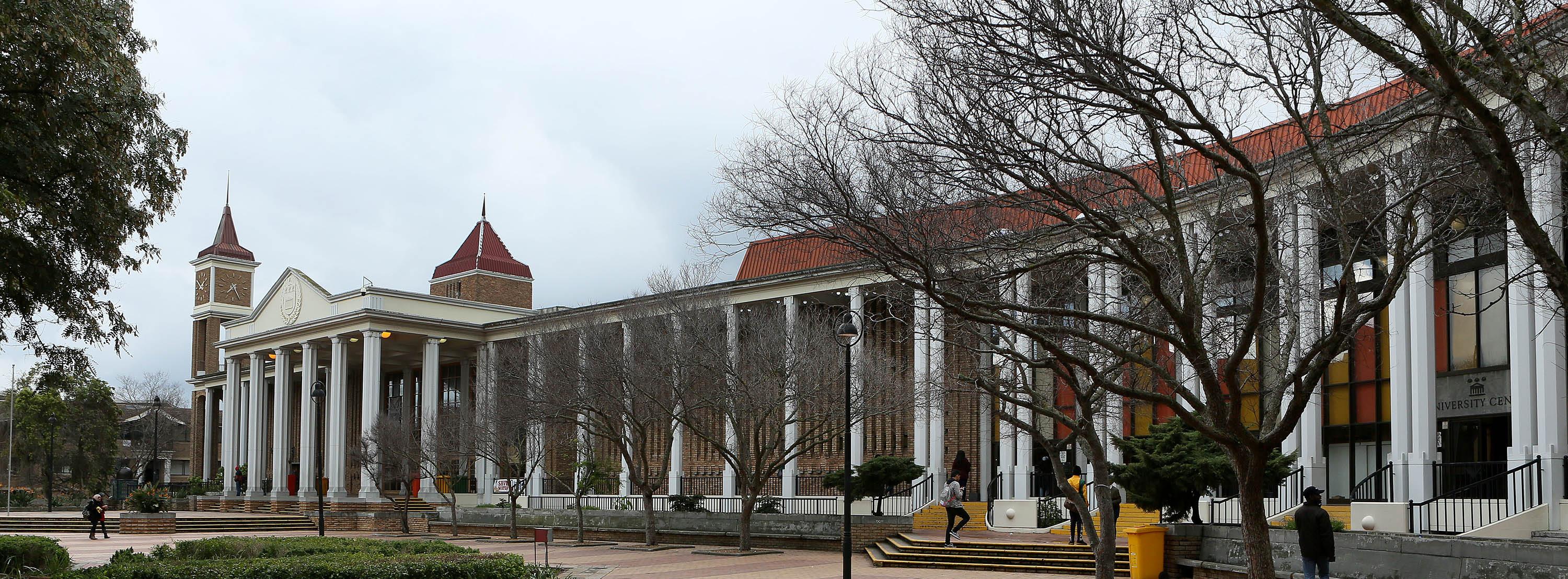
2. M Malema, Ghaleelullah Achmat, Johann Hendricks, and Kelelello Moeketse were involved in re-registering the NUSPE course for the 2024-2026 cycle.
3. Ghaleelullah Achmat submitted the Biokinetics Internship Program to HPCSA for renewal.
4. Barry Andrews and Marie Young submitted the Higher Certificate in Sport, Performance and Recreation Management documentation for SAQA and CHE approval
5. Marie Young engages in discussions with Cornelia Hart on the Community Development program and possible changes to the BA (Hons) Sport and Exercise Science: Community Health stream to allow for students to register as Community Development practitioners through the Department of Social Development.
School of Natural Medicine
1. SoNM continue to complete the SAP approved Teach Out Plan for current programmes. The BSc (CHS) graduated 1 student, BCM (CMA) graduated 3 students, BCM (Naturopathy) graduated 5 students, BCM (Phytotherapy) graduated 6 students, and BCM (Unani-Tibb) graduated 3 students.
2. A third-year student received an ERASMUS scholarship to attend the BSW programme at the University of Applied Sciences in Bochum, Germany for the first semester
3. Physiotherapy had one Cum Laude in Final Year - Megan Rodgers
4. SoN UG Students - 218 in total for 2023
5. Bachelor of Nursing: 199 in total for 2023
6. April Graduation - 106 (one Cum Laude) - Asifiwe Nadia Cum Laude
7. September Graduation - 27
8. December Graduation - 66 (5 Cum Laude) - Abrahams, Nabeelah - Butana, Amanda - Ellis, Nikita - Magerman, LeeMadré Frances - Mbashe, Bridgette Nola.
9. Bachelor of Nursing and Midwifery: 19 in total for 2023 (One Magna Cum Laude, Khoza, Boitumelo Vuyokazi and two
10. December 2023 Graduation: This was the first cohort to graduate from the new programme, which started in 2020 during the COVID-19 pandemic.
Centre for Interdisciplinary Studies of Children, Family and Society
Nazeefah Safi was the first Masters student to achieve a Magna Cum Laude in the CISCFS history of student graduations.
Mujeeb Hoosen, a PhD student in the CISCFS (and SoNM staff member), is an active participant in promoting spirituality in Unani Tibb education and clinical practice globally. He participated in two WHO events, was the country lead in ICD11 testing, presented the SA perspective on TM and was moderator for plenary session.
The undergraduate students in the Department of Occupational Therapy have formed an Occupational Therapy Student body known as Occupational Therapy Council (OTC), this body is actively involved in student leadership initiatives linked to the HPCSA. The second student committee known as the Occupational Therapy Interactive Society (OTIS) has also been very active with regard to facilitating OT student community outreach initiatives. The third student committee known as the Occupational Therapy Association of South Africa Student body (OTASAS) was formed in October 2019. This particular group will present the student’s voice in the Professional body of the profession called the Occupational Therapy Association of South Africa (OTASA).
The Department of Occupational Therapy had its fifth PhD student complete her thesis in December 2023. This is a staff member - Dr Aziza Kalam - which makes the achievement particularly significant. Six students completed their master’s theses in 2023. These postgraduate students will be invited to present their research at our Occupational Therapy Post Graduate Seminars in 2024. This is a highlight as it demonstrates the growth of the postgraduate programme in the department.

Undergraduate
Social Work
77 BSW graduates - 1 Magna Cum Laude + 8 Cum Laude
Post Graduate
Two PhD graduates
1 MSW graduate
One PhD student received the German Chancellor Award for a year mobility programme at the University of Applied Sciences, Bochum, Germany
School of Nursing
PhD: Five for 2023
Master of Nursing: Twenty-six (26) for 2023 in total
Master of Nursing: Eight at the April Graduation (including two staff members, Ms. Pelisa Khonco and Mr. Adam Petersen).
Master of Nursing: Fifteen at the September Graduation, including three staff members, Mr. Fritz Awa, Ms. Catherine Hoffman, and Ms. Ivy Jodwana.
Master of Nursing: Three - December Graduation
Postgraduate Diploma Nursing Education - 10 in total (9 - April Graduation, 1 - September Graduation)
It was the first cohort to graduate from the PGDip Nursing Education, one Cum Laude and two staff members, Ms. Dubulekwele and Ms. Norman
Centre for Interdisciplinary Studies of Children, Family and Society
Ph.D.: Two in total for 2023
Master of Arts in Child and Family Studies: Seven in total for 2023
Postgraduate Diploma Child and Family Studies - Eight in total for 2023
Community Projects
School of Nursing
1. DOH Wellness Hubs (Northern Substructure)
2. Chronic Disease Management Service Coordinating Workgroup DOH (Prof Waggie & Dr Hoffman) UWC reps
3. SoN Community Engagement (CE) activities & participation
4. 2nd year measles campaign commenced 28/02/202331 March 2023
5. SON/ IPE Collaboration with Dentistry - staff and student wellness
6. Dwars River Valley outreach, 22 & 23 March 2023
7. ECP outreach - old age homes
8. BN4 R.174 old age home outreach – Huis Martina
9. CVS (cardiovascular risk screening and brief behaviour change counselling) study launched on 11-14 April 2023 and concluded
10. World Leisure Day in collaboration with SRES 2 May 2023
11. Mitchells Plain Popup Clinic 9 -11 May 2023
12. One of our graduated PhDs, Jerome Samuels, participated in social media activities based on his journey as a student.
13. https://www.iol.co.za/weekend-argus/news/from-trolleyboy-to-doctor-of-philosophy-711f20b5-1468-423e-b4c9364dfaea6490
14. https://m.facebook.com/story.php?story_fbid=pfbid02xBe XnvvnEqgzpzC6KM6SnDSzBarmKm8R8hZWA3MiUAgQavd jGdTUpkUouTCxxAHql&id=100080001507267&sfnsn=scws pwa&mibextid=6aamW6 Physiotherapy
Dr Farhana Karachi, Ms Vuyolwethu Madasa and Prof Nondwe Mlenzana are part of the Academic Mentoring and Coaching Programme (AMCP).
Introduction to research module (3rd year research): Prof Soeker coordinated this module with the involvement of colleagues in the Faculty. Colleagues in the Department of Occupational Therapy have been active in facilitating, teaching and developing an interprofessional research module for undergraduate students specifically in the online environment (CHS faculty)
Neuroscience: Prof Soeker and students in the Department of Occupational Therapy have registered projects in line with the CHS Faculty’s vision for Neuroscience. Currently there is research collaboration between UWC and colleagues at UCT.
Ethics workshop: Prof de Jongh offered an interprofessional ethics workshop to final year students in the Faculty, with involvement of colleagues.
A Wellness Centre was piloted in Mitchells Plain with Physiotherapy students and will include other disciplines in 2024.
Prof. T. Crowley had a radio interview with Cape Talk on the 16th of March regarding the HPV virus.
https://www.rsgplus.org/van-trolliestoter-totdoktor-in-filosofie/?fbclid=IwAR0rd8Zyp_ bAYIwxS0Z0r4UPmP10dU9unf7s3vdfZj2mNYZDztR4w4Fm04 https://echocast.fabrik.fm/YGMnzX9m6LNw57
Prof Waggie (FCHS Acting Dean) 19 April 2024
